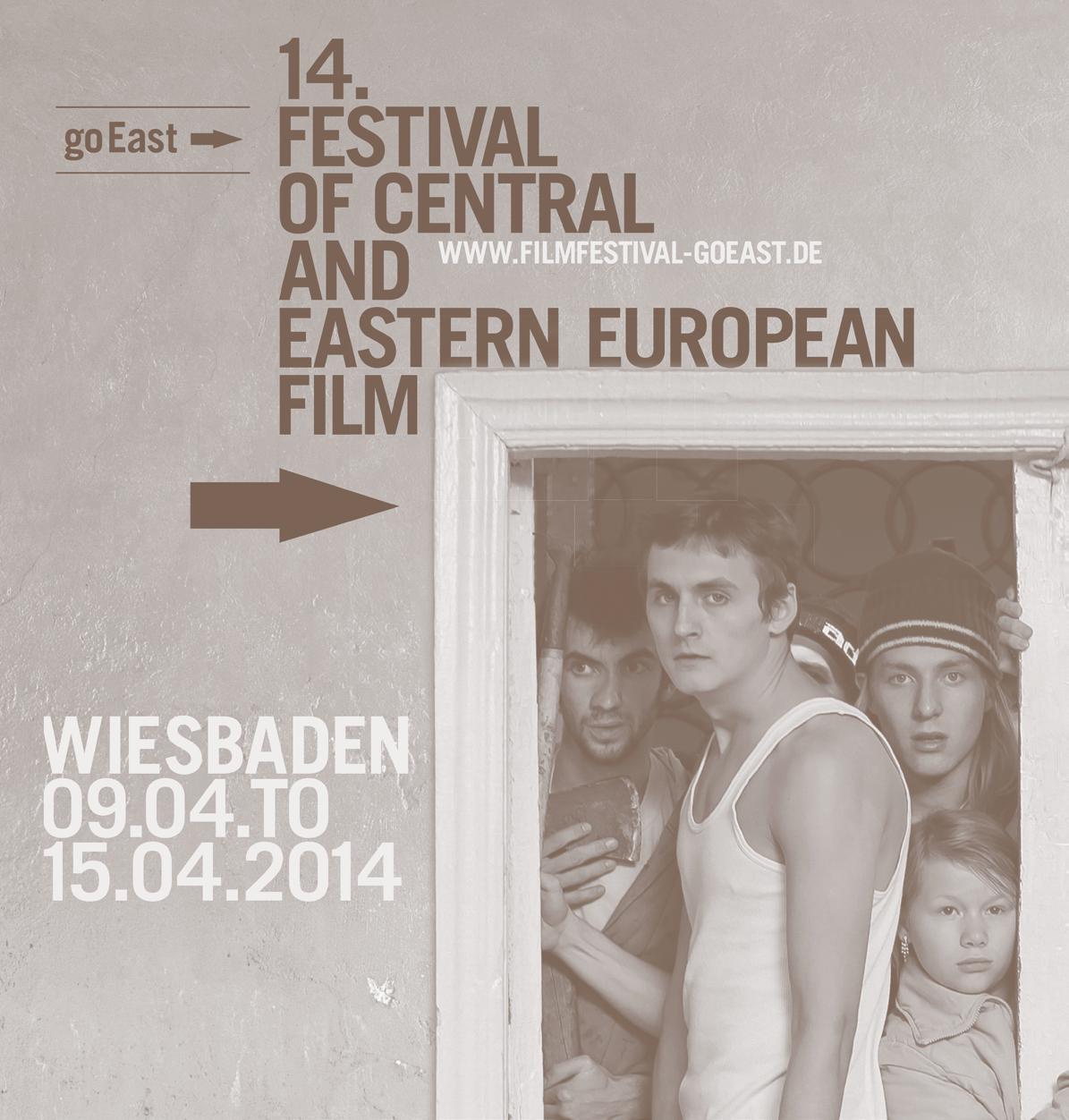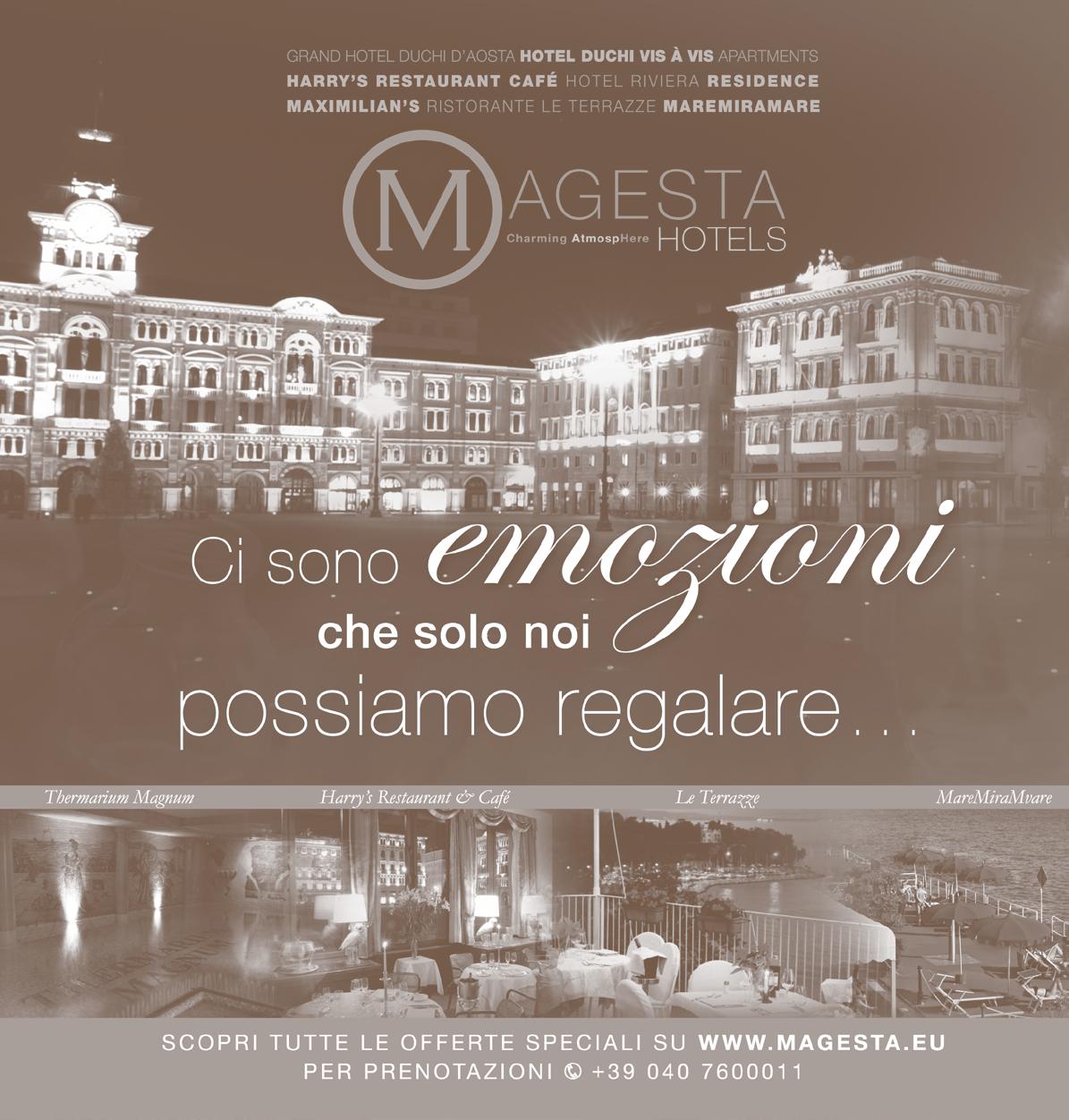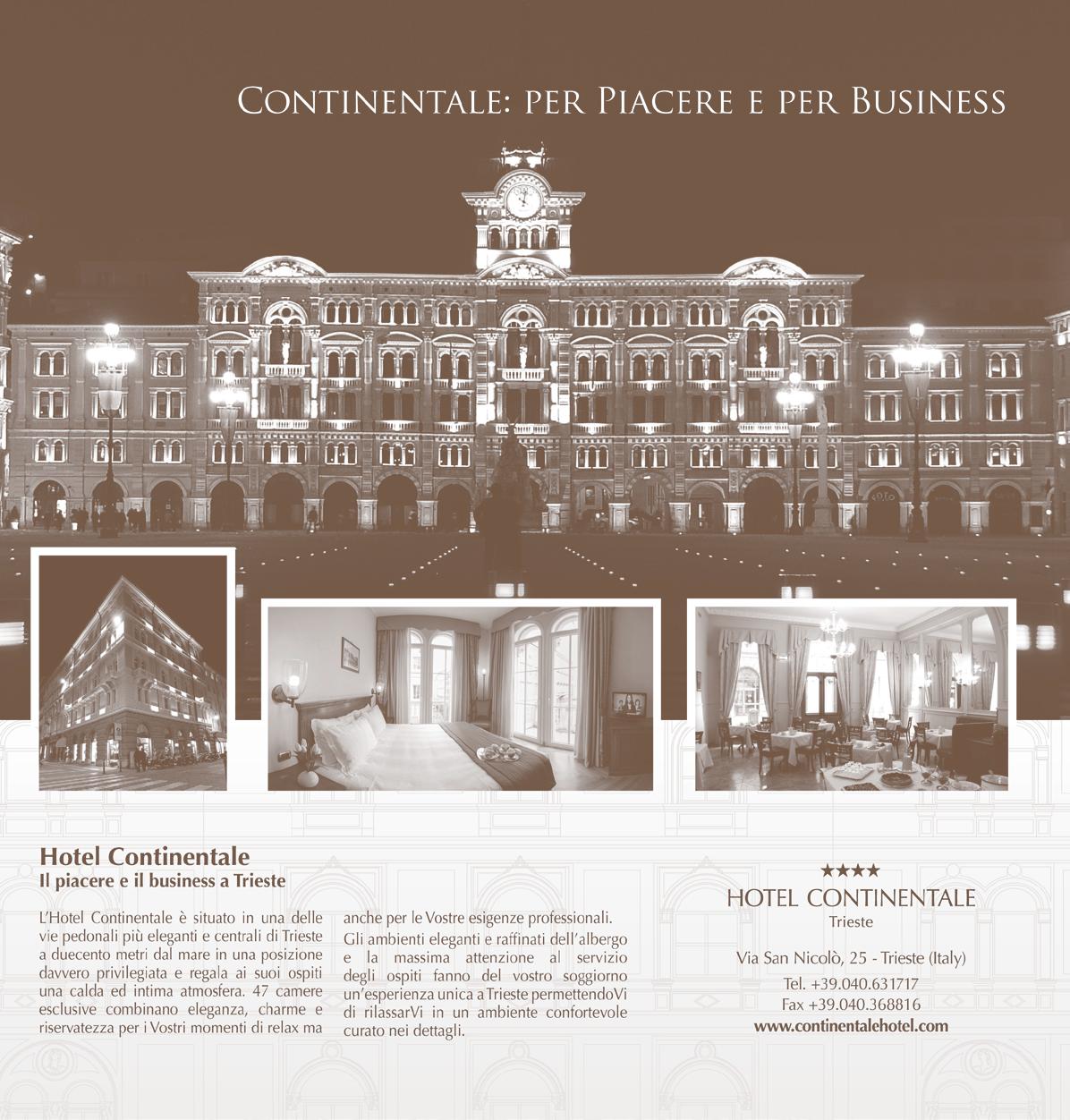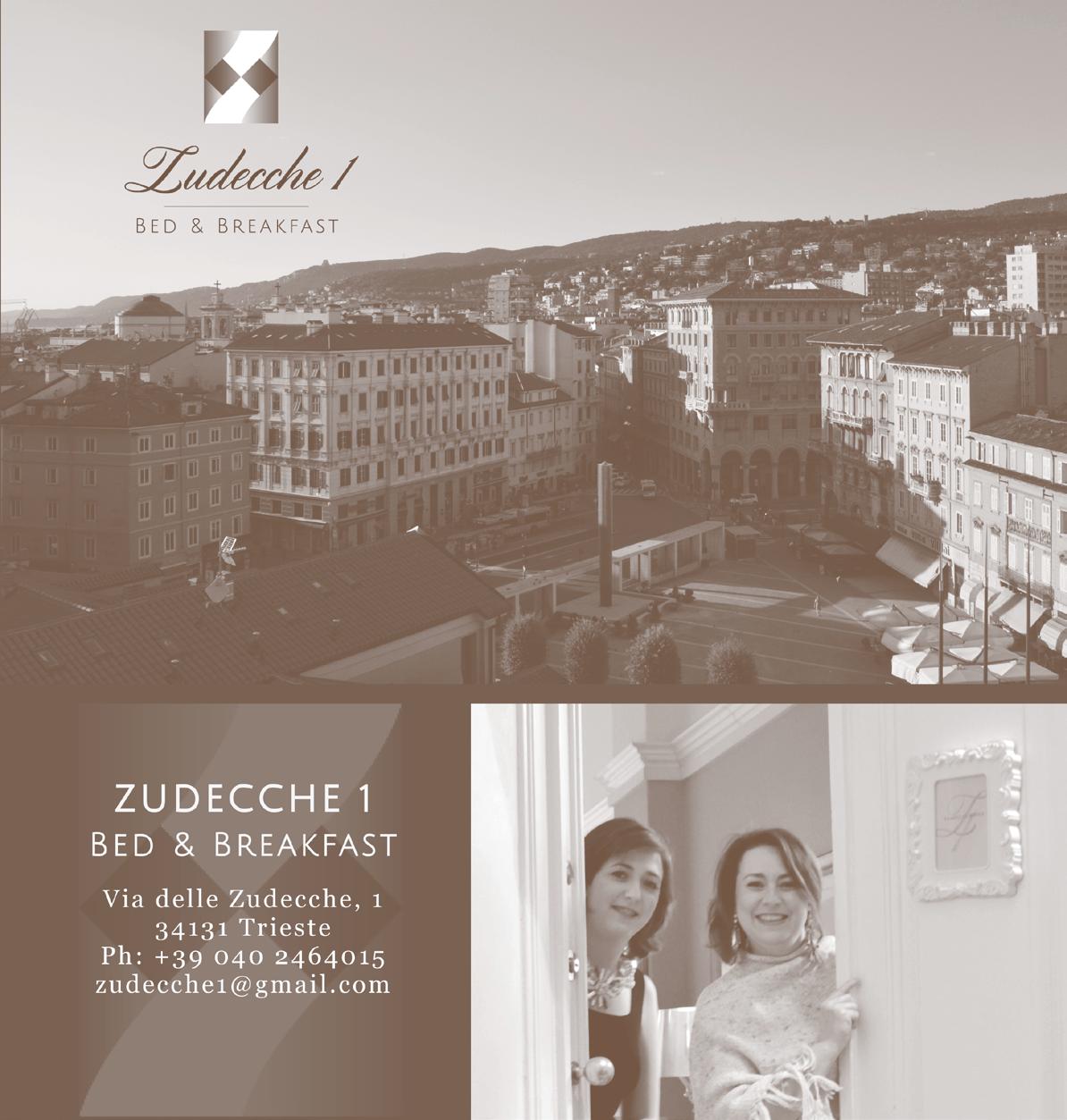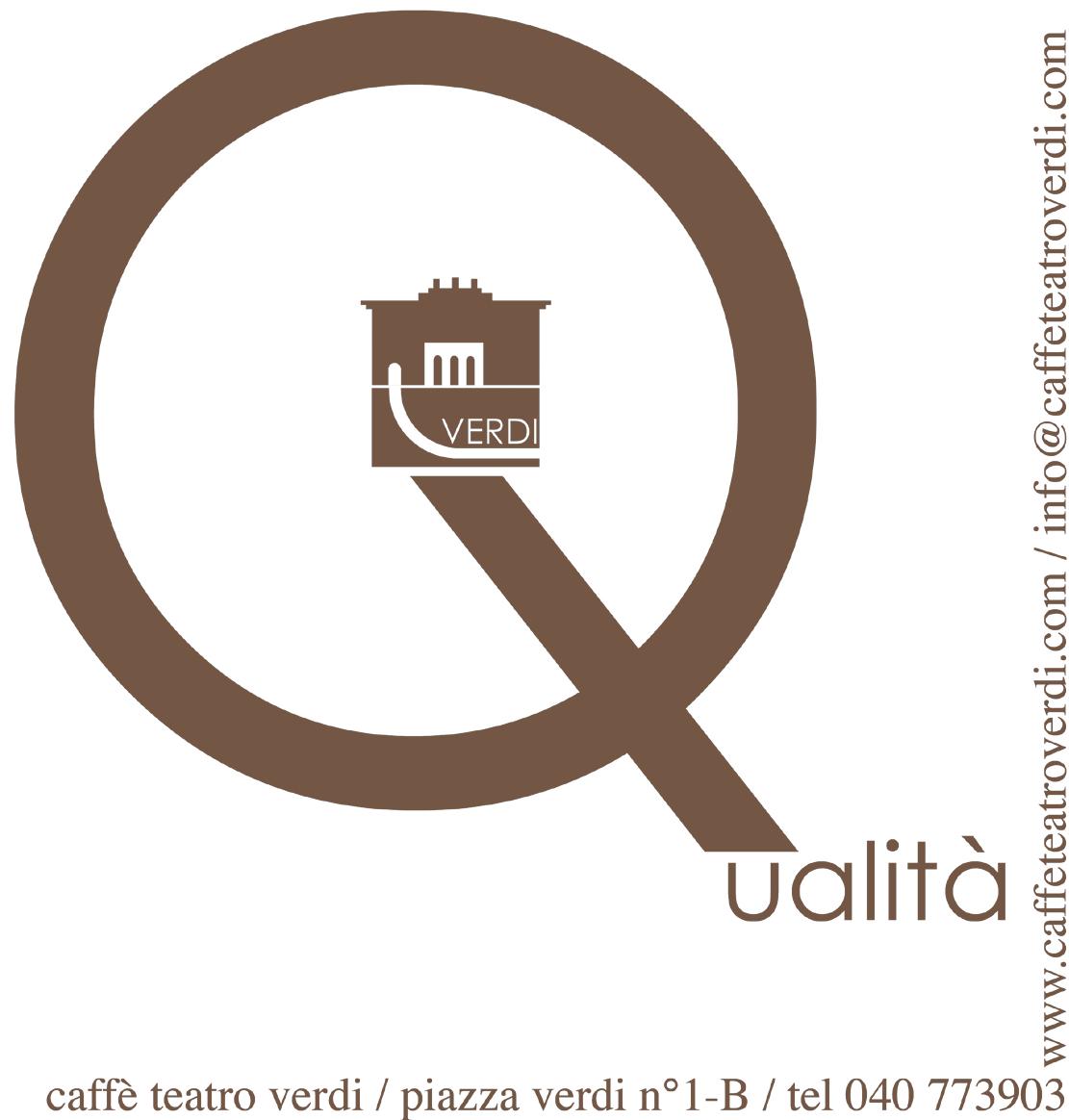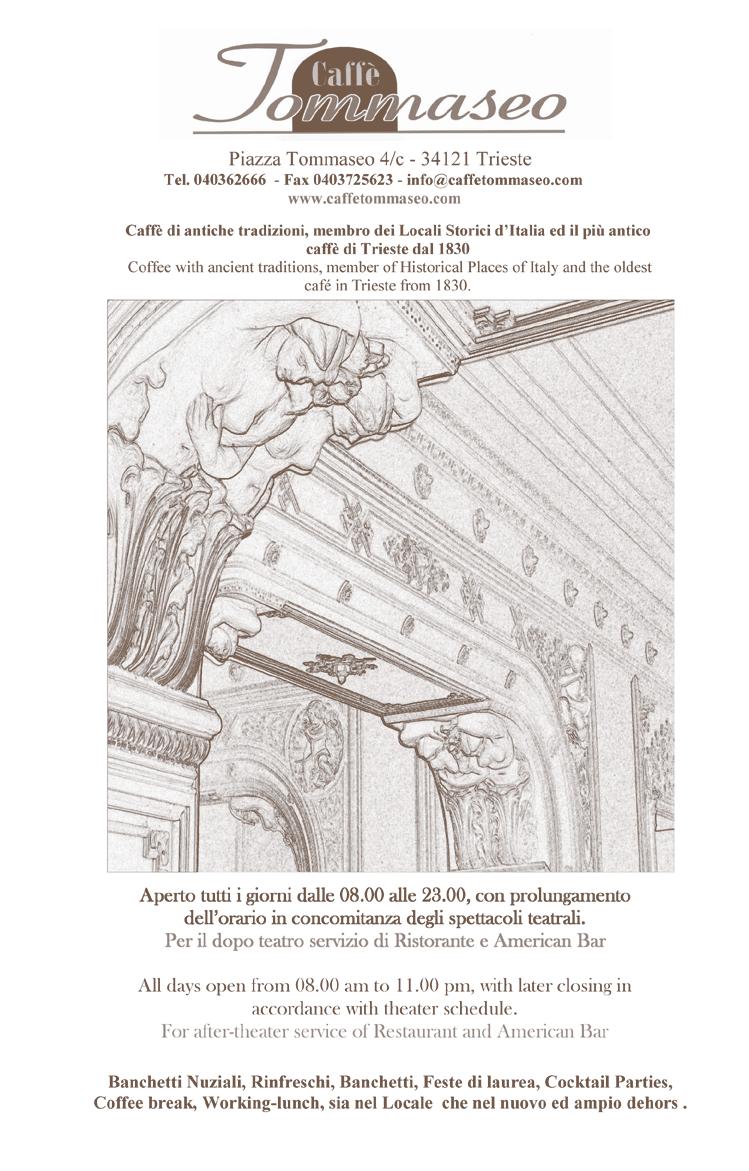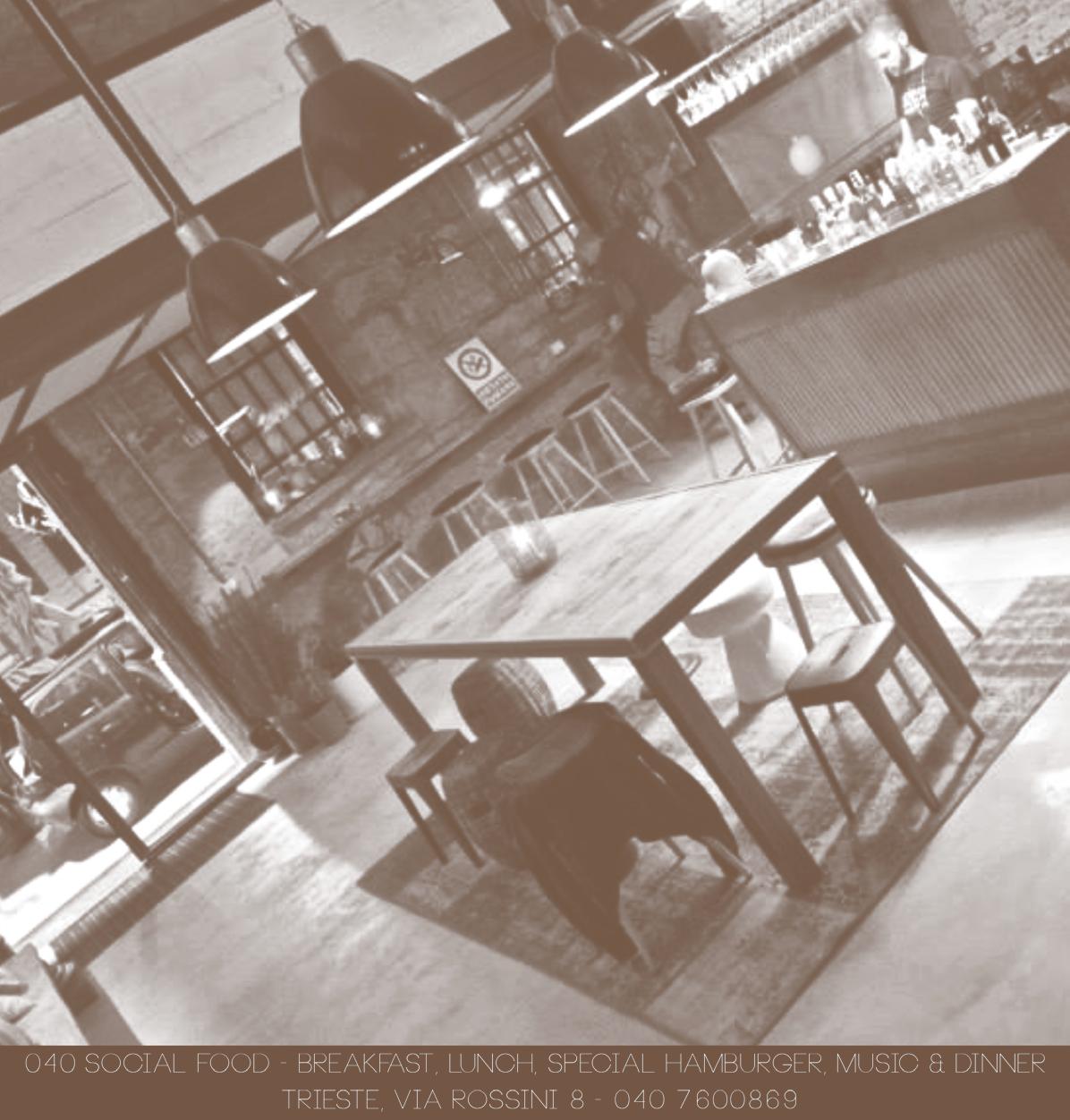TRIESTE FILM FESTIVAL
ventIcInquesIma eDIZIOne
duEMILAquATToRdIcI

Alpe Adria cinema
piazza Duca degli abruzzi 3 34132 trieste / Italia
tel. +39 040 34 76 076
fax +39 040 66 23 38 info@alpeadriacinema.it www.triestefilmfestival.it

ventIcInquesIma eDIZIOne
duEMILAquATToRdIcI

Alpe Adria cinema
piazza Duca degli abruzzi 3 34132 trieste / Italia
tel. +39 040 34 76 076
fax +39 040 66 23 38 info@alpeadriacinema.it www.triestefilmfestival.it
il principale appuntamento italiano con il cinema dell’europa centro Orientale un progetto di alpe adria cinema
25a edizione sala tripcovich / teatro miela 17-22 gennaio 2014
con il patrocinio di comune di trieste
Direzione Generale per il cinema – ministero per Beni e le attività culturali
con il contributo di
Regione autonoma Friuli venezia Giuliaassessorato alla cultura, sport e solidarietà meDIa Plus Programme of the european union ceI – central european Initiative Provincia di trieste comune di trieste
Direzione Generale per il cinema - ministero per i Beni e le attività culturali Fondazione cRtrieste ccIaa - camera di commercio ditrieste
con il sostegno di Fondazione teatro Lirico Giuseppe verdi - trieste associazione casa del cinema di trieste
Istituto Polacco - Roma Istituto slovacco - Roma
con la collaborazione di La cappella underground mattador associazione corso salani
La cineteca del Friuli FvG Film commission eye on Films
media partner mymovies.it
media coverage sky arte HD
direzione artistica
annamaria Percavassi
Fabrizio Grosoli
presidente organizzazione generale cristina sain
programmazione nicoletta Romeo
ricerca film e movimento copie monica Goti
produzione max mestroni
ufficio ospitalità
anette Dujisin-muharay
accrediti
vittoria Rusalen
con la collaborazione di ambra De nobili
catalogo a cura di
tiziana ciancetta
con la collaborazione di vittoria Rusalen, Gloria Zerbinati traduzioni
dall’italiano all’inglese Lucian comoy, andrea Zhok
dall’inglese all’italiano
tiziana ciancetta, Gloria Zerbinati
concept e layout catalogo e programma
Francesco Paolo cappellotto
stampa
tipografia stella – trieste
progetto grafico massimo miani
comunicazione, immagine coordinata e allestimenti
claimax -immagina.organizza.comunica-
sito internet
Luca Luisa
foto
Daniele Braida
sigla del festival thomas (uolli) marcuzzi
ufficio stampa catia Donini
con la collaborazione di Ilaria Zanzi e tiziana ciancetta (coordinamento incontri con gli autori)
workshop di video storytelling a cura dell’associazione Redlight workshop intensivo, riservato ad aspiranti video operatori, addetti al montaggio e giornalisti www.red-light.org
servizi tecnici giemmeallestimenti
servizi tecnici di proiezione Daniele & trevisan cinemeccanica Digital Division
proiezioni
Pietro crosilla con la collaborazione di Luca Luisa (sala tripcovich) Paolo venier (teatro miela)
sottotitoli elettronici underlight di evelyn Dewald con la collaborazione di edward catalini traduzioni
edward catalini, evelyn Dewald
promozione e servizi di sala Patrizia Pepi Gioffrè
biglietteria Rossella mestroni, alessandra Lama
servizio traduzioni Beatrice Biggio, anette Dujisin-muharay trasporti
DHL International
servizio di pick-up science Bus
Fondazione Teatro Lirico Giuseppe Verdi - Trieste
Sala Tripcovich sovrintendente claudio Orazi direttore operativo antonio tasca
Teatro Miela
direttore organizzativo
Francesco De Luca responsabile tecnico michele sumberaz sotte tecnico sala video
tommaso Benedetto
stagisti
anastasia villarosa seferiadis, Beth Jenkin
volontari
Giulia abete, chiara Baroncelli, mauro Battaglia, Beatrice Bellavere, adele Bertocchini, Francesca Bonifacio, claudia Bradamante, Beatrice Braut, Lara Brinkmann, valentina Bronzini, Rossella calianno, Diana campagnolo, soler cardenas, Giulia castelnovo, Dario cossi, simone D’anastasio, stefano Da Rui, elena Dal Pra’, Desiree Di-Leo, sarah ellero, margherita Festini, Giulio Fiore, Irene Fioresino, maria ester Fiori, Zoe Francescutto, Bianca Furioso, Diana Furlan, Giulia Gagiotti, Jessica Ghirigatto, Giuliana Giannini, tommaso Gobbo, natalia Gorbacheva, sara Guidi, Rosa Guttilla, silvia Lanotte, carolina Levorato, elena Longo, martina maiani, claudia mandalà, alessia massari, andrea mazzani, Dalila missero, virginia moscianese, michela Pascolo, Gissi Patriarca, margherita Perbellini, Gala Piazza, Ludovica Piccinini, Rajini Poselli, Leonardo Professione, Rebecca Ravelli, anna sandrini, elena sassi, sofia scanu, selene simonic, clara stavro, Roberta strazzella, matilde tiriticchio, claudia testagrossa, stefania tringali, martina trombetta, Olymar valenti, sara velenik, Rosamaria viola, sara Zanatta, Giulia Zanin, Gabriele Zilli
le sezioni del festival
concorso lungometraggi
eventi speciali e fuori concorso a cura della direzione artistica
concorso cortometraggi programma di animazione a cura di tiziana ciancetta
concorso documentari
a cura di Fabrizio Grosoli con la collaborazione di alice arecco sorprese di genere a cura della direzione artistica
italian screenings a cura di Fabrizio Grosoli
omaggio a Paradžanov a cura di Fabrizio Grosoli e Rino sciarretta
zone di cinema a cura di nicoletta Romeo
eastweek:
script writing workshop for new talents in collaborazione con Premio Internazionale per la sceneggiatura mattador coordinamento didattico di andrea magnani con la collaborazione di nicos Panayotopoulos, Pavel Jech e la cortese partecipazione di Thanos Anastopoulos e di Čedomir Kolar
come raccontare il reale (e vincere un Leone d’oro) masterclass di Gianfranco Rosi
premio corso Salani
a cura dell’associazione corso salani comitato di selezione: chicca Bergonzi, massimo causo, maurizio Di Rienzo, Grazia Paganelli, monica Rametta giuria: andrea cirla, Gloria De antoni, Francesco Di Pace coordinamento: nicoletta Romeo
tavola rotonda “qualcosa (di nuovo) nell’aria” le eccellenze del cinema ‘made in FvG’ nel 2013 con la cortese partecipazione di alberto Fasulo, matteo Oleotto e carlo Zoratti
conducono: Gloria De antoni, Oreste De Fornari con interventi di Paolo Di maira, Paolo Lughi, Luca mosso
when east meets west pitching, incontri & workshop 20-22 gennaio 2014 organizzato da Fondo per l’audiovisivo del Friuli venezia Giulia assieme a trieste Film Festival in collaborazione con eave antenna meDIa torino maia workshops eurimages
con il sostegno di meDIa Programme
miBac - Direzione Generale per il cinema
ce (central european Initiative) Regione autonoma Friuli venezia Giulia
il focus 2014 è in partnership con meDIa Desk België meDIa Desk Belgique-communauté française
meDIa Desk Luxembourg meDIa Desk nederland Luxembourg Film Fund Flanders audiovisual Fund
Wallimage centre du cinéma et de l’audiovisuel netherlands Film Fund and Film Producers netherlands
mostra
I sentieri della gloria 17 - 22 gennaio 2014, sala tripcovich Realizzata dalla cineteca del Friuli, in esposizione una quindicina di immagini scattate nel 1959 sul set del film La grande guerra dal fotografo di scena ufficiale sergio strizzi, e dai due fotografi locali, tino da udine e Donato maieron.
Esterno giorno: Trieste al cinema da corriere diplomatico a diana Passeggiata cinematografica a cura di nicola Falcinella e Beatrice Fiorentino un modo diverso di visitare la città e insieme una chiave differente per scoprire o ripercorrere la storia del cinema. ringraziamenti armenia armenFilm
austria amour Fou Filmproduktion, austrian Film commission (anne Laurent), coop99 Filmproduktion, eastWest FilmDistribution (Miriam Kienberger, Nadja Michlmayer), KGpKranzelbinder Gabriele Production, Mike Kren, spielmannFilm
Bosnia ed erzegovina ASU (Elma Tataragić), SCCA/pro.ba
Bulgaria natFa (Bojidar manov), Portokal (vanya Rainova)
croazia
Bonobostudio (vanja andrijevic), Ivana Hrelja, Hrvatski audiovizualni centar, Interfilm, Ivana Ivisic, Kinematograf, Dijana Mlađenović, Petnaesta Umjetnost (Vanja Jambrović), Propeler Film, Pulska filmska tvornica, Restart-croatia, udruga Mmc Luka (Mirjana Grahovac- Vojinović), Umasarts academy split - Film and video Department
Finlandia Helmi Films
Francia
Arizona Films, Arte, Asap Films (Čedomir Kolar), Doc & Film (Daniela elstner, alice Damiani, Hannah Horner), International Dolce vita Films, eye on Films (Ioanna stais), Films Distribution (Pauline Lallement, Sanam Madjedi), Čedomir Kolar, La Cinefacture, Les Films d’Ici, Les Films du Worso, memento Films International (marianne Klopocki, Marion Klotz), Wide Management (matthias angoulvant, chloé Jourdan), Wild Bunch (Esther Devos, Elodie Sobczak, Kevin Murphy)
Georgia Polare Film Llc
Germania
aug&ohr medien (Jenny Eitner, Markus Kaatsch), Beta cinema GmbH (cosima Finkbeiner, mariePaule Oberhauser, claudia Reimund), Deckert Distribution (Ina Rossow, vaidute Fischer), nicolas de Leval Jezierski, Detail Film, Deutsche exotik Filmproduktion GmbH (Philipp Dettmer), Deutsche Film - und Fernsehakademie Berlin GmbH-DFFB (Hella schmidt), Director’s Darling Development ug (sebastian Weyland), Filmakademie BadenWürttemberg (Heiko Schulze), Films Boutique (valeska neu, anastasia manola, marine Réchard), Global screen GmbH (claudia Rudolph-Hartmann, Gisela Wiltschek), Intuit Pictures GmbH, marcus Heep, Hochschule für Film und Fernsehen (HFF)
“Konrad Wolf” University of Film and Television (cristina marx), HupeFilm, Indiz Film uG, BeelitzFichtenwalde, annette Jung, the match Factory (David Bauduin, sergi steegman, mario Raoli, viktoria szabo), neue mediopolis Filmproduktion, Perfect shot Films, the Post Republic Halle GmbH, Rohfilm, saxonia entertainment, syrreal entertainment GmbH, unaFilm, Daniel van Westen, ZDF/arte
Grecia
Fantasia Ltd (thanos anastopoulos, stella theodorakis)
Italia academy two (Beatrice Gulino, alessandro Giacobbe, Paola Leonardi, carlo Petruni), agherose (Dorino minigutti), arsenali medicei (Gianpaolo smiraglia), associazione culturale mattador (Laura modolo, sara matijacic), associazione Plinio, axelotil Film (Gianluca arcopinto, valentina Del Buono), Giovanni Barbo, alice Bensi, Giordano Bianchi, stefano Bianchi, valter Bigatto, Pier Paolo Bisleri, Gian Paolo Bommarco, elisa Bordon, Giampietro Bortolotti, Bottega errante (mara contardo, Federica moro), Laura Bussani, Piergiorgio casotti, nicoletta cavalieri, la cineteca del Friuli, Diego cenetiempo, Roberto cosolini, sergio crechici, Davide Del Degan, Giuseppe de Lindemann, Letizia della Luna, stefano Dongetti, Doruntina Film (stefano cattini), nicoletta Dose, Barbara Fabro, Fabiola Faidiga, Patrizia Fasolato, Feltrinelli Real cinema (anastasia Plazzotta), eugenia Fenzi, vittoria Fiumi,
Gustavo La Fava, stefania Lenarduzzi, Daniel maculan, sergio mattiassich Germani, Fabio Guastini, Intrigo Internazionale (Flavia Oertwig), Istituto Luce-cinecittà, Jolefilm s.r.l. (Francesco Bonsembiante, Lucia candelpergher, Francesca Cuzzolin), Jump Cut (Luigi Pepe), KimeraFilm, Kiné Soc. Coop, La Cupa, Mansarda Production srl, mammut Film (Ilaria malagutti), martina marafatto, marechiaro Film (antonietta De Lillo, alice mariani), micci Film (Francesco miccichè), alessandro mizzi, marco moressa, nexo Digital, nomad Films (Lydia Genchi), Officina Immagini, Officine ubu (Franco Zuliani), Ojo Films (Fabio scarselli), chiara Omero, claudio Orazi, tiziana Oselladore, Pablo c/o axelotil Film, Fabio Pavan, Pilgrim Film (chiara Barbo, andrea magnani), Giovanni Piperno, Rai cinema (carlo Brancaleoni, Paola malanga), silvano Ravalico, Relief, Rete espansioni (ester Pacor), annamaria Richter, Domenico e Luisa Romeo, elisa Romeo, sky arte HD (Francesca martini, Luca Pelusi, Dino vannini), Paola sponda, stefilm, antonio tasca, Daniele terzoli, Giovanna tinunin, Gianni torrenti, tucker Film srl (sabrina Baracetti, thomas Bertacche, samantha Faccio), antonella varesano, Paolo vidali, videomante scs onlus (erica Barbiani, elena vera tomasin), elisa vladilo, I Wonder Pictures (Dario Bonazelli, Riccardo Li calzi, andrea Romeo), ZeLIG school for documentary, television and new media (eleonora Gelmo, Heidi Gronauer), Zivago media (Rino sciarretta)
Kazakistan
JCS Kazakhfilm
Kosovo n’Art Creative Studio (Bujar Kabashi)
Lettonia
Locomotive Productions, Hargla company (Laila Pakalniņa), Nacionālais Kino centrs/National Latvian Film Centre (Astra Spalvēna)
Lituania
Studio Uljana Kim
macedonia
Labina mitevska, vuk mitevski, PPFP
Polonia academy of Fine arts in Warsaw, akson studio, alter ego Pictures, canal +, DarkLight Film
Studio, Krakowska Fundacja Filmowa/Krakow Film Foundation - Polish Docs/Film Promotion Agency (Zofia Ścisłowska, Katarzyna Wilk), Piotr Litwin, NCK-National Center for Culture, Orange, OtterFilms (anna Wydra, Barbara Ziemann), PWSFTviT-Państwowa Wyższa Szkoła Filmowa, telewizyjna i teatralna im. Leona schillera, sema-for Film Foundation (anna Waszczuk), marta Sputowska, Paweł Stasikowski, Telewizja Polska s.a . (aleksandra Biernacka)
Portogallo trever Hagen, miradouro media (sándor mester)
Regno unito
Taskovski Films (Marija Knezević, Irena Taskovski, Kate Feeny), Vez Film Ltd (Federico Ferrone, michele manzolini)
Repubblica ceca Česká televize, Eliška Chytková, Czech Film Center (Daniela Hurábová), DokWeb/east silver (anna Kaslova), FAMU (Helena Zajicová), Hypermarket Film, Libor nemeškal, midpoint central european Script Center, Produkce Třeštíková s.r.o. (Hanka Třeštíková), Eva Zaoralová
Romania
4 Proof Film (anamaria antoci, monica Lazurean Gorgan), 42 KM Film, HiFilm (Ioana Draghici, Ada Solomon), UNATC (Doru Nițescu)
Russia
alona Rubinshtein (elena chmelevkaja), antipode Film sales (alina Lobzina, elena Podolskaja), cultural Initiative Film company, nina Govorova, studio vertov
serbia
FDU (Stefan Arsenijević, Srdjan Koljević), Film House Baš Čelik (Jelena Mitrović), Horopter Film Production (Mladen Kovačević), Zillion Film
slovacchia
Bfilm s.r.o. (Peter Badač), Monika Carta, FTVVSMU (Alena Bodingerova, Mária Ridzoňová
Ferenčuhová), MPhilms (Dominika Fáberová, Zdenka Pepelová), Tomas Bata University in Zlín
slovenia
aGRF t (miroslav mandic), Filmski sklad, Friendly Production, Nerina Kocjančič, Damjan Kozole,Uwe
Laysiepen (ulay), Dušan moravec, no History (Špela Čadež), Petra Pan Film (Petra Seliškar), Restart-slovenia, Škuc, triglav Film, vertigo Emotionfilm (Jana Flego, Danijel Hočevar)
svizzera
Aurelio Buchwalder, ZHDK-Zürcher Hochschule der Künste Fachrichtung Film studiengang ucraina
Interfilm Production studio (Olena Fetisova), Odessa Film Festival (Denis Ivanov, Julia sinkevych)
ungheria
Éclipse Film (Julianna ugrin), eLte (Gábor Ferenczi), Eszter Hajdu, Hunnia Filmstudio Kft, KMH Film (Linda Pfeiffer), Magyar Filmunió (Márta Bényei), Orsi Nagypal, Judit Pintér, Ágnes Sós, SZFE (Ildikó Ságodi)
ci hanno aiutato a rendere questa edizione ancora più bella e ospitale alex Benvenuti e Barbara Favretto (Hotel Duchi D’aosta - trieste), sabrina e manuel costantini (urban Hotel Design - trieste), Renato Danelone (Idea Grafica - udine), ambra Declich e michele Grandi (Pepenero Pepebianco - trieste), alexandros Delithanassis (caffè san marcotrieste), Franco Delli (starhotels savoia excelsiortrieste), niky Fabiani (Ideando pubblicità - udine), elena Giuffrida (Ginger - trieste), Walter Gustin (040 social Food - trieste), alessandro Lucchetta e maria Rosa Lokar (Hotel continentale - trieste), carlo maiorana e Liana casaretti (nH Hoteltrieste), massimo Pandullo (utilgraph - trieste), elena Parovel (Parovel vini e vigneti), Giulia e michela Riosa (Zudecche 1 B&B - trieste), claudia Rolando e adriana attanasio (caffè teatro verdi - trieste), Giancarlo tomini (caffè tommaseotrieste)
si ringraziano per essere intervenuti thanos anastopoulos (Grecia), erica Barbiani (Italia), Thomas Bertacche (Italia), Rok Biček (slovenia), miriam Bliese (Germania), Francesco Bonsembiante (Italia), nadeshda Brennicke (Germania), vinko Brešan (croazia), aurelio Buchwalder (svizzera), manuela Buono (Italia), Francesca cima (Italia), andrea cirla (Italia), mattia colombo (Italia), Gloria De antoni (Italia), Oreste De Fornari (Italia), Luciano De Giusti (Italia), Paolo Di maira (Italia), Francesco Di Pace (Italia), Fulvia Farassino (Italia), alberto Fasulo (Italia), Federico Ferrone (Italia), Olena Fetisova (ucraina), Lidia Genchi (Italia), Yervant Gianikinan (Italia), eszter Hajdú (ungheria), Roman Jarosz (Polonia), Pavel Jech (Repubblica Ceca), Vytautas Kaniusonis (Lituania), Čedomir Kolar (Francia), Bartek Konopka (Polonia), Mladen Kovačević (Serbia), Frank uwe Laysiepen uL aY (slovenia), Piotr Litwin (Polonia), alessandra Locatelli (Italia), Paolo Lughi (Italia), Luca magi (Italia), Davide maldi (Italia), vitalij manskij (Russia), michele manzolini (Italia), Francesco micciché (Italia), vuk mitevski (macedonia), Dijana mladenovic (croazia), Dušan moravec (slovenia), Luca mosso (Italia), Orsi nagypál (ungheria), matteo Oleotto (Italia), margherita Orkiszewska salani (Italia), Boris Pahor (Italia), nicos Panayotopoulos (Grecia), Giovanni Piperno (Italia), Igor Princic (Italia), Yusup Razykov (Russia), angela Ricci Lucchi (Italia), Gianfranco Rosi (Italia), alena Rubinštein (Russia), Diego scano (Italia), Rino sciarretta (Italia), nebojsa slijepcevic (croazia), Gianpaolo smiraglia (Italia), Ágnes Sós (Ungheria), János Szász (Ungheria), Andrei Tănase (Romania), Nadia Travisan (Italia), vasili vikhliaev (moldavia), Luca Zambolin (Italia), carlo Zoratti (Italia)
i premi del Trieste Film Festival
Premio trieste assegnato dal pubblico al miglior lungometraggio in concorso (euro 5.000)
Premio alpe adria cinema assegnato dal pubblico al miglior documentario in concorso (euro 2.500)
Premio tFF corti assegnato dal pubblico al miglior cortometraggio in concorso (euro 2.000)
Premio ce (central european Initiative) al film che meglio interpreta la realtà contemporanea e il dialogo tra le culture (euro 3.000)
Premio corso salani assegnato dalla giuria (andrea cirla, Gloria De antoni, Francesco Di Pace) al miglior work in progress italiano offerto dall’associazione corso salani (euro 8.000)
Premio “espansioni” assegnato dall’omonima rete a una donna distintasi in un settore del cinema
un particolare ringraziamento al comune di trieste e alla Fondazione teatro Lirico “Giuseppe verdi” di trieste per aver reso possibile l’utilizzo della sala tripcovich quale sede della manifestazione
alpe adria cinema aderisce a aFIc - associazione Italiana Festival cinematografici
con il patrocinio di
comune di trieste
Direzione Generale per il cinema
– ministero per i Beni e le attività culturali
con il contributo di
Regione autonoma Friuli venezia Giulia
– assessorato alla cultura, sport e solidarietà
meDIa Plus Programme of the european union
ceI – central european Initiative
Provincia di trieste
comune di trieste
Direzione Generale per il cinema - ministero per i Beni e le attività culturali
Fondazione cRtrieste
ccIaa – camera di commercio di trieste
con il sostegno di
Fondazione teatro Lirico Giuseppe verdi – trieste
associazione casa del cinema di trieste
Istituto Polacco – Roma
Istituto slovacco – Roma
con la collaborazione di
La cappella underground
mattador
associazione corso salani
La cineteca del Friuli
FvG Film commission
eye on Films
media partner
mymovies.it
Trieste Film Festival ringrazia
Rete espansioni
ospitalità
Hotel continentale
Grand Hotel Duchi d’aosta
savoia excelsior Palace
urban Hotel Design
nH Hoteles, trieste
Zudecche 1 Bed&Breakfast
happy hour caffé teatro verdi
040 social Food
caffè san marco Ginger cene Parovel
Pepenero Pepebianco
incontri stampa caffé tommaseo
comunicazione, immagine coordinata e allestimenti: claimax -immagina, organizza, comunicarealizzazione: Ideagrafica, utilgraph, Ideando pubblicità
servizi web spin Internetworking

















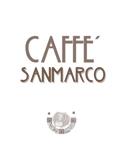




media coverage by
sky arte HD




nelle sezioni del catalogo è stato rispettato l’ordine alfabetico per titolo. Fa eccezione la sezione “Omaggio a Sergej Paradžanov” che rispetta l’ordine cronologico. alphabetical order for the titles has been maintained in the various sections of the catalogue. the only exception is “a tribute to sergei Paradjanov” which follows chronological order.
PRESENTAZIoNI IntRODuctIOns
coNcoRSo LuNGoMETRAGGI
FeatuRe FILm cOmPet tIOn I film the Films
FuoRI coNcoRSo Out OF cOmPetItIOn
EVENTI SPEcIALI
sPecIaL events I film the Films
Grandi maestri e Trieste
Great masters and trieste
Trieste FF ArtHouse
1914-2014 I cento anni della Grande Guerra
1914-2014 One Hundred Years from the Great War
SoRPRESE dI GENERE
GenRe suRPRIses I film the Films
coNcoRSo coRToMETRAGGI
sHORt FILm cOmPet tIOn
PRoGRAMMA dI ANIMAZIoNE an matIOn PROGRamme I film the films
coNcoRSo docuMENTARI DOcumentaRY cOmPetItIOn I film the Films
FuoRI coNcoRSo Out OF cOmPet tIOn
AI coNFINI dEL SuoNo sOunD ZOne I film the Films
OMAGGIO A SERGEJ PARADŽANOV a tRIBute tO seRGeI PaRaDJanOv
Introduzione (Annamaria Percavassi)
Introduction (annamaria Percavassi) I film the Films
ZoNE dI cINEMA cInema ZOnes
Introduzione (Nicoletta Romeo)
Introduction (nicoletta Romeo)
EASTWEEK
Scriptwriting Workshop for New Talents (Andrea Magnani) Trainer
Progetti selezionati selected Projects
MASTERcLASS
EVENTI coLLATERALI sIDeBaR events
When East Meets West Italian Screenings Premio corso Salani 2014 corso salani award 2014 Shortlist
REPERToRIo dEI PRoduTToRI E dISTRIBuToRI ESISTENTI InDeX OF PResent PRODuceRs anD DIstRIButORs
INdIcE dEI FILM nDeX OF FILms
INdIcE dEI REGISTI nDeX OF DIRectORs
gianni torrenti
assessORe aLL a cuLtuRa, sPORt e sOLIDaRIetà ReGIOne autOnOma FRIuLI veneZIa GIuLIa FRIuLI veneZIa GIuLIa ReGIOnaL cOuncILLOR FOR cuLtuRe, sPORt anD sOcIaL cOHesIOn
nato 25 anni fa con il nome di “alpe adria cinema – Incontri con il cinema dell’europa centro Orientale” (a ricordo dell’allora nascente comunità di Lavoro alpe adria) oggi diventato tFF, il trieste Film Festival rinnova ogni anno un ponte lanciato verso l’est europeo da una porta, la città di trieste, prima stretta e poi finalmente spalancata sulla nuova geopolitica europea. negli anni della guerra, tra le repubbliche dell’ex-Jugoslavia, il festival ha rappresentato l’unico filo diretto con i Balcani, a dimostrazione che la cultura, da sempre, resta l’unico dialogo possibile, in grado di permettere il colloquio tra i popoli in un confronto non solo estetico ma principalmente di civiltà, che si rinnova nella conoscenza dell’altro e nella dose di coraggio che ogni essere umano sviluppa nella propria formazione intellettuale.
Il festival è cresciuto nel corso degli anni. Fin dall’inizio la manifestazione ha offerto al suo pubblico lungometraggi di fiction, documentari, cortometraggi, lavori di video arte, clip musicali e pubblicitari per dare un quadro esaustivo di quello che accadeva nel panorama dell’audiovisivo d’oltreconfine, e fin dalle sue prime edizioni c’è stata l’intuizione, a quei tempi lungimirante, di affiancare al festival eventi collaterali e nuove attività importanti per la nostra regione, storicamente a vocazione ‘cinéphile’. Il pubblico è cresciuto diventando internazionale, gli ospiti sono stati innumerevoli nel corso degli anni e la manifestazione ha saputo coinvolgere attivamente il tessuto cittadino: oltre alle sale cinematografiche, il festival si è espanso nei teatri, nei musei, nelle biblioteche, negli alberghi, nei caffè e in altri luoghi di ritrovo, a dimostrare quanto la città sia partecipe dell’evento. Oltre alla consueta panoramica di film e ai tradizionali concorsi gli organizzatori hanno puntato a nuove partnership di rete grazie al rafforzamento di due interessanti progetti: lo sviluppo del settore industry con WemW (When east meets West) e un’area dedicata alla formazione. Dalla scorsa edizione, il Festival ha affiancato a WemW - il forum di incontro organizzato dal Fondo Regionale per l’audiovisivo FvG con eave, euRImaGes e central european Initiative - gli “Italian screenings”, una sezione aperta al pubblico in cui vengono invitati sales agent internazionali a visionare una selezione di film italiani che non hanno ancora una distribuzione internazionale.
In ambito formativo, il progetto EASTWEEK creerà quest’anno il primo ‘talent campus’ europeo di storytelling per studenti provenienti dalle
Born 25 years ago with the name of “alpe adria cinema: encounters with the cinema of central and eastern europe” (the name was a reference to the then budding alps-adriatic Working community, known in Italian as “comunità di Lavoro alpe adria”), the tFF acts annually as a bridge with eastern europe and is based in trieste, an ideal outpost and gateway to the new geopolitical landscape of a europe now fully opened up to the West.
at the time when the member states of the former Yugoslavia were at war with each other, the Festival was unique in maintaining an open access to the Balkans, which demonstrates how culture has always been the only true door to dialogue between different peoples, as it allows individuals to engage in meaningful discussions about art, and in so doing to get to know each other and develop a sense of courage through one’s intellectual development.
the Festival has grown over the years. From its very start, the event had offered its audiences as comprehensive a snapshot as possible of the audiovisual production from its countries of choice, through a range of feature films, documentaries, shorts, video art installations, music and commercial clips. also, quite early on the organisers had the foresight to combine the main festival with a host of side events and local initiatives that have proved invaluable in a Region such as ours, where cinema has always been cherished. Over time audiences have become more international and there have been countless guests, but the event has always been able to actively engage the city, involving not only its cinemas but also spilling out into its theatres, museums, libraries, hotels, cafés and other public places, which shows just how much the city responds to the event.
as well as catering for the traditional selection of films and competitions, the organisers have also invested in new partnerships and networking schemes by strengthening two existing initiatives: the development of the industry sector with WemW (When east meets West) and a section dedicated to education and training projects.
From last year, WemW (the forum organised by the FvG Regional audiovisual Fund with eave, euRImaGes and the central european Initiative) has been supplemented with Italian screenings - a section open to the public where international sales agents are invited to view a selection of Italian films, which are still without international distribution. Outreach and educational activities are represented by the EASTWEEK
migliori scuole di cinema dell’europa centro Orientale, il cui vincitore avrà accesso al workshop per sceneggiature mIDPOInt, prestigioso laboratorio europeo di scrittura per il cinema con sede a Praga. auguro al festival di continuare a tastare in modo efficace il polso di quest’area che, anche dopo l’ingresso della croazia in europa, sta diventando economicamente sempre più influente e strategica per la nostra collocazione regionale e aggiungo un affettuoso saluto per il traguardo e per gli impegni futuri.
section, which this year will create the first european storytelling ‘talent campus’ for students coming from the best cinema schools of central and eastern europe. the winner will be given access to mIDPOInt - the prestigious european screenwriting workshop based in Prague. wish the Festival to continue to explore this area, which, after croatia’s recent entry in the eu is becoming economically more and more influential and strategic for our Region. my congratulations to the tFF for all its achievements to date and my best wishes for all its future projects.
maria teresa Bassa PoroPat
PResIDente DeLL a PROvInc a DI tRIeste
PResIDent OF tHe tRIeste PROvIncIaL aDmInIstRatIOn
tra i festival cinematografici più conosciuti e consolidati a livello internazionale, trieste Film Festival celebra nel 2014 venticinque anni di attività e rafforza l’idea di un territorio, quello della provincia di trieste, aperto e senza confini, capace di produrre cultura e al tempo stesso creare economia compiendo un’importante azione di promozione. In un momento di crisi e di povertà, di difficoltà nella ideazione e creazione di nuovi modelli creativi capaci di rappresentare leve autentiche per la crescita delle imprese culturali, la città, grazie al sistema cinema, si conferma laboratorio attivo e ricco di iniziative che si susseguono costanti e producono proposte sempre qualitativamente elevate ed apprezzabili. espressamente dedicato alla cinematografia dell’europa centro-orientale, trieste Film Festival interpreta il ruolo di cerniera geograficamente aperta ad est che appartiene a quest’area, ponte di collegamento e comunicazione tra il mondo occidentale e quei paesi che un tempo venivano definiti d’oltrecortina. Particolarmente ricco il programma costruito per questa edizione con oltre 130 pellicole, tante anteprime internazionali e nazionali di lungometraggi, cortometraggi e documentari. a ciò si affiancano eventi speciali, celebrazioni, omaggi ad autori noti e spazi ritagliati per i nuovi talenti e per giovani studenti delle scuole di cinema dell’area. come giustamente definito dagli organizzatori, cui va il plauso dell’amministrazione per l’impegno alimentato negli anni da passione e professionalità, il festival diviene quindi una “palestraginnasio-officina” capace di indagare con costanza ed intuizione i nuovi ambiti della cinematografia. Le giornate triestine dal 17 al 22 gennaio costituiscono poi un’occasione privilegiata di incontro tra autori, attori, addetti del cinema provenienti dalla vasta area geografica esplorata, ed un’opportunità da non perdere per tutti coloro che sono accomunati dalla passione per il cinema.
In 2014 the trieste Film Festival celebrates its 25th anniversary. During this period, the Festival has become one the best-known and most established international film festivals, while always continuing its mission to pursue and promote the identity of our territory - trieste and its province - as an open and welcoming place, where the production of culture has also had a significant impact on boosting the local economy. Indeed, despite the current financial crisis, which has generally depressed the creation of new productive models in the cultural industries, this city has consistently proved able to come together and find real synergies around cinema, producing high-calibre events throughout the year with its rich range of successive and established initiatives. Being dedicated to the cinema of central and eastern europe, the trieste Film Festival has played a vital role in opening our area to the east, and acting as a bridge towards those countries which in the past used to be separated from the West by the so-called Iron curtain. this year’s programme - presenting over 130 films - is especially rich, with many features, shorts and documentaries receiving their international and national premières in trieste, as well as special events, celebrations, tributes to famous directors and dedicated arenas for fostering new talent and for cinema students from many countries. as its organisers - whose continued commitment, passion and professionalism I would very much like to commend - justly put it, the Festival becomes therefore a kind of “training ground-cum-school-cum-workshop” capable of exploring the new frontiers of cinema year after year with renewed insight. Between the 17th and 22nd January, trieste will be hosting authors, actors, and industry insiders from all over the vast geographical area covered by the Festival, offering all of them a unique opportunity to meet at an event which has become unmissable for all those who share a passion for cinema.
Franco miracco assessORe aLL a cuLtuRa DeL cOmune DI tRIeste cOuncILLOR FOR cuLtuRe mun cIPaLItY OF tRIeste
Giunge alla XXv edizione il triesteFilm Festival. nato in un periodo in cui trieste si trovava al confine anche politico di due modi diversi di concepire il mondo, la manifestazione continua ad essere capace di rappresentare e capitalizzare il significato geografico e culturale che tuttora la nostra città riveste. ma ciò non vuol dire che la natura del festival sia fondata sul passato, anzi: lo dimostra la felice intuizione, con “When east meets West” (il cui intento è “creare un ponte tra le imprese audiovisive dell’europa dell’est e dell’Ovest”), di trasformarsi anche in fertile luogo di scambio di idee fra Paesi diversi e di incentivare, così, le coproduzioni internazionali con particolare riferimento all’area centroeuropea. come pure proiettato al futuro è il progetto “eastweek”, con workshop assieme ad alcuni dei maggiori esponenti dell’industria cinematografica europea. Le numerose sezioni in cui si articola un programma ricco di contenuti e di spunti completano un festival cinematografico a tutto tondo, che dalla passata edizione ha trovato una nuova sede nella sala tripcovich grazie anche all’impegno dell’amministrazione comunale, a dimostrazione del fatto che la cultura può e deve continuare ad essere al centro della vita cittadina.
the trieste Film Festival has now reached its 25th edition. Founded during a period in which trieste was on a border that was a political one dividing two different ways of seeing the world, the festival has continued to succeed in depicting and building upon the geographical and cultural significance that still characterises our city. But this does not mean that the festival’s nature is based on the past; quite the opposite, as is demonstrated by the felicitous intuition, with “When east meets West” (the aim of which is to “create a bridge between the audiovisual companies of eastern and Western europe”), of transforming itself into a fruitful meeting place for exchanges of ideas between countries. In so doing, it provides an incentive for international co-productions with a particular focus on central europe. another forward-looking feature is the “eastweek” section, with workshops in the company of some of the leading exponents of the european film industry. the numerous sections into which the denselypacked programme is divided go to form a wide-ranging film festival full of fascinating offerings and stimuli. since the last edition, it has a new centre at the sala tripcovich thanks in part to the commitment of the municipality, in demonstration of the fact that culture can and must continue to be at the centre of the city’s life.
amBasciatore
giovanni caracciolo di vietri
seGRetaRIO GeneRaLe InIZIatIva centRO euROPea
amBassador
giovanni caracciolo di vietri
secRetaRY GeneRaL centRaL euROPean InItIatIve
Il 2014 rappresenta un anno speciale per il trieste Film Festival, che festeggia il suo venticinquesimo anniversario. siamo particolarmente lieti di essere partner di questo prestigioso evento e di partecipare alle celebrazioni insieme agli altri amici del Festival.
è un anno importante anche per la nostra Organizzazione, che celebra venticinque anni dalla sua fondazione. è un’occasione particolare per l’Iniziativa centro europea (Ince) per riflettere sul passato, guardare avanti e impegnarsi in nuove sfide.
Fondata nel 1989 da Italia, austria, ungheria e Iugoslavia, nel corso degli anni l’Ince è diventata la più ampia iniziativa di cooperazione regionale fino a comprendere 18 Paesi dell’europa centrale, orientale e sudorientale.
Fin dalle origini, l’Ince ha saputo adattarsi ai grandi cambiamenti storici in europa diventando un attore fondamentale per la promozione della cooperazione regionale a favore dell’integrazione europea, contribuendo a sostenere la riconciliazione, il dialogo, la stabilità e la prosperità nella regione.
Promuovere il dialogo interculturale e il rispetto delle diversità culturali - elementi fondanti di una società democratica - è al centro della nostra missione. Per questo motivo, l’Ince sostiene numerose attività che favoriscono collaborazioni, scambi di esperienze, mobilità. attraverso specifiche iniziative, come premi e le borse di studio, desideriamo inoltre valorizzare e incoraggiare le persone di talento, soprattutto i giovani, della nostra area.
In questo ambito, la nostra collaborazione con il trieste Film Festival rappresenta un’esperienza di successo. Il Festival offre una retrospettiva della produzione cinematografica di qualità e non commerciale dei Paesi dell’europa centro-orientale ed è per noi motivo di soddisfazione averlo sostenuto nel corso degli anni. Promuovere la produzione cinematografica dei Paesi dell’Ince, offrire opportunità di formazione agli studenti delle scuole di cinema, favorire collaborazioni e coproduzioni sono attività che aderiscono perfettamente alla nostra strategia in campo culturale.
Per gli anni a venire, l’Ince è impegnata a sostenere settori creativi, in linea con le priorità stabilite anche a livello europeo. I settori creativi, infatti, svolgono un ruolo chiave per lo sviluppo sostenibile e la coesione sociale e possono contribuire efficacemente ad affrontare le sfide economiche e sociali del nostro tempo.
2014 represents a special year for the trieste Film Festival, since it marks its 25th anniversary.
We are particularly pleased to be a partner of this outstanding event and to participate in the celebrations together with the other friends of the Festival.
It is an exceptional year also for our Organisation, celebrating its 25th anniversary as well. this is an opportunity for the central european Initiative (ceI) to look into the past, move ahead and embark on new challenges.
established in 1989 by Italy, austria, Hungary and Yugoslavia, over the years the ceI has become the largest regional initiative comprising 18 member states of central, eastern and south-eastern europe. since its inception, the ce has successfully adapted to major historical changes in europe and has become a key actor in promoting regional cooperation for european integration, thus contributing to fostering reconciliation, dialogue, stability and prosperity in the region.
Promoting intercultural dialogue and respect of cultural diversities - as fundamental elements of a democratic society - is at the core of our mission. this is why we support a wide range of activities endorsing experience sharing, networking and mobility. through special initiatives, such as awards and fellowships, we also wish to compliment and encourage talented and often young people from our region.
In this framework, our long-established partnership with the trieste Film Festival represents a success story. the Festival offers a retrospective of the non-commercial and quality filmmaking production from central and eastern europe and we are proud we have supported it over the years. Promoting the cinema production of ceI countries, offering training opportunities to students of cinema schools, encouraging networking and coproduction are the major assets of the trieste Film Festival, which fully fit into our strategy within the field of culture.
For years to come, the ceI will strongly be committed to supporting the creative sectors, in line with the priorities set at european level. these sectors play a key role for sustainable development and social cohesion and could highly contribute to facing current economic and social challenges.
unione europea - PROGRAMMA MEDIA european union - MEDIA PROGRAMME
L’euROPa ama FestIvaL euROPeI
euROPe LOves euROPean FestIvaLs
I festival, luogo privilegiato di incontri, scambi scoperte, rappresentano il contesto più vibrante e accessibile in cui presentare l’ampia varietà di talenti, storie ed emozioni che compongono la cinematografia europea.
Il Programma meDIa dell’unione europea ha lo scopo di promuovere il patrimonio audiovisivo europeo e di incoraggiare la circolazione dei film fra un paese e l’altro, sostenendo inoltre la competitività dell’industria audiovisiva. Il Programma meDIa riconosce, infatti, il ruolo culturale, educativo, sociale ed economico giocato dai festival, contribuendo ogni anno al finanziamento di 100 di essi in tutta europa.
sono festival che si distinguono per la loro ricca e variegata programmazione europea, per le possibilità che offrono a professionisti e pubblico di incontrarsi ed entrare in relazione, per le attività che portano avanti a favore di giovani professionisti, per le iniziative formative che promuovono e l’importanza che attribuiscono al consolidamento del dialogo interculturale. nel corso del 2013, i festival sostenuti dal Programma meDIa hanno presentato complessivamente più di 20.000 opere provenienti da tutta europa a un pubblico di appassionati di cinema composto da circa 3 milioni di persone.
MEdIA è lieto di sostenere la 25ma edizione del Trieste Film Festival ed estende i suoi migliori auguri a tutti i frequentatori del festival perché siano spettatori di un evento divertente e stimolante.
A privileged place for meetings, exchanges and discovery, festivals provide a vibrant and accessible environment for the widest variety of talent, stories and emotions that constitute Europe’s cinematography.
the meDIa Programme of the european union aims to promote european audiovisual heritage, to encourage the transnational circulation of films and to foster audiovisual industry competitiveness. the meDIa Programme acknowledges the cultural, educational, social and economic role of festivals by co-financing every year almost 100 of them across europe.
these festivals stand out with their rich and diverse european programming, networking and meeting opportunities for professionals and the public alike, their activities in support of young professionals, their educational initiatives and the importance they give to strengthening inter-cultural dialogue. In 2013, the festivals supported by the meDIa Programme have programmed more than 20.000 screenings of european works to nearly 3 million cinema-lovers.
MEdIA is pleased to support the 25th edition of the Trieste Film Festival and we extend our best wishes to all of the festival goers for an enjoyable and stimulating event.
http://ec.europa.eu/culture/media/fundings/festivals/index_en.htm
nel 1987, per iniziativa del centro La cappella underground, di cui eravamo soci fondatori e programmatori, trovammo il coraggio e la capacità, entrambi lodevoli per quel tempo, di convocare qui a trieste nel mese di dicembre più autorevoli rappresentanti della politica, delle pubbliche istituzioni e della cultura di quella vasta area d’europa situata a cavallo del complesso confine con cui conviviamo e che allora separava due mondi contrapposti e apparentemente destinati a non collaborare mai, l’est e l’Ovest (simbolizzati dal grande muro di Berlino ancora in piedi, così come – per noi – dai modesti paletti ormai divelti che ancora dividevano campi del carso): volevamo chiedere a tutti la collaborazione su un progetto cui stavamo lavorando da tempo, un progetto di apertura culturale che provasse a ignorare quel confine con le sue barriere concrete e simboliche e consentisse la libera circolazione di quanto un settore specifico che ci interessava, il cinema, aveva prodotto in quell’area d’oltre confine negli anni cancellati dal silenzio e aprisse i depositi infiniti delle opere censurate, negate, condannate rendendole visibili all’Occidente con un appuntamento annuale in un luogo da concordare. nessuno di noi organizzatori di tanta provocatoria audacia osava immaginare che quel progetto utopico sarebbe stato approvato subito e all’unanimità da quel consesso internazionale, che lo considerò immediatamente una proposta culturale di indubbio interesse comunitario, cui tutti i paesi presenti avrebbero dovuto sentire il dovere di aderire e partecipare, e stabilì che la sede più adeguata per ospitare l’incontro annuale fosse trieste e che l’organizzazione dell’evento spettasse a noi ideatori. s trattava del primo progetto sul cinema che nasceva sotto l’egida della comunità di Lavoro alpe adria e certamente nessuno di noi avrebbe potuto nemmeno ipotizzare che con quel progetto nuovo, ancora tutto da ideare e costruire, saremmo riusciti a festeggiare le nozze d’argento. quel progetto invece, nato come alpe adria, aree cinematografiche a confronto con una piccola edizione zero che offrì in tre soli giorni un esaustivo esempio di ciò che la manifestazione avrebbe cercato di proporre in futuro, ha saputo mettere da subito solide radici alimentate dalla tradizione cinefila della città e dal lavoro scrupoloso del comitato scientifico internazionale, che ha costantemente monitorato la produzione dei singoli paesi responsabilizzandosi sulla costruzione dei programmi. questo solido lavoro di gruppo iniziale ha consentito alla manifestazione di farsi di anno in anno testimone di eventi epocali e di documentare senza interruzioni il tragico lungo periodo della guerra balcanica, di seguire con attenzione il faticoso processo di transizione di quei paesi
In 1987, through the initiative of the centro La cappella underground, of which we were founding members and programmers, we found the courage and capacity – both rather unusual for the time – to invite in trieste leading representatives from the worlds of politics, public institutions and culture picked from a vast area of europe located on either side of the complex border we live with and which at the time separated two opposing worlds that then seemed destined never to collaborate: the eastern and Western europe divide (symbolised by the Berlin Wall and, locally for us, by the modest cement posts that then divided the uplands of the carso). Our intention was to ask them all to collaborate on a project we had been working on for some time, in which we sought to effect a cultural openness aiming to ignore that border, with its concrete and symbolic barriers and thus enable the free circulation of products created within a sector of interest to us – cinema. ultimately, we were interested in what the film industry had produced in that area beyond the border during the years of silence; we wanted the enormous archives of censured, rejected and condemned films to be opened and the works made visible in the West at an annual event to be held in a place to be agreed. none of us who were organising this provocative and bold meeting dared imagine that the utopian project would immediately and unanimously be approved by this international gathering, which considered it a cultural proposal of evident community interest, one that all the countries present should feel the need to support and participate in. the same meeting established that the most appropriate venue for the annual event was trieste and that it should be up to us who had dreamed up the idea to organise it. this was the first cinema project to be see the light of day under the aegis of the comunità di Lavoro alpe adria, and certainly none of us could ever have thought that this new project, which at the time was just an idea that needed much planning and work to organise, would eventually celebrate its silver wedding. Yet the project, which began with the name of alpe adria, aree cinematografiche a confronto and offered a small zero edition with a comprehensive example in just three days of what the event would seek to propose in future, immediately put down solid roots, thanks in part to the city’s solid cinephile tradition and to the scrupulous work put in by the international scientific committee, which has constantly monitored the production of the single countries, taking responsibility for putting together the programmes. this solid group work at the outset enabled the festival each year to be the reflector of epoch-changing events and document without interruption the long and tragic period of the Balkan
verso l’indipendenza e la democrazia e il loro difficile percorso ancora in atto per il raggiungimento dei requisiti necessari alla loro graduale integrazione nell’unione europea. seguendo passo passo il percorso della storia che nell’ultimo decennio del secolo scorso ha cancellato confini e cambiato equilibri internazionali il nostro progetto iniziale ha modificato gradatamente fisionomia, nome, obiettivi, estendendo lo sguardo ad aree geografiche via via più lontane ma accomunate non solo da un passato unificante e dalle problematiche metamorfosi del nuovo presente, ma anche dalla forza delle loro risorse culturali e, per quanto riguarda il cinema, dalla serietà delle loro scuole, dalla ricchezza dei loro archivi, dalla grandezza autoriale del loro passato e dal coraggioso fermento delle giovani generazioni che con molta fermezza hanno saputo svincolarsi dai canoni dogmatici di un’epoca ormai tramontata e conquistare a poco a poco l’attenzione dei mercati internazionali e riconoscimenti prestigiosi dei grandi festival del mondo occidentale. Ripercorrendo questi lunghi anni di continua ricerca e di proposte su una parte del cinema europeo un tempo ignorata, e oggi contesa, possiamo concederci un giusto moto di orgoglio per lo straordinario gruppo di lavoro che si è formato attorno a queste idee e che è cresciuto negli anni assieme al festival aiutandolo a consolidarsi, affinando sempre più la capacità di cogliere nelle produzioni attuali di questa parte d’europa segnali più originali, più attenti alla realtà presente e alle sue trasformazioni e più innovativi sul piano della narrazione cinematografica. e non può non essere gratificante constatare che siamo stati noi qui a trieste primi a dare fiducia e ad aprire le porte dell’occidente a piccoli film di giovani autori sconosciuti che poi sono riusciti a vincere Oscar, Palme, Leoni e Orsi d’oro.
Impegnativa è stata anche la nostra paziente indagine negli archivi di questa nuova europa, indagine che ci ha consentito, grazie alla competenza e alla passione degli studiosi che hanno curato le ricerche, di rendere sinceri omaggi ai grandi autori di quel passato cruciale, e di creare solidi rapporti internazionali di amicizia, di collaborazione, di progettualità condivisa.
Di tutto il nostro lavoro e della appassionante fatica che è costato non rimangono solo ricordi o rimpianti: ci sono le pubblicazioni, tante e preziose, a testimoniare le scrupolose operazioni di ricerca che hanno caratterizzato il nostro percorso alla riscoperta di un patrimonio culturale europeo sacrificato per troppi anni dalle ragioni della politica. certamente molto della tenacia e della passione cinefila che ci hanno sorretto in questi 25 anni di vita del Festival (sempre lo stesso gruppo
war, as well as follow the difficult transition of these countries towards independence and democracy and their difficult shift – one still under way – towards attaining the requisites needed for their gradual integration into the european union. Following the unfolding of history step by step, which in the past ten years has seen the elimination of borders and shifts in international balances, our initial project has gradually changed shape, name, objectives, extending its scope to geographical areas that are increasingly distant but share not only a unifying past and a problematic metamorphosis of the new present, but also the strength of cultural resources and, as concerns cinema, the quality of their schools, the richness of their archives, the greatness of their cultural past and the bold ferment of the young generations that have confidently broken free of the shackles of dogmatic canons founded in a now-gone past, gradually gaining the attention of the international markets and prestigious acclaim in the major film festivals of the West.
Looking back over these long years of continuous research and offerings from a once-ignored and today much sought-after part of european cinema, we may be permitted to allow ourselves a sense of pride for the extraordinary work group that has formed around these ideas. It too has grown over the years in parallel with the festival itself, helping it to consolidate and increasingly refining its ability to identify the most original and most responsive films in this part of europe to the present and its transformations, and to find the most innovative ones on the level of filmic narrative. nor could we fail to be gratified to note that it was we in trieste who were the first to have confidence in small films by unknown young filmmakers and open the doors of the West to them, setting them on their way to win Oscars, Palmes d’Or and Golden Lions and Bears. Our patient investigations in the archives of this new europe have also been demanding. thanks to the competence and passion of the scholars who have undertaken the research, these investigations have made it possible to offer sincere tributes to great filmmakers of that crucial past, and to create solid international relationships based on friendship, collaboration and shared projects.
all this work and fascinating labour has not merely led to memories or regrets: there are also the many and significant publications bearing witness to the scrupulous research characterising our journey of discovery through a european cultural heritage sacrificed for too many years for political motives.
much of the tenacity and cinephile passion that have driven us in these past 25 years of the Festival’s life (with always the same work group,
di lavoro, con qualche naturale e ovvio ricambio) è frutto inconsapevole di una preziosa eredità lasciataci dalle “lezioni di cinema” di ogni tipo che, a partire dagli anni ’50 del secolo scorso, abbiamo avuto a trieste da parte di maestri ineguagliabili che in questa importante edizione del festival vogliamo omaggiare e ricordare con riconoscente affetto. primi sono stati grandi triestini della critica, Tullio Kezich e Callisto cosulich, che giovanissimi stupivano festival, la stampa specialistica, quotidiani non solo per la ricchezza della loro conoscenza sul cinema, assorbita a trieste (città non ancora tornata all’Italia e inondata di cinema americano ed europeo d’oltrecortina invisibile nel resto del paese.), ma anche per l’acutezza dei giudizi, la simpatia dei modi, il linguaggio lineare e accessibile a tutti, insomma per la loro “triestinità”. I primi “corsi di formazione al cinema”, a quel tempo, sono stati loro scritti, o la partecipazione diretta ai famosi “dibattiti dopo le proiezioni” nei primi “cineclub” da loro organizzati a trieste (anche alla casa del lavoratore Portuale, oggi diventata la casa del cinema per volontà della Provincia di trieste, che è stata anche il primo “sponsor” ufficiale del nostro progetto). e grazie al loro aiuto a trieste cominciarono ad arrivare anche le troupes e le maestranze vere del cinema che veniva a ispirarsi alla nostra storia e alla nostra letteratura e a realizzarsi nei nostri luoghi (cuori senza frontiere, senilità, un anno di scuola) avviando quella familiarità con la presenza viva del cinema al lavoro nelle nostre strade, che –grazie al lavoro della Film commission – è diventata oggi consuetudine ormai abituale. Il bisogno di “saperne di più” sul cinema e la sua storia riuscì anche a far avviare a trieste, per la prima volta in Italia, un corso universitario di cinema (nel 1957, su michelangelo antonioni) tenuto da un altro grande critico triestino, tino Ranieri, scomparso prima di poter diventare famoso come avrebbe meritato. Più di un decennio dopo, finalmente, nella nostra università venne istituita ufficialmente la cattedra di storia del cinema, affidata a un maestro insperato: Lino miccichè, da cui già avevamo appreso a progettare manifestazioni di cultura cinematografica frequentando il Festival di Pesaro, da lui fondato e diretto, fucina costante di scoperte su cinematografie invisibili e luogo di grandi convegni che lo caratterizzarono come un centro di ricerca irrinunciabile. con Lino miccichè ci siamo laureati (per primi a trieste) in storia del cinema e verso di lui abbiamo un grande debito di riconoscenza, perché ci ha insegnato a battagliare per le nostre idee, mantenendo coerente la nostra onestà intellettuale. Lino miccichè mio padre. una visione del mondo, il documentario in programma, realizzato dal figlio, può far capire quale è stato il suo alto insegnamento. Dopo di lui, chiamato ad
apart from a few changes that have naturally taken place over time) are the unconscious result of a precious bequest from the “cinema lessons” of various kinds that we have had in trieste since the 1950s from a series of unmatched masters. For this important edition of the festival, it is to them that we wish to pay tribute and remember with grateful recognition. the first of these were the great Triestine critics, Tullio Kezich and callisto cosulich, who as young men astonished the festivals, specialised press and dailies not only for the breadth of their knowledge about cinema, absorbed in trieste (a city that had not yet been returned to Italy and was inundated with american and european films not released in the rest of the country), but also for the acuity of their opinions, the affable means of expressing themselves, the linear and plain language adopted; in other words, for their ‘triestinità’. the first “film courses” of the time were their writings, or the direct participation in the famous “debates after screening” in the early “cineclubs” they organised in trieste (some of which at the casa del lavoratore Portuale, which has since become the casa del cinema at the behest of the Provincia di trieste, which was the first official “sponsor” of our project). and thanks to their help, trieste began to see the arrival of film crews and professionals, who came to draw inspiration from our history and literature and film here (cuori senza frontiere, senilità, un anno di scuola), thereby establishing that easy familiarity with the living presence of cinema at work in our streets today, thanks to the work of the Film commission. the need to “know more” about cinema and its history led to Italy’s first university course on cinema being started in trieste (in 1957, focusing on michelangelo antonioni). this was given by another great triestine critic, tino Ranieri, who died before becoming as celebrated as he deserved. and more than a decade later, at last, the university of trieste officially created the chair in the Film History, which it gave to an unexpected individual, Lino miccichè, from whom we had learned to plan events of cinematographic culture by frequenting the Festival di Pesaro, which he founded and directed, and which was a constant melting pot of discoveries of unknown films as well as a venue for important conferences that set it apart as a vital centre of research. We graduated with Lino miccichè (the first in trieste) in the Film History, and owe an enormous debt of gratitude to him, because he taught us to fight for our ideas, assuring we maintain a constant intellectual honesty. Lino miccichè mio padre. una visione del mondo, the documentary in the programme made by his son can suggest something of his great teaching. He was followed by alberto Farassino, who brought with him a fine sense of irony, a sharp, forward-
alti e prestigiosi incarichi romani e veneziani, arrivò a trieste alberto Farassino, con la sua ironia, il suo sguardo acuto e anticipatore, il suo coraggio per gli azzardi, il suo sorriso aperto e timido al contempo, il suo entusiasmo anche per l’avvio di una manifestazione come il nostro festival, di cui è stato un appassionato sostenitore e un membro attivo del primo comitato scientifico oltre che un curatore sapiente di alcuni settori della manifestazione. a lui, scomparso prematuramente dieci anni fa dedicheremo in primavera un omaggio multimediale con la partecipazione di tutte le istituzioni e di tutte le realtà culturali che a trieste continuano a occuparsi di cinema e a far tesoro della lezione appresa da questi grandi indimenticabili maestri.
Restando in tema di omaggi doverosi a grandi personalità del cinema, il programma ospita, a novant’anni dalla nascita, un ricordo del più originale artista sovietico, Sergej Paradžanov, perseguitato tutta la vita dal regime e condannato a molti anni di carcere per le sue opere cinematografiche e pittoriche, assolutamente indifferenti ai rigidi dogmi imposti dall’arte di stato, ma tutte ispirate agli imperativi dell’armonia e della bellezza formale, come conferma il film sayat nova. Il colore del melograno, nato dal grande amore del regista per la letteratura e la cultura armena, il film meno visto di Paradžanov, perché massacrato dalla censura di stato e mai circolato nell’unione sovietica in versione originale. come sempre i tre concorsi, che costituiscono il nucleo più corposo del programma, offrono un aggiornamento puntuale sulla produzione più recente della nostra area di riferimento e quest’anno confermano nel complesso la tendenza emersa già in altri festival: la presenza del documentario si va facendo sempre più autorevole, capace ormai di cogliere la vita e lo spirito del nostro tempo in modo forse più incisivo di quanto sappia fare la fiction di fronte alla criticità sociale e allo spaesamento dell’individuo senza più certezze. Forse vale la pena concedersi qualche considerazione ai margini (o al centro?) della selezione di quest’anno. Il concorso documentari, da quasi 10 anni ormai, propone insieme opere di giovani filmmaker, film di “scuola” (una doverosa segnalazione di merito va fatta alla Zelig di Bolzano), autori consolidati (in questa edizione Pakalņina, Třeštíková, Manskij, Koszałka). Ma soprattutto un ideale “catalogo” di stili, sperimentazioni, generi di narrazione verso cui il nostro pubblico si è ormai familiarizzato (e appassionato), in una stagione che ha visto finalmente il cinema del reale uscire da un ghetto (solo mediatico e industriale, beninteso) con l’affermazione popolare del Leone d’Oro sacro GRa non casualmente dunque, abbiamo chiesto al suo creatore,
looking look, a courage for risk, an open yet shy smile, and a great enthusiasm for the launch of an event such as ours, of which he was a passionate supporter and active member of the scientific committee, as well as knowledgeable curator of some of the festival’s sections. He died prematurely ten years ago, and we shall be dedicating a multimedia tribute to him in spring, with the participation of all the institutions and cultural groups that continue to work with cinema in trieste and benefit from the lesson taught by these unforgettable teachers. While on the subject of tributes owed to great personalities in cinema, it is worth mentioning that 90 years after his birth, the programme will include one dedicated to the most original soviet artist, Sergei Paradjanov, who was persecuted by the regime throughout his life and sentenced to many years of jail for his films and paintings, which were made with total indifference to the rigid dogma imposed by state art. all, however, were inspired by the imperatives of harmony and formal beauty, as revealed by sayat nova. the color of Pomegranates, born of the director’s great love for armenian literature and culture. It is also the least-seen of Paradjanov’s films, as it was massacred by the state censors and never released in the soviet union in its original version. as always, the three competitions, forming the largest section of the programme, offer a timely update on the latest production from our area of interest. this year confirms the general trend that has already emerged in other festivals: the presence of documentaries is gaining increasing weight, and they are now able to sense the life and spirit of our times in a more incisive way than fiction is able to do when exploring critical aspects of society or the alienation of the individual, bewildered by the loss of all certainties.
It is also worth pausing to make a few considerations at the margins (or centre?) of this year’s selection. the documentary competition has for almost ten years offered the works of not only young filmmakers and “school” films (and we should make special mention of the Zelig school of Bolzano here) but also of consolidated filmmakers (this edition includes Pakalņina, Třeštíková, Mansky and Koszałka). And above all it offers a virtual “catalogue” of styles, experimental methods, forms of narrative with which our public has by now become familiar (and about which it is enthusiastic), in a season that has finally seen the cinema of reality emerge from a (media-based and industrial) ghetto, with the popular award of the Golden Lion for sacro GRa. It is not by chance, therefore, that we asked its director, Gianfranco Rosi, to come to trieste and hold a masterclass on his “case” and on how much more we might
Gianfranco Rosi, di venire a trieste per tenere una masterclass sul suo “caso” e su quanto ancora ci si può attendere da questa forma di linguaggio. e parimenti siamo fieri di presentare in anteprima nazionale un documentario italiano (prodotto in questa Regione) come the special need che è già l’evento internazionale del momento (grande successo a Lipsia e ad amsterdam) e che soprattutto uscirà nelle sale nei prossimi mesi.
Bella notizia. ma più in generale la bella notizia sembra essere proprio quella di un cinema d’autore e indipendente che non finisce la sua esistenza con la proiezione al festival – o se si vuole ai festival –ma raggiunge pubblici diversi, da quello tradizionale, ma tuttora indispensabile delle sale cinematografiche a quello, certamente espressione dei nostri tempi, delle sale virtuali on line e on demand (un ringraziamento speciale nel nostro caso va alla testata web my movies che propone in contemporanea sul proprio portale una selezione di titoli di questa edizione). tra i film che ci sono piaciuti e che quindi abbiamo deciso di portare a trieste, tra concorso, eventi speciali e sorprese di Genere, ce ne sono almeno 6 o 7 che hanno trovato nel frattempo un distributore italiano e si confronteranno dunque nei prossimi mesi con platee, ci auguriamo, attente e numerose (così come ci auguriamo naturalmente che anche altri titoli possano trovare un interesse tra i buyer grazie alla nostra selezione). merito di un mercato dinamico, nonostante una crisi globale che si fa sentire, eccome, anche nel consumo di cultura. e merito soprattutto della vitalità dimostrata dalla produzione e dagli autori nelle nostre aree geografiche di riferimento, l’europa centrale e Orientale. mentre scriviamo apprendiamo che 2 film del nostro programma un episodio di un raccoglitore di ferro di Danis Tanović e Le Grand cahier di János szász sono nella short list come miglior film straniero per l’Oscar 2014, ma –come già ci era capitato di osservare lo scorso anno – l’impressione è che “nell’aria” stia passando in senso assoluto l’idea di cinematografie sempre meno marginali e periferiche nel contesto internazionale globale. un altro segnale di grande importanza in questo senso ci sembra il grande e crescente successo di When East Meets West, il Forum per progetti di coproduzione tra est e Ovest europa (quest’anno con un focus sul Benelux), che porta a trieste decine di operatori del settore – tra produttori, distributori, buyers e sales agents – estremamente qualificati. Il WemW, voluto e organizzato dagli amici del Fondo per l’audiovisivo del Friuli venezia Giulia, era nato “in prossimità”, ai margini del trieste Film Festival. Ora è inserito finalmente nelle nostre date, non come
expect from this form of language. and we are equally proud to present the Italian premiere of an Italian documentary (produced in Friuli venezia Giulia), the special need, which is already the international event of the moment (enjoying great success in Leipzig and amsterdam), and which will be released in the next few months.
this is good news. But more generally, the good news seems to be one of an art and independent film sector that does not end its existence with a screening at a festival (or festivals), but reaches out to different forms of public, from the traditional yet still indispensable one of the cinemas to the newer form of a public of virtual online and on-demand “cinemas” (a special thanks in our case goes to the my movies website which is offering a ‘live’ selection of films from this edition on its site). among the films that we liked and have therefore decided to bring to trieste, in either the competition, special events and Genre surprises, there are at least 6 or 7 that have since found an Italian distributor and will thus be available for viewing over the next few months by what we hope will be attentive and large audiences (just as we hope that the other films will also find interested buyers thanks to our selection). all this is the merit of a dynamic market despite a global crisis that is certainly making itself felt, even in the consumption of culture. and thanks above all to the vitality shown by the production and by the filmmakers in the areas of interest to us, namely central and eastern europe.
While writing these notes, we have learned that two films in our programme – an episode in the Life of an Iron Picker by Danis Tanović and Le Grand cahier by János szász – are in the short list as Best Foreign Film for the 2014 academy awards but, as we observed last year too, the impression “in the air” is that the notion of schools of filmmaking that are marginal or sidelined within the global international context is going distinctly out of fashion.
We believe that another important sign of this shift is the great and growing success of When East Meets West, the Forum for co-production projects between eastern and Western europe (and which this year focuses on Benelux) which annually brings dozens of leading trade professionals – producers, distributors, buyers and sales agents. the WemW, organised and backed by our friends at the Friuli venezia Giulia audiovisual Fund, was set up “close to” or at the margins of the trieste Film Festival. now instead it is included within our own schedule not as an additional section or as a sort of counter-programme, but as a fundamental opportunity for comparing and circulating projects and ideas among people, the whole forming the sort of cinema we love and
un corpo estraneo o come una sorta di controprogramma, ma come opportunità decisiva di confronti e di circolazione tra persone, progetti, idee che insieme fanno il cinema che amiamo e sosteniamo. Per questo proponiamo anche per l’edizione 2014 gli Italian Screenings, selezione di titoli che si sono segnalati recentemente in festival prestigiosi, ma che non hanno ancora trovato un venditore internazionale, e siamo particolarmente lieti che la sessione finale del 4° Premio corso Salani riservato a work in progress di autori indipendenti italiani – quindi la presentazione dei 5 progetti finalisti – sia collocata quest’anno all’interno dei lavori del WEMW. un’importante, ulteriore opportunità data ai filmmaker partecipanti per incontrare una prima udienza di livello internazionale in grado di intervenire potenzialmente al completamento della produzione e magari di indicarne percorsi di diffusione, con l’auspicio di ripetere l’affermazione dei vincitori delle scorse edizioni, Palazzo delle aquile di stefano savona (premio al cinéma du Réel di Parigi) e materia oscura di D’anolfi e Parenti (presentato con successo all’ultima Berlinale).
L’attenzione verso il cinema indipendente italiano, quello che –sull’esempio di corso salani, il cineasta che più amava e più era amato dal nostro festival – riesce a segnalarsi in un contesto globale grazie alla sola forza della propria originalità creativa, resta dunque una costante di questa edizione. ma non abbiamo né potuto né voluto dimenticare come questo sia stato un anno molto speciale in modo particolare per il cinema che si fa in questa regione. abbiamo già ricordato il caso the special need e possiamo continuare con altri casi felici, da Zoran, il mio nipote scemo di matteo Oleotto, acclamato a venezia e poi successo vero nelle sale, a tIR di alberto Fasulo, vincitore con merito (e con scandalo per gli osservatori superficiali) a Roma, un progetto presentato proprio qui da noi al Premio salani di due anni fa, allo stesso bel documentario di Francesca archibugi Parole povere che proponiamo fuori concorso. molto al di là di una contingenza fortunata, si tratta per noi di un segnale preciso: c’è un “sistema” che comincia a muoversi virtuosamente, tra il Fondo per l’audiovisivo FvG, la Film commission, produttori indipendenti tenaci e innovativi, filmmaker di talento e, non da ultimo, anche società di distribuzione e di vendite internazionali. ne parliamo in questa edizione del trieste Film Festival durante l’incontro dal titolo “qualcosa (di nuovo) nell’aria”. non per una celebrazione in più, ma per capire insieme se da qui si può partire per costruire un cinema nuovo, diverso, in sintonia dunque con il pubblico dei nostri
support. Which is why the 2014 edition will again include the Italian Screenings a selection of titles that have stood out recently in major festivals but which have yet to find an international buyer, and we are particularly pleased that the final session of the 4th corso Salani Award, reserved for works in progress by independent Italian filmmakers, comprising the presentation of the 5 finalist projects, is slotted into the WEMW event. this provides the participating filmmakers with a further important opportunity to meet an initial international audience able potentially to participate in the completion of production and perhaps even suggest ways in which their work might be distributed. Our hope is that the success of winners of prior editions (stefano savona’s Palazzo delle aquile which won a prize at the cinéma du Réel in Paris, and D’anolfi and Parenti’s materia oscura which was presented with success at the latest Berlinale) might be repeated this year. a focus on independent Italian cinema remains a constant in this edition of the festival; a form of cinema of which the example of corso salani, the filmmaker who most loved and was loved by our festival, stands out in a global context thanks to the strength of his creative originality. But nor could we nor would we have wished to forget how this has been a very special year also for the films made in our region. We have already mentioned the case of the special need and we might continue with other great examples, like Zoran, il mio nipote scemo (Zoran, my nephew the Idiot) by matteo Oleotto, acclaimed in venice and then a popular success at the box office, or tIR by alberto Fasulo, a praiseworthy winner (or a scandalous one according to some superficial observers) in Rome. this was a project we ourselves presented at the salani award two years ago. then there is the documentary by Francesca archibugi, Parole povere (simple terms), which we are offering out of competition. as far as we are concerned, this is in no way merely a fortunate set of circumstances but instead a precise sign: there is a ‘system’ that is beginning to create a virtuous circle, assisted by the FvG audiovisual Fund and Film commission, by enacious and innovative producers, talented filmmakers and, last but not least, by international distribution and sales companies.
We will be talking about this in this edition of the trieste Film Festival during a meeting entitled “qualcosa (di nuovo) nell’aria” (something (new) in the air). not as a sort of celebration but to understand together if we can use this as a starting point to build a new, different kind of film industry in tune with the public of our times. Perhaps in the wake of all these considerations suggested by the analysis of this year’s
tempi. Forse dopo tutte queste considerazioni suggerite dall’analisi del programma stesso di quest’anno possiamo prevedere qualche nuovo spontaneo mutamento nella struttura stessa del festival, legata, come è sempre avvenuto, alle variazioni di tendenza nel panorama globale della produzione cinematografica. Infatti spontanea e senza traumi è stata a suo tempo la trasformazione del festival da semplice vetrina di promozione per un cinema quasi ignorato dai mercati occidentali, com’era agli inizi, a manifestazione competitiva, con tre concorsi ufficiali (lungometraggi di fiction, documentari, cortometraggi), categorizzati in modo tradizionale e affidati al giudizio di giurie internazionali, competenti per i singoli settori. Oggi ogni tipo di confine tende a essere sempre più labile, anche tra i vari settori delle arti stesse, che amano contaminarsi, rendendo sempre più difficile la classificazione delle singole opere. anche per questo motivo, oltre che per ragioni di ristrettezze economiche conseguenti alla crisi generale che ha decurtato di molto le risorse a disposizione del Festival, abbiamo affidato da qualche anno la responsabilità del giudizio sui concorsi al nostro pubblico, un pubblico speciale, che ha ormai nel Dna come la nostra città stessa, la passione per il cinema e ha saputo sviluppare la propria capacità di valutare film attraverso la frequentazione assidua di tutte le manifestazioni cinematografiche che si snodano nel corso dell’anno a trieste, un pubblico che ormai difficilmente sbaglia i giudizi e che accompagna con calorosa partecipazione lo svolgersi dell’evento, accogliendo con sincera curiosità anche le proposte più ardite e provocatorie, gli eventi speciali, l’animazione. a lavori delle grandi Scuole e Accademie di cinema, dell’europa centro Orientale cui il festival ha dato sempre molto rilievo, è dedicata da alcuni anni la sezione Eastweek che quest’anno si trasforma in un workshop internazionale di sceneggiatura finalizzato allo sviluppo di soggetti cinematografici, vero e proprio talent campus della durata di cinque giorni realizzato in collaborazione con l’associazione mattador e sostenuto dall’Ince: un salto di qualità anche per questa sezione, che conferma quel “qualcosa di nuovo” di cui si parlerà alla tavola rotonda. Il programma del resto, già dalla scorsa edizione, è stato arricchito, con successo di pubblico, da una piccola sezione dedicata al cinema di genere (Sorprese di genere) che presenta film d’autore risultati campioni d’incasso nei propri paesi. Ogni anno infatti, con l’intenzione di accontentare le più diverse esigenze del nostro pubblico, cerchiamo di offrire qualche piccola novità o curiosità appetitosa, continuando a dare spazio per esempio all’importanza della musica, quest’anno con una piccola sezione, Ai confini del suono che raccoglie il testimone da “muri
programme, we will be able to foresee some new and spontaneous change in the structure of the festival itself, since this has always been bound to variations in trends in the production of films worldwide. the festival’s transformation from simple promotional showcase for a style of cinema almost ignored by the Western markets, as it was at the outset, to a competitive event with three official competitions (feature films, documentaries, shorts), categorised in a traditional manner and chaired by international juries competent for each sector, occurred spontaneously and without trauma. nowadays, every type of border tends to be more permeable, including between the various sectors of the arts, which are now used to cross-fertilisation, making it increasingly hard to classify single works. For this reason too, as well as for motives of financial downscaling because of the general crisis that has cut many of the resources available to the Festival, we have for the past few years passed on the responsibility for judging the competitions to our public; a special public, that now has its own characteristics, just like our city, a passion for cinema and the knowledge to evaluate the films through the assiduous frequenting of all the cinema events taking place through the year in trieste. It is a public that now only very rarely makes mistakes in its judgements, and which accompanies the event with warm-hearted participation, viewing even the boldest and most provocative offerings, the special events and animation with sincere curiosity. the Eastweek section has for years been dedicated to leading Film Schools and Academies of central and eastern europe, to which the festival has always shown close attention. this year, eastweek has been transformed into an international scriptwriting workshop focusing on the developing of scripts for film. It will be a true talent campus lasting five days, realised in collaboration with the associazione mattador and supported by the central european Initiative: this represents a jump in quality for this section too, which confirms that “something new” we shall be talking about at the round table. Like in the latest edition, the programme has been broadened (to public acclaim) to include a small section dedicated to genre cinema (Genre Surprises), presenting art films that have been box office successes in their home countries. With the intention of satisfying the varied demands of our public, we seek every year to offer some minor new feature or tasty curiosity, continuing for instance to make space for the importance of music: this year, a small section entitled Sound Zone will be offered, carrying on from “Walls of sound”. and to please art lovers we have also opened a small Trieste FF ArtHouse establishing a collaboration with “SKY Arte” which we hope will continue and develop in future in like manner to the sections
del suono”, e per accontentare anche gli appassionati di arte abbiamo aperto una piccola Trieste FF ArtHouse, avviando un rapporto con sky arte, che speriamo prosegua e si sviluppi nel futuro, come è stato per le sezioni che sono nate dalla collaborazione con altre realtà importanti come l’associazione corso salani, l’associazione mattador, il Fondo per l’audiovisivo FvG e che oggi sono diventati settori di grande rilievo, di cui il Festival è orgoglioso e su cui conta per lo sviluppo dei propri rapporti internazionali e per l’incremento dei legami con il mondo della produzione.
In questi 25 anni di vita il trieste Film Festival ha cercato sempre di presentarsi all’appuntamento di gennaio con un programma capace di corrispondere alle aspettative degli enti sostenitori, delle collaborazioni in atto, dei soci, e di non deludere le esigenze del pubblico affezionato. non possiamo negare che la manifestazione ha vissuto vicende alterne: momenti veramente felici, in cui non è stato un problema realizzare in modo ottimale il programma desiderato, ma anche periodi di grande sofferenza economica e logistica che ci hanno costretto a ridurre parti di programma, giornate di proiezione sacrificando a malincuore la quantità delle proposte possibili, ma cercando di non transigere mai sulla qualità della selezione finale. nonostante il budget ancora molto ridotto (rispetto a quanto avevamo a disposizione fino al 2009) in seguito alle sostanziose riduzioni dei contributi pubblici che hanno messo in crisi, come si sa, tutto il settore della cultura e della ricerca, al momento attuale ci sembra di poter guardare al futuro con una nuova fiducia perché vediamo aprirsi lo spiraglio di una rinnovata disponibilità degli interventi pubblici a favorire lo sviluppo e la risalita delle manifestazioni culturali ormai consolidate sul territorio e diventate occasioni irrinunciabil per l’avvio e il consolidamento di legami e collaborazioni anche di ordine economico-imprenditoriale tra la nostra regione e una rete sempre più vasta di paesi europei. animati da questa sottile speranza rivolgiamo il nostro riconoscente ringraziamento a tutti coloro che hanno creduto nel nostro progetto iniziale e lo hanno sostenuto e aiutato a consolidarsi in questi primi 25 anni (enti pubblici e privati, istituzioni locali, nazionali, europee), alla nostra città che lo ha accolto, ospitato e adottato con intelligente lungimiranza, al pubblico di anno in anno più numeroso e partecipe, agli organi di informazione, ai soci, agli amici che lo hanno seguito con crescente attenzione e costante affetto. e naturalmente rinnoviamo a tutti l’invito a essere con noi anche questa volta per festeggiare l’importante traguardo dei 25 anni di cinema vissuti insieme.
working with other important institutions like the associazione corso salani, associazione mattador and FvG audiovisual Fund; these have become important features, of which the Festival is proud and on which it depends for the development of its own international contacts and to increase its ties with the world of production.
In these 25 years, the trieste Film Festival has always sought to present itself in January with a programme able to meet the expectations of the supporting institutions, of the collaborations created for each edition, of its members and to satisfy the demands of its faithful public. We cannot deny that the event has had its ups and downs: truly happy moments in which it was never a problem to fill the programme desired in the best way possible, but also periods of great financial and logistical suffering that have forced us to reduce parts of the programme and days of screenings, reluctantly sacrificing the quantity of the offerings, but seeking never to compromise the quality of the final selection. Despite the budget being still severely reduced (compared to what we had available until 2009) in the wake of significant reductions in public contributions, which has created a crisis for all the arts and research sectors, at the moment we are still able to look to the future with renewed confidence. this because we can see a glimmer of hope for renewed willingness from the public sector to encourage the development and rise of consolidated cultural events in the region, as these have become fundamental opportunities for the launch and strengthening of ties and collaborations of a cultural but also entrepreneurial nature between our region and an ever broader network of european countries. Driven by this slender hope, we wish to thank all those who believed in our initial project and who have supported and helped to consolidate it during these first 25 years (public and private bodies, local, national and european institutions). Our thanks too to our city, which has welcomed, hosted and adopted our festival with intelligent far-sightedness, to our public, every year more numerous and active, to the media, members and friends who have followed its fortunes with growing attention and constant affection. and naturally, we renew our invitation to all to enjoy with us this milestone of 25 years of cinema lived together.
CÂND SE LASĂ SEARA PESTE BUCUREȘTI SAU METABOLISM
corneliu Porumboiu
ĎAKUJEM, DOBRE
mátyás Prikler
le grand cahieR - A NAGy füzET
János szász
LOŠĖJAS
Ignas Jonynas
OKTOBER, NOVEMBER
Götz spielmann
PŁyNĄCE WIEŻOWCE
tomasz Wasilewski
styd
Jusup Razykov
UROKI GARMONII
emir Baigazin
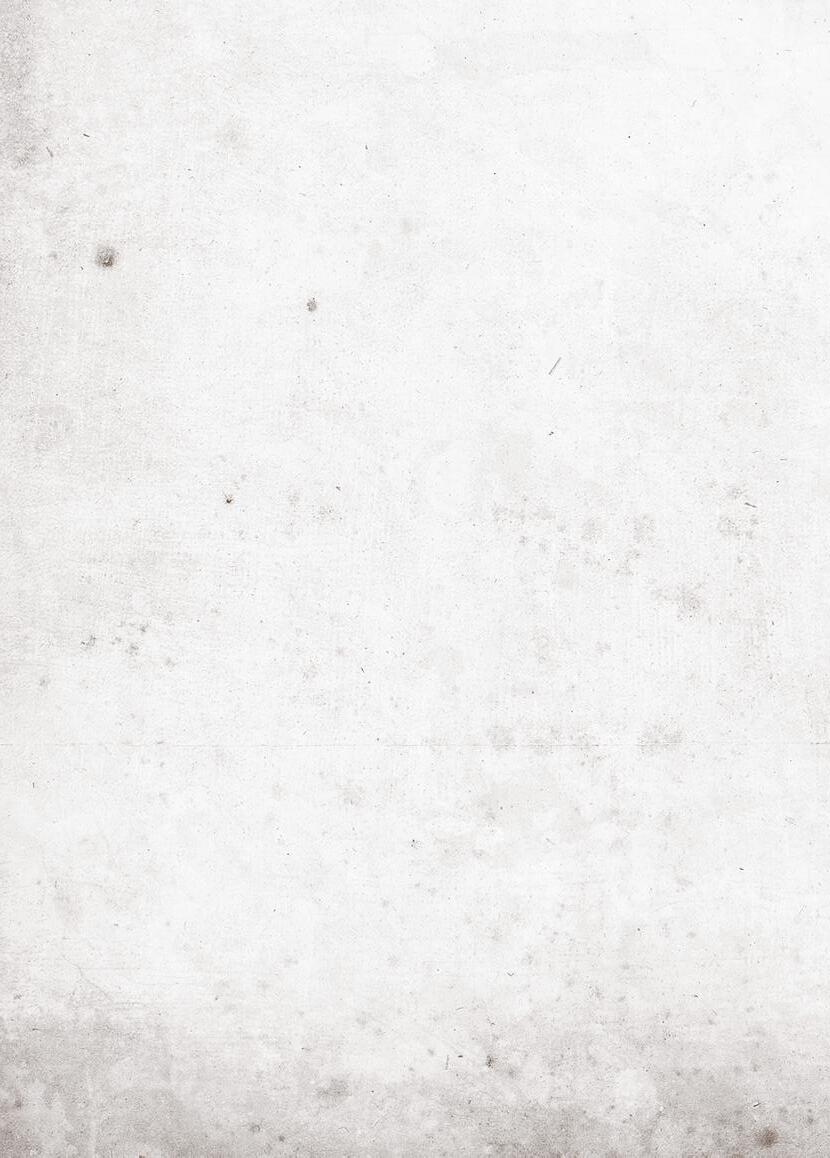
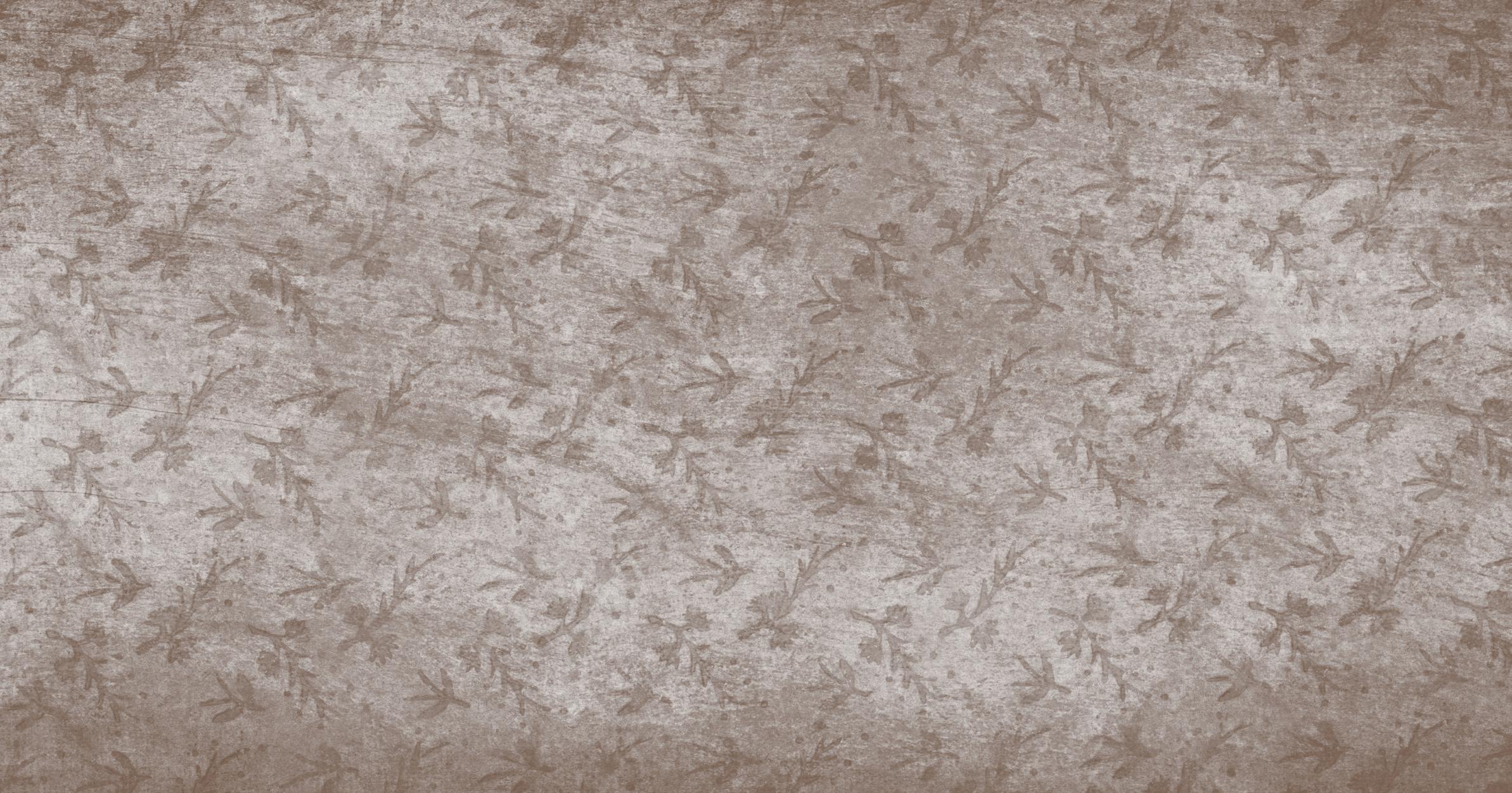
FUORI CONCORSO / OUT OF COMPETITION
grZeli nateli dgeeBi
nana ekvtimishvili, simon Gross
I KORI
thanos anastopoulos
KRUGOVI
Srdan Golubović
RAzREDNI SOVRAŽNIK
Rok Biček
quanDO L a seRa scenDe su BucaRest O metaBOLIsmO / WHen evenInG FaLLs On BucHaRest OR metaBOLIsm
corneliu PorumBoiu
siamo a metà della lavorazione di un film. Paul, il regista, ha una relazione con alina, attrice che interpreta un ruolo secondario. Il giorno successivo è l’ultimo giorno di alina sul set. Paul decide allora di cambiare la sceneggiatura per girare una scena di nudo con la ragazza. ma l’indomani cambia idea: Paul si sveglia e decide di non girare più la scena. chiama invece la produttrice e le dice che ha dei problemi con la sua ulcera... Când se lasă seara peste București sau Metabolism era in concorso all’ultimo Festival del Film di Locarno.
“L’ispirazione mi è venuta dall’esperienza di un amico regista che dieci anni fa mise tutti i soldi che aveva nella realizzazione del suo film e poi si bloccò improvvisamente a metà delle riprese. mi ha ispirato anche l’idea di riprese che non finiscono mai. ma ho voluto fare soprattutto un film sulla figura del regista, per mostrare come lavoriamo, quali sono i nostri metodi, come realizziamo un progetto: uno sguardo insomma dietro le quinte.” (c. Porumboiu)
ANTEPRIMA ITALIANA taLIan PRemIeRe

It’s the middle of a film shooting. Paul, the director, is having an affair with alina, an actress playing a secondary role. the next day is alina’s last day on set. Paul decides to change the script in order to shoot a nude scene with alina. But tomorrow is always another day. Paul wakes up in the morning and decides not to shoot the scene at all. Instead, he calls the producer and tells her that he’s having problems with his stomach ulcer...
Când se lasă seara peste București sau Metabolism was in competition al the latest Locarno Film Festival.
“I was inspired by the experience of a filmmaker friend who put all his money into producing his film, which began ten years ago and stopped in the middle of shooting. I was inspired by the idea of a shoot with no end. I especially wanted to turn the camera on the job of director, to show how we work, our methods, how a project is realized; a look behind the scenes.” (c. Porumboiu)
Romania - Francia / Romania - France 2013, 35mm, col., 89’ v.o. rumena / Romanian o.v.
sceneggiatura / screenplay: corneliu Porumboiu. Fotografia / Photography: Tudor Mircea. montaggio editing: dana Bunescu. musica music: Maria Raducanu. suono sound: Alexandru dragomir, Sebastian Zsemlye, Thierry delor. scenografia art Director: Mihaela Poenaru. costumi / costume Designer: Monica Florescu.
Interpreti cast: Diana Avrămuț, Bogdan Dumitrache, Mihaela Sîrbu, Alexandru Papadopol. Produzione / Produced by: 42 KM Film. coproduzione co-produced by: Les Films du Worso. Distribuzione internazionale / World sales: Wild Bunch.
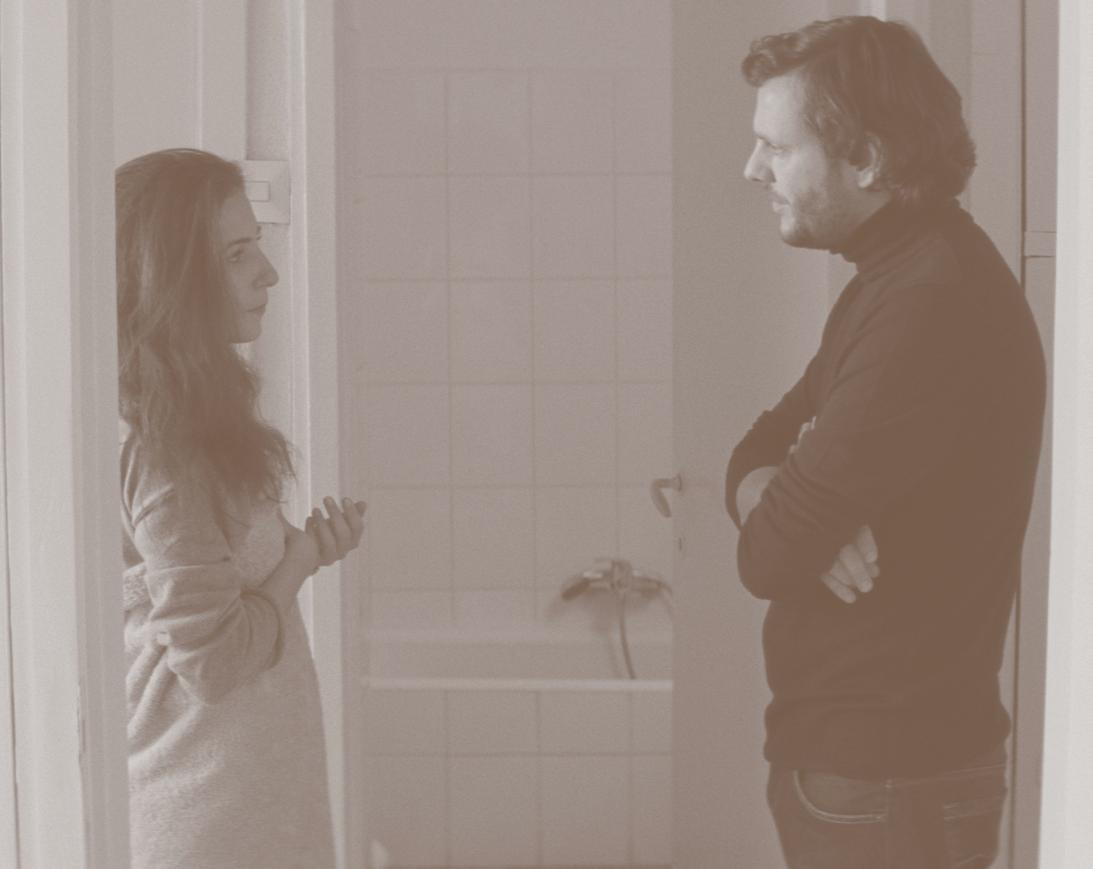
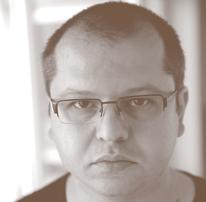
corneliu PorumBoiu
è nato nel 1975 a vaslui, in Romania.
corneliu Porumboiu was born in 1975 in vaslui, Romania. filmografia scelta / selected filmography
2003 Călătorie la oraș cm sf; visul lui Liviu mm / ml 2006 a fost sau n-a fost?
(12:08 east of Bucharest); Premi awards: cannes, quinzaine des Réalisateurscaméra d’Or 2009 Polițist, Adjectiv; Premi / awards: cannes - Premio della giuria
“un certain Regard” “un certain Regard” Jury Prize 2013 Când se lasă seara peste București sau Metabolism
Bene, GRaZIe / FINE, THANKS
MáTyáS PRIKLER
miroslav è un uomo benestante che ha un modo tutto suo di affrontare problemi della sua azienda, guai di suo fratello e la tristezza di sua moglie, che è un’alcolizzata. Béla è un pensionato: la moglie è morta e i figli lo hanno rinchiuso in una casa di riposo perché non “serve” più a niente. attila ha perso il lavoro e il suo matrimonio sta cadendo a pezzi. suoi sforzi per mantenere la famiglia insieme portano al peggior natale che lui, la moglie Zuza, e i suoi figli abbiano mai trascorso. Il film si conclude con il matrimonio di Dana, la figlia di miroslav, e Pista, parente di attila: in quest’occasione ritroviamo insieme quasi tutti personaggi del film. tutti si divertono al matrimonio slovacco - ungherese: mangiano, bevono e ballano fino al mattino mentre cercano di dimenticare ciò che è stato e sperano in giorni migliori.
“Ho accettato la sfida di fare un film di finzione che fosse il meno recitato possibile. Ho cercato di ridurre al minimo tutto ciò che avrebbe potuto compromettere l’autenticità delle situazioni e la naturalezza degli attori. ecco perché abbiamo girato senza luce artificiale, con una semplice macchina a mano, e con una troupe ridotta al minimo. abbiamo applicato la logica del cinema documentario al nostro film. In altre parole, non abbiamo migliorato le cose di fronte alla macchina da presa per ottenere il nostro scopo, ci siamo invece adattati noi (cioè la macchina da presa) a ciò che ci stava accadendo davanti.” (m. Prikler)
miroslav is a man of means which has his own way of dealing with problems in his company, the troubles of his brother, and the sadness of his wife, who is an alcoholic. Béla is a pensioner whose wife died and his children put him in a retirement home because he was no longer needed. attila lost his job and his marriage is falling apart. His efforts at keeping his family together lead to the worst christmas he, his wife Zuza, and his children have ever had. the film concludes with the wedding of Dana, miroslav’s daughter, and Pista, attila’s relative, and this occasion brings most of the film’s characters together. they are all enjoying themselves at the slovak - Hungarian wedding: they eat and drink and dance till morning as they try to forget all that was and hope for better days.
“I was challenged by the idea of making a fiction feature, which looks as little “acted” as possible. I went for minimalizing everything that could disrupt the genuineness of situations and the actors appearing in them. that is why we were shooting without lighting, with a simple hand-held camera, and with a minimal crew. We applied the documentary logic of filmmaking in our movie. In other words, we did not adapt things in front of the camera to our purpose, rather we (i.e. the camera) adapted to what was happening in front of it.”
(m. Prikler)
ANTEPRIMA ITALIANA
taLIan PRemIeRe
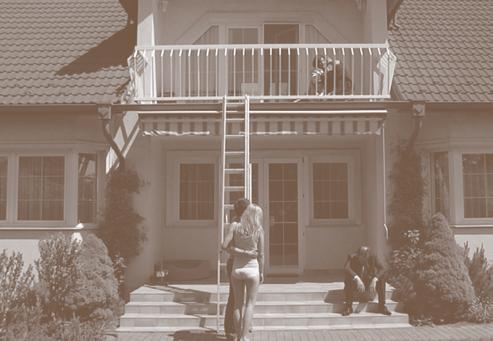
slovacchia / slovakia
2013, 35mm, col., 134’
v.o. slovacca - ungherese / slovak - Hungarian o.v.
sceneggiatura / screenplay: Mátyás Prikler, Marek Leščák. Fotografia / Photography: Peter Balcar, Milan Balog. montaggio editing: Maroš Šlapeta, Zuzana Cséplő. suono sound: dušan Kozák. scenografia, costumi / art Director, costume Designer: Erika Gadus.
Interpreti cast: Attila Mokos, Miroslav Krobot, Béla Várady, Vladimír obšil, Zuzana Mauréry, Jana Oľhová, István Olasz, Daniela Pribullová, Ábel csekes, Barbora Illithová, Xénia Molnár, Milan Vojtela, Bety K. Majerníková, Anna Ferenczy, Ján Fajnor, Tibor Fabó, Éva Bandor, Lajos Vörös, Mária Kácserová, Sándor Terhes, Ján Greššo, Blaho uhlár, Tibor Tóth, Vít Bednárik, Marek Šulík, deniz Özcelebi.
Produzione, distribuzione internazionale / Produced by, World sales: MPhilms Ltd. con il sostegno di supported by: Slovak Audiovisual Fund.
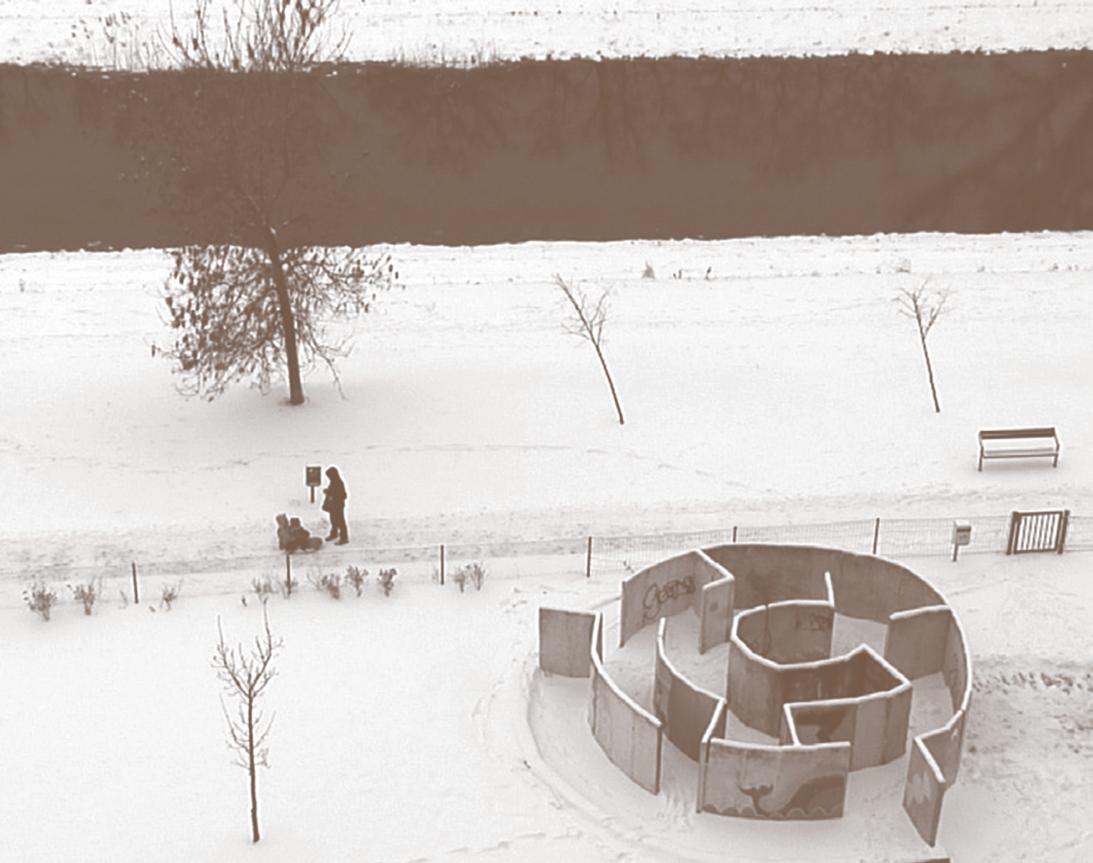
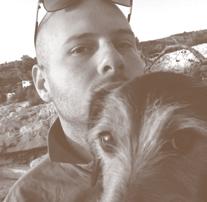
MáTyáS PRIKLER
è nato nel 1982 a Bratislava, ora slovacchia.
mátyás Prikler was born in 1982 in Bratislava, now slovakia.
filmografia scelta / selected filmography
2007 Frank urban-cajal doc. 2008 Juraj Kubánka doc. 2009 Ďakujem, dobre cm / sf
2013 Ďakujem, dobre
JáNOS SzáSz
verso la fine della seconda guerra mondiale, la gente nelle grandi città è in balia delle incursioni aeree e della fame. una giovane madre disperata lascia i suoi due gemelli di 13 anni a casa della nonna, in campagna, nonostante la donna sia considerata crudele e disumana. Gli abitanti del villaggio la chiamano “la strega”, perché si dice abbia avvelenato il marito. coccolati fino a quel momento, gemelli devono ora imparare a sopravvivere da soli nel loro nuovo ambiente rurale. s rendono conto che l’unico modo per affrontare il mondo assurdo e tremendo degli adulti e della guerra è quello di diventare completamente insensibili e spietati. Imparando a liberarsi dalla fame, dal dolore e dalle emozioni, saranno in grado di sopportare le difficoltà future. e iniziano a tenere un diario di tutto ciò di cui sono testimoni durante la guerra... Tratto dal romanzo omonimo di Ágota Kristóf, Le Grand cahier è il film vincitore del concorso lungometraggi all’ultimo Festival di Karlovy Vary.
“Le Grand cahier è un film di guerra senza guerra, una storia di bambini innocenti ma crudeli, che resistono a ogni morale. è la storia dell’inizio dell’adolescenza, di due gemelli assassini. Due corpi, un solo spirito, due corpi, una sola volontà. Parlano allo stesso modo e finiscono l’uno le frasi dell’altro, sempre sulla stessa lunghezza d’onda. uno pensa a qualcosa e l’altro la porta avanti. quando uccidono, compiono un atto di giustizia. Due corpi e una sola anima.” (J. szász)
ungheria - Germania - austria - Francia Hungary - Germany - austria - France 2013, 35mm, col., 109’ v.o. ungherese - tedesca / Hungarian - German o.v. L
towards the end of World War II, people in big cities are at the mercy of air raids and death by starvation. a desperate young mother leaves her 13-year-old twin sons at their grandmother’s house in the country, despite the fact that this grandmother is a cruel and bestial alcoholic. the villagers call her “the Witch” because she is rumored to have poisoned her husband long ago. Previously pampered, the twins must learn how to survive alone in their new, rural surroundings. they realize that the only way to cope with the absurd and inhumane world of adults and war is to become completely unfeeling and merciless. By learning to free themselves from hunger, pain and emotion, they will be able to endure future hardships. the twins keep a written record of all they have witnessed during the war...
Based on the international bestseller by Ágota Kristóf, Le Grand cahier won the Feature Film Competition at the latest Karlovy Vary International Film Festival.
“Le Grand cahier is a war film with no war, a story about innocent but cruel children who resist all morals. It is the story of early adolescent, murderous twin boys. two bodies, one spirit; two bodies, one will. they speak the same way and they finish each other’s sentences, always on the same wavelength. One boy thinks of something and the other carries it through. When they kill, it is an act of justice. two bodies and one soul.”
(J. szász)
ANTEPRIMA ITALIANA
taLIan PRemIeRe
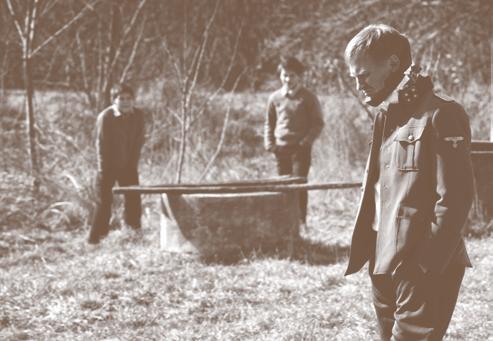
sceneggiatura / screenplay: János Szász, Andras Szeker, tratta dal romanzo omonimo di / based on novel of the same title by Ágota Kristóf. Fotografia / Photography: christian Berger. montaggio editing: Szilvia Ruszev. musica music: Johan Johanson. suono sound: Manuel Laval, István Sipos. scenografia art Director: István Galambos. costumi / costume Designer: János Breckl.
Interpreti cast: László Gyémánt, András Gyémánt, Piroska Molnár, ulrich Thomsen, ulrich Matthes, Gyöngyver Bognar, orsolya Tóth.
Produzione / Produced by: Hunnia Filmstúdió, Intuit Pictures. coproduzione co-produced by: Amour Fou, dolce Vita Films. con il sostegno di supported by: Magyar Filmalap Zrt., MdM, MBB, MEdIA, Eurimages, Wiener Filmfund, cNc dFFF, FISA, MEdIA Programme. Distribuzione internazionale / World sales: Beta cinema.
Distribuzione per l’Italia / Distributed in Italy by: Academy Two.
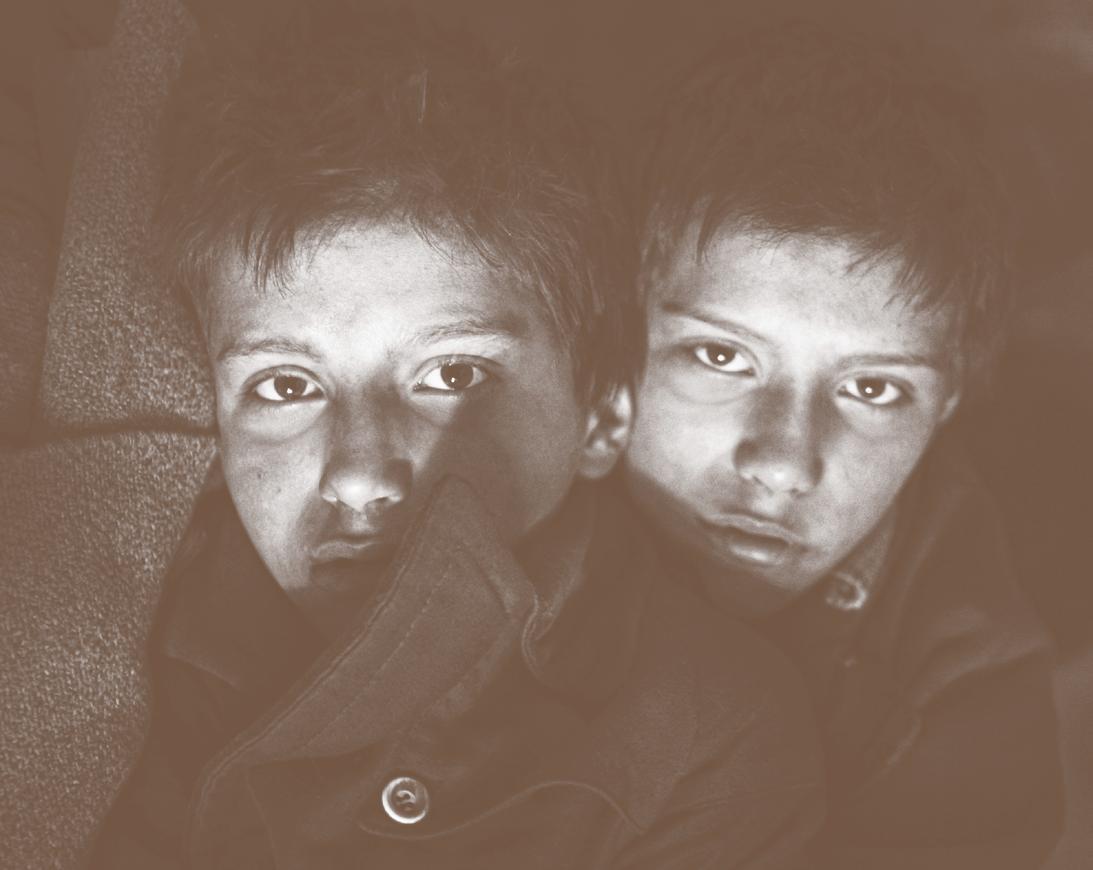
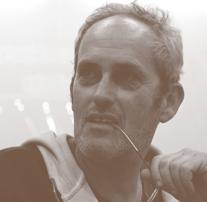
JáNOS SzáSz
è nato nel 1958 a Budapest, in ungheria. János szász was born in 1958 in Budapest, Hungary. filmografia scelta / selected filmography 1994 Woyzeck; Premi / awards: eFa - miglior nuovo film europeo / Best new european Film 1997 Witman fiúk 2000 eyes of the Holocaust doc. 2007 Ópium: Egy elmebeteg nő naplója 2013 Le Grand cahier; Premi / Awards: Karlovy Vary IFFmiglior Film / Best Film
L GIOcatORe / tHe GamBLeR
vincentas è il miglior dipendente del pronto soccorso, e ha una sola passione: il gioco d’azzardo. Ogni volta che si trova in una situazione difficile, il medico è costretto a fare scelte estreme per restituire il denaro che perde in continuazione. vincentas ha così l’idea di creare un gioco d’azzardo legato alla sua professione. Inizialmente i dipendenti del pronto soccorso sono gli unici a essere attratti da questo macabro gioco. Ben presto, però, l’idea prende piede e comincia a diffondersi a macchia d’olio. colleghi medici diventano agenti di scommesse, mentre vincentas prende il controllo del banco. ma mentre gli affari continuano a migliorare, la collega Ieva inizia a opporsi al gioco. tra lei e vincentas è appena iniziata una relazione appassionata. Ben presto il protagonista si troverà ad affrontare una scelta fatale: il gioco o l’amore.
“La mia generazione è cresciuta nel sistema sovietico, si è laureata nelle scuole sovietiche, ed era immersa in un doppio pensiero standardizzato. e poi improvvisamente tutto è cambiato. Liberati dallo stato comunista, ci siamo trovati nel mondo capitalista della libertà sfrenata. L’egualitarismo collettivo imposto è stato sostituito dalle regole dell’economia di mercato, in cui si ottiene tanto quanto si riesce a guadagnare per se stessi … vincentas, il protagonista del film, rappresenta questo nuovo tipo di persona ibrida che appartiene a due sistemi in conflitto tra loro.” (I. Jonynas)
vincentas is the best employee at the emergency services station, whose passion is one - gambling in different games. Whenever he lands in some difficult situation, the medic is forced to grab onto something radical to return the money he is constantly losing. an idea strikes vincentas to create an illegal game related to his profession. Initially the employees at emergency services are the only ones to be attracted to this macabre engagement. soon enough, however, the idea kicks off and starts spreading like wildfire. the medic colleagues become betting agents, whereas vincentas takes control of its bank. as financial matters keep on improving, a coworker Ieva starts objecting to the game. a passionate relationship has just unfolded between her and vincentas. soon enough he is going to face making a fateful choice – the game or love.
“my generation grew up in the soviet system, graduated from soviet schools, and was immersed in double standard thinking. and then suddenly everything changed. Liberated from the communist state, we found ourselves in the capitalist world of unrestrained freedom. Imposed collective egalitarianism was replaced with market economy rules, in which you get as much as you manage to earn for yourself … the main character of the film, vincentas, is that new hybrid person. He belongs to the two conflicting systems.”
(I. Jonynas)

ANTEPRIMA ITALIANA taLIan PRemIeRe
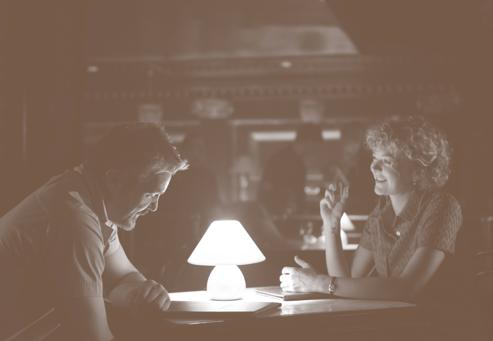
Lituania - Lettonia / Lithuania - Latvia
2013, HD, col., 109’
v.o. lituana - russa - inglese / Lithuanian - Russian - english o.v.
sceneggiatura / screenplay: Kristupas Sabolius, Ignas Jonynas. Fotografia / Photography: Janis Eglitis. montaggio editing: Stasys Žak. musica music: The Bus. suono sound: Artūras Pugačiauskas. scenografia art Director: Nerijus Narmontas. costumi / costume Designer: Aušra Kleizaitė.
Interpreti cast: Vytautas Kaniušonis, oona Mekas, Romuald Lavrynovič, Valerijus Jevsejevas, Lukas Keršys, Jonas Vaitkus, Artūras Šablauskas, Simonas Lindešis. Produzione / Produced by: Studio uljana Kim, Locomotive Productions. Distribuzione internazionale / World sales: Wide.
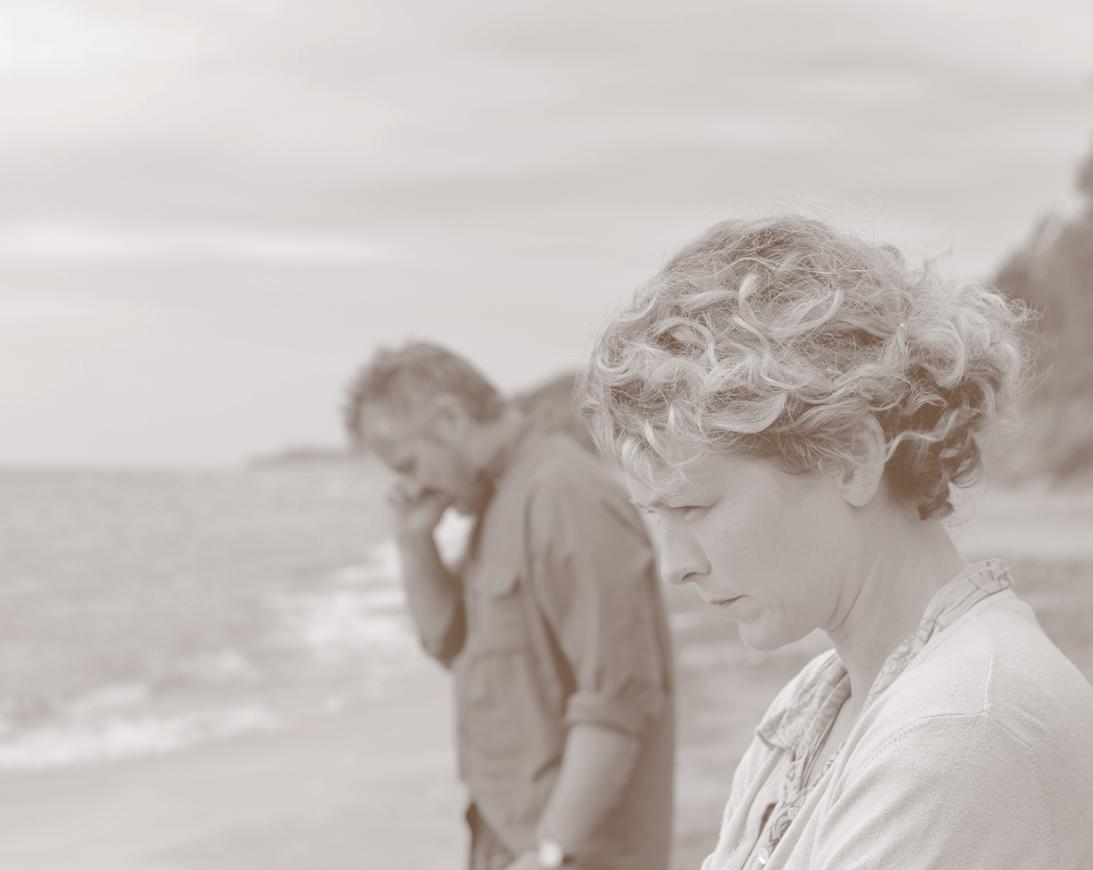
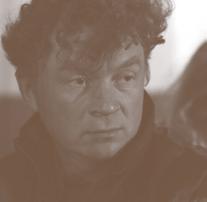
IGNAS JONyNAS
è nato nel 1971 in Lituania. Ignas Jonynas was born in 1971 in Lithuania. filmografia scelta / selected filmography 2003 sekmadienis toks, koks yra cm / sf 2006 sokantis kirminas cm / sf 2013 Lošėjas
OttOBRe, nOvemBRe / OctOBeR nOvemBeR
götZ sPielmann
In un piccolo villaggio nelle alpi austriache c’è un albergo, ormai abbandonato. molti anni prima, quando la gente trascorreva le vacanze estive in quei luoghi, si facevano fiorenti affari. Lì sono cresciute due sorelle. sonja ora vive a Berlino, è diventata un’attrice di grande successo, una star della tv ma qualcosa sembra mancare dalla sua vita. si mantiene a distanza dalle persone, come se dovesse proteggersi e ogni tanto attraversa periodi di tristezza. sua sorella verena, che è un po’ più vecchia di lei, non ha mai lasciato il villaggio: dopo che la loro madre è morta in un incidente, assieme al marito e al figlio, si è trasferita nell’ex albergo, che è comunque troppo grande per loro. ma le necessità di verena non sono così modeste come si potrebbe pensare. La relazione segreta che ha con il medico del posto è per lei motivo di infelicità profonda, le fa provare nostalgia per una vita diversa. anche il padre delle due donne vive nell’ex hotel. si sente ancora il patriarca, è vecchio e scontroso...
“una delle grandi opportunità del cinema è quella di permettere a luoghi chiusi e paesaggi di essere qualcosa di più che banali sfondi su cui si svolge l’azione: possono rivelare la loro poesia, possono diventare essi stessi narrazione.” (G. spielmann)
In a small village in the austrian alps there is a hotel, now no longer in use. many years ago, when people still took summer vacations in such places, it was a thriving business. two sisters grew up here. sonja now lives in Berlin. she has become an actress, very successful, a tv star. she has achieved a lot in this short time – but something seems to be missing from her life. she keeps a distance from people, as if protecting herself in this way. she goes through phases of sadness. Her sister verena, who is a little older, has never left the village. after their mother died in an accident she, her husband and her little boy moved into the former hotel, which is much too big for them. But verena’s needs are not as modest as this may suggest. a secret affair with the local doctor brings out a passionate discontent in her, a longing for a different life. the father of the two also still lives in the former hotel: still a patriarch, he has grown old and surly...
“One of the great opportunities inherent in cinema is that it enables rooms and landscapes to be more than mere settings for action. they can reveal their own poetry, they can themselves become narratives.” (G. spielmann)
ANTEPRIMA ITALIANA
taLIan PRemIeRe
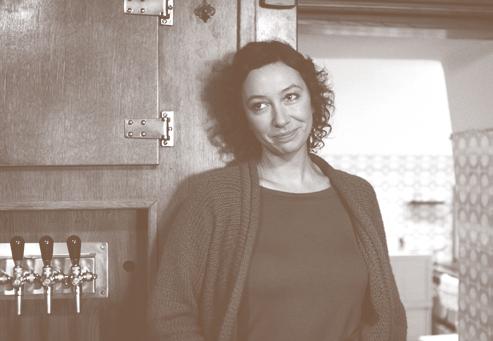
austria
2013, 35mm, col., 116’ v.o. tedesca / German o.v.
sceneggiatura / screenplay: Götz Spielmann. Fotografia / Photography: Martin Gschlacht. montaggio editing: Karina Ressler. suono sound: Heinz K. Ebner, uve Haussig, Bernhard Bamberger. scenografia art Director: Katharina Wöppermann, Susanne Hopf. costumi / costume Designer: Erika Navas.
Interpreti cast: Nora von Waldstätten, ursula Strauss, Peter Simonischek, Sebastian Koch, Johannes Zeiler. Produzione / Produced by: coop99 filmproduktion, SpielmannFilm. Distribuzione internazionale / World sales: The Match Factory GmbH.

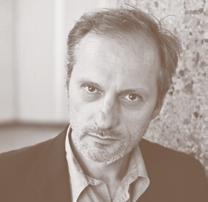
götZ sPielmann
è nato nel 1961 a Wels, in austria.
Götz spielmann was born in 1961 in Wels, austria.
filmografia scelta / selected filmography
1990 erwin und Julia 1991 Der nachbar 2000 Die Fremde 2004 antares
2008 Revanche 2013 Oktober, november
L’aspirante campione di nuoto Kuba si allena da quindici anni, vive una vita normale e tranquilla, a casa con la madre e la fidanzata sylwia. una sera, all’apertura di una galleria d’arte, Kuba si sente fuori luogo e si annoia fino a quando non incontra Michal. Sylwia intuisce l’attrazione che nasce fra due, ma Kuba è ancora preso da lei. La ragazza tiene per sé le sue paure ma Kuba comincia a mettere sempre di più Michal al centro della sua vita: trascura il suo programma di allenamento e comincia a sognare un altro modo di vivere. Kuba riconosce che non ha mai provato sentimenti profondi come quelli che ha per michal. Dovrà trovare tutto il coraggio che ha per affrontare coloro che lo amano, e poi sopportarne le conseguenze.
Miglior film nella sezione “East of the West” all’ultimo festival di Karlovy Vary.
“Ho lavorato alla scrittura di Płynące wieżowce con la convinzione di voler riempire una lacuna nel cinema polacco, che finora è stato riluttante ad affrontare difficili storie contemporanee. sono consapevole che l’amore diverso e la lotta per la sua accettazione sociale sono temi ancora molto lontani dall’essere oggetto di discussione nella nostra cultura nazionale. sapevo che la storia doveva essere unica e intrigante, per innescare un cambiamento nel modo in cui alcune persone ancora percepiscono queste tematiche. mi sono sforzato di rendere la trama il più attraente possibile per un pubblico più vasto, per spettatori giovani e anziani.” (t. Wasilewski)
ANTEPRIMA ITALIANA
taLIan PRemIeRe

Polonia / Poland 2013, HD, col., 93’ v.o. polacca / Polish o.v.
In his fifteenth year of training, aspiring champion swimmer Kuba lives a normal, uneventful life – at home with his mother and girlfriend sylwia. at a gallery opening one night, he is out of place and totally bored until he meets michal. sylwia picks up on his fascination, but Kuba has her heart. She keeps her feelings to herself, as from one day to the next Kuba puts Michal in the middle of his life with her. Kuba drops his training program and begins to dream of another life. Kuba comes to recognize he has never experienced feelings as deep as those he has for michal. It takes all the courage he can muster to face those who love him. then he must deal with the consequences. Best Film in the “East of the West” competition at the latest Karlovy Vary Film Festival.
“I worked on the script of Płynące wieżowce with the great conviction that I wanted to fill a gap in Polish cinema, which has lately been reluctant to tackle difficult contemporary stories. I was aware that the subject of love that is different and striving for social acceptance is still very much outside the realm of our national cultural conversation. I knew that the story had to be unique and intriguing, if it was to trigger a change in the way some people still perceive these issues. I focused my efforts on making the plot as appealing as I could to a wide audience. It is addressed to both young and older viewers.” (t. Wasilewski)
sceneggiatura / screenplay: Tomasz Wasilewski. Fotografia / Photography: Kuba Kijowski. montaggio editing: Aleksandra Gowin. musica music: Baasch. scenografia art Director: Jacek czechowski. costumi / costume Designer: Monika Kaleta.
Interpreti cast: Mateusz Banasiuk, Marta Nieradkiewicz, Bartosz Gelner, Katarzyna Herman, olga Frycz, Iza Kuna, Miroslaw Zbrojewicz. Produzione / Produced by: Alter Ego Pictures. Distribuzione internazionale / World sales: Films Boutique.
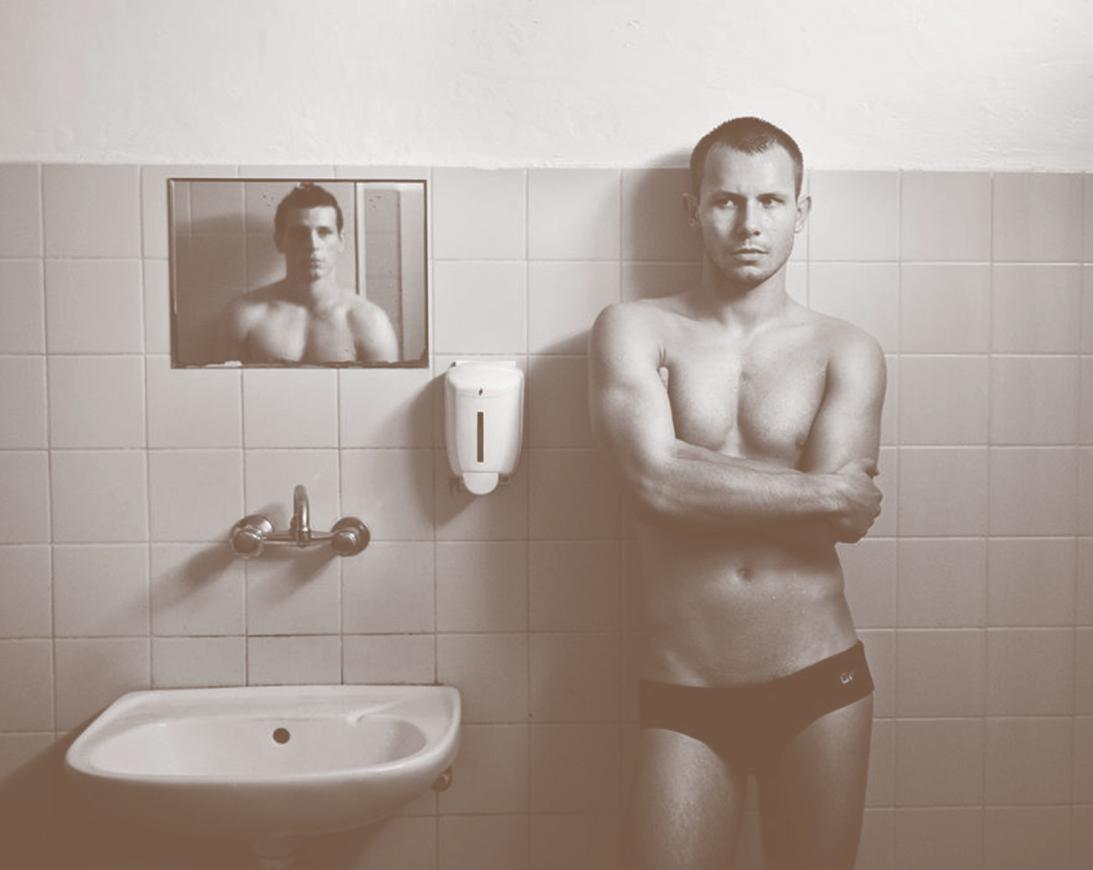

TOMASz WASILEWSKI
è nato nel 1980 a torun, in Polonia. Il suo primo lungometraggio W sypialni era in concorso lo scorso anno al trieste Film Festival. tomasz Wasilewski was born in 1980 in torun, Poland. His first feature W sypialni was in competition last year at the trieste Film Festival. filmografia scelta / selected filmography 2012 W sypialni 2013 Płynące wieżowce Premi / Awards: Karlovy Vary IFF - “East of the West” miglior film / Best Film
veRGOGna / sHame
JUSUP RAzyKOV
Tra molti fiordi della penisola di Kola c’è un piccolo insediamento dove vivono le famiglie dell’equipaggio di un sottomarino e le guardie di frontiera. La base è prossima a essere dismessa e tutti residenti sono preoccupati per il loro futuro. una giovane donna, Lena, arriva alla base. Ha appena sposato un sommergibilista, il tenente comandante Pavel Komlev. Lo ha sposato senza amore, con la sola idea di cambiare vita. Durante l’ultima traversata il sottomarino affonda... Premio Fipresci al festival di Karlovy Vary dello scorso anno.
“La storia della giovane donna che si sente, con il suo dolore personale, al centro di un dramma storico può sembrare banale e indegna: che cos’è la sua tragedia paragonata alla morte di decine di sommergibilisti? sappiamo che il dolore comune è la somma di tanti dolori personali. ma non per questo i suoi sentimenti meritano troppa attenzione. questo è un paese enorme. non si possono asciugare le lacrime di tutti. ma di quel luogo, a nord, nessuno aveva raccontato nulla. La storia di una nazione è sempre diversa da quella dello stato. non credo che il nostro popolo sia spazzatura. La nostra gente è la più luminosa e leggera sulla terra. meritano attenzione, meritano amore, comprensione e compassione.” (J. Razykov)
Amidst many fjords of the Kola peninsula there’s a little settlement where the families of the submariners and the frontier guards live. the base is close to being shut down and all the residents are worried about their future. a young woman, Lena, arrives to the settlement. She has just married a submariner, lieutenant commander Pavel Komlev. married without love with the only notion to change her life. During the last passage the submarine sinks…
Fipresci Prize at the latest Karlovy Vary International Film Festival.
“the story of a young woman who felt with her personal pain into fire of historical drama seems trivial and unworthy. What is her tragedy comparing to death of dozens of submariners? We acknowledge that the common pain is the sum of many personal ones. But it doesn’t make her feelings deserving attention. this is the huge country. You can’t dry everyone’s tears. But in that place, on the north, no one decided that we made a small talk. History of nation is always different than history of state. Don’t believe that our people are trash. Our people are the brightest and lightest on the earth. they deserve attention, deserve love, understanding and compassion.” (Y. Razykov)
ANTEPRIMA ITALIANA
taLIan PRemIeRe
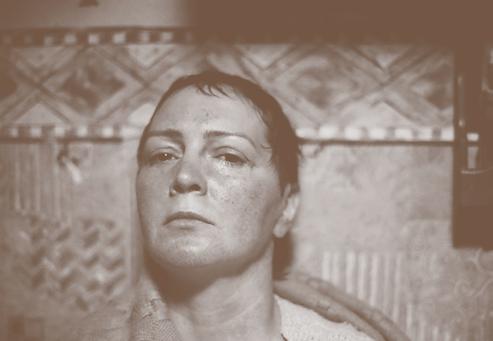
Russia 2013, HD, col., 90’ v.o. russa / Russian o.v.
sceneggiatura / screenplay: Ekaterina Mavromatis, Jusup Razykov. Fotografia / Photography: Jurij Michailyšin. montaggio editing: denis Luzanov. musica music: Aleksej Artiševskij, Pëtr Makarov, Ekaterina Efremova. suono sound: Anastasia Anosova. scenografia art Director: Svetlana Smirnova. costumi / costume Designer: Anna Belenkaja.
Interpreti cast: Maria Semenova, Elena Korobejnikova, Helga Filippova, Seseg Hapsasova, Ivan Ryzikov. Produzione, distribuzione internazionale / Produced by, World sales: cultural Initiatives.

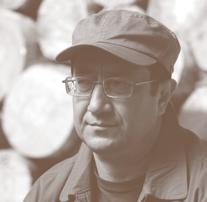
JUSUP RAzyKOV
è nato nel 1957 a taškent, ora uzbekistan. Yusup Razykov was born in 1957 in tashkent, now uzbekistan. filmografia scelta / selected filmography
1999 voiz 2000 Žhenskoye tsarstvo 2002 O’rtok Boykenjayjev
2010 the Gastarbeiter 2013 styd; Premi / Awards: Karlovy Vary IFF - Premio Fipresci / Fipresci Prize
emir BaigaZin
aslan, un ragazzo di 13 anni che vive con la nonna, è uno studente in un villaggio del Kazakistan ad alto tasso di criminalità. La corruzione e la violenza non si conciliano affatto con la sua ossessione per la perfezione. aslan vede concentrarsi tutto il male nel capo della banda della scuola, Bolat, che lo umilia di fronte a tutti suoi compagni di classe ed estorce denaro a tutti ragazzi, picchiandoli violentemente. e così, per liberare la sua scuola dalla violenza e dal crimine, aslan decide di agire contro Bolat... uroki Garmonii era in concorso all’ultima Berlinale.
“come ogni essere umano, aslan è eroe e vittima allo stesso tempo, in modi diversi e in tempi diversi. questa storia potrebbe essere ambientata in un villaggio russo, così come nelle favelas brasiliane. Il denominatore comune è il sottosviluppo economico di una regione. tutti i protagonisti del film non sono attori professionisti, ma bambini di una scuola. sono stati trovati attraverso un lavoro di casting minuzioso, che si è svolto in tutto il Kazakistan: ognuno di loro ha fatto, credo, un ottimo lavoro. Il protagonista, aslan, è interpretato da timur aidarbekov, un bambino orfano che viveva in un istituto per l’infanzia ad almaty. Grazie al film il ragazzo ha vissuto una vera trasformazione. e siamo riusciti a portarlo fuori dall’orfanotrofio alla fine delle riprese.” (e. Baigazin)
aslan, a 13-year-old boy living with his grandma, is a student in a high crime rate village school in Kazakhstan. Corruption and violence conflict drastically with his obsession for perfectionism. aslan sees all the evil in the school gang leader Bolat, who humiliates him in front of all his classmates and extorts money from all the kids, beating them up severely. Out of good motives to rid his school of crime, aslan decides to take action against Bolat... uroki Garmonii was in competition at the latest Berlinale.
“Like any human being, aslan is a hero and a victim at the same time in different scales and in different times. this story could take place in a Russian village as well as in Brazilian slums. the common denominator is the low economic development of a region. all the leading actors in the film are not professional actors but school kids. they were found through a massive casting all over Kazakhstan and each one of them has done, I believe, a great job. the leading character aslan, who is played by the orphan timur aidarbekov, lived in a children’s house in almaty. through the film, the boy has lived a true transformation. We have managed to take him out of the orphanage after the end of the shooting.” (e. Baigazin)
ANTEPRIMA ITALIANA
taLIan PRemIeRe
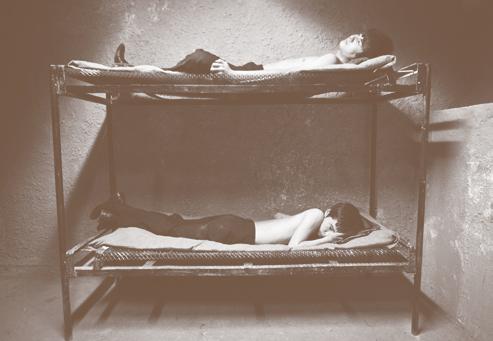
Kazakistan - Germania - Francia / Kazakhstan - Germany - France
2013, HD, col., 115’ v.o. kazaka - russa / Kazakh - Russian o.v.
sceneggiatura, montaggio screenplay, editing: Emir Baigazin. Fotografia / Photography: Aziz Zhambakijev. suono sound: Markus Krohn, Sergej Lobanov. scenografia art Director: Julija Levitskaja. costumi / costume Designer: ulan Nugumanov. Interpreti / cast: Timur Aidarbekov, Aslan Anarbayev, Mukhtar Andassov, Anelya Adilbekova, Beibitzhan Muslimov, omar Adilov, Adlet Anarbekov, daulet Anarbekov, Nursultan Nurbergenov, Nurdaulet orazymbetov, Erasyl Nurzhakyp, Assan Kirkabakov, Ramazan Sultanbek, Bagila Kobenova.
Produzione / Produced by: Jc S Kazakhfilm. coproduzione co-produced by: The Post Republic Halle, Rohfilm, Arizona Productions. con il sostegno di supported by: Berlinale World cinema Fund, Aide aux cinémas du Monde, Sarajevo Film Festival cineLink WIP Award.
Distribuzione internazionale / World sales: Films distribution.
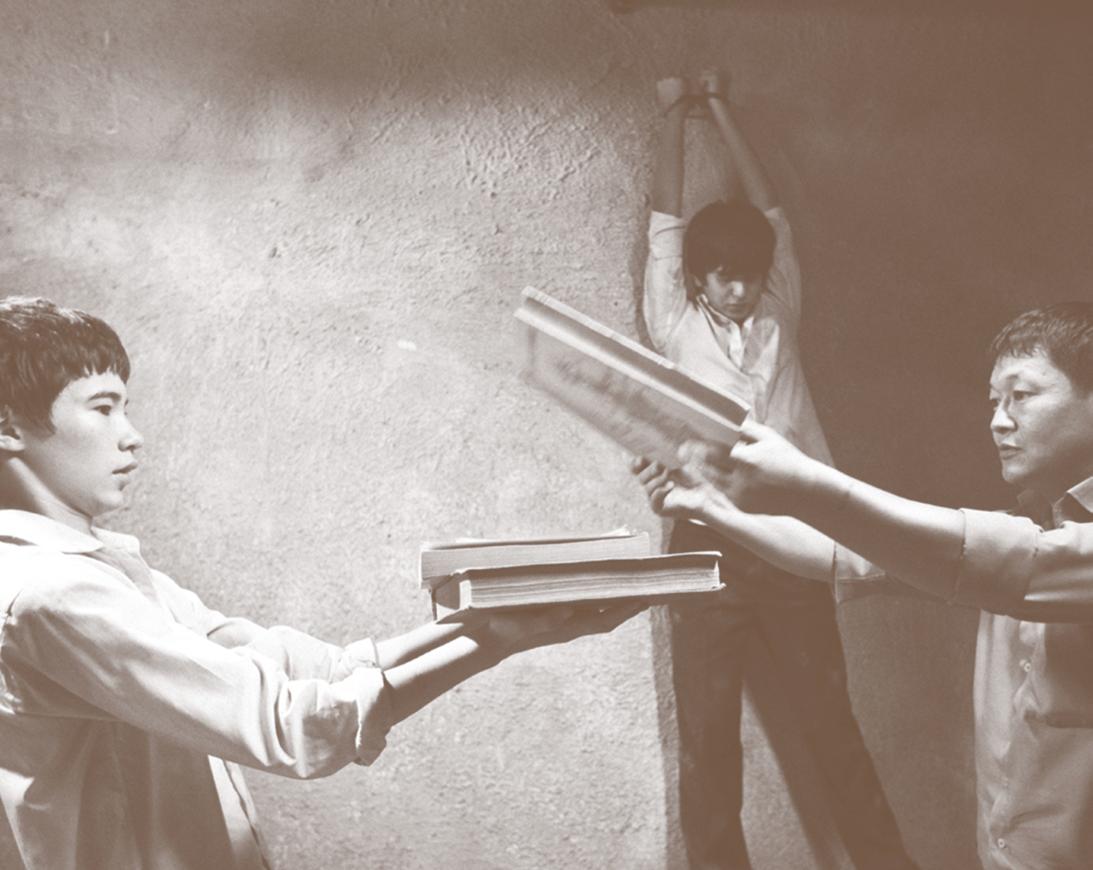
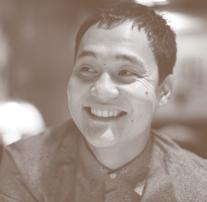
emir BaigaZin
È nato nel 1984 ad Almaty, ora Kazakistan. Emir Baigazin was born in 1984 in Almaty, now Kazakhstan. filmografia scelta / selected filmography
2007 steppe cm / sf 2008 Fatshedder cm / sf 2013 uroki Garmonii Premi / awards:
Berlinale – Orso d’argento per l’eccezionale contributo alla fotografia / silver Bear for an outstanding artistic contribution in camera
Primi anni novanta a tbilisi, capitale della Georgia, da poco indipendente dopo il crollo dell’unione sovietica. Il paese si trova ad affrontare la guerra sulla costa del mar nero (in abcasia) ed episodi di giustizia sommaria che affliggono la vita di tutti giorni. ma per eka e natia, due amiche inseparabili di quattordici anni, la vita si sta aprendo, in strada, a scuola, con gli amici e la sorella maggiore. anche se devono fare già i conti con una società prevalentemente maschilista, con il matrimonio in età precoce e le delusioni d’amore, per queste due ragazze in fiore la vita sta sbocciando. Grzeli nateli dgeebi era alla Berlinale (Forum) e ai Festival di Karlovy Vary e Sarajevo dello scorso anno.
“La storia è ispirata ai ricordi personali di nana durante la sua giovinezza nei complicati primi anni novanta in Georgia. abbiamo pensato al rapporto tra i giovani con il periodo e il contesto culturale in cui vivono. Per noi questo film è stato un viaggio nel passato e nel presente e uno sguardo sul domani. che cosa può essere considerato parte di una cultura e dov’è il limite al di là del quale la cultura non può più giustificare certi comportamenti? mentre ci tormentavamo con queste domande, abbiamo scoperto che le nostre attrici, due ragazze di 14 anni, erano aperte, senza pregiudizi e appassionate, e avevano una grande capacità percettiva nonostante la loro inesperienza.” (n. ekvtimishvili, s. Gross)
FuoRI coNcoRSo Out OF cOmPetItIOn
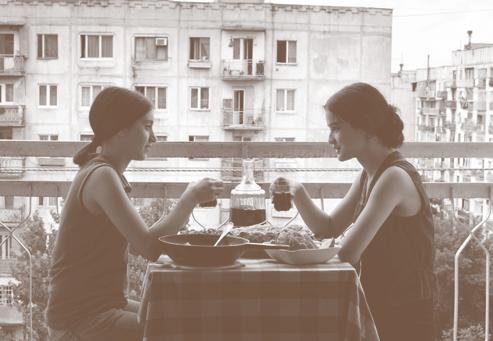
Georgia - Germania - Francia / Georgia - Germany - France 2013, 35mm, col., 102’ v.o. georgiana / Georgian o.v.
early nineties, in tbilisi, the capital of the newly independent Georgia after the collapse of the soviet union. the country is facing the war on the Black sea coast (abkhazia) and vigilante justice that plague society. But for eka and natia, fourteen years old inseparable friends, life just unfolds; in the street, at school, with friends or the elder sister. although they are already dealing with men’s dominance, early marriage and disillusioned love, for these two girls in bloom life just goes on.
Grzeli nateli dgeebi was at the latest Berlinale, Karlovy Vary and Sarajevo Film Festival.
“the story is inspired by nana’s personal memories of her youth in the troubled early 1990s in Georgia. We thought about the relation between young people and the time and cultural context in which they live. For us, this film was a journey into the past and present and a look into tomorrow. What can be considered part of a culture and where is the limit after which culture can no longer justify certain behaviours? as we grappled with these questions, we discovered that our actors, two 14-year-old girls, were open, unprejudiced and passionate and were quite perceptive despite their inexperience in life.”
(n ekvtimishvili, s. Gross)
sceneggiatura / screenplay: Nana Ekvtimishvili. Fotografia / Photography: oleg Mutu. montaggio editing: Stefan Stabenow. suono sound: Paata Godziashvili. scenografia art Director: Konstantine Japharidze. Interpreti / cast: Lika Babluani, Mariam Bokeria, Zurab Gogaladze, data Zakareishvili, Ana Nijaradze.
Produzione / Produced by: Indiz Film uG, Arizona Productions, Polare Film LLc coproduzione co-produced by: ZdF - das Kleine Fernsehspiel. con il sostegno di supported by: ARTE.
Distribuzione internazionale / World sales: Memento Films International.
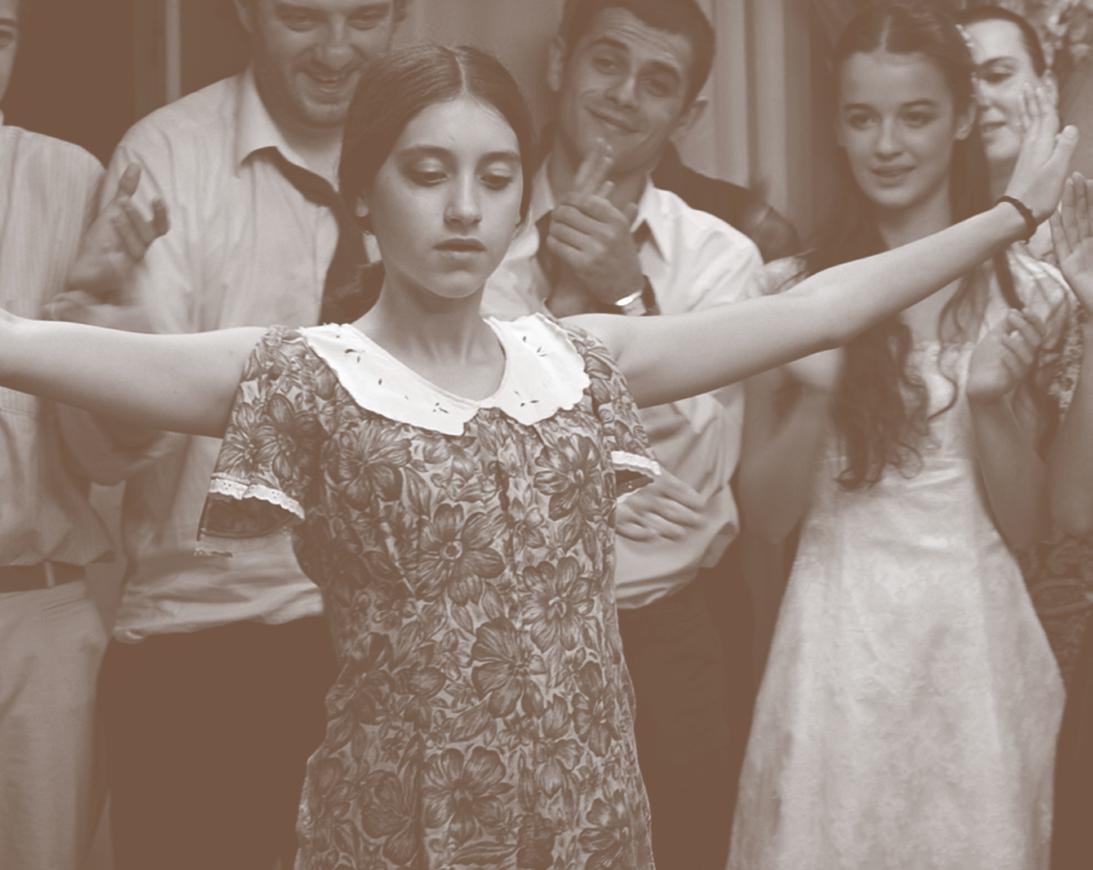


NANA EKVTIMISHVILI
è nata nel 1978 a tbilisi, ora Georgia. Il suo cortometraggio Deda ha vinto la scorsa edizione del trieste Film Festival. nana ekvtimishvili was born in 1978 in tbilisi, now Georgia. Her short Deda was awarded as Best short Film at the latesttrieste Film Festival.
2007 Dakarguli Khmeleti cm / sf doc. 2011 Deda cm / sf 2013 Grzeli nateli dgeebi; Premi / awards: sarajevo FF – miglior film, migliori attrici / Best Film, Best actress
simon gross è nato nel 1976 a Berlino. simon Gross was born in 1976 in Berlin. filmografia scelta / selected filmography
2007 Fata morgana 2013 Grzeli nateli dgeebi; Premi / awards: sarajevo FF – miglior film, migliori attrici / Best Film, Best actress
La FIGLIa / tHe DauGHteR
thanos anastoPoulos
una ragazza adolescente, un bambino di otto anni e un padre che all’improvviso non c’è più. quando la quattordicenne myrto capisce che il padre è fuggito per evitare di pagare debiti, rapisce il figlio del suo socio in affari, colpevole per lei di aver mandato in bancarotta la falegnameria del padre. ricordi riaffiorano mentre vaga per corridoi del deposito dove nasconde la sua vittima tra cataste di abete, rovere ed ebano. Le cose andavano davvero meglio un tempo? e mentre attende disperatamente che il padre si faccia vivo, myrto mette in scena perfide e sadiche fantasie sul giovane prigioniero. I Kori era all’ultima Berlinale (Forum) e al festival di toronto.
“quasi tutti gli artisti, dai tempi delle antiche tragedie greche, parlano delle questioni che riguardano la società. sono il modo e le forme della narrazione a cambiare, ma non il bisogno fondamentale di condividere le domande, le paure e le preoccupazioni con la società … sono diventato padre sei anni fa e spesso penso a quale sia l’impatto sui nostri figli di tutto quello che sta accadendo attorno a noi.” (t anastopoulos)
a girl in her teens, an eight-year-old boy, and a father suddenly no longer there. When fourteen-year-old myrto learns her father has fled to avoid paying his debts, she kidnaps the son of his business partner whom she blames for bankrupting her father’s joiner’s workshop. memories resurface as she wanders through the aisles of the workshop, where she hides her victim between stacks of spruce, oak and ebony. Were things really better in the old days? myrto waits desperately for her father to show up, while entertaining perfidious, sadistic fantasies about her young prisoner. I Kori was at the latest Berlinale (Forum) and toronto International Film Festival.
“most artists, from the era of the ancient Greek tragedies, speak about the issues of their society. It is the way and the form that changes, but not the fundamental need to share your questions, your fears and concerns with the society … I became a father six years ago and I often wonder what the impact is on our children of all that is happening around us.” (t. anastopoulos)
FuoRI coNcoRSo - ANTEPRIMA ITALIANA Out OF cOmPetItIOn - ItaLIan PRem eRe
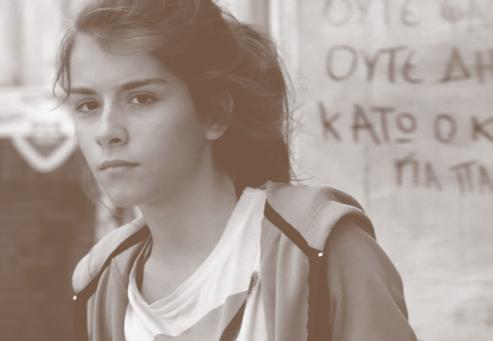
Grecia - Italia / Greece - Italy 2012, HD, col., 87’ v.o. greca / Greek o.v.
sceneggiatura / screenplay: Thanos Anastopoulos, Vassilis Giatsis. Fotografia / Photography: Elias Adamis. montaggio editing: Napoleon Stratogiannakis. suono sound: Philipos Bouraimis, Aris Louziotis, Alexandros Sidiropoulos, costas Varibopiotis. scenografia art Director: Mayou Trikerioti. costumi / costume Designer: Mayou Trikerioti, danai Elefsinioti. Interpreti / cast: Savina Alimani, Aggelos Papadimas, Yorgos Symeonidis, Ieronymos Kaletsanos, ornela Kapetani, Theodora Tzimou.
Produzione / Produced by: Anastato Film, Fantasia Ltd, Mansarda Production Srl. con il sostegno di supported by: Greek Film centre, Nova. Distribuzione internazionale / World sales: Fantasia Ltd.

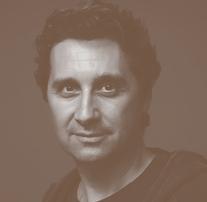
thanos anastoPoulos v. pag. 136 / see page 136
ceRcHI / cIRcLes
SRDAN GOLUBOVIć
Bosnia, 1993. nel bel mezzo della guerra in Bosnia, marko, un soldato serbo, è testimone della brutale aggressione a Haris, un civile musulmano, da parte di tre commilitoni. marko interviene e salva Haris, ma viene picchiato a morte dai soldati furibondi. 2008: la guerra è finita ma le ferite del conflitto sono ancora aperte. Il padre di marko sta ricostruendo una chiesa, gli viene offerto aiuto da uno dei figli degli assassini di marko ed esita ad accettare. un amico di marko, noto chirurgo di Belgrado, deve fare una scelta difficile quando gli viene detto che deve operare uno di quei tre soldati che è sul punto di morte. quanto a Haris, ora vive in Germania ed è di fronte a un’occasione unica per sdebitarsi col suo salvatore. Krugovi è stato selezionato al sundance, alla Berlinale (Forum) e al sarajevo Film Festival. “questo film è ispirato a fatti reali. quando ho sentito la storia di un soldato serbo che ha salvato la vita del suo vicino musulmano e per questo è stato picchiato a morte dai suoi compagni, dei soldati serbi, ho capito che dovevo raccontare questa storia, come un fatto unico tra le rare storie positive della guerra nella ex-Jugoslavia ... Durante la guerra vivevo a Belgrado e studiavo alla scuola di cinema. Il campo di battaglia era a 100 km da me e io sono rimasto atterrito dagli orrori quotidiani, ma non ho avuto il coraggio o non ho potuto ribellarmi. Fare questo film è la mia riconciliazione personale con quel periodo.” (S. Golubović)
Bosnia, 1993. In the midst of the Bosnian War, marko a serbian soldier witnesses the brutal aggression of Haris, a muslim civilian, by three fellow soldiers. marko interferes and saves Haris, but is beaten to death by the infuriated soldiers. 2008. the war is over but the wounds of the conflict are still open. marko’s father is rebuilding a church, he is offered help by one of marko’s killers’ son and hesitates about accepting it. marko’s friend, a renowned surgeon in Belgrade, faces terrible choices when told to operate on one of the three soldiers on the verge of death. as for Haris, he now lives in Germany and is faced with a unique opportunity to repay his debt to his savior. Krugovi was selected at the latest sundance, Berlinale (Forum) and sarajevo Film Festival.
FuoRI coNcoRSo Out OF cOmPetItIOn

“this film is inspired by true events. When I heard a story about a serbian soldier who saved the life of his muslim neighbor, and because of that was beaten to death by his fellow serbian soldiers, I realized that I must present this story, as a unique one amongst rare positive stories of war in former Yugoslavia ... During the ex-Yugoslav war, I lived in Belgrade and studied at Film school. the battlefield was 100 km from me and I was appalled with the horrors that happened on an everyday basis, but I didn’t have the courage or I couldn’t rebel against it. making this film is my personal reconciliation with those times.” (S. Golubović) serbia - Germania - Francia - croazia - slovenia serbia - Germany - France - croatia - slovenia 2012, 35mm, col., 112’ v.o. serba - tedesca / serbian - German o.v.
sceneggiatura / screenplay: Srdan Golubović, Srđan Koljević, Melina Pota Koljević. Fotografia / Photography: Aleksandar Ilić. montaggio editing: Marko Glušac. musica music: Mario Schneider. suono sound: Julij Zornik. scenografia art Director: Goran Joksimović. costumi / costume Designer: Liljana Petrović. Interpreti / cast: Leon Lučev, Aleksandar Berček, Nebojša Glogovac, Hristina Popović, Nikola Rakočević, Boris Isaković, Vuk Kostić.
Produzione / Produced by: Film House Baš Čelik, Neue Mediopolis Filmproduktion GmbH, La cinéfacture, Vertigo, Propeler Film. coproduzione co-produced by: Arte France cinema. Distribuzione internazionale / World sales: Memento Films International.
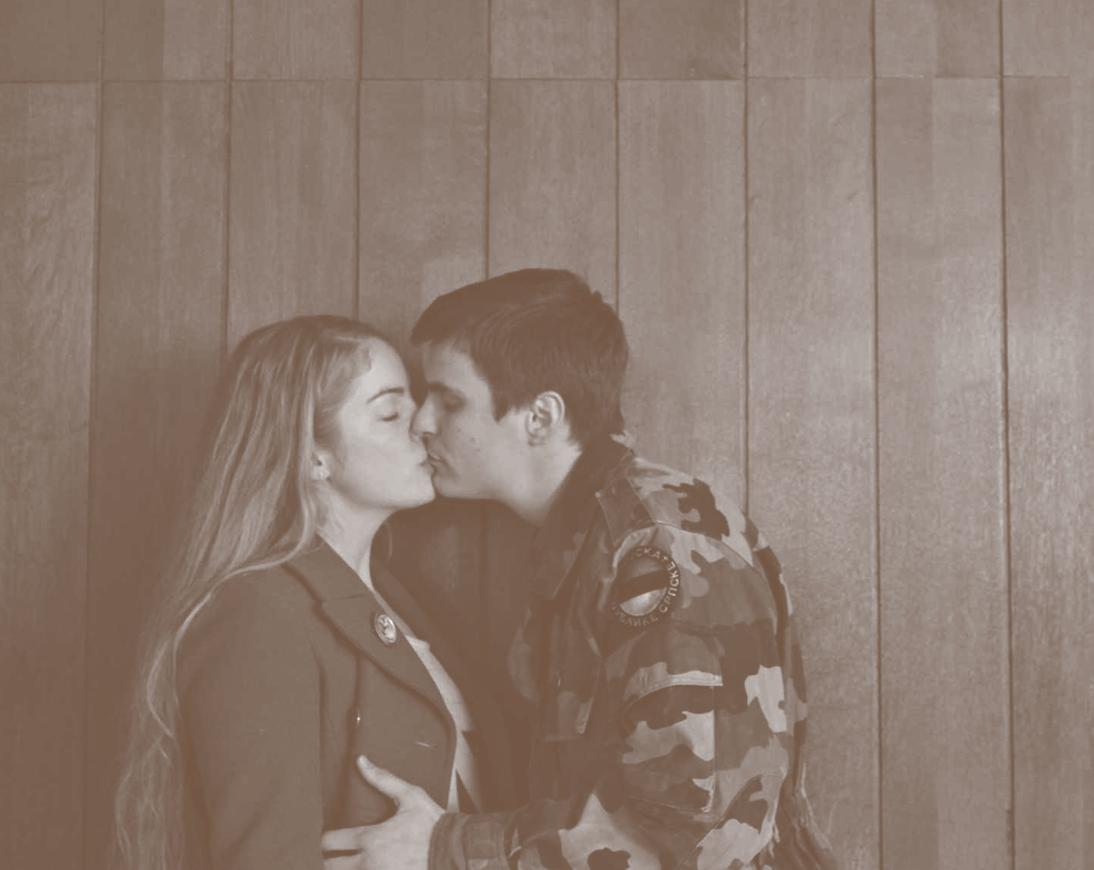
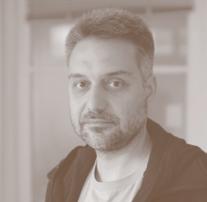
SRDAN GOLUBOVIć
è nato nel 1972 a Belgrado, ora serbia. Srdan Golubović was born in 1972 in Belgrado, now Serbia. filmografia scelta / selected filmography 2001 apsolutnih sto 2007 Klopka 2013 Krugovi; Premi / awards: sundance FF – Premio speciale della giuria / special Jury award; sarajevo FF – Premio del pubblico / audience award
Il rapporto tra il nuovo professore di tedesco e suoi studenti si fa sempre più teso a causa di un’incolmabile differenza fra loro modi di intendere la vita. quando una studentessa si suicida, i compagni accusano l’insegnante di essere responsabile della sua morte. La consapevolezza che non tutto è bianco o nero arriverà troppo tardi. In concorso all’ultima settimana Internazionale della critica di venezia.
“La storia si basa su fatti realmente accaduti mentre ero al liceo, quando una ragazza del terzo anno si è suicidata. a questo fatto è seguita una ribellione spontanea dei suoi compagni di classe contro il sistema scolastico e gli insegnanti. nel corso di una ricerca più approfondita, ho scoperto molto sulle relazioni reciproche fra protagonisti della vicenda e sulle tensioni che a quei tempi esistevano tra di loro. questo è servito da quadro per la storia e come base per la maggior parte delle scene del film.” (R. Biček)
Due to a huge difference in the way they perceive life, the relationship between the students and their new German language teacher becomes critically tense. When one of the students commits suicide, her classmates accuse the teacher of being responsible for her death. the realisation that things are not so black and white comes too late. In competition at the latest venice International Film critics’ Week.
“the story is based on true events I experienced at the grammar school, when a third-year girl committed suicide. this was followed by a spontaneous rebellion by her classmates against the school system and teachers. During a more detailed research on these events, I found out a lot about the mutual relationships between the people involved and the tense situations going on back then. this served as a strong framework for the story and as the basis for most of the scenes in the film.”
(R. Biček)
FuoRI coNcoRSo Out OF cOmPetItIOn

slovenia 2013, HD, col., 112’ v.o. slovena - tedesca / slovenian - German o.v.
sceneggiatura / screenplay: Nejc Gazvoda, Rok Biček, Janez Lapajne. Fotografia / Photography: Fabio Stoll. montaggio editing: Janez Lapajne, Rok Biček. suono sound: Julij Zornik, Peter Žerovnik. scenografia art Director: danijel Modrej. costumi / costume Designer: Bistra Borak.
Interpreti cast: Igor Samobor, Nataša Barbara Gračner, Tjaša Železnik, Maša Derganc, Robert Prebil, Voranc Boh, Jan Zupančič, daša cupevski.
Produzione, distribuzione internazionale
Produced by, World sales: Triglav Film.
coproduzione co-produced by: Slovenski Filmski center.
Distribuzione per l’Italia /
Distributed in Italy by: Tucker Film.
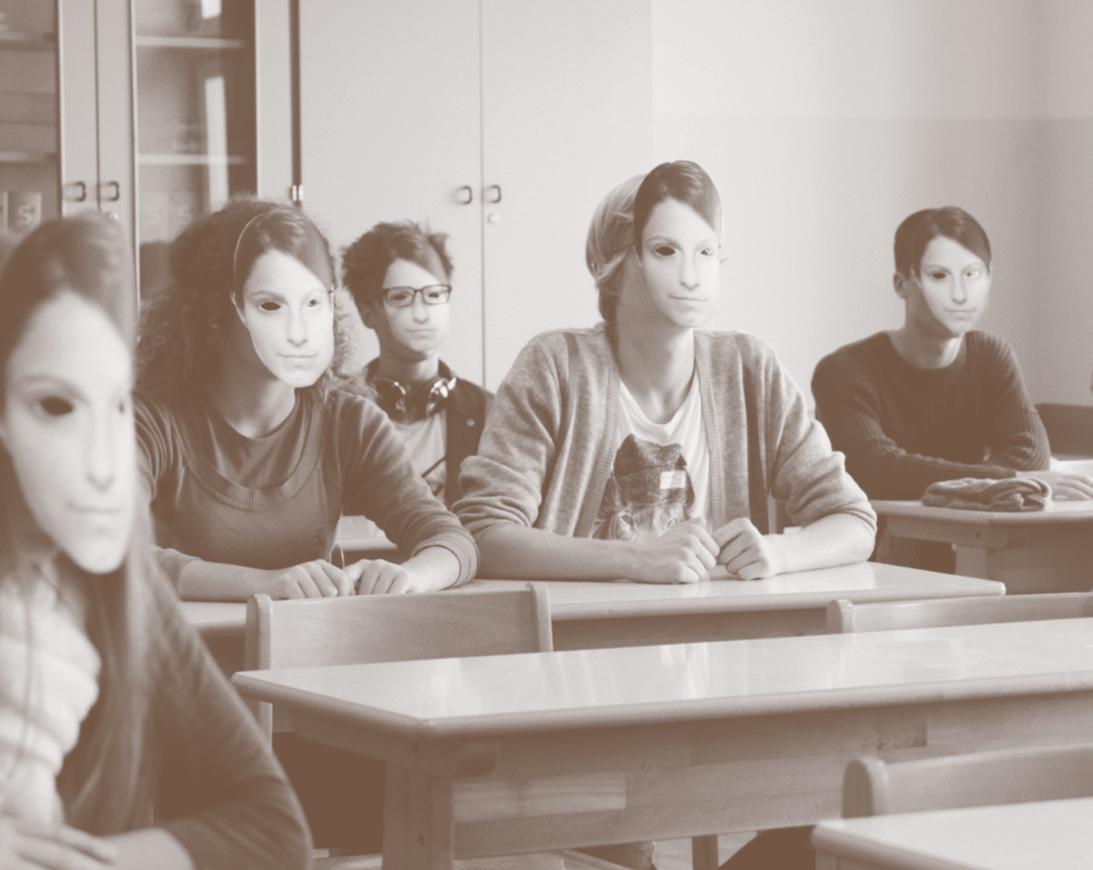
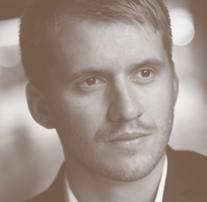
ROK BIčEK
è nato nel 1985 a novo mesto, ora slovenia.
Rok Biček was born in 1985 in Novo Mesto, now Slovenia.

FILM D’APERTURA / OPENING FILM
EPIzODA U ŽIVOTU BERAčA ŽELJEzA
Danis Tanović
FILM DI CHIUSURA / CLOSING FILM
WAŁĘSA. CzŁOWIEK z NADzIEI
andrzej Wajda

GRANDI MAESTRI & TRIESTE / GREAT MASTERS & TRIESTE
doc Portrait: fRANCO GIRALDI (work in progress)
Luciano De Giusti
LINO MICCICHÈ, MIO PADRE. UNA VISIONE DEL MONDO
Francesco miccichè
omaggio ad alberto farassino / a tribute to alberto farassino
omaggio ad alBerto
tatti sanguineti (montaggio / editing)
Pays BarBare
Yervant Gianikian, angela Ricci Lucchi
TRIESTE FF ArtHouse
melting street
Ivana Hrelja
PROJECT: RAK
Damjan Kozole
shirley- visions oF reality
Gustav Deutsch
1914-2014 I cento annI della grande guerra
1914-2014 one hundred years from the great war la grande guerra
mario monicelli
i sentieri della gloria:
in viaggio con mario monicelli sui luoghi della grande guerra
Gloria De antoni
una famiglia Rom vive a Poljice, lontano dai centri urbani della Bosnia ed erzegovina. Il padre nazif recupera metallo da vecchie auto e lo vende a un robivecchi. La madre senada tiene in ordine la casa, cucina, cuoce e si prende cura delle loro due figlie piccole. un terzo figlio è in arrivo. un giorno sente un forte dolore all’addome. nazif prende una macchina a prestito e la porta alla clinica più vicina. La diagnosi è che senada ha perso il bambino ed è a rischio setticemia se non viene operata immediatamente. ma senada non ha l’assicurazione medica, perciò l’operazione costerà molto di più di quanto la famiglia può permettersi e il primario dell’ospedale si rifiuta di curarla. Inizia così una corsa contro il tempo e contro la disperazione di senada… Epizoda u životu berača željeza era in concorso all’ultimo Festival di Belino dove ha vinto il Gran premio della giuria e quello per il miglior attore.
“Il film è la ricostruzione di eventi reali e l’intenzione alla base del film è quella di mostrare le discriminazioni che le minoranze devono affrontare in Bosnia ed erzegovina, in particolare le comunità Rom ... tutte le scene mi sono state descritte da nazif e le abbiamo girate così come lui se le ricordava. non c’è una sceneggiatura. quasi tutte le persone che compaiono nel film sono quelle che realmente hanno vissuto la vicenda.” (D. Tanović)
a Roma family living in Poljice far away from the urban centres of Bosnia & Herzegovina. the father nazif salvages metal from old cars and sells it to a scrap-dealer. the mother senada keeps the house tidy, cooks, bakes and cares for their two small daughters. a third baby is on the way. One day, she feels a sharp pain in her abdomen. nazif borrows a car to drive her to the nearest clinic. the diagnosis is that senada has miscarried and she is at risk of septicaemia and they must operate immediately. But senada has no medical insurance; since the operation will cost much more than the family can afford the hospital’s head refuses to treat her. a race against time and senada’s mounting sense of hopelessness begins…
Epizoda u životu berača željeza was in competition at the latest Berlinale, where was awarded for Jury Grand Prix and Best actor.
“the film is a reconstruction of real events and the intention behind the film is to show the discrimination minorities have to deal with in Bosnia & Herzegovina, Roma communities in particular ... all the scenes were described to me by nazif and we would then play them out as he remembered them. no screenplay. almost all the people in the film are the actual people who took part in the real event.”
(D. Tanović)
ANTEPRIMA ITALIANA - FILM d’APERTuRA
taLIan PRemIeRe - OPenInG FILm
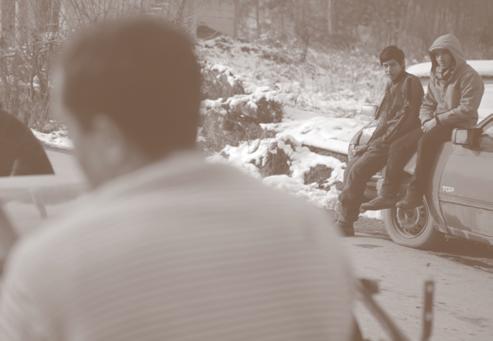
Bosnia ed erzegovina - Francia - slovenia
Bosnia & Herzegovina - France - slovenia
2013, HD, col., 75’ v.o. bosniaca / Bosnian o.v.
sceneggiatura / screenplay: Danis Tanović.
Fotografia / Photography: Erol Zubčević. montaggio editing: Timur Makarević. suono sound: Samir Fočo.
Interpreti / cast: Senada Alimanović, Nazif Mujić, Sandra Mujić, Šemsa Mujić. Produzione / Produced by: SccA/pro.ba (Sarajevo center for contemporary Art), ASAP Films, Vertigo/Emotionfilm.
In associazione con /
In association with:
Rai cinema.
con il sostegno di supported by:
Fondacija za kinematografijo Federacije Bosne in Hercegovine. Distribuzione internazionale / World sales: The Match Factory.
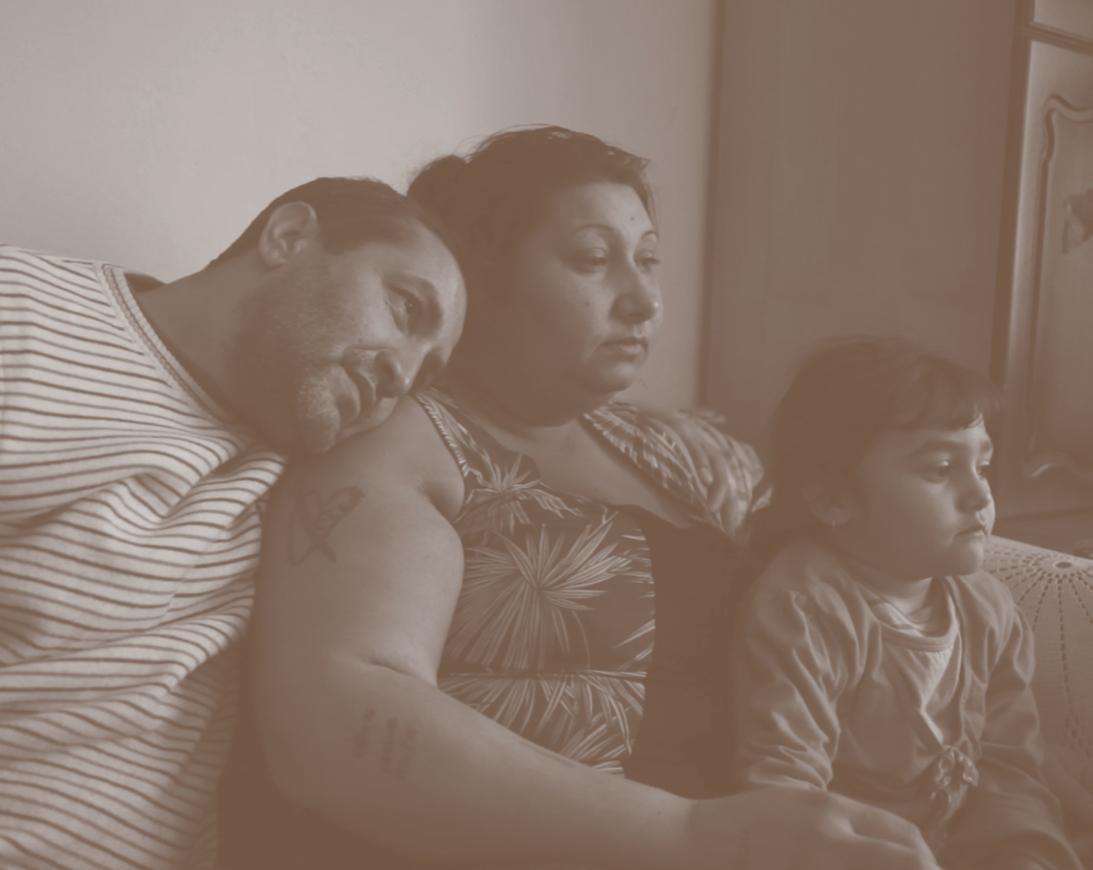

è nato nel 1969 a Zenica, ora Bosnia ed erzegovina. nel 2001 il suo film di debutto no man’s Land ha vinto l’Oscar come miglior film straniero.
Danis Tanović was born in 1969 in Zenica, now Bosnia & Herzegovina. Tanović’s 2001 debut feature no man’s Land won the academy award as Best Foreign Language Film. filmografia scelta / selected filmography 2001 no man’s Land; Premi awards: Oscar come miglior film in lingua straniera / academy award as Best Foreign Language Film; cannes FF - miglior sceneggiatura / Best screenplay 2005 L’enfer 2009 triage 2010 cirkus columbia 2013 Epizoda u životu berača željeza; Premi / awards: Berlinale - Gran premio della giuria, miglior attore / Jury Grand Prix, Best actor
ANDRzEJ WAJDA
Wałęsa. Człowiek z nadziei è la storia di un eroe contemporaneo, Lech Wałęsa. Il film inizia con Oriana Fallaci che va nell’appartamento dei Wałęsa per intervistare il futuro Premio nobel. La conversazione, piena di emozioni, con una delle giornaliste più famose del mondo, costituisce il tessuto narrativo del film. La storia biografica inizia invece nel 1970: poco dopo che le autorità comuniste avevano soffocato sanguinosamente le proteste degli operai, Wałęsa viene costretto a firmare un impegno a collaborare con servizi di sicurezza. Le scene che mostrano il percorso di un eroe verso la maturità politica vengono intrecciate con quelle della vita familiare di Wałęsa. La relazione tra Lech e Danuta, la loro casa piena di bambini e i problemi quotidiani sono importanti tanto quanto la dimensione politica. al pensiero di una vita normale tutta da impostare e realizzare insieme si oppongono, o si impongono, eventi politici importantissimi che richiedono una presa di posizione...
Wałęsa. Człowiek z nadziei è stato presentato Fuori concorso all’ultima mostra del cinema di venezia.
“Sono consapevole che Wałęsa è stato il soggetto più difficile con cui ho avuto a che fare durante i 55 anni della mia carriera cinematografica ... Ammiro Lech Wałęsa da quando l’ho conosciuto durante le trattative tra Solidarność e la Commissione Governativa. vorrei che il film lo rispecchiasse. Il film si rivolge a tutti, ma mi piacerebbe attirare specialmente i giovani, perché credo che Lech Wałęsa sia un buon esempio per convincerli a partecipare attivamente alla nostra vita politica.” (a Wajda)
FILM dI cHIuSuRA
cLOs nG FILm
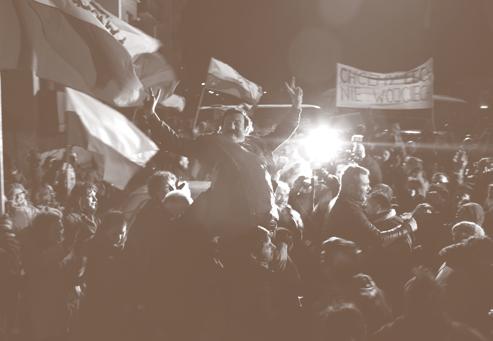
Polonia / Poland 2013, 35 mm, col., 127’ v.o. polacca / Polish o.v.
Wałęsa. Człowiek z nadziei is a story of a contemporary hero – Lech Wałęsa. The movie begins with Oriana Fallaci appearing at the Wałęsas’ flat in an apartment block to interview the future nobel Prize winner. the emotion-packed conversation with one of the world most famous journalists constitutes a fabric of the movie narrative. the actual biographical story begins in 1970: soon after the communist authorities have bloodily suppressed the workers’ protests, Wałęsa is forced to sign an obligation to collaborate with the security services. the following scenes showing hero’s path to political maturity are interwoven with the Wałęsas’ family life. The relationship between Lech and Danuta, their house full of kids and daily problems are as important as politics – they thought they were to live regular lives in their Gdansk apartment, but instead they were surrounded by momentous, political events, calling for taking a stand... Wałęsa. Człowiek z nadziei premiered Out of competition at the latest venice Film Festival.
“I am well aware Wałęsa is the most difficult subject I have ever dealt with in the 55 years of my film career ... I admired Wałęsa from the very first moment I met him - during the talks between Solidarność and the Government Committee. This movie will reflect all that. movie is addressed to everyone, but I’d especially like to reach the younger audiences, as Lech is a good example to convince them that they should participate in our political life.”
(a . Wajda)
sceneggiatura / screenplay: Janusz Głowacki. Fotografia / Photography: Paweł Edelman. montaggio editing: Grażyna Gradoń, Milenia Fiedler. musica music: Paweł Mykietyn. suono sound: Jacek Hamela. scenografia art Director: Magdalena dipont. costumi / costume Designer: Magdalena Biedrzycka.
Interpreti cast: Robert Więckiewicz, Agnieszka Grochowska, Zbigniew Zamachowski, Cezary Kosiński, Maria Rosaria Omaggio, Mirosław Baka, Maciej Stuhr. Produzione / Produced by: Akson Studio.
coproduzione co-produced by: orange, TVP - Telewizja Polska S.A., NcK - National center For culture, canal +. con il sostegno di supported by: Polish Film Institute. Distribuzione internazionale / World sales: Films Boutique. Distribuzione per l’Italia / Distributed in Italy by: Nomad Film distribution.


ANDRzEJ WAJDA
È nato nel 1926 a Suwałki, in Polonia. Uno dei più importanti e pluripremiati registi del cinema contemporaneo, ha ricevuto l’Oscar alla carriera nel 2000. / Andrzej Wajda was born in 1926 in Suwałki, Poland. One of the most important and award-winning directors of contemporay cinema, he received the academy award for Lifetime achievement in 2000. filmografia scelta / selected filmography 1954 Pokolenie (Generation) 1957 Kanał (I dannati di Varsavia Kanal); Premi / Awards: Cannes - Premio speciale della giuria / special Prize of the Jury 1958 Popiół i diament (cenere e diamanti / ashes and Diamond) 1965 Popioły (ceneri sulla grande armata / the ashes) 1970 Brzezina (Il bosco di betulle / the Birch Wood) 1974 Ziemia obiecana (La terra della grande promessa / the Promised Land) 1977 Człowiek z marmuru (L’uomo di marmo / man of marble) 1981 Człowiek z żelaza (L’uomo di ferro / man of Iron); Premi / awards: cannes - Palma d’Oro / Golden Palm 1982 Danton 1987 Les Possédés (I demoni / the Possessed) 1990 Korczak (Dottor Korczak / Dr. Korczak) 2007 Katyń 2013 Wałęsa. Człowiek z nadziei
Il documentario ricostruisce momenti salienti dell’avventura cinematografica di Franco Giraldi, regista di film significativi del loro tempo, come La bambolona, o esemplari della sua cultura e sensibilità, come La rosa rossa, un anno di scuola, La giacca verde La frontiera ne ripercorre le tappe, anche esistenziali: l’infanzia carsica e girovaga, gli anni della formazione triestina, la partenza per Roma, l’apprendistato accanto ad alcuni grandi registi, l’esordio nel cinema western, il successo nella commedia italiana, la stagione dei film più intimi e personali. sulla sua rievocazione s’innestano le testimonianze di collaboratori e compagni di strada: Tullio Kezich, callisto cosulich, ugo Pirro, carlo Lizzani, Omero antonutti, Luis Bacalov, Laura morante.
“Dopo avergli dedicato un libro qualche anno fa, ho cercato di delineare un piccolo ritratto di Franco Giraldi raccontando il suo lungo viaggio attraverso il cinema: un itinerario meno noto di quanto meriterebbe, soprattutto agli occhi dei più giovani. Pensando a loro ho voluto tracciarlo in forma breve, agile, veloce.” (L. De Giusti)
the documentary examines the significant moments in the cinema career of Franco Giraldi, the director of films that made an impact when they were released, such as La bambolona, or which were exemplary of his culture and sensitivity, like La rosa rossa, un anno di scuola La giacca verde and La frontiera. It explores the phases of his career, including the existential ones: his childhood in the carso and wanderings, the years of schooling in trieste, his departure for Rome and apprenticeship under some great directors, his debut with westerns, the success of his ‘commedia italiana’, the period of more intimate, personal films. this evocation of his life and career is accompanied by the accounts of colleagues and travelling companions: tullio Kezich, Callisto Cosulich, Ugo Pirro, Carlo Lizzani, Omero antonutti, Luis Bacalov and Laura morante.
“after dedicating a book to him a few years ago, I sought to outline a little portrait of Franco Giraldi’s long career in cinema. this is an itinerary that is not as well known as it deserves, especially with regard to the young. With these in mind, I have tried to sketch out a brief, agile, quick-moving portrait.” (L. De Giusti)
luciano de giusti
Italia / Italy, 2014, HD, col. & b-n / b-w, 30’, v.o. italiana / Italian o.v.
sceneggiatura / screenplay: Luciano de Giusti. montaggio / editing: diego cenetiempo. Produzione / Produced by: Pilgrim Film.
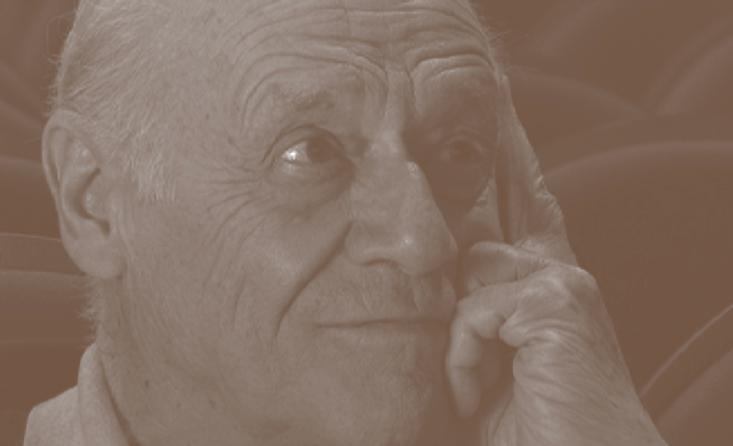
luciano de giusti
è nato nel 1964 a santa Lucia di Piave (treviso), in Italia.
Luciano De Giusti was born in 1964 in santa Lucia di Piave (treviso), Italy. 1988 settimo set. Fabio carpi gira L’amore necessario doc. 1998 Partire nel sogno. Dominique sanda ricorda Robert Bresson doc. 2014 Doc Portrait: Franco Giraldi (work in progress) doc.
LInO mIccIcHè, mY FatHeR. a vIsIOn OF tHe WORLD
Francesco miccichè
Italia / Italy 2013, HD, col. & b-n / b-w, 83’, v.o. italiana / Italian o.v.
sceneggiatura, montaggio / screenplay, editing: Francesco Miccichè. Fotografia / Photography: Gioacchino castiglione. musica / music: Francesco cerasi, Giancarlo Russo, Fernando Alba.
con gli interventi di / Interviews with: Michelangelo Antonioni, Adriano Aprà, Mino Argentieri, Marco Bellocchio, Bernardo Bertolucci, Francesco crispino, caterina d’Amico, Suso cecchi d’Amico, cesare de Michelis, Federico Fellini, carlo Lizzani, cecilia Mangini, citto Maselli, Marco Müller, Stefania Parigi, Pier Paolo Pasolini, Salvatore Piscicelli, Beniamino Placido, Giovanni Spagnoletti, Vittorio Taviani, Giorgio Tinazzi, Bruno Torri, Walter Veltroni, Vito Zagarrio.
voce / voice: Pierfrancesco Favino. Produzione / Produced by: Micci film.

Francesco miccichè
è nato nel 1966 a Roma, in Italia. Francesco miccichè was born in 1966 in Rome, Italy. filmografia scelta selected filmography
1997 Baci proibiti cm / sf 2000 La via dei Fori Imperiali doc. 2005-2006 La squadra 7 serie tv / tv series
2008 medicina Generale 2 serie tv / tv series 2012 Ris Roma 3 serie tv / tv series 2013 Lino miccichè, mio padre. una visione del mondo doc.
La vita di Lino miccichè*, intellettuale, critico e storico del cinema, saggista e organizzatore culturale, raccontata dal particolare punto di vista del figlio, il regista Francesco miccichè. con il racconto dell’intensa vita di Lino miccichè, grazie anche a materiale inedito fornito da Rai teche e dall’archivio del movimento Operaio, si ripercorre un momento importante della storia del cinema italiano dalla fine degli anni cinquanta agli anni 2000. attraverso questo percorso nasce la riflessione su una generazione di padri e su ciò che questi hanno lasciato ai figli.
“Fare un film sul proprio padre è un viaggio ... a quasi dieci anni dalla sua scomparsa, mi sembrava necessaria una riflessione su una vita che tanto ha dato e tanto ha fatto per il cinema. mio padre aveva chiaramente in testa una ‘visione del mondo’, mondo che ha tentato di migliorare proprio in virtù di quel suo punto di vista.” (F. miccichè)
* Docente di storia del cinema all’università di trieste dal 1973 al 1976.
this documentary on the life of Lino miccichè*, a leading Italian intellectual, film critic and historian, columnist and cultural organizer is narrated from the personal point of view of his son, the director Francesco miccichè. Its account of Lino miccichè’s intense life, enriched with previously unpublished Rai archive material, effectively traces the full span of Italian cinema from the 1950s until the first decade of this century, using this narrative to reflect on a whole generation of fathers and what they left to their sons.
“making a film about one’s own father is a journey ... nearly ten years after his death, it seemed important to me to reflect on a life that gave and did so much for cinema. my father had a clear “vision of the world” in his head and tried to improve the world to make it correspond with that vision.”
(F. miccichè)
* Professor of Film History at the university of trieste from 1973 to 1976.
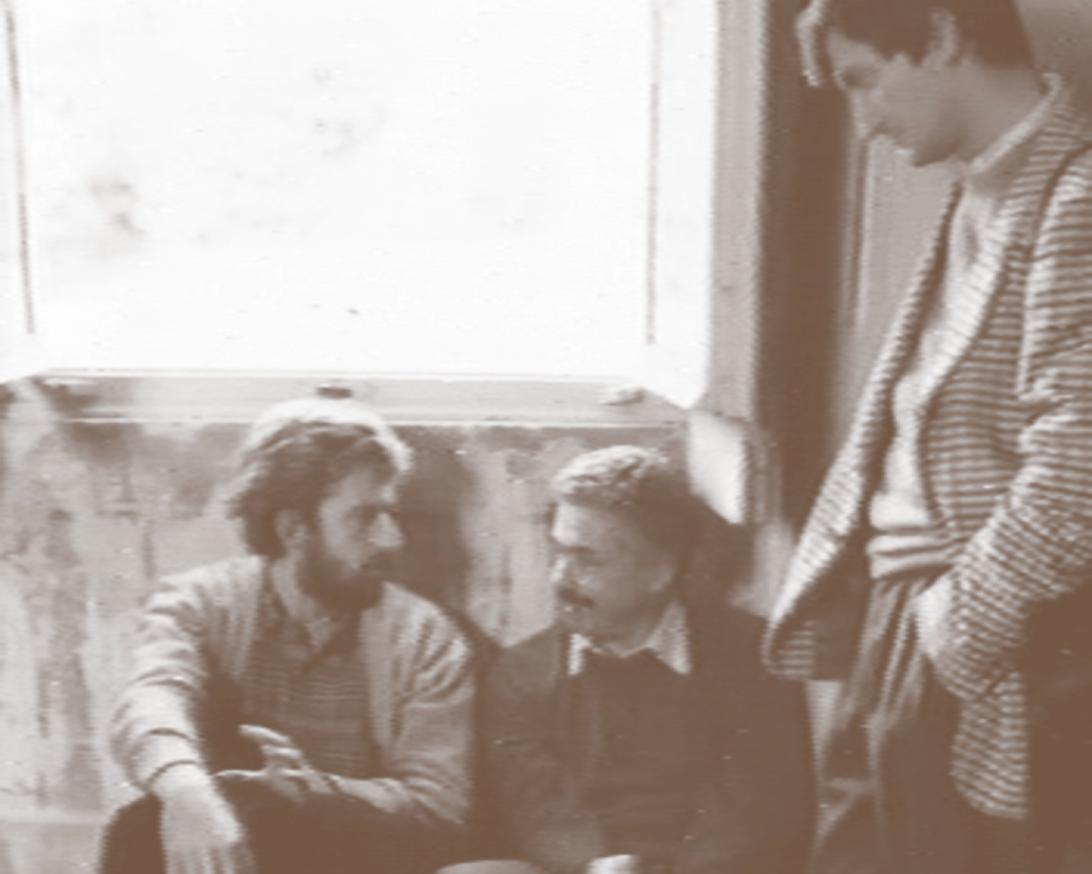
Paese BaRBaRO / BaRBaRIc LanD
Francia / France, 2013, 16mm & 35mm, b-n / b-w & col., 65’, v.o. francese - italiana / French - Italian o.v.
sceneggiatura, montaggio / screenplay, editing: Yervant Gianikian, Angela Ricci Lucchi.
musica / music: Giovanna Marini, Keith ullrich. voci / voices: Yervant Gianikian, Angela Ricci Lucchi, Giovanna Marini.
Produzione Produced by: Les Films d’Ici. coproduzione / co-produced by: ARTE France, La Lucarne. Distribuzione per l’Italia Distributed in Italy by: Felrinelli Editore.
tO aLBeRtO
Italia / Italy, 2003, b-n / b-w & col., 9’ v.o. italiana / Italian o.v.
è un montaggio, realizzato da tatti sanguineti, di materiali tratti da un film in super8 girato da Yervant Gianikian nel 1979, da una puntata de “Il club” dedicata a mario camerini e andata in onda su cineclassic nel 1999, e fotografie di Fulvia Farassino.
edited by tatti sanguineti from a 1979 super8 film by Yervant Gianikian, from an episode of “the club” dedicated to mario camerini, broadcasted in cineclassic in 1999, with photographs by Fulvia Farassino.
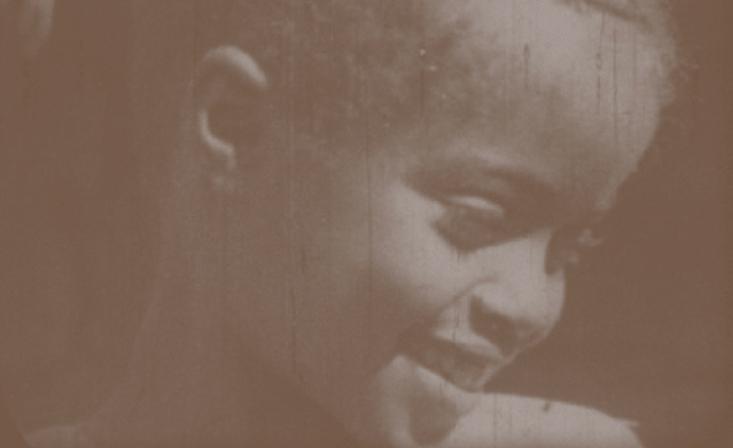
yERVANT GIANIKIAN, ANGELA RICCI LUCCHI
Da più di 40 anni Yervant Gianikian (1942, di origine armena) e angela Ricci Lucchi (1942, Lugo di Romagna, Ravenna) hanno costruito il loro approccio cinematografico a partire dalla rivisitazione di archivi visivi.
For over 40 years now, Yervant Gianikian (1942, of armenian descent) and angela Ricci Lucchi (1942, Lugo di Romagna, Ravenna, Italy) have based their filmmaking practice on revisiting archival film footage. filmografia scelta selected filmography
1981 essence d’absinthe cm / sf 1987 Dal Polo all’equatore 1998 su tutte le vette è pace 2000 Inventario Balcanico
2001 Images d’Orient, tourisme vandale 2004 Oh! uomo 2009 Frammenti elettrici n.6 – Dancing in the Dark
omaggio ad Alberto Farassino
GReat masteRs & tRIeste
a tribute to alberto Farassino
una delle pagine più buie e vergognose della storia d’Italia, la guerra d’africa, che portò alla conquista d’etiopia, vista attraverso un susseguirsi ininterrotto d’immagini di repertorio, spesso mai mostrate in pubblico.
“Il nostro lavoro è una lotta contro la violenza e la guerra. a volte ci chiediamo perché continuiamo a batterci. L’Italia oggi sta attraversando cose che ci sconvolgono ... con la nostra ‘camera analitica’ siamo tornati a frugare negli archivi cinematografici per trovare fotogrammi dell’etiopia/abissinia del periodo coloniale italiano. abbiamo trovato diversi film privati di un medico: L’erotismo coloniale. Il corpo nudo delle donne e il ‘corpo’ del film. vedute aeree del territorio. sui bombardieri si caricano bombe all’iprite, il cui utilizzo è sempre stato negato. Fotogrammi militari sconosciuti che mostrano gli uomini e le armi della violenta impresa italiana per la conquista dell’etiopia e la scritta: ‘Per questo paese primitivo e barbaro l’ora della civiltà è ormai scoccata’.” (Y. Gianikian, a . Ricci Lucchi)
One of the darkest and most shameful pages of Italy’s history: the african war and the occupation of ethiopia, seen through a sequence of archive images, most of which have never been screened before.
“Our work is a struggle against violence and war. sometimes we wonder why we continue to fight. Italy is currently undergoing changes that upset and astonish us... We started rummaging through the film archives with our ‘analytic camera’ to find photograms from ethiopia/abyssinia at the time of the Italian colonization. We found a lot of private footage shot by a doctor: L’erotismo coloniale (colonial eroticism). Women’s naked bodies and the ‘body’ of the film. aerial shots of the area. Bombers being loaded with mustard gas bombs, which the authorities have always denied using. Recently unearthed military footage showing the men and the means of the brutal Italian attempts at conquering ethiopia and the phrase: ‘civilization now dawns in this primitive and barbaric land’.”
(Y. Gianikian, a . Ricci Lucchi)
* Docente di storia del cinema all’università di trieste dal 1976 al 1996.
* Professor of Film History at the university of trieste from 1976 to 1996.
2013 Pays Barbare
a Pola, lo scorso 5 maggio, l’artista elisa vladilo ha creato un’installazione urbana in una strada. molti volontari hanno preso parte a questo evento. questo breve documentario è un ricordo di quella splendida giornata.
In Pula, last 5th of may, the artist elisa vladilo created an urban installation in a street. many volunteers came and took part in this event. this short documentary is a memory of that wonderful day.
croazia / croatia, 2013, HD, col., 19’, v.o. croata - inglese / croatian - english o.v.
Fotografia / Photography: Zlatko Pančić. montaggio, suono / editing, sound: Zlatko Pančić, Marko Zdravković-Kunac.
Interpreti / cast: Elisa Vladilo, Mirjana Grahovac-Vojinović e i volontari / & the volunteers. Produzione / Produced by: Pulska filmska tvornica.
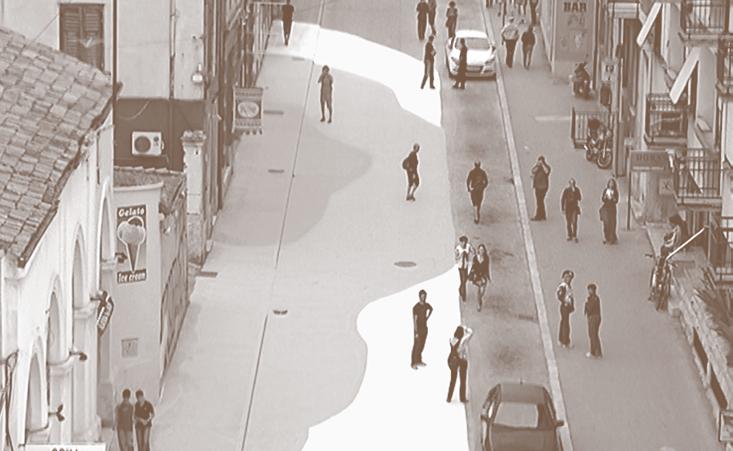
IVANA HRELJA
è nata nel 1978 a Pola, ora croazia.
Ivana Hrelja was born in 1978 in Pula, now croatia.
2004 Who’s alive, Who’s Dead cm / sf 2005 Boutique Flower cm sf 2006 man’s a Wolf to a man cm sf
2007 Katarina and Her Children doc. 2013 Woman, child cm / sf; melting street cm / sf doc.
PROGettO cancRO / PROJect canceR
DAMJAN KOzOLE
slovenia, 2013, HD, b-n / b-w & col., 91’, v.o. inglese / english o.v.
sceneggiatura / screenplay: Tevž Logar.
Fotografia / Photography: Matjaž Mrak. montaggio / editing: Jurij Moškon. musica / music: Silence. suono / sound: Julij Zornik.
Interpreti / cast: Ulay, Marina Abramović, Chrissie Iles, chris dercon, Roselee Goldberg, Saskia Bos, charlemagne Palestine, Vlado Kreslin, chuck close, Sean Kelly, Henk ”Hanky Panky” Schiffmacher. Produzione Produced by: Vertigo Emotionfilm. con il sostegno di / supported by: Slovenian Film centre, Media Programme.
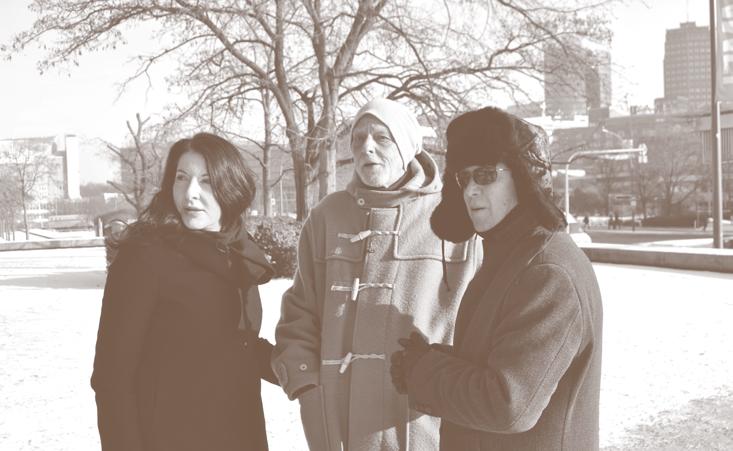
DAMJAN KOzOLE
È nato nel 1964 a Brežice, ora Slovenia. Damjan Kozole was born in 1964 in Brežice, now Slovenia. filmografia scelta selected filmography
1987 usodni telefon 1988 Remington 1997 stereotip 2000 Porn Film 2003 Rezervni Deli (spare Parts)
2005 Delo Osvobaja 2008 Za vedno 2009 slovenka 2013 Project: Rak doc.
ulay è stato un pioniere della body art, della performance art e della polaroid art: è stato un travestito, metà uomo e metà donna, un attivista sociale... ma è noto soprattutto per la sua lunga collaborazione con Marina Abramović e per le loro famose ed emblematiche performance. nel 2009 ulay si trasferisce a Lubiana. quando le trattative per il film sono già a buon punto, a ulay viene diagnosticato un cancro, e tutto cambia. Le prime scene vengono girate nel novembre 2011 presso l’Istituto di Oncologia di Lubiana, dove ulay sta facendo la chemioterapia. quando le sue condizioni di salute migliorano, decide di visitare suoi amici in tutto il mondo e la macchina da presa lo segue in questa sorta di ‘viaggio d’addio’: a Berlino per la première del film di marina, poi a new York e, infine, nella “sua” amsterdam. La macchina da presa lo ha seguito per un anno intero, fino al novembre 2012. ulay considera la malattia come il suo più grande e importante progetto. Da qui il titolo del film. “In tutta l’opera di ulay, identità sessuale e corpo umano sono stati il tema principale. e il corpo umano è anche il tema di questo film. non ulay, ma il suo corpo.” (D. Kozole)
ulay was a pioneer of body art, performance art and polaroid art he was a transvestite, a half man - half woman, a social activist ..., but he is most famous for his long year collaboration with Marina Abramović and their performances that have achieved iconic status. In 2009, ulay moved to Ljubljana. When talks and plans on the film were already under way, ulay was diagnosed with cancer, and all plans changed. the first scenes were shot in november 2011 at the Ljubljana Institute of Oncology, where ulay was receiving chemotherapy. When his health slightly improved, he decided to visit his friends around the world and the camera followed him on this so called farewell journey: to Berlin for the premiere of marina’s film, then to new York and finally to “his” amsterdam. the camera followed ulay for one whole year, up to novembre 2012. ulay treats this illness as his biggest and most important project ever, hence the title of the film.
“In all ulay’s works, sexual identity and human body have always been the main subject. the main theme of this film is also a human body. It is not ulay, but his body.” (D. Kozole)
una serie di scatti dalla vita di un’attrice immaginaria di nome shirley servono a fondere insieme 13 dipinti di edward Hopper in una sintesi di pittura e cinema, storia politica e storia personale. Ogni tappa della vita professionale e privata di shirley, dagli anni ‘30 agli anni ‘60 ha una data precisa: è sempre il 28 e il 29 agosto di quell’anno, mentre luoghi variano da Parigi a new York a cape cod. shirley è una donna che vorrebbe influenzare il corso della storia con il suo coinvolgimento professionale e socio-politico. una donna il cui lavoro di attrice l’ha avvicinata alla messa in scena della realtà, alla sua messa in discussione e ridefinizione. una donna che non si identifica con il modello tradizionale di moglie ma desidera invece avere un compagno di vita. una donna che non si compromette nei momenti di crisi professionale. una donna che nei momenti di crisi personale decide di rimanere al fianco del suo compagno e mette il proprio interesse professionale da parte. shirley è una donna attraente, carismatica, impegnata, emancipata.
a series of snapshots from the life of a fictional actress named shirley serves to weave together thirteen paintings by edward Hopper into a synthesis of painting and film, personal and political history. each station in shirley’s professional and private life from the 1930s to 1960s is precisely dated: It is always august 28/29 of the year in question, as the locations vary from Paris to new York to cape cod. shirley is a woman who would like to influence the course of history with her professional and socio-political involvement. a woman whose work as an actress has familiarised her with the staging of reality, the questioning and shaping of it. a woman who cannot identify with the traditional role model of a wife yet longs to have a life partner. a woman who does not compromise in moments of professional crisis. a woman who in a moment of private crisis decides to stick with her partner and puts her own professional interest on the back burner. shirley, an attractive, charismatic, committed, emancipated woman.
gustav deutsch
austria, 2013, HD, col., 92’, v.o. inglese / english o.v.
sceneggiatura, montaggio / screenplay, editor: Gustav deutsch. Fotografia / Photography: Jerzy Palacz. musica / music: christian Fennesz, david Sylvian. suono / sound: christoph Amann. scenografia / art Director: Gustav deutsch, Hanna Schimek.
costumi costume Designer: Julia cepp, Mija T.Rosa. Interpreti cast: Stephanie cumming, christoph Bach, Florentin Groll, Elfriede Irrall, Tom Hanslmaier.
Produzione / Produced by: KGP Kranzelbinder Gabriele Production.
Distribuzione internazionale / World sales: EastWest distribution.
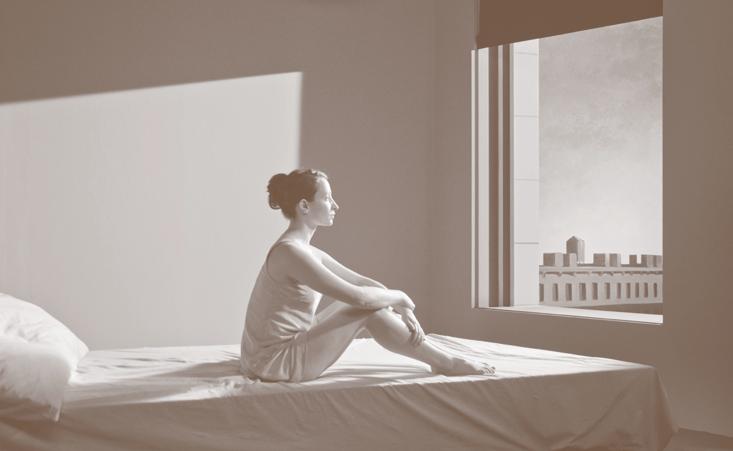
gustav deutsch
è nato nel 1952 a vienna, in austria. Gustav Deutsch was born in 1952 in vienna, austria. filmografia scelta / selected filmography
1984 Wossea mtotom
1-6
2010 Private Sandnes. A Kinematographic Atlas cm / sf 2013 shirley – visions of Reality
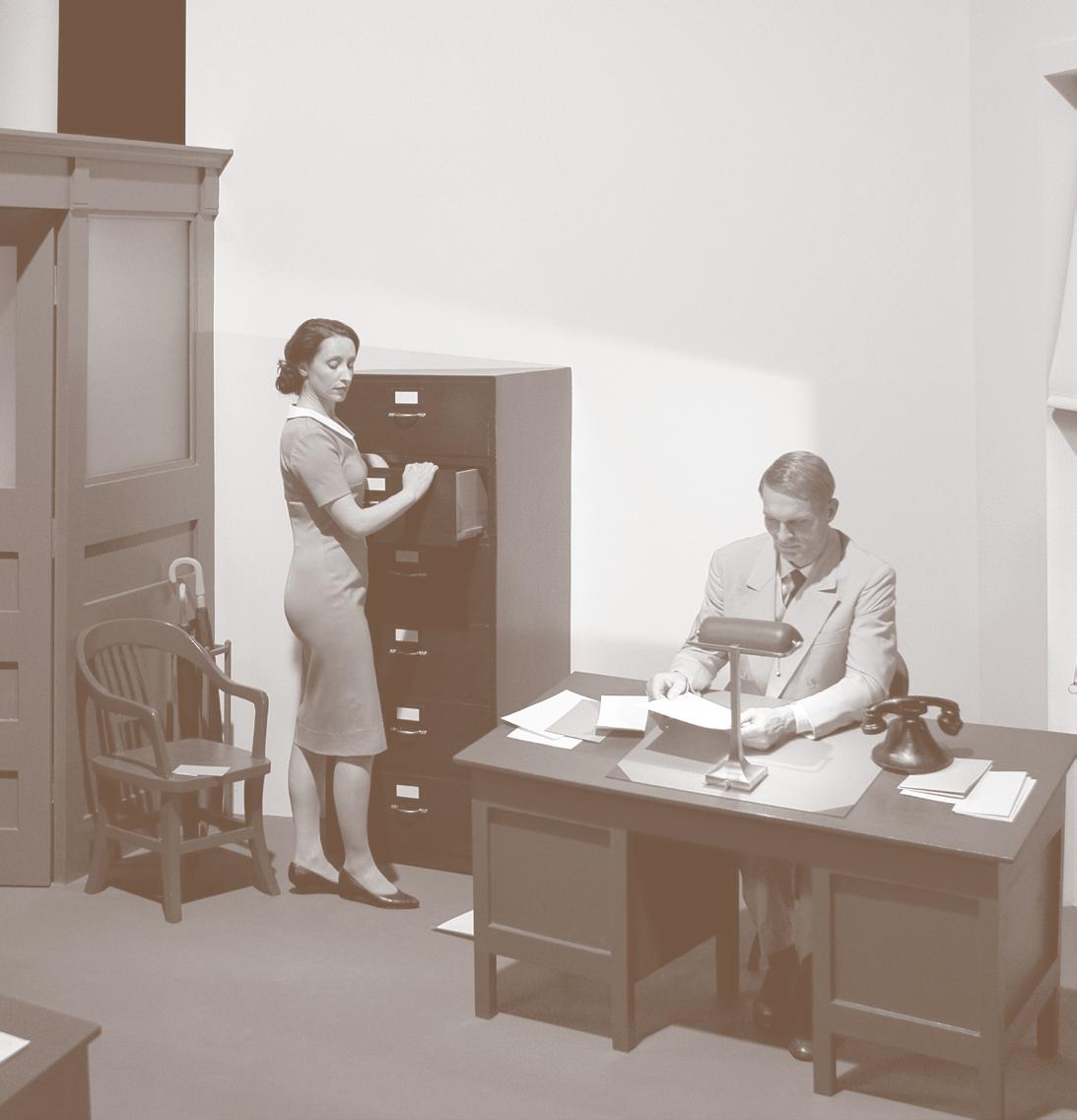
Oreste Jacovacci di Roma e Giovanni Busacca di milano s’incontrano durante la chiamata alle armi all’inizio della Prima guerra mondiale. anche se diversi di carattere, sono accomunati dalla mancanza di ideali e dalla volontà di evitare ogni pericolo e uscire indenni dalla guerra. assieme a un gruppo di civili e di altri soldati (tra cui la prostituta costantina, interpretata da silvana mangano) passano attraverso numerose peripezie durante l’addestramento, combattimenti e i rari momenti di congedo. In seguito alla disfatta di caporetto vengono nominati ‘staffette portaordini’, mansione molto pericolosa, che viene loro affidata perché considerati come ‘meno efficienti’ a causa del loro scarso valore militare. Dopo aver svolto la loro missione, si coricano nella stalla di un avamposto poco lontano dalla prima linea, ma una repentina avanzata degli austriaci li “trasporta” in territorio nemico, dove vengono catturati. sorpresi a indossare cappotti dell’esercito austro-ungarico nel tentativo di fuggire, vengono accusati di spionaggio e minacciati di fucilazione... considerato uno dei migliori film italiani sulla guerra, vinse il Leone d’oro alla mostra del cinema di venezia di quell’anno ex aequo con Il generale Della Rovere di Roberto Rossellini e ricevette la nomination all’Oscar come miglior film in lingua straniera.
Oreste Jacovacci from Rome and Giovanni Busacca from milan meet each other during the call to arms at the start of World War I. although completely different in character, they are united in their lack of idealism and their desire to avoid any danger and get out of the war unscathed. they and a varied group of civilians and fellow soldiers (including the prostitute costantina, played by silvana mangano) go through many ups and downs during their training, battles and rare moments of leave. they are considered “inefficient” due to their limited military valour and so are made message-runners to the staff, a very dangerous job. Having succeeded in their mission, a sudden change in which side hold which trench leaves them in enemy territory, where they are captured by the austrians wearing austrian uniforms they had found in a barn. they are accused of espionage and condemned to be shot by firing squad...
One of the best Italian films about war, won the Golden Lion at the venice Film Festival in 1959 ex aequo with Il generale Della Rovere by Roberto Rossellini and was an academy award nominee as Best Foreign Film.
tHe
GReat WaR
Italia - Francia / Italy - France, 1959, 35mm, b-n / b-w, 137’, v.o. italiana / Italian o.v.
sceneggiatura / screenplay: Mario Monicelli, Age & Scarpelli, Luciano Vincenzoni. Fotografia / Photography: Giuseppe Rotunno, Leonida Barboni, Roberto Gerardi. montaggio / editing: Adriana Novelli. musica / music: Nino Rota. suono / sound: Roy Mangano, Bruno Moreal.
scenografia / art Director: Mario Garbuglia. costumi costume Designer: danilo donati. Interpreti cast: Alberto Sordi, Vittorio Gassman, Silvana Mangano, Folco Lulli, Bernard Blier, Romolo Valli, Vittorio Sanipoli, Nicola Arigliano, Mario Valdemarin, Elsa Vazzoler, Tiberio Murgia, Ferruccio Amendola, Achille compagnoni, Tiberio Mitri.
Produzione Produced by: dino de Laurentiis cinematografica, Gray Films.
in viaggio con mario monicelli sui luoghi della grande guerra
gloria de antoni
Italia / Italy, 2005, Betacam sP, col., 42’, v.o. italiana / Italian o.v. tHe PatHs OF GLORY: tRaveLLInG WItH maRIO mOnIceLLI aROunD tHe sItes OF tHe GReat WaR
con la collaborazione amichevole di With the friendly assistance of oreste de Fornari. sceneggiatura / screenplay: Gloria de Antoni. con la consulenza di / consultation: carlo Garbescek, Livio Jacob. Fotografia / Photography: Roberto Meddi, Marco Monti. montaggio / editing: Letizia caudullo.
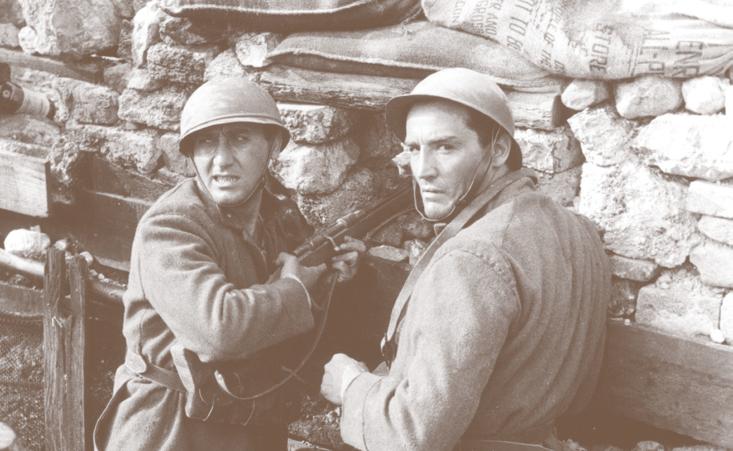
1914-2014 I cENTo ANNI dELLA GRANdE GuERRA
1914-2014 One HunDReD YeaRs FROm tHe GReat WaR
Interpreti / cast: Mario Garbuglia, Giulio Andreotti, Federico Sgobino, e le comparse del film La grande guerra / with extras from The Great War, Luigia chinese, Renzo Fornera, Teresa Lavaroni, Anna Maria Pascolo, Giacomo Pascolo, olga Pascolo, Noè Polame, Maria Saidero, Giovanna Tacco, Rolando Volpe, Irma Zani Rizzi.
Produzione, distribuzione internazionale / Produced by, World sales: La cineteca del Friuli. con il sostegno di / supported by: Regione Autonoma Friuli Venezia Giulia (Assessorato alle Attività Produttive), Friuli Venezia Giulia Film commission (Fondo Regionale per l’Audiovisivo).

1914-2014 I cENTo ANNI
1914-2014 One HunDReD YeaRs FROm tHe GReat WaR
Il documentario è costruito su due piani. Davanti a una moviola mario monicelli rivede e commenta i filmati del suo viaggio-pellegrinaggio sui luoghi in cui fu girato nel 1959 il film La grande guerra in quel Friuli che era stato teatro dei veri combattimenti fra Italiani e austriaci nel conflitto ’15-’18. quel ritorno sugli antichi set (Gemona, venzone, Palmanova, ecc.) è stata un’occasione per incontrare tra una piazza e un’osteria le ormai anziane comparse e i tanti friulani che quel giugno di 45 anni fa accolsero generosamente la troupe del film. a fare gli onori di casa lo storico-cinefiloarcheologo carlo Gaberscek, autore con Livio Jacob del volume Il Friuli e il cinema che ha fornito a Gloria De antoni lo spunto ispiratore di questo documentario. ma la parte più ricca di sorprese è rappresentata dai commenti di monicelli che durante la visione di questi filmati si abbandona a ricordi e riflessioni pieni di umorismo e di saggezza.
this documentary is constructed on two levels. In front of a film viewer, mario monicelli reviews and comments on the films of his journeycumpilgrimage to the places in which the film, the Great War, was made in 1959; in that same Friuli that was the theatre of real fighting between Italians and austrians in the 1915-1918 conflict. that return to the old sets (Gemona, venzone, Palmanova, etc.) provides the opportunity to meet – in squares and bars – the now elderly extras and the many Friulani who generously assisted the team in making the film in that June, 45 years ago. Hosting the event is the historian, film enthusiast and archaeologist, carlo Gaberscek, author with Livio Jacob of a book entitled Il Friuli e il cinema, which provided Gloria De antoni with the inspiration for this documentary. However, the part richest in surprises comes from the comments of monicelli, who lets himself go in seeing these films, remembering episodes and betraying humour and wisdom in his comments.
BANKLADy
christian alvart
domestic adrian sitaru
geograF gloBus ProPil
aleksandr veledinskij
SVEćENIKOVA DJECA
vinko Brešan


La sIGnORa DeLLe BancHe
christian alvart
questa è la storia vera di Gisela Werler. Gisela ha 30 anni, è single, lavora in una fabbrica di carta da parati, e vive con i suoi genitori in condizioni modeste. una vita borghese monotona, non diversa da quella di tanti altri giovani donne nella Germania Ovest degli anni sessanta. ma lei ha un sogno: capri. e sembra finalmente a portata di mano quando incontra l’affascinante Hermann, tassista e rapinatore di banche. Gisela si innamora di lui, un colpo di fulmine improvviso e intenso. Lo supplica di portarla con sé nelle rapine in banca, dimostrando di essere una rapinatrice dotata di talento e sangue freddo. è l’inizio di una nuova coppia, Bonnie e clyde della periferia di amburgo. ed è anche l’inizio della vita segreta di Gisela Werler come “Banklady”.
ANTEPRIMA ITALIANA
taLIan PRemIeRe
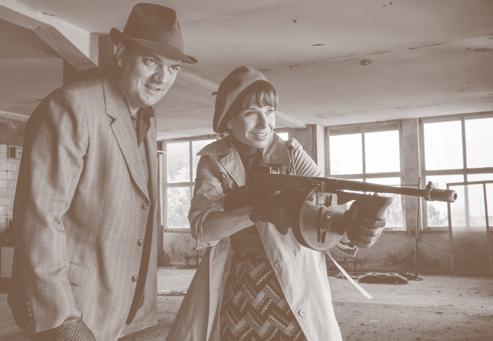
this is the true story of Gisela Werler. Gisela is 30, single, works in a wallpaper factory, and lives with her parents in modest circumstances. a humdrum middle-class life, no different than that of countless other young women in West Germany in the 1960s. But she has a dream: capri. and it finally seems within reach when she meets the charming Hermann, cab driver and bank robber. she falls for him, quick and hard. Begs him to take her with him on his bank heists – and proves to be a gifted, if not quite cold-blooded, robber of her own. It’s the beginning of a notorious new duo, the Bonnie and clyde of suburban Hamburg. and the start of Gisela Werler’s secret life as the “Banklady”. Germania / Germany 2013, 35mm, col., 117’ v.o. tedesca / German o.v.
sceneggiatura / screenplay: christoph Silber, Kai Hafemeister. Fotografia / Photography: Ngo The chau. montaggio editing: Sebastian Bonde, Philipp Stahl, christian Alvart. musica music: Steffen Kahles, christoph Blaser, Michl Britsch. suono sound: Jörg Krieger. scenografia art Director: Birgit Kniep-Gentis, Gabriella Ausonio. costumi / costume Designer: Ingken Benesch.
Interpreti cast: Nadeshda Brennicke, charly Hübner, Ken duken, Andreas Schmidt, Heinz Hoenig, Henny Reents, Niels Bruno Schmidt, Jürgen Schornagel, Elisabeth Schwarz, olaf Krätke, Heinz Struck, Nathalie Thiede. Produzione / Produced by: Syrreal Entertainment GmbH. coproduzione co-produced by: Studiocanal, NdR, ARd degeto. con il sostegno di supported by: Nordmedia, Filmförderung Hamburg Schleswig-Holstein, FFA, dFFF. Distribuzione internazionale / World sales: Global Screen GmbH.
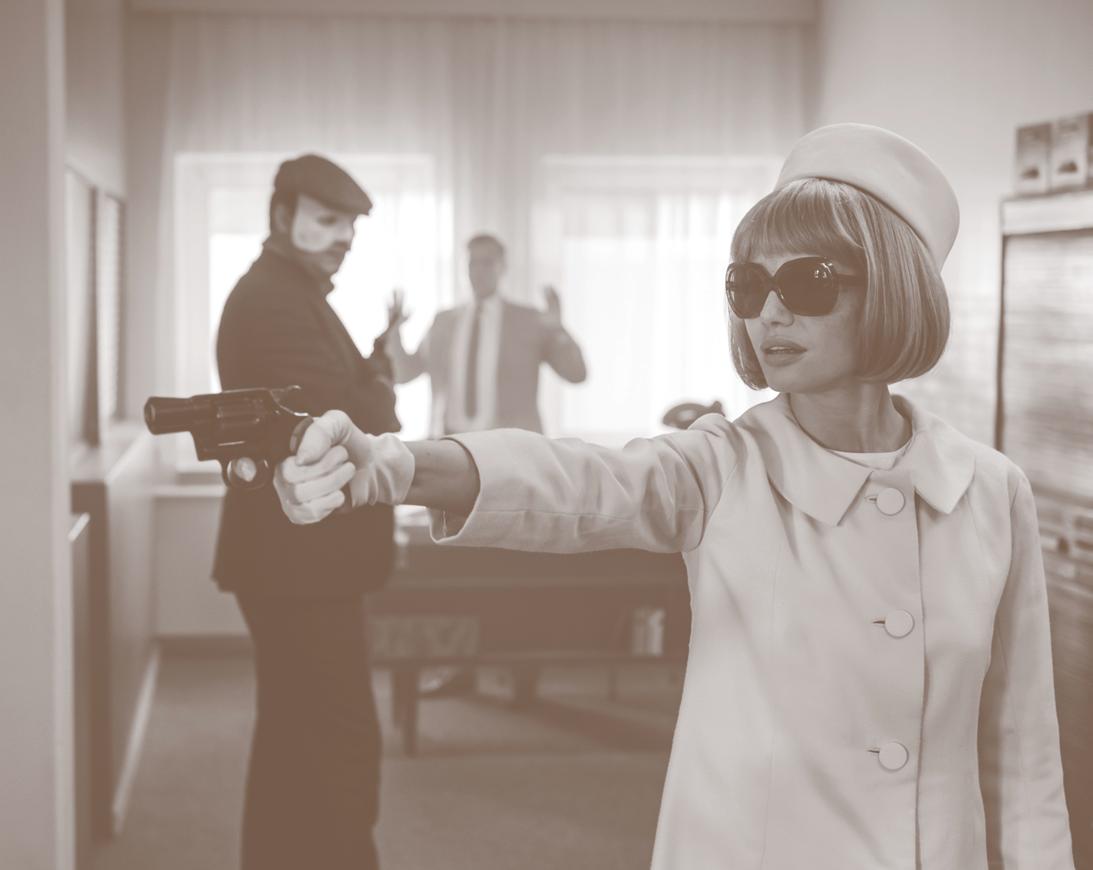

christian alvart
è nato nel 1974 a seeheim-Jugenheim, in Germania. christian alvart was born in 1974 in seeheim-Jugenheim, Germany. filmografia scelta / selected filmography 1999 curiosity & the cat 2005 antikörper 2009 Fall 39 (case 39); Pandorum (Pandorum – L’universo parallelo) 2013 Banklady
DOmestIcO / DOmestIc
adrian sitaru
meravigliosamente surreale e dolorosamente reale, è la storia di bambini, adulti e animali che vivono assieme cercando di avere una vita migliore, ma talvolta la morte arriva inaspettatamente. La vita di tre personaggi alle prese con eventi straordinari, divertenti, assurdi ma al tempo stesso molto realistici. Parla di noi, persone che mangiano gli animali che amano e degli animali che invece ci amano incondizionatamente. In Domestic, sitaru inserisce elementi dei suoi pluripremiati cortometraggi e li rimescola in un intreccio completamente nuovo e complesso, dove ritornano non solo gli attori ma anche alcuni dei suoi personaggi.
“amore, affetto, amicizia, comportamento umano e animale, il film racconta la distanza molto piccola che separa esseri umani e animali. Persone che riscoprono i sentimenti e l’amore grazie agli animali che incontrano nella loro vita ... animali che ti fanno amare, che diffondono l’amore, che aiutano a migliorare il carattere delle persone.” (a. sitaru)
Wonderfully surreal, painfully real, this is the story of children, adults and animals who live together trying to have a better life, but sometimes death comes unexpectedly. the lives of three characters surrounded by a bunch of extraordinary, funny, absurd but quite realistic events. It is all about us, people who eat the animals that they love and the animals that love people unconditionally.
In Domestic, sitaru includes elements of his award-winning short films and remixes them into a completely new plot. not only the actors, but also some characters are included in the feature.
“Love, affection, friendship, human and animal behavior, the film is a mix that reveals the very small distance that separates us humans as a species from animals. People who rediscover feelings, love through the animals that rush into their lives ... animals that make you love them, that plant the seeds of love between people, that change characters for the better.” (a sitaru)
ANTEPRIMA ITALIANA
taLIan PRemIeRe
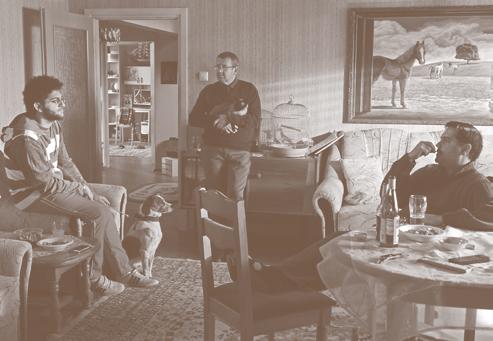
Romania
2012, HD, col., 85’ v.o. rumena / Romanian o.v.
sceneggiatura / screenplay: Adrian Sitaru.
Fotografia / Photography: Adrian Silişteanu. montaggio editing: Andrei Gorgan, Adrian Sitaru. musica music: Sebastian Zsemlye, Adrian Sitaru. suono sound:
Tamász Zányi, Gábor Balázs. scenografia art Director: cristian Niculescu. costumi / costume Designer: Malina Ionescu.
Interpreti cast: Adrian Titieni, Gheorghe Ifrim, Sergiu Costache, Clara Vodă, Ioana Flora, dan Hurduc, Ariadna Titieni.
Produzione, distribuzione internazionale / Produced by, World sales: 4 Proof Film.
coproduzione co-produced by: Titus Kreyenberg.


adrian sitaru
è nato nel 1971 a Deva, in Romania. adrian sitaru was born in 1971 in Deva, Romania. filmografia scelta / selected filmography
2007 valuri cm /sf; Premi / awards: Locarno FF - miglior cortometraggio / Best
short Film 2008 Pescuit sportiv 2009 Lord cm / sf 2011 Din dragoste, cu cele mai bune intentii Premi / awards: Locarno FF - miglior regia, miglior attore / Best Director, Best actor 2012 Domestic
ALEKSANDR VELEDINSKIJ
Il biologo Viktor Služkin è disoccupato. Nel disperato tentativo di trovare un lavoro nella città di provincia di Perm’, dove vive con la moglie e la figlia, accetta un posto come insegnante di geografia in una scuola. Lavorare con gli adolescenti è un compito impegnativo, ma riesce a fare amicizia con gli alunni e a conquistare la loro fiducia e rispetto. Purtroppo la vita professionale e familiare di Služkin risente delle sue frequenti sbronze. ma anche se commette degli errori, è comunque un uomo premuroso e amabile, pur essendo considerato un fallito da molti. Dal romanzo di aleksej Ivanov una storia dedicata a tutti coloro che hanno smarrito la strada, a tutti quelli che a volte si sono sentiti disperatamente soli come Viktor Služkin, a tutti coloro che, nonostante la solitudine e la depressione, non hanno mai perso la capacità di sentire e di amare.
2013, HD, col., 120’ v.o. russa / Russian o.v. L
the biologist viktor sluzhkin is unemployed. Desperate to find any job in the provincial town of Perm, where he lives with his wife and daughter, he accepts a post as geography teacher in a school. Working with teenagers is a challenging task, but he manages to make friends with the pupils, and win their trust and genuine respect. However, sluzhkin´s professional and family life suffers from his regular drinking bouts. although sluzhkin makes more than one mistake in life, he is a caring man and therefore a loveable character, even if others might consider him a failure. Based on alexey Ivanov’s novel, it’s a story about everyone who lost his way in life, about everyone who sometimes felt himself as desperately lonely as viktor sluzhkin, about everyone who, despite his solitude and depression, never lost the capacity to feel and to love.
ANTEPRIMA ITALIANA
taLIan PRemIeRe
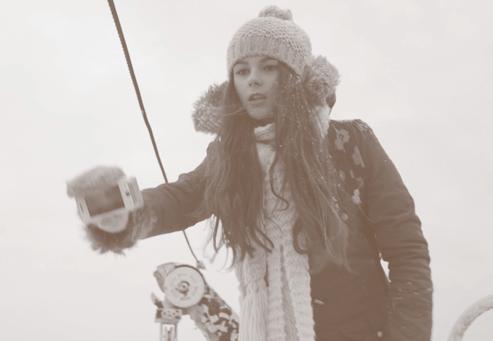
Russia
sceneggiatura / screenplay: Aleksandr Veledinskij, Valerij Todorovskij, Rauf Kubaev, tratta dal romanzo omonimo di / based on novel of the same title by Aleksej Ivanov. Fotografia / Photography: Vladimir Bašta. montaggio editing: Tat’jana Prilenskaja, Aleksandr Veledinskij. musica music: Aleksej P. Zubarev. suono sound: Sergej Kurbatov, oleg Tatarinov. scenografia art Director: Vladimir Gudilin, Sergej Gudilin. costumi / costume Designer: Ljudmila Gainceva.
Interpreti cast: Konstantin chabenskij, Elena Ljadova, Aleksandr Robak, Evgenija Brik, Anna Ukolova, Evgenija Kregžde, Agrippina Steklova, Maksim Lagaškin, Anfisa Černych, Andrej Prytkov. Produzione / Produced by: Studio Krasnaya Strela. Distribuzione internazionale / World sales: Antipode Film Sales.
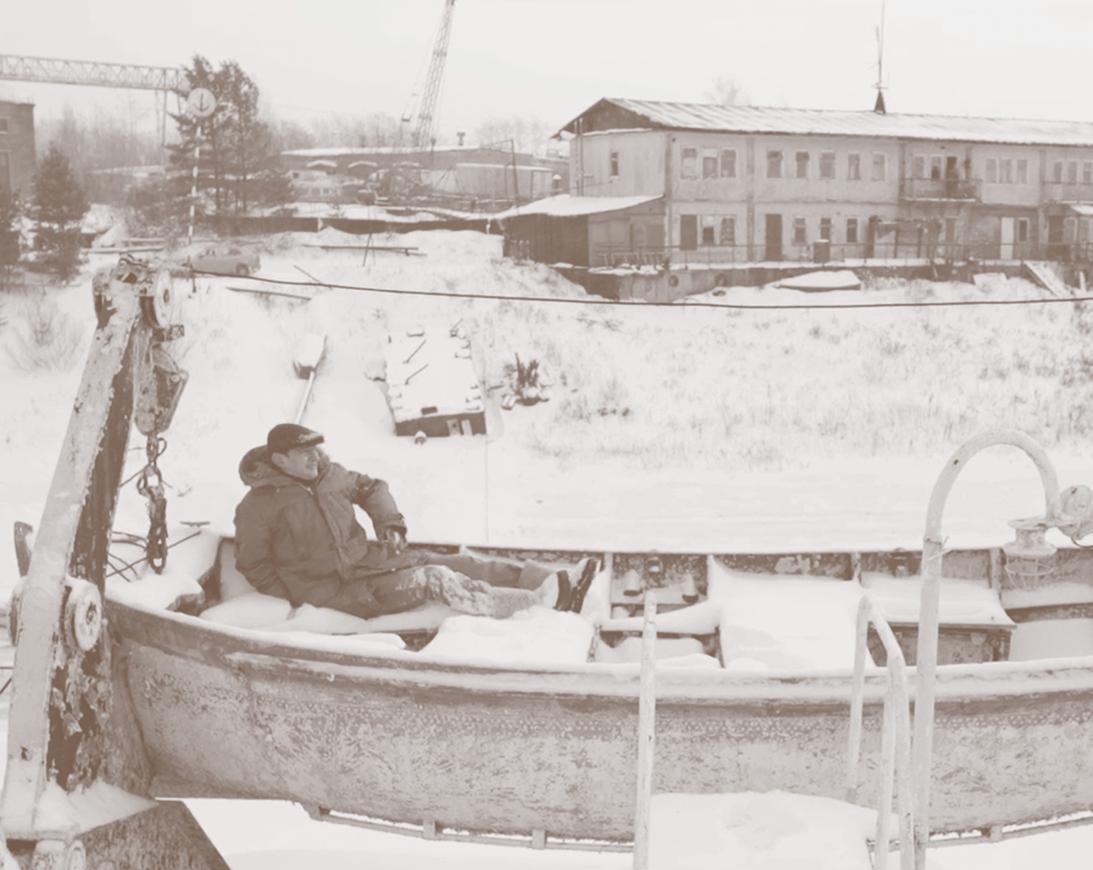
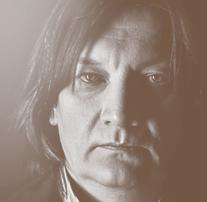
ALEKSANDR VELEDINSKIJ
È nato nel 1959 a Nižnij Novgorod, ora Russia. alexander veledinsky was born in 1959 in nizhny novgorod, now Russia. filmografia scelta / selected filmography
2002 Zakon serie tv /tv series 2004 Russkoye 2006 Živoi 2013 Geograf Globus
Propil; Premi / Awards: Cottbus FF - Miglior film / Best Film; Kinotaur FF - Miglior film, miglior attore, miglior colonna sonora / Best Film, Best actor, Best music
convinto di fare la cosa giusta, perché “anche il Papa è contro l’uso dei preservativi”, don Fabijan, prete cattolico in paesino di un’isola croata, inizia a bucherellare preservativi che Peter, edicolante timorato di Dio, poi rivende nel suo chiosco. Don Fabijan e Peter vengono aiutati anche da marin, il farmacista locale, che inizia di nascosto a sostituire le pillole contraccettive con vitamine. così, controllando la vita sessuale di uomini e donne, tre riescono a eliminare la contraccezione dall’isola. quando iniziano le prime gravidanze indesiderate, don Fabijan fa il possibile per sposare le coppie secondo il rito cristiano, anche contro il loro volere. ma presto, le azioni del trio iniziano a cambiare le vite degli abitanti del luogo, che smettono di essere i fautori del loro destino... Il più grande successo al box office nella storia del cinema croato.
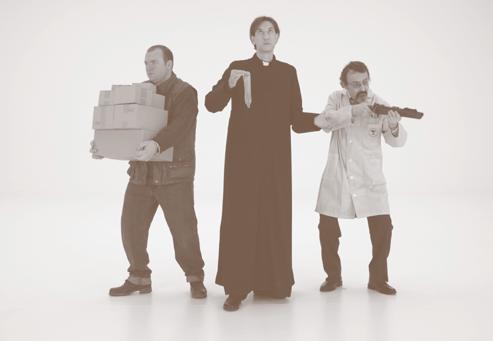
convinced that he is behaving in a righteous manner, because “even the Pope is against the use of condoms”, don Fabijan, a catholic priest in a small town of a croatian island, starts puncturing condoms which the god-fearing newsstand salesman Peter then sells on his kiosk. Don Fabijan and Peter are soon joined by marin, a local pharmacist, who starts secretly planting vitamins pills instead of contraceptives in his pharmacy. thus, controlling the sexual lives of men and women, they practically abolish contraception on the island. as the unwanted pregnancies start occuring, don Fabijan does all he can to marry such couples in a proper christian way, even against their will. But soon, the trios actions start changing the lives of local people who stop being masters of their own faith... the biggest box office hit in the history of croatian cinema. croazia, serbia / croatia, serbia 2013, HD, col., 96’ v.o. croata / croatian o.v.
sceneggiatura / screenplay: Mate Matišić, Vinko Brešan. Fotografia / Photography: Mirko Pivčević. montaggio editing: Sandra Botica Brešan. musica music: Mate Matišić. suono sound: Frano Homen. scenografia art Director: damir Gabelica. costumi / costume Designer: Željka Franulović.
Interpreti cast: Krešimir Mikić, Nikša Butijer, Marija Škaričić, Dražen Kühn, Jadranka Đokić.
Produzione / Produced by: Interfilm.
coproduzione co-produced by: Zillion Film.
con il sostegno di supported by: Eurimages.
Distribuzione internazionale / World sales: Wide.
Distribuzione per l’Italia / Distributed in Italy by: officine uBu
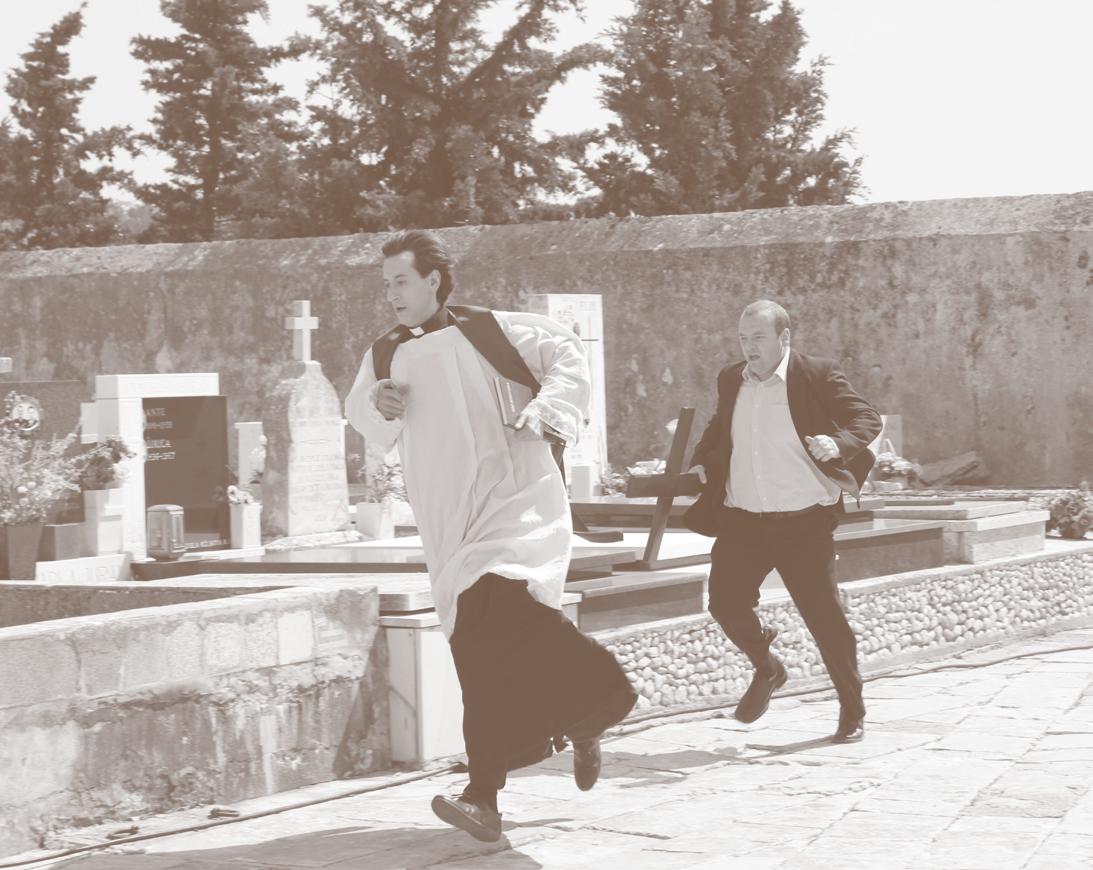
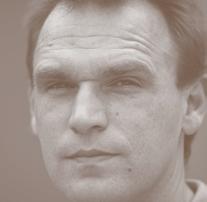
VINKO BREŠAN
è nato nel 1964 a Zagabria, ora croazia. vinko Brešan was born in 1964 in Zagreb, now croatia. filmografia scelta / selected filmography
1996 Kako je počeo rat na mom otoku 1999 maršal; Premi / Awards: Karlovy Vary
IFF – miglior regia / Best director 2004 svjedoci; Premi / awards: Berlinale – Premio della Giuria ecumenica ecumenical Jury award 2008 nije kraj
2013 Svećenikova djeca
alBatrosse
Mike Kren
ALERIK
vuk mitevski
anna
Diego scano, Luca Zambolin
aral-tour international
elena chmelevkaja (alena Rubinštein)
BALLKONI
Lendita Zeqiraj
Boles Špela Čadež
čEST
Pavel G. vesnakov
claudiu & the Fish
Andrei Tănase
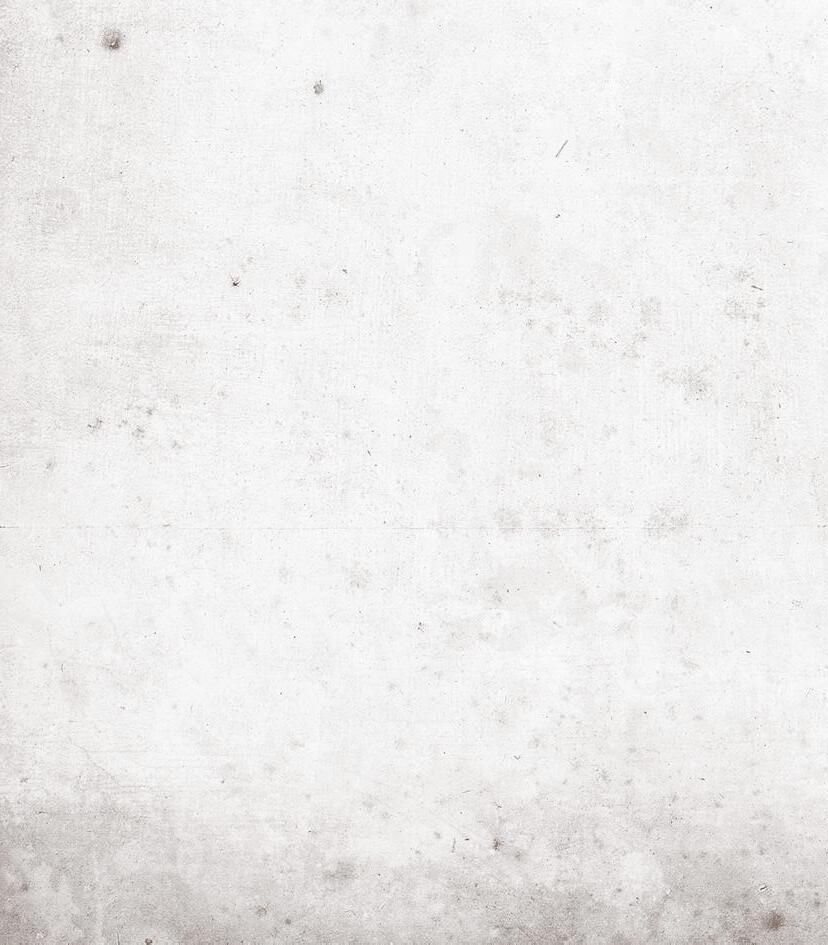

Flora i Fauna
Piotr Litwin
KISPáRIzS
Orsi nagypál
KUTIJA
Nebojša Slijepčević
lehrling
aurelio Buchwalder
mein engel miriam Bliese
o umBRĂ DE Nor Radu Jude
Pragovi
Dijana Mlađenović
Zima marcus Heep
aLBatROs / aLBatROsses
austria, 2013, 35mm, col., 13’, v.o. tedesca / German o.v.
sceneggiatura / screenplay: clara Trischler. Fotografia Photography: Xiaosu Han, Andreas Thalhammer. montaggio / editing: Bettina Enigl. musica, suono / music, sound: Iva Zabkar. scenografia / art Director: christoph Fischer. costumi / costume Designer: Natalie Weller. Interpreti cast: constantin Al Khafaji, Susanne Gschwendtner, Kitty Khittl, Martin Fabini, Reinold Tischler, claudia Martini. Produzione Produced by: Roberto Gruber (FoKuS PoKuS). con il sostegno di supported by: Innovative Film Austria, BMuKK, Wien Kultur, Land Niederösterreich.
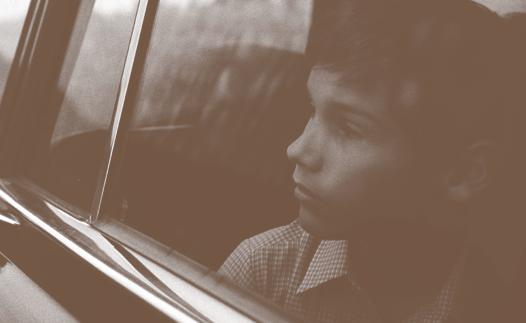
L’ormai adulto Leoš ricorda la sua infanzia nella cecoslovacchia comunista degli anni settanta, la sua fuga in austria e le prime impressioni sul nuovo paese, ma anche le cose e le persone che ha dovuto lasciare alle spalle. un film sulla leggerezza e fugacità dei ricordi d’infanzia e sul peso che possono avere per l’intera vita.
the now grown up Leoš remembers his childhood in communist czechoslovakia of the 1970s, his escape to austria and his first impressions of this new home, but also the things and people he had to leave behind. a film about the lightness and fleetingness of childhood memories and the weight they can have for a whole life.
VUK MITEVSKI
Repubblica di macedonia - Germania / Republic of macedonia - Germany, 2013, HD, col., 17’, v.o. inglese / english o.v.
animazione, design / animation, Design: Vuk Mitevski. sceneggiatura screenplay: Teona Strugar Mitevska. Fotografia / Photography: Antoine Bellem, Jana Lulovska. montaggio editing: Nicholas Gaster. musica / music: Moritz Schmittat. suono / sound: Emil Klotzsch. voce / voice: Kaeliok Fonenimum Varka. Produzione / Produced by: Sisters and Brother Mitevski Production, busse & halberschmidt Filmproduktion. con il sostegno di / supported by: Robert Bosch Foundation, Film und Medien Stiftung NRW, Macedonian Film Fund.

alerik, un ragazzo di 16 anni un po’ svagato, vive con il nonno in un paese in stato di guerra. quando l’anziano uomo perde la vita in un bombardamento, alerik è sconvolto e tormentato da sentimenti di vendetta: così ora la guerra si è presa anche lui. alerik è stato presentato in concorso all’ultimo Festival di sarajevo.
alerik, a moony 16 year old boy, lives together with his grandfather in a land in state of war. When the old man loses his life on a bomb attack, alerik is gripped by feelings of revenge. now the war has finally taken possession of him. alerik was in competition at the latest sarajevo Film Festival.
diego scano, luca ZamBolin
Italia / Italy 2013, HD, col., 16’, v.o. italiana / Italian o.v.
sceneggiatura / screenplay: diego Scano, Luca Zambolin. Fotografia Photography: daria d’Antonio. montaggio / editing: davide Vizzini. musica / music: Michele Menini. suono / sound: Alberto cagol. scenografia art Director: Nadia Pillon. Interpreti cast: Lucia Mascino, Marian Stan, Silvio comis, Stefania Felicioli, Margherita Piccin. Produzione, distribuzione internazionale, distribuzione per l’Italia / Produced by, World sales, Distributed in Italy by: Jolefilm. coproduzione / co-produced by: officina Immagini. con il sostegno di / supported by: AcegasAps.
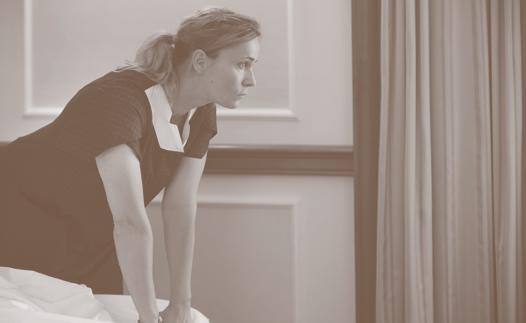
anna lavora come inserviente in un albergo di una piccola località termale. Ha evidenti problemi a relazionarsi con le persone e da molti anni la solitudine prevale nella sua vita, fino a farla chiudere sempre più in un mondo impenetrabile ma equilibrato. questa stabilità viene interrotta da un cambio nel lavoro che costringe anna a rapportarsi con persone sconosciute, trovandosi a stretto contatto con un uomo che la colpisce emotivamente. L’attrazione nei confronti di quest’uomo sarà per lei un motore che azionerà meccanismi emotivi imprevedibili.
anna works as an attendant in a hotel in a small spa town. she has obvious problems to relate with people and for many years the belief of loneliness prevailed in his personality, and she closed more and more into an impenetrable but balanced world. this stability is interrupted by a change of job that forces anna to deal with unknown people, being in close contact with a man who hits her emotionally. the attraction to this man will be a boost that will trigger unforeseeable emotional mechanisms.
Russia - Kazakistan / Russia - Kazakhstan, 2013, HD, col., 30’, v.o. russa - francese - kazaka / Russian - French - Kazakh o.v.
sceneggiatura, montaggio / screenplay, editing: Elena chmelevkaja (Alena Rubinštein). Fotografia Photography: Maksim Khomenko. musica / music: Homuzon. suono / sound: Evgenij Arzmastzev. costumi / costume Designer: olga Maksakova. Interpreti / cast: Venera Kairjanova, Emelija dmitrieva, Vasilij Nastoyašj. Produzione / Produced by: VGIK.
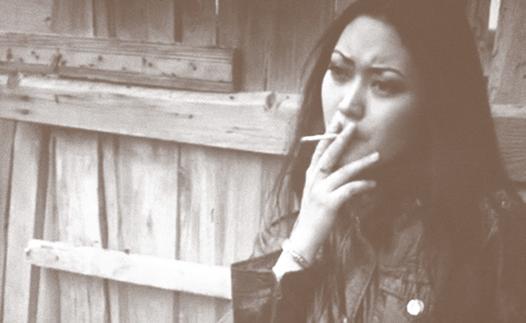
Due ragazze kazake sognano di abbandonare il luogo dove vivono, il lago d’aral, e di andare a vivere in europa. cercano in tutti i modi di andare via da casa ma purtroppo la vita reale non è un sogno: nessuno ne vuole sapere di loro. e allora le ragazze decidono di provare nell’ultimo modo possibile...
Two Kazakh girls dream of leaving the place where they live, the Aral Sea, and to go live in europe. they try in every way to get away from home but unfortunately real life is not a dream: no one wants to take care of them. so the girls decide to try the last possible way...
MIKE KREN
è nato nel 1981 a vienna, in austria.
Mike Kren was born in 1981 in Vienna, Austria. filmografia scelta / selected filmography 2011 I am cereals - Galaxy / the Back Room video musicale / music video (diretto con / directed with mirjam Baker) 2013 albatrosse cm / sf
VUK MITEVSKI
è nato nel 1979 a skopje, ora Repubblica di macedonia. vuk mitevski was born in 1979 in skopje, now Republic of macedonia. filmografia scelta / selected filmography
2008 angel cm animazione / sf animation 2013 alerik cm animazione / sf animation
diego scano
è nato nel 1988 a caracas, in venezuela.
Diego scano was born in 1988 in caracas, venezuela.
luca ZamBolin
è nato nel 1988 a Padova, in Italia.
Luca Zambolin was born in 1988 in Padua, Italy. 2010 neve cm sf 2013 anna cm / sf
ELENA CHMELEVKAJA (ALENA RUBINŠTEIN)
è nata nel 1984 a taškent, ora in uzbekistan. elena chmelevkaia (alena Rubinshtein) was born in 1964 in tashkent, now uzbekistan.
2013 aral tour International cm / sf
sceneggiatura, scenografia, costumi / screenplay, art Director, costumes: Lendita Zeqiraj. Fotografia Photography: Armel Hostiou. musica / music: Ahmad Yahyazadeh. suono / sound: Jean-Barthelemy Velay. Interpreti / cast: Arben Bajraktaraj, Sevdai Radogoshi, osman Ahmeti. Produzione, Distribuzione internazionale Produced by, World sales: n’Art.
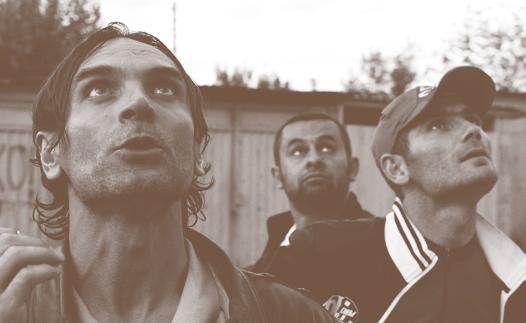
Jeton, un bambino di 10 anni, è seduto sul bordo di un balcone al 4° piano. vicini e passanti, terrorizzati, chiamano la polizia e i vigili del fuoco. ma la situazione diventa rapidamente ingestibile.
Ballkoni è stato in concorso all’ultima mostra del cinema di venezia.
“Girato in un unico lungo piano sequenza che inizia al tramonto e termina al crepuscolo, è un’interpretazione cinematografica che rafforza la visione di una situazione assurda e rivela la realtà della vita quotidiana nell’odierna società del Kosovo.” (L. Zeqiraj)
Jeton, a 10-year-old boy, is sitting on the edge of a balcony on the 4th floor. neighbors and passers-by, terrified by this situation, call the police and firefighters for help. But the situation quickly becomes unmanageable. Ballkoni was in competition at the latest venice Film Festival.
“shot in one long sequence that begins in the sunset and ends at twilight, as a cinematic expression that reinforces immersion into an absurd situation, revealing the reality of everyday life in today’s Kosovo society.” (L. Zeqiraj)
LENDITA zEqIRAJ
È nata nel 1972 a Prishtina, in Kosovo.
Lendita Zeqiraj was born in 1972 in Prishtina, Kosovo. filmografia scelta / selected filmography
2011 We’re not in Paradise doc. 2013 Ballkoni cm / sf
slovenia - Germania / slovenia - Germany, 2013, DcP, col., 13’, v.o. slovena / slovenian o.v.
sceneggiatura / screenplay: Gregor Zorc, Špela Čadež. supervisione animazione / animation supervisor: oliver Throm. Fotografia / Photography: Michael Jörg. montaggio editing: Thomas Schmidl. musica music: Tomaž Grom. suono sound: Johanna Herr. scenografia art Director: Žiga Lebar. costumi / costumes: Gordana Bobjević. effetti speciali / special effects: Markus Bledowski. voci / voices: Katja Levstik, Gregor Zorc. Produzione Produced by: No History. coproduzione co-produced by: HupeFilm. con il sostegno di / supported by: Slovenian Film centre, Film und Medien Stiftung NRW.

Filip vive in un quartiere povero. sogna di diventare uno scrittore affermato, con uno stile di vita lussuoso in quartiere più agiato della città. un giorno Filip sente bussare alla porta. La sua vicina di casa, tereza, una prostituta di una certa età, che Filip cerca di evitare a tutti i costi, gli chiede di scrivere una lettera per il suo fidanzato. Filip accetta. e tutto finirebbe lì se una settimana dopo tereza non si presentasse di nuovo a casa sua... tratto dal racconto omonimo di maksim Gor’kij.
Filip lives in a poor neighbourhood. He dreams of writer’s glory and luxurious lifestyle in a more prosperous part of town. One day Filip gets a knock on the door. His neighbour tereza, an older prostitute that Filip tries to avoid by all means, asks him to write a letter for her fiancé. Filip agrees. and it would all end up fine if a week later tereza would not show up at his doorstep again... Based on the short story Her Lover by maxim Gorky.
ŠPELA čADEŽ
è nata nel 1964 a Lubiana, in slovenia.
Špela Čadež was born in 1964 in Ljubljana, Slovenia. filmografia scelta / selected filmography 2004 mate to measure cm, animazione / sf, animation 2007 Lovesick cm, animazione / sf, animation 2013 Boles cm, animazione / sf, animation
ORGOGLIO / PRIDe
PAVEL G. VESNAKOV
Bulgaria - Germania / Bulgaria - Germany 2013, HD, col., 30’ v.o. bulgara / Bulgarian o.v.
sceneggiatura / screenplay: Pavel G. Vesnakov, Vanya Rainova. Fotografia / Photography: orlin Ruevski. montaggio / editing: Karen Tonne. suono / sound: Veselin Zografov. scenografia, costumi art Director, costume Designer: Nikolay Zlatanov. Interpreti / cast: Mihail Mutafov, Aleksandar Aleksiev, Ani Bakalova, Svetlana Yancheva. Produzione / Produced by: Portokal. coproduzione / co-produced by: director’s darling development ug.
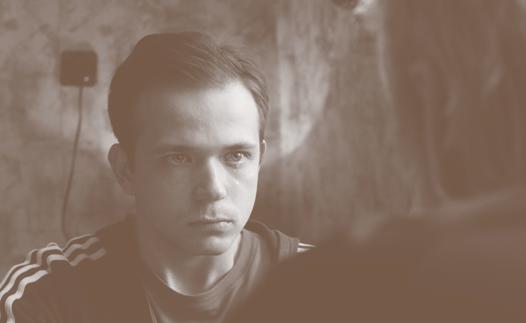
manol, generale in pensione e nonno affettuoso, è un patriarca dalla morale ferma e dai principi ben saldi che ha sempre affermato con determinazione nella sua casa. ma un giorno viene a sapere che il ragazzo che ha cresciuto è gay. Le scelte di vita dei suoi cari sfidano suoi valori in una battaglia che ha già perso in partenza.
In concorso all’ultimo Festival di Locarno e a quello di sarajevo.
manol, a retired general and a loving grandfather, is a patriarch of firm morals and fixed beliefs, which he has upheld in his household. But on this day he learns that the boy he raised is gay. the life choices of his loved ones challenge his values in a battle he has lost by default.
In competition at the latest Locarno Film Festival and sarajevo Film Festival.
PAVEL G. VESNAKOV
è nato nel 1987 a sofia, in Bulgaria.
Pavel G. vesnakov was born in 1987 in sofia, Bulgaria. filmografia scelta / selected filmography 2011 vlacove cm / sf 2013 chest cm / sf
sceneggiatura / screenplay: Andrei Tănase. Fotografia / Photography: Barbu Bălăşoiu. montaggio / editing: Andrei Bălăşoiu. musica / music: Ludwig Berger. suono / sound: Tobias Peper. scenografia / art Director: Adriana Răcăşan. Interpreti cast: Paul Ipate, Andrei Mateiu, dan Lupu, Eugen Lumezianu, Vasile Georgescu, Ana Andrei, oltin Hurezeanu, Florin Mihalache, Florentina Marin. Produzione / Produced by: deutsche Exotik Filmproduktion GmbH, LibraFilm. coproduzione / co-produced by: arte/ ZdF.

claudiu lavora nel reparto del pesce fresco di un grande supermercato. Giorno dopo giorno, guarda le carpe vive che lottano per muoversi e respirare nel loro piccolo, chiuso acquario. quando uno di questi pesci inizia a tossire come un essere umano, claudiu decide che è il momento di fare qualcosa. “claudiu & the Fish è una breve favola sul tentativo di mettere in atto l’impossibile. sulla società che consuma più di quanto ha bisogno e spreca più di quanto dovrebbe. e, cosa altrettanto importante, sull’incantarsi di fronte al tramonto una volta ogni tanto.” (A. Tănase)
claudiu works at the fresh fish department in a big supermarket. Day by day, he watches the live carps struggling to move and breathe in their small, overpacked aquarium. When one of these fish starts coughing like a human being, claudiu decides to take action.
“claudiu & the Fish is a short fairytale about trying the impossible. about a society that consumes more than it needs and wastes more than it should. and, last but not least, about admiring the sunset every once in a while.” (A. Tănase)
ANDREI TĂNASE
è nato nel 1982 a Bucarest, in Romania. Andrei Tănase was born in 1982 in Bucharest, Romania. filmografia scelta / selected filmography 2004 myriapod cm / sf 2006 Love Forever cm / sf 2008 mc Russia doc. 2013 claudiu & the Fish cm / sf
FLORa e Fauna / FLORa anD Fauna
Polonia / Poland, 2013, HD, col., 30’, v.o. polacca / Polish o.v.
sceneggiatura / screenplay: Piotr Litwin, Klara Kochańska. Fotografia Photography: Mateusz Wajda. montaggio / editing: Wojciech Rawecki. musica / music: carrion. Interpreti / cast: Lech dyblik, Aleksandra Zienowicz, Agnieszka Warchulska. Produzione Produced by: PWSFTviT (Państwowa Wyższa Szkoła Filmowa Telewizyjna i Teatralna - Łódź). coproduzione / co-produced by: MX35, MIMIS, Fixafilm. Distribuzione internazionale / World sales: Krakow Film Foundation (Krakowska Fundacja Filmowa).

Jan è un insegnante di scuola superiore di 56 anni che decide di comprare la verginità di una ragazza. marysia, 15 anni, decide di vendere la sua prima volta con un uomo. I due si accordano per incontrarsi e andare in un albergo, ma non sono in grado di portare a termine l’accordo. nel corso della giornata, Jan e marysia si incontrano di nuovo. Fra coproduttori del film anche Fabio Grassadonia e antonio Piazza (i registi di salvo).
Jan is a 56-year-old high school teacher who decides to buy a young girl’s virginity. marysia, a 15-year-old girl, decides to sell her first time with a man. they agree to meet and go to a hotel but they are unable to do so. they part ways without resolving their contract. Later in the day, Jan and marysia meet again.
the Italian directors Fabio Grassadonia and antonio Piazza (salvo 2013) are among the co-producers of the film.
PIOTR LITWIN
è nato nel 1983 a mosca, ora Russia.
Piotr Litwin was born in 1983 in moscow, now Russia. 2013 Flora i fauna cm / sf
a est DI PaRIGI / east OF PaRIs
orsi nagyPál
ungheria / Hungary 2013, HD, col., 14’, v.o. ungherese / Hungarian o.v.
sceneggiatura / screenplay: orsi Nagypál, tratta dal racconto omonimo di / based on a short story of the same title by Lajos Parti Nagy. Fotografia Photography: Máté Herbai. montaggio editing: Zoltán Kovács. musica / music: Attila Pacsay. suono / sound: csaba Major. scenografia art Director: Pater Sparrow. costumi costume Designer: Juli Szlávik. Interpreti / cast: Judit Pogány, Bori Péterfy, Niké Kurta, Lehel Kovács, Judit Gombos, Zoltán Géczi. Produzione, distribuzione internazionale / Produced by, World sales: KMH Film.

1986, in un villaggio dell’ungheria orientale. Frici, un operario della locale fabbrica, ruba una cassa di vestiti usati che arrivano dall’Occidente per essere utilizzati come panni per pulire le macchine e apre una boutique di moda occidentale, la “Piccola Parigi”. nel corso della notte le donne del villaggio, di ogni età e ceto, arrivano sulle loro biciclette scricchiolanti per ottenere finalmente un assaggio dell’Occidente. un assurdo ritratto di un’epoca assurda.
1986, a village in east-Hungary. Frici, a factory worker steals a whole bale of used clothing that arrived from the West to be used as machine cleaning clothes, and opens up a western fashion boutique, “Little Paris”. In the middle of the night, village women of all ages and backgrounds arrive on their creaking bikes to finally get a taste of the West. an absurd portrait of an absurd era.
NEBOJŠA SLIJEPčEVIć
croazia / croatia, 2013, HD, col., 25’, v.o. croata / croatian o.v. neLL a scatOL a / BOXeD
sceneggiatura / screenplay: Nebojša Slijepčević. Fotografia / Photography: Miran Krčadinac. montaggio / editing: Nebojša Slijepčević, Iva Kraljević. suono / sound: Hrvoje Radnić. scenografia, costumi art Director, costume Designer: Mario Mišković. Interpreti / cast: Marko Nikolić, Rakan Rushaidat, Igor Hamer, Ivan Ožegović, damir Šaban. Produzione, distribuzione internazionale Produced by, World sales: Petnaesta umjetnost.
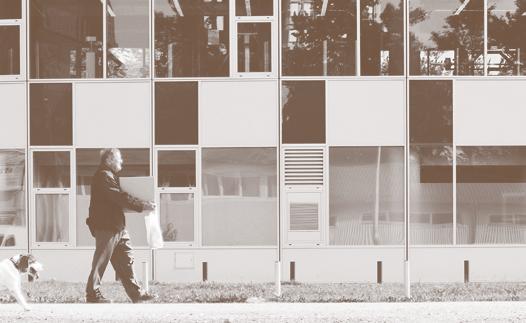
uno sconosciuto arriva in un bar dove oziano ragazzi di un vicino negozio di scommesse. Lo sconosciuto lascia una strana scatola e chiede loro di tenerla e di non guardare cosa c’è dentro. ragazzi, presi dalla curiosità e dalla noia, la aprono. quando lo sconosciuto li coglie in flagrante...
a stranger comes to a local cafe bar where guys from a nearby betting shop hang around. He leaves an unusual box and asks them to keep it and not to look what is inside. curiosity and boredom makes the guys open the box. When the stranger catches them in the act...
AURELIO BUCHWALDER
svizzera / switzerland, 2013, HD, col., 11’, senza dialoghi / no dialogues aPPRenDIsta / aPPRent ce
sceneggiatura, montaggio / screenplay, editing: Aurelio Buchwalder. Fotografia Photography: Simon Bitterli. suono / sound: Jan-Eric Mack, Alexander Joho. scenografia / art Director: Leonie Lieberherr. costumi / costume Designer: Bettina Walther. Interpreti / cast: Finian Marhenke, Norbert Hunz. Produzione, distribuzione internazionale / Produced by, World sales: Zürcher Hochschule der Künste.

un apprendista falegname abbandona il suo lavoro e va a camminare nel bosco, fra alberi abbattuti, binari che attraversano il paesaggio e il silenzio della sera. è la storia di un percorso di scoperta.
“Il film parla di un apprendista falegname che si confronta con il suo mestiere e con se stesso. I temi sono l’esplorazione e la scoperta, l’infanzia e il raggiungimento dell’età adulta, il desiderio e il lavoro. Il mio obiettivo era quello di raccontare una storia che non ha bisogno di parole, ma che tutti possono capire.” (a Buchwalder)
a carpentry apprentice abandons his work and roams through the forest. trees are felled, railways cross the landscape, silence in the evening. It is the story about a journey of discovery.
“the film is about a carpentry apprentice who is confronted with his craft and with himself. the issues are exploration and discovery, childhood and reaching adulthood, yearning and work. my goal was to tell a story that works without words, but nevertheless everyone can understand.” (a . Buchwalder)
orsi nagyPál è nata nel 1978 a Budapest, in ungheria.
Orsi nagypál was born in 1978 in Budapest, Hungary. filmografia scelta / selected filmography 2009 Paktum cm / sf 2010 Hidegzuhany cm / sf 2012 Körforgalom cm / sf 2013 Kispárizs cm / sf
NEBOJŠA SLIJEPčEVIć
è nato nel 1973 a Zagabria, in croazia.
Nebojša Slijepčević was born in 1973 in Zagreb, Croatia. filmografia scelta / selected filmography 2000 O kravama i ljudima doc. 2007 Za 4 godine doc. 2011 Pas/Zec cm animazione / sf animation 2013 Gangster te voli doc.; Kutija cm / sf
AURELIO BUCHWALDER
è nato nel 1987 ad arlesheim, in svizzera. aurelio Buchwalder was born in 1987 in arlesheim, switzerland. filmografia scelta selected filmography 2011 Regeneration doc. 2013 Lehrling cm / sf
Germania / Germany, 2013, HD, col., 10’ v.o. russa - tedesca / Russian - German o.v.
miriam Bliese sceneggiatura / screenplay: Miriam Bliese. Fotografia / Photography: Julian Landweer. montaggio / editing: Vessela Martschewski. suono sound: Rainer Viltz. Interpreti / cast: Irina Vinogradova, Katerina Medvedeva. Produzione Produced by: deutsche Film und Fernsehakademie Berlin (dffb). coproduzione / coproduced by: ARTE.
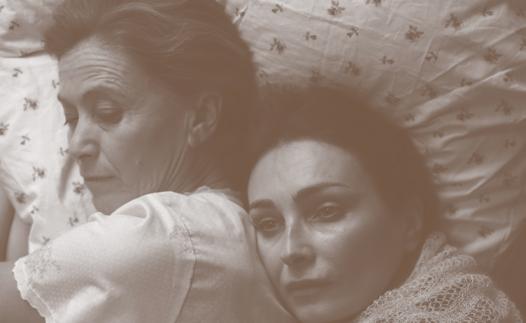
Jelena e la madre vera hanno lasciato la Russia da 20 anni per andare in Germania. Da allora, hanno vissuto insieme in un piccolo appartamento con due camere da letto. vera ha quasi 70 anni e non è capace di adattarsi alla vita in Germania. nella sua mente vive ancora in Russia, dove era una famosa ballerina. Ha fatto di tutto per permettere alla figlia di avere una buona carriera in Occidente. ma Jelena è riuscita solamente a ottenere un lavoro come insegnante di danza per bambine cicciottelle…
Jelena and her mother vera left Russia 20 years ago to come to Germany. since this time, they’ve been living together in a tiny two bedroom apartment. vera is almost 70 now and unable to accept reality in Germany. In her mind, she still lives in Russia, where she was a famous dancer. she gave up everything to allow her daughter to make her career in the West. But Jelena has only managed to get a job as a dance teacher for chuby little girls...
RADU JUDE
miriam Bliese è nata nel 1978 a Wuppertal, in Germania. miriam Bliese was born in 1978 in Wuppertal, Germany. filmografia scelta / selected filmography 2009 stille tage doc. 2011 tango mm / ml 2013 An der Tür cm / sf, mein engel cm / sf
sceneggiatura / screenplay: Radu Jude, Florin Lăzărescu. Fotografia Photography: Marius Panduru. montaggio / editing: Cătălin F. Cristuțiu. suono / sound: dana Bunescu. scenografia, costumi art Director, costume Designer: Augustina Stanciu. Interpreti / cast: Alexandru Dabija, Șerban Pavlu, Mihaela Sîrbu, Olga Taisia Podaru, Gabriel Spahiu, Adina cristescu, Marilena chelaru, Mihaela Alexandra Anton, Silviu Mircescu. Produzione / Produced by: HI Film Productions.
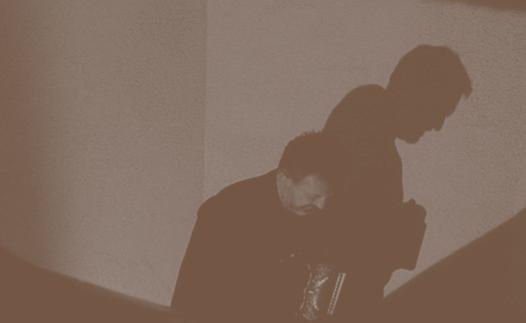
“La mia miserabile vita è passata come un sonno profondo, come l’ombra di una nuvola, appassendo come un fiore di campo. e le articolazioni delle mie membra hanno cominciato a indebolirsi, a torcersi e a tremare nel mio corpo. e le mie cattive azioni hanno superato gli innumerevoli granelli di sabbia nel mare.”
(frammento di una preghiera)
O umbră de nor è stato presentato lo scorso anno alla quinzaine des Réalisateurs a cannes e al festival di sarajevo.
“my wretched life has passed like a deep sleep, like the shadow of a cloud, withering like a wildflower. and the joints of my limbs have begun to weaken, to twist and shake in my body. and my evil deeds have surpassed the countless grains of sand in the sea.” (fragment from a prayer)
O umbră de nor was screened at the latest quinzaine des Réalisateurs in cannes and sarajevo Film Festival.
suLL a sOGLIa / tHResHOLDs
DIJANA MLAđENOVIć
croazia / croatia, 2013, HD, col., 13’, v.o. croata / croatian o.v.
sceneggiatura / screenplay: Dijana Mlađenović, Zvonimir Jurić. Fotografia / Photography: Dragan Ruljančić. montaggio / editing: Nina Velnić. musica / music: Jure Buljević. suono / sound: Borna Buljević. scenografia / art Director: Tanja Lacko, Ana Buljan. Interpreti cast: Alma Prica, Franjo Kuhar, Nikša Butijer, Zvonimir Jurić, Slaven Španović. Produzione / Produced by: Kinematograf.
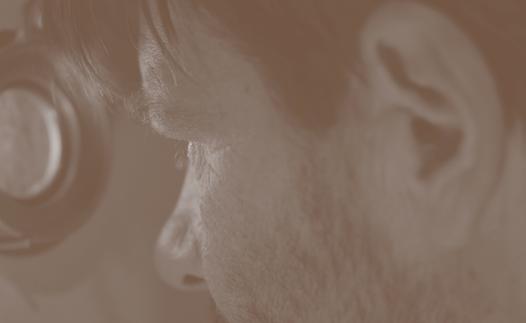
1992. La guerra infuria in croazia. Il nuovo governo cerca di sfrattare forzatamente persone politicamente “non gradite” dai loro appartamenti. In uno di questi sfratti, Ivan e vesna si trovano su ‘lati opposti’... un film sulla maggioranza silenziosa e passiva. e sul coraggio civile.
1992. the war is raging in croatia. the new government is forcefully evicting politically unsuitable persons from their apartments. In a sudden eviction, Ivan and vesna find themselves on the opposite sides... a film about the silent and passive majority: and about civil courage.
marcus heeP
Germania / Germany, 2013, HD, col., 28’ v.o. tedesca – serbo-croata / German – serbo-croatian o.v.
sceneggiatura / screenplay: Tobias Wilhelm. Fotografia / Photography: Markus Kloth. montaggio / editing: Marc Boehlhoff. musica / music: Felix Raffel. suono / sound: Leopold Köppl, Tobias Rüther. scenografia art Director: Katrin Fürst. Interpreti / cast: Luka dimic, Ruzica Hajdari, Neven Nöthig, Nicole Gerdon, dejan Bucin, Bettina Burchardt. Produzione / Produced by: Hochschule für Film und Fernsehen (HFF) “Konrad Wolf”. coproduzione / coproduced by: RBB.
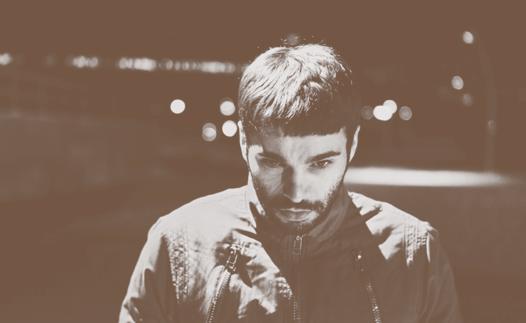
Zima vive in un piccolo appartamento a Berlino con suoi genitori. La guerra nella ex-Jugoslavia ha segnato duramente suo padre. sua madre fa di tutto per tenere unita la famiglia. Zima freme di rabbia. un giorno, tutto esplode.
Zima lives in a small flat in Berlin with his parents. the war in former Yugoslavia has left its mark on his father. His mother does everything to keep the family together. He is seething with anger. One day, it all erupts.
RADU JUDE
è nato nel 1977 a Bucarest, in Romania.
Radu Jude was born in 1977 in Bucharest, Romania. filmografia scelta / selected filmography 2006 Lampa cu căciulă cm sf 2009 cea mai fericită fată din lume 2012 Toată lumea din familia noastră; Premi / awards: sarajevo FF – miglior film / Best Film 2013 O umbră de nor cm / sf; Premi / awards: sarajevo FF – miglior cortometraggio / Best short Film
DIJANA MLAđENOVIć
Di nazionalità croata, nel 1999 ha fondato la compagnia di produzione Kinematograf
Born in Croatia, Dijana Mlađenović founded in 1999 the production company Kinematograf.
2013 Pragovi cm / sf
marcus heeP È nato nel 1984 a Karl-Marx-Stadt (ora Chemnitz), in Germania. Marcus Heep was born in 1984 in Karl-Marx-Stadt (now Chemnitz), Germany. 2008 eLIas doc. 2009 sterben machen 16mm cm / sf 2011 Der kleine tod 16mm cm / sf 2013 Zima cm / sf

Bear me
Kasia Wilk
Bruno liBero
Daniel maculan, Damiano Zanchetta
cantarella
Diego Dada
danse macaBre Małgorzata Rżanek
halF you met my girlFriend nicolas de Leval Jezierski
harald moritz schneider
iZ duBine
Katrin Novaković
EIN KURzER fILM üBER DEN IGEL
Kariem Saleh

mee
Letty Felgendreher
o Šunce
eliška chytková
on/oFF
Piotr Ludwik
Pandy matúš vizár
der Pinguin annette Jung
raBBitland
Ana Nedeljković, Nikola Majdak jr.
RECENTLy IN THE WOODS
Daniel van Westen
WILK
Germania - Polonia / Germany - Poland, 2012, HD, col., 6’ v.o. inglese / english o.v.
animazione / animation: Kasia Wilk, Paul cichon, ore Peleg. musica, suono music, sound: Karol obara. Produzione / Produced by: Filmakademie Baden-Württemberg.
FRee BRunO
daniel maculan, damiano Zanchetta
Italia / Italy, 2013, HD, col., 11’, v.o. italiana / Italian o.v.
sceneggiatura, fotografia, montaggio, suono, scenografia, effetti speciali / screenplay, Photography, editing, sound, art Director, special effects: daniel Maculan, damiano Zanchetta. musica music: Andrea Raccanelli. Produzione / Produced by: daniel Maculan. coproduzione / co-produced by: damiano Zanchetta.
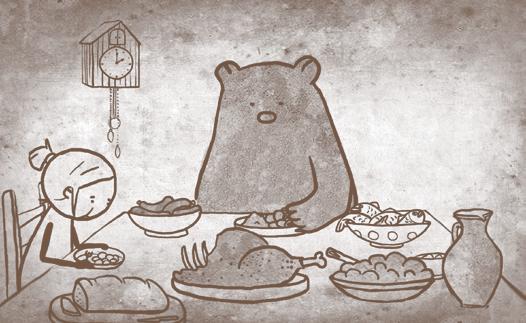
un giorno ho trovato un orso. Oppure lui ha trovato me. ed è rimasto.
One day found a bear. Or he found me. and he stayed.
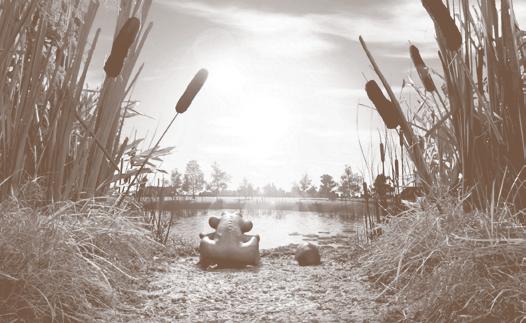
Bruno è solo e triste e striscia per le vie di una fredda città in cerca di compagnia. Purtroppo però, il suo aspetto mette in fuga chiunque si avvicini.
Bruno is lonely and sad and crawls into the streets of a cold city seeking company. But unfortunately, its aspect scares anybody away...
diego dada
Italia / Italy, 2012, HDv col., 9’, v.o. italiana / Italian o.v.
sceneggiatura / screenplay: diego dada, Fabio Scarselli, Gabriele diana. montaggio / editing: diego dada. musica, suono / music, sound: Gabriele Bochicchio. Produzione / Produced by: ojo Films.

L’arte è morta.
La “musa” è morta e gli artisti di ogni epoca, per renderle omaggio, prendono parte al suo funerale. ma qualcuno non si presenterà...
art is dead.
the “muse” is dead and artists of all eras are attending its funeral to pay homage. But someone does not show up...
DanZa macaBRa
Polonia / Poland, 2013, HD, col., 5’, senza dialoghi / no dialogues
MAŁGORzATA RŻANEK sceneggiatura, animazione, montaggio screenplay, animation, editing: Małgorzata Rżanek. musica music: Magda Grabowska. suono / sound: Paweł Janułajtys. Produzione / Produced by: Academy of Fine Arts (Warsaw). coproduzione / co-produced by: MX35, MIMIS, Fixafilm. Distribuzione internazionale / World sales: Krakow Film Foundation.

una notte densa, buio pesto. La luna lancia occhiate malevole. qualcuno morirà stanotte. Improvvisamente parte il carosello della morte e non c’è niente che possa fermarlo.
Presentato a cannes nella selezione della “cinéfondation” dello scorso anno.
a dense, pitch-black night. the moon glances balefully. someone will die tonight. suddenly the carousel of death moves on and there is nothing to stop it. Danse macabre premiered in the “cinéfondation” selection at the latest cannes Film Festival.
KASIA WILK
È nata nel 1984 a łódź, Polonia.
Kasia Wilk was born in 1984 in łódź, Poland. filmografia scelta / selected filmography
2007 I see cm animazione / sf animation 2012 Bear me cm animazione / sf animation
daniel maculan è nato nel 1986 a Zevio (verona), Italia.
Daniel maculan was born in 1986 in Zevio (verona), Italy. damiano Zanchetta nato il 17 febbraio 1985 a Bassano del Grappa (vicenza). Damiano Zanchetta was born in 1985 in Bassano del Grappa (vicenza), Italy. 2013 Bruno libero cm animazione / sf animation
diego “dada” Pecori
Diego Pecori alias Diego Dada è laureando presso la Facoltà di Lettere e Filosofia dell’università di Firenze.
Diego Pecori aka Diego Dada is currently a student at the Faculty of arts and Humanities of the university of Florence. filmografia scelta / selected filmography 2012 cantarella cm animazione / sf animation
MAŁGORzATA RŻANEK
s è laureata all’accademia di Belle arti di varsavia nel 2012.
Małgorzata Rżanek graduated from the Academy of Fine Arts in Warsaw in 2012. 2013 Danse macabre cm animazione / sf animation
Germania / Germany, 2013, 35mm, col., 6’, v.o. inglese / english o.v.
sceneggiatura, fotografia, montaggio / screenplay, Photography, editing: Nicolas de Leval Jezierski. animazione / animation: Nicolas de Leval Jezierski, Julia Günak. musica music: Georg Wende, Nicolas de Leval Jezierski, Nikolas Tillmann, Formelwesen. suono sound: Nils Vogel. voci / voices: Marlene Melchior, Nicolas de Leval Jezierski. Produzione / Produced by: HFF - Hochschule für Film und Fernsehen.
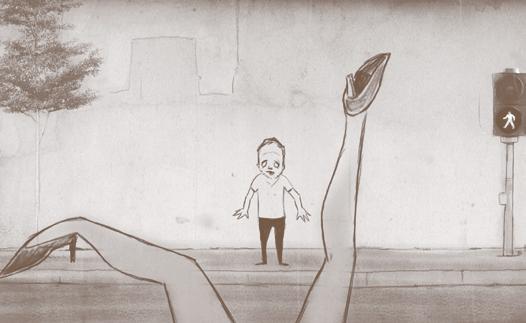
tormentato dalla sua logorroica fidanzata, il protagonista si rifugia in un mondo fantastico. sfortunatamente, il suo colorato sogno non è nemmeno a metà così meraviglioso come se lo era immaginato.
tormented by his ever-babbling girlfriend, the protagonist escapes into a fantasy world. unfortunately, his colorful dream isn’t HaLF as wonderful as he had imagined.
Germania / Germany, 2013, HD, col., 7’, senza dialoghi / no dialogues
moritZ schneider animazione / animation: Ringo Klapschinsky, Moritz Schneider, Pia Auteried, Jacob Frey, Kyra Buschor, cynthia collins, Julia ocker, Georg Schneider, Julia Reck, Meike Müller. montaggio editing: Moritz Schneider. musica / music: Balz Aliesch. suono / sound: Lena Zagikyan. voci / voices: Moritz Schneider, oliver Vogel, Felix Benning. Produzione Produced by: Filmakademie Baden-Württemberg.

Harald è un lottatore di wrestling. Guidato dalla sua ambiziosa madre ha vinto moltissimi trofei. ma il suo vero amore sono fiori. e quando il suo fiore preferito gli viene portato via dalla madre, deve combattere per riaverlo.
Harald is a wrestler. Driven by his ambitious mother he won a vast number of challenge cups. But his true love are flowers. When his favourite is taken away by his mother one day, he has to fight for it.
KATRIN NOVAKOVIć
croazia / croatia, 2013, HD, col., 7’, senza dialoghi / no dialogues
sceneggiatura, animazione, fotografia, montaggio, scenografia / screenplay, animation, Photography, editing, art Director: Katrin Novaković. musica music: Ante Božić Kudrić. suono / sound: Igor Dropuljić. costumi costume Designer: Katarina Bilan. Produzione / Produced by: uMAS – Arts Academy Split. Distribuzione internazionale World sales: Bonobostudio.
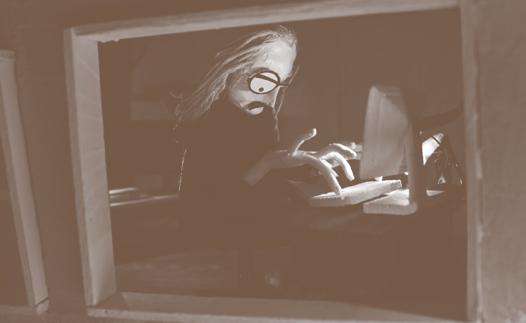
La vita moderna ci ha reso molto riservati e piuttosto indifferenti. La Buona vecchia Piovra Ballerina viene a salvarci! Dalle profondità del mare, porta un po’ di vita nell’anima sbiadita delle nostre città sbiadite.
modern living made us very private and quite uninterested. the Good Old swing Octopus comes to the rescue! Out from the depths of the sea, it brings life to our faded city souls.
La vIsIta DeL PORcOsPInO / a HeDGeHOG’s vIs t
KARIEM SALEH
Germania / Germany, 2013, HD, col., 6’, senza dialoghi / no dialogues
sceneggiatura / screenplay: Kariem Saleh, Friederike Fiek. animazione / animation: Kariem Saleh. musica / music: Maik oehme. suono / sound: Ana Monte Assis. Produzione Produced by: Filmakademie Baden-Württemberg.
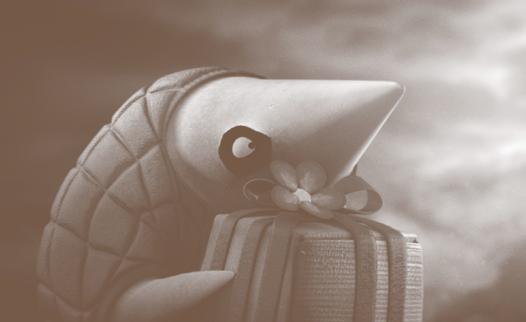
un porcospino brontolone cerca di confessare il suo amore. Riuscirà a superare le sue insicurezze?
a grumpy hedgehog trying to confess his love. Will he be able to overcome his insecurities?
NICOLAS DE LEVAL JEzIERSKI
è nato a Berlino nel 1985.
nicolas de Leval Jezierski was born in 1985 in Berlin. filmografia scelta / selected filmography
2013 Half You met my Girlfriend cm animazione / sf animation
moritZ schneider
è nato nel 1982 a sonthofen, in Germania. moritz schneider was born in 1982 in sonthofen, Germany. filmografia scelta / selected filmography
2006 apfelbaum cm animazione / sf animation
2013 Harald cm animazione / sf animation
KATRIN NOVAKOVIć
è nata nel 1989 a stoccarda, in Germania. si è diplomata all’accademia di Belle arti di spalato.
Katrin Novaković was born in 1989 Stuttgart, Germany, and graduated from the Arts academy university of split.
filmografia scelta selected filmography 2008 Girl with donuts cm animazione / sf animation 2013 Iz dubine cm animazione / sf animation
KARIEM SALEH
è nato a Osterode, in Germania, nel 1986. Kariem Saleh was born in Osterode, Germany in 1986. filmografia scelta selected filmography
2009 Das Wissen der Welt cm animazione / sf animation
2013 Ein kurzer Film über den Igel cm animazione / sf animation
letty Felgendreher
Germania / Germany, 2012, HD, col., 5’, v.o. inglese / english o.v.
sceneggiatura / screenplay: Letty Felgendreher. animazione / animation: Pia Auteried, Jennifer Bury, Elliott deshusses, Silke Finger, Letty Felgendreher, Ellena Korth, christian Hertwig, Florian Hüsing, Kim Nguyen, Julia Reck, Katrin Schneider. musica / music: Jasmin Reuter. suono sound: Bertram Bär. voci / voices: Laura Mittag, Ferdinand Engländer, Jonathan Tilley, Levi Harrison, Sophie Kränzle, Maryanne Kelly. Produzione Produced by: Filmakademie Baden-Württemberg.
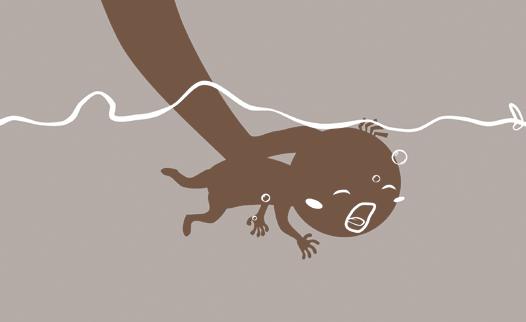
qualcuno non voleva mee, così da neonata è finita in una scatola. Fortunatamente, però, non ha dovuto passarci tutta la vita dentro perché poi è stata adottata...
“quando sono stata adottata ho perso il mio secondo nome mee. In compenso ho avuto un meraviglioso paio di scarpe di plastica, una coperta coreana per bimbi e un’eruzione cutanea sul mio sederino (c’è voluto quasi un anno ai miei genitori per sbarazzarsene).” (L. Felgendreher)
someone didn’t want mee, so when she was still a baby she ended up being put into a box. Fortunately, though, she didn’t have to spend her whole life in it since she was adopted...
“upon my adoption I lost my middle name mee. Instead I got a pair of fancy plastic shoes, a Korean baby blanket and a rash on my butt (it took my parents almost a year to get rid of that).” (L. Felgendreher)
letty Felgendreher
è nata nel 1985 a seul, in corea del sud.
Letty Felgendreher was born in 1985 in Seoul, Korea. filmografia scelta / selected filmography
2008 am Fussende des Bettes cm / sf 2012 mee cm animazione / sf animation
Repubblica ceca / czech Republic, 2012, HD, col., 6’, senza dialoghi / no dialogues L PROscIuttO / Ham stORY
animazione, sceneggiatura, fotografia, scenografia / animation, screenplay, Photography, art Director: Eliška chytková. montaggio editing: Libor Nemeškal. musica music: Jacques Ferchit, John Patrick, M Tiso, Nicolas Folmer, Roger Roger, dennis Barbier. suono sound: Martin Bek. Produzione, distribuzione internazionale / Produced by, World sales: Tomas Bata university (Zlín).
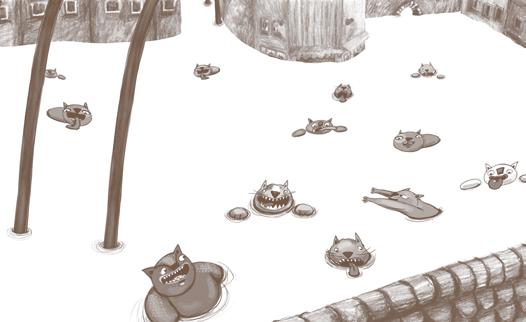
“La mia è una storia sulla fantasia. sulla fantasia che è stata imprigionata per tanto tempo e che poi è stata liberata con forza. sul giocare innocentemente a essere Dio, come bambini.” (e chytková)
Presentato a cannes nella selezione della “cinéfondation” dello scorso anno.
“my story is about imagination. about the imagination which has been chained for so long, and set free with so much strength. about playing God in a childlike and pure game.” (e chytková)
O šunce premiered in the “cinéfondation” selection at the latest cannes Film Festival.
PIOTR LUDWIK
Polonia / Poland, 2013, HD, col., 7’, senza dialoghi / no dialogues
sceneggiatura, fotografia, scenografia, costumi / screenplay, Photography, art Director, costume Designer: Piotr Ludwik. montaggio / editing: Janusz czubak, Piotr Ludwik. musica / music: Piotr Kubiak. Produzione, distribuzione internazionale / Produced by, World sales: Se-Ma-For Film Foundation.
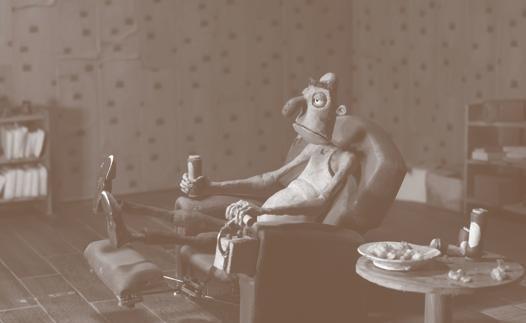
Il signor Patata vive in un tipico appartamento da vecchia signora, pieno di oggetti. c ’è dell’orribile carta da parati verde sui muri, una televisione in ogni stanza e alcuni aggeggi meccanici realizzati apposta per non perdere tempo nel farsi la barba, nel cucinare, lavare, andare a comperare la birra. Perché perdere tempo se puoi passarlo davanti alla tv? così il signor Patata si è organizzato per vivere in pace e dedicarsi unicamente alla sua passione: fissare la scatola. ma un bel giorno...
mr. Potato lives in typical, Grandma’s, stuffed flat. Green, awful wallpaper on the walls, tv in each room and a few mechanical improvements made not to waste time for shaving, cooking, washing up, going to buy beer. Why should you lose time if you can spend it on watching tv? so mr. Potato has everything organise, lives peacefully and devotes himself to his new passion- staring at the box. But one day...
PandyPanDa / PanDas
ELIŠKA CHyTKOVá
Di nazionalità ceca, è nata nel 1988
Of czech nationality, eliška chytková was born in 1988. filmografia scelta / selected filmography
2012 O šunce cm animazione / sf animation
PIOTR LUDWIK
È nato nel 1988 a Białystok, Polonia.
Piotr Ludwik was born in 1988 in Białystok, Poland. filmografia scelta / selected filmography 2013 On / Off cm animazione / sf animation
slovacchia - Repubblica ceca / slovakia - czech Republic, 2013, HD, col., 12’ senza dialoghi / no dialogues
matúŠ viZár animazione animation: Matúš Vizár, Adrián Hnát, dan Stanchev, Marek Pokorný, Dalibor Kristek, Martin Búřil. sceneggiatura / screenplay: Matúš Vizár. montaggio / editing: Matúš Vizár, Matěj Šámal, Martin Búřil. musica / music: Ink Midget. suono / sound: Miloš Hanzély. Produzione / Produced by: Bfilm. coproduzione / co-produced by: FAMu Distribuzione internazionale World sales: KurzFilmAgentur Hamburg.

I panda sono il prodotto di milioni di generazioni precedenti e hanno dovuto cavarsela da soli nella foresta. ma un giorno un primate fin troppo attivo, l’essere umano, li scopre e così divengono uno dei tanti giochi per divertire gli uomini. Presentato a cannes nella selezione della “cinéfondation” dello scorso anno.
they are the product of millions of generations before them and yet they’re left all alone in the forest to fend for themselves. One day an all too active primate, the human being, found them and they became a pawn in man’s games. Pandy premiered in the “cinéfondation” selection at the latest cannes Film Festival.
matúŠ viZár
è nato nel 1985 a Bratislava, ora in slovacchia,. matúš vizár was born in 1985 in Bratislava, now slovakia. 2013 Pandy cm animazione / sf animation
ANNETTE JUNG
Germania / Germany, 2012, HD, col., 8’ senza dialoghi / no dialogues
animazione, montaggio, effetti speciali, produzione animation, editing, special effects, Produced by: Annette Jung. sceneggiatura, fotografia, scenografia / screenplay, Photography, art Director: Walter Moers. musica, suono music, sound: Michal Krajczok. voce / voice: Thomas Pigor.
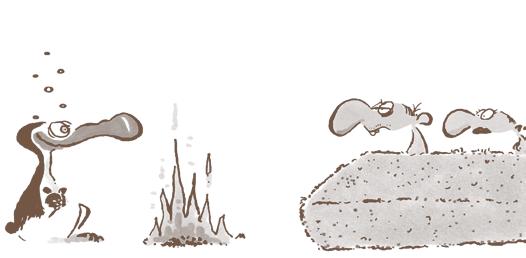
La teRRa De cOnIGLI
JR.
serbia, 2013, HD, col., 8’, v.o. inglese / english o.v.
animazione / animation: Ana Nedeljković, Nikola Majdak jr. sceneggiatura, design screenplay, Design: Ana Nedeljković. Fotografia / Photography: Nikola Majdak jr. montaggio editing: Srđan Radmilović. musica / music: Dušan Petrović suono sound: Vladimir Janković. voce narrante narrator: Maša Mileusnić. voci voices: Natalija Gajić, Vladislava Đorđević. Produzione / Produced by: Film House Baš Čelik. coproduzione / co-produced by: Arhitel. con il sostegno di / supported by: Film center Serbia and city of Belgrade - Secretariat for culture.

una coppia di eschimesi innamorati, alcol, droga e un pinguino arrapato a -30 gradi. senza parole ma con tanto sesso, violenza e divertimento. Ispirato al fumetto omonimo di Walter moers.
an eskimo couple in love, alcohol, drugs and a horny penguin at -22 degrees Fahrenheit. Without words but with sex, violence and high spirits. Based upon the comic Der Pinguin by Walter moers.
conigli vivono fra le rovine della terra dei conigli. sono di un colore rosa intenso, hanno dei buchi al posto del cervello. Rappresentano il grado più alto nella scala dell’evoluzione. I conigli passano le loro giornate votando in elezioni libere e democratiche, perché la terra dei conigli è una democrazia ordinata. ma quello che scopriamo è che le elezioni sono organizzate dalle cattive Ragazze, solo per divertimento e gioco.
the Rabbits live in the ruins of Rabbitland they are intensively pink, have holes in their heads instead of brains. they are the highest stage the evolution has ever reached. the Rabbits spend days voting in free and democratic elections, because Rabbitland is an ordered democracy. nevertheless, it gets disclosed that the elections are organized by the evil Girls, just for their fun and laughter.
DANIEL VAN WESTEN
Germania / Germany, 2013, HD, col., 1’, senza dialoghi / no dialogues
sceneggiatura, animazione, fotografia, montaggio, suono, produzione screenplay, animation, Photography, editing, sound, Produced by: daniel van Westen. Distribuzione internazionale World sales: aug&ohr medien.
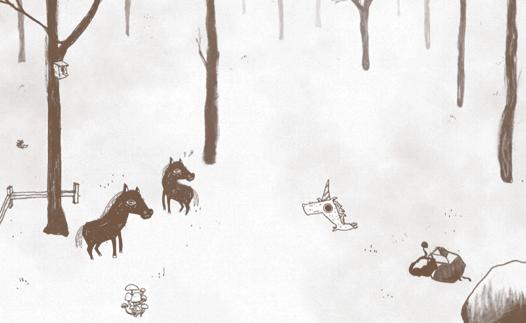
una favola sull’accettazione e la tolleranza. Due cavalli ridono di un unicorno per il suo aspetto diverso.
a short tale about acceptance and tolerance. two horses laugh at a unicorn‘s horn because of it‘s different appearance.
ANNETTE JUNG
Di nazionalità tedesca, è nata nel 1978.
Of German nationality, annette Jung was born in 1978. filmografia scelta / selected filmography
2010 Das Wattenmeer cm animazione sf animation 2012 the Penguin cm animazione / sf animation
ANA NEDELJKOVIć
è nata nel 1978 a Belgrado, ora serbia.
Ana Nedeljković was born in 1978, in Belgrade, now serbia.
2013 Rabbitland cm animazione sf animation
NIKOLA MAJDAK JR
è nato in slovenia nel 1972. nikola majdak jr. born in 1972 in slovenia.
filmografia scelta / selected filmography
2013 Rabbitland cm animazione / sf animation
DANIEL VAN WESTEN
È nato nel 1987 a Gütersloh in Germania.
Daniel van Westen was born in 1987 in Gütersloh, Germany. filmografia scelta / selected filmography 2008 monsters Love sushi cm animazione / sf animation 2009 share cm animazione / sf animation 2013 Recently in the Woods cm animazione sf animation
DIE 727 TAGE OHNE KARAMO
anja salomonowitz
čETRDESMIT DIVI
Laila Pakalņina
JUDGMENT IN HUNGARy eszter Hajdú
mama euroPa
Petra seliškar
the sPecial need
carlo Zoratti
SzERELEM PATAK Ágnes Sós
FUORI CONCORSO / OUT OF COMPETITION
Parole Povere
Francesca archibugi
SzTUKA zNIKANIA
Bartek Konopka, Piotr Rosołowski
truBa vitalij manskij
WELCOME TO GAGAUzIA vasili vikhliaev
zABÓJCA z LUBIEŻNOŚCI
Marcin Koszałka
ŽIVOT S KAŠPAREM
Helena Třeštíková


L’amore può attraversare le frontiere, e talvolta deve farlo. Per 727 giorni una donna austriaca viene separata dal marito dopo la sua espulsione. una donna cinese attende invece con nostalgia di poter ritornare a vienna. sono molte le relazioni che finiscono per la natura crudele del sistema. un documentario sulle esperienze di cittadini austriaci che si sono innamorati di qualcuno il cui passaporto è stato rilasciato da paesi non appartenenti all’europa. Pur cercando di legalizzare la loro unione con il matrimonio si trovano a dover affrontare le autorità: le emozioni incontrano le regole, il cuore si scontra con la legge, le difficoltà hanno il sopravvento.
“queste persone hanno memorizzato paragrafi di legge così complessi che non si riescono a capire nemmeno dopo averli letti più volte.Devono conoscere norme che non si crede possano esistere. Dopo tante lettere riescono a imitare alla perfezione quello strano tedesco burocratico. è uno shock irreversibile alla fede di ciascuno nella correttezza della legge.” (a salomonowitz)
Love can cross borders - and sometimes it has to. For 727 days an austrian woman is separated from her husband after his deportation. a chinese woman waits longingly for her return to vienna. many relationships fall apart because of the vindictive nature of the system. the film draws on the experiences of austrians who have fallen in love with somebody whose passport was issued in a country outside of the eu’s borders. they try to legalise their relationship in the form of a marriage and meet head on with the authorities: emotions meet regulations, the heart collides with the law, difficulties take their course.
“these people have memorised paragraphs that are so complex one can’t even understand them after several read-throughs. they have to get to know regulations you wouldn’t believe existed. they can mimic that strange bureaucratic German perfectly after so many letters. It is an irreversible shock to one’s faith in the right of the law.”
(a . salomonowitz)
austria, 2013, HD, col., 80’, v.o. tedesca / German o.v.
sceneggiatura / screenplay: Anja Salomonowitz. Fotografia / Photography: Martin Putz. montaggio / editing: Petra Zöpnek. musica / music: Bernhard Fleischmann. suono / sound: Hjalti Bager-Jonathanson. scenografia / art Director: Maria Gruber.
costumi costume Designer: Tanja Hausner. Interpreti cast:
Zora Bachmann, osas Imafidon, Evelyn Barota, Mutono Barota, Samuel Barota, Johanna Bauer, daniel Inyinbor, Emmanuel osaiwe Inyinbor, david Akowe Inyinbor, Zou Joeying Brichta, Adolf Brichta e molti altri / and many others
Produzione / Produced by: Amour Fou.
con il sostegno di / supported by: Innovative Film Austria, oRF Film-Fernsehabkommen, FISA Filmstandort Austria, Filmfonds Wien, MEdIA, Zukunftsfonds der Republik Österreich.
quaRantaDue / FORtY tWO
Lettonia / Latvia, 2013, HD, col., 56’, v.o. lettone / Latvian o.v.
sceneggiatura / screenplay: Laila Pakalņina.
Fotografia / Photography: uldis Jancis. montaggio / editing: Kaspar Kallas. suono / sound: Anrijs Krenbergs. Produzione / Produced by: Hargla company.

ANJA SALOMONOWITz
è nata nel 1976 a vienna, in austria. anja salomonowitz was born in 1964 in vienna, austria. filmografia scelta / selected filmography
2003 Das wirst du nie verstehen doc. 2007 Kurz davor ist es passiert doc. 2012 spanien
2013 Die 727 Tage Ohne Karamo doc.
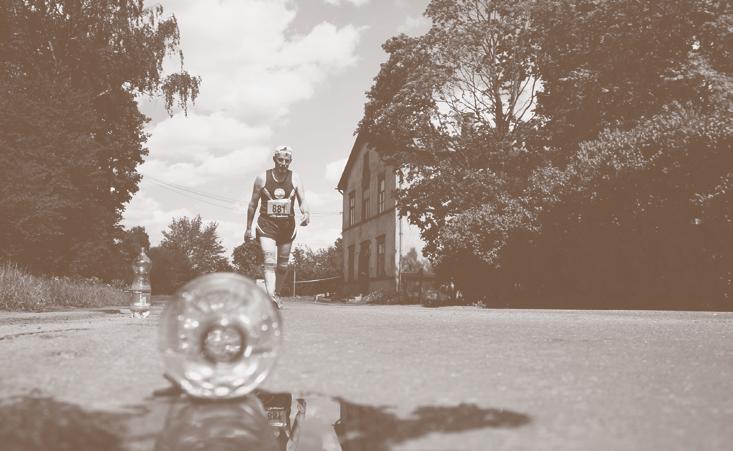
LAILA PAKALņINA
È nata nel 1962 a Liepāja, ora Lettonia. Documentarista e regista di fama internazionale, della Pakalņina il Trieste Film Festival ha presentato nel corso degli anni diversi lavori. / Laila Pakalņina, born in 1962 in Liepāja (now Latvia) is an internationally renowned documentary filmmaker. the trieste Film Festival has presented over the years several of her works. filmografia scelta selected filmography
1988 un doc. 1995 Ubāns doc. 2001 Papa Gena cm / sf doc. 2003 Pitons 2004 Būs labi (episodio del film collettivo / an episode of the omnibus film visions of europe); autobuss doc.; Leiputrija doc., video 2006 Ūdens cm / sf; Ķīlnieks 2007 uguns cm / sf 2009 Klusums cm / sf 2011 33 zvēri Ziemassvētki vecītim doc. 2012 Picas 2013 Četrdesmit divi doc.
“vorrei far capire qualcosa della maratona a quelli che non la corrono perché non vogliono o perché non possono. come a esempio mia madre, che ha dolori alle gambe. è come se fossi una spia mandata a correre la maratona.” (L. Pakalņina)
“I wish to bring out something from inside of the marathon for those who do not run it because they don’t want or because they can’t. For example, for my mum whose legs ache. I am acting like a spy sent in the marathon.” (L. Pakalņina)
Fra il 2008 e il 2009 un gruppo ungherese di estrema destra ha compiuto una serie di aggressioni contro membri di una comunità di Rom: sono state uccise sei persone, incluso un bambino di 5 anni, e ferite altre cinque. Judgment in Hungary è il film sul processo a quattro membri del gruppo: si svolge in una piccola e claustrofobica aula di tribunale a Budapest. Il processo è iniziato nel marzo 2011, con i quattro presunti colpevoli accusati dallo stato, e si è concluso nell’agosto del 2013. quattro sono stati incriminati di omicidio plurimo a sfondo razziale.
“Ho trascorso 167 giorni in compagnia di queste persone accusate di omicidio, di un gruppo di Rom in lutto per la morte dei figli, dei coniugi e dei fratelli, e di un giudice straordinariamente carismatico e passionale. I tre anni trascorsi in questa situazione claustrofobica alla fine mi hanno permesso di raccontare la storia drammatica di pochi individui, ma anche della comunità Rom.” (e. Hajdú)
In 2008 and 2009, a group of Hungarian rightwing extremists committed a series of attacks on random members of the Roma community. six people were killed, including a five-year-old, and another five were injured. Judgment in Hungary is a film about the trial of the four-member of the group. the film is a classical courtroom-drama taking place in a small and claustrophobic court room in Budapest. the trial began march 2011 of four suspected perpetrators charged by the state, and ended on august, 2013. they were charged of serial killings with racial motivation.
“I spent 167 days in the company of accused murderers; an extensive group of Roma mourning the deaths of children, spouses and siblings; and an extraordinarily charismatic and passionate judge. three years spent in this claustrophobic situation eventually enabled me to retell the dramatic story of a few individuals, and therefore the Roma community.” (e. Hajdú)
ESzTER HAJDú
ungheria - Germania / Hungary - Germany, 2013, HD, col., 107’, v.o. ungherese / Hungarian o.v.
sceneggiatura screenplay:
Eszter Hajdú. Fotografia / Photography:
Eszter Hajdú, István Szonyi. montaggio / editing: Bence Bartos, Menno Boerema. musica / music: Sandor Mester-MS3. suono / sound: Ferenc Gerendai, daniel Bhom.
Produzione, distribuzione internazionale
Produced by, World sales: Miradouro Media LdA. coproduzione co-produced by: Perfect Shot Films.
mamma euROPa / mOtHeR euROPe
slovenia - macedonia - croazia / slovenia - macedonia - croatia, 2013, HD, b-n / b-w & col., 90’, v.o. slovena - macedone - inglese / slovenian - macedonian - english o.v.
sceneggiatura / screenplay: Petra Seliškar, Terra Ferro Seliškar. Fotografia / Photography: Brand Ferro. montaggio / editing: Katrin Ebersohn. musica / music: Vladimir Rakič. suono / sound: Ivan Antić. animazione animation: daniel Freymuller, Katrin Ebersohn.
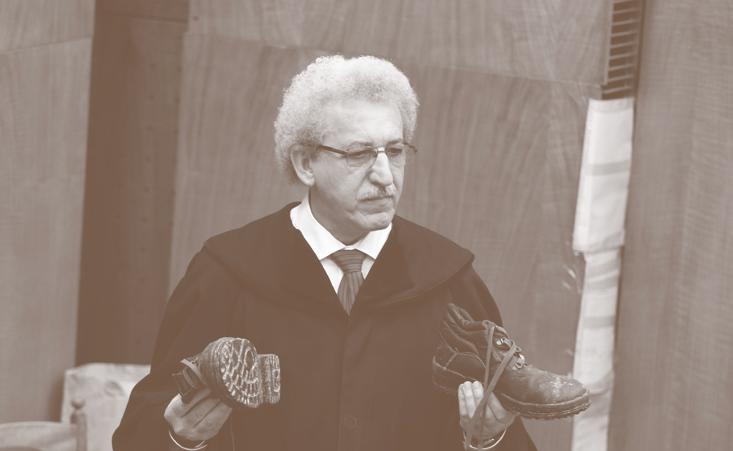
ESzTER HAJDú
è nata nel 1979 a Budapest, in ungheria. eszter Hajdú was born in 1979 in Budapest, Hungary. filmografia scelta / selected filmography
2006 Otthonom, tarnabod doc. 2007 Destino doc. 2008 A Fideszes zsidó, a nemzeti érzés nélküli anya és a mediáció doc. 2009 Bölcsődal - MS3 turné Romániában doc.; Judapest - A harmadik generáció doc. 2010 Démoni Kezek doc. 2011 vivien doc. 2012 A zsidó a náci kitüntetéssel doc. 2013 Judgment in Hungary doc. sentenZa In unGHeRIa
Interpreti / cast: Terra Ferro Seliškar, Boris Pahor, Branko Barič, Bernays Propaganda. Produzione Produced by: Petra Pan Film, PPFP. coproduzione / co-produced by: Restart croatia, Restart Slovenia, RTV Slovenia. Distribuzione internazionale / World sales: Petra Pan Film.
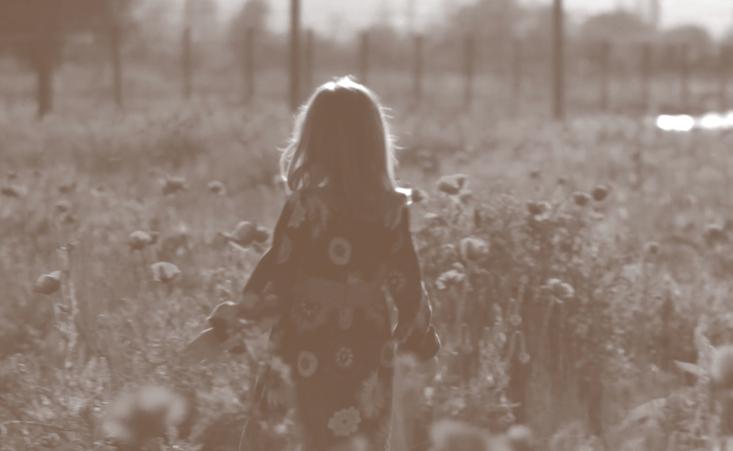
PETRA SELIŠKAR
è nata nel 1978 a Lubiana, ora slovenia.
Petra seliškar was born in 1978 in Ljubljana, now slovenia. filmografia scelta selected filmography
2001 con–Fusion doc. 2003 Balkans – Blood and honey doc. 2006 the Grandmothers of Revolution doc. 2013 mama europa doc.
uno sguardo all’europa attraverso gli occhi di terra, una bambina di sei anni. nata nei Balcani ma cresciuta come cittadina del mondo, da padre di origine cubana e macedone e da madre slovena, la piccola terra impara presto il significato della parola confini. con la sua famiglia fa un viaggio attraverso l’ex Jugoslavia, incontrando persone eccezionali con storie interessanti e ci racconta la sua innocente, ma intelligente e già esperta visione di un continente che non è per niente unito come in apparenza vorrebbe essere.
“sono slovena e il mio compagno e direttore della fotografia, Brand, è macedone. Da quando la slovenia è entrata nell’unione europea e nell’area schengen, la nostra vita nomade è diventata piuttosto complicata. Brand ha bisogno di un visto per ogni paese in cui deve andare, con l’esclusione di cuba (il paese del padre) e dei paesi Balcanici, ma non della slovenia ... viaggiare con il mio compagno è diventata una lotta senza fine, anche dopo la nascita di terra. ma questo non ci ha mai impedito di farlo...” (P. seliškar)
mama europa takes a look at europe through the eyes of a six-year-old child, terra. Born in the Balkans, but raised as a citizen of the world by her cuban-macedonian father and slovenian mother, little terra quickly learns about borders. she goes on a journey through former Yugoslavia with her family, encountering numerous remarkable characters with interesting stories and tells us her innocent but intelligent and already experienced view of the continent that is not at all as united as it would apparently like to be.
“I am slovenian and my partner and cinematographer, Brand, is macedonian. after slovenia became part of the european union and entered the schengen zone, our nomadic life became quite complicated. Brand needed a visa for every country apart from his father’s home, cuba, and the Balkan countries, with the exception of slovenia ... Being able to travel with my partner became an endless struggle – even after terra was born. But this never stopped us from traveling...” (P. seliškar)
enea ha 30 anni, è un giovane uomo con desideri normali. ciò che non è normale è il suo modo di esprimerli. enea è autistico e spesso incapace di interpretare le reazioni delle ragazze che incontra per strada. non ha mai avuto un rapporto sessuale, nonostante ne senta il desiderio e ne abbia le piene capacità. Dal momento che il suo paese, l’Italia, non offre alcuna soluzione legale al suo desiderio, enea inizia un viaggio attraverso l’europa con i suoi amici alex e carlo, alla ricerca di un modo per avere un rapporto sessuale alla “luce del sole”. Il viaggio, che inizia per soddisfare solo un bisogno, in realtà porta enea a esplorare i suoi sentimenti e i suoi desideri. tutti assieme su un vecchio pulmino volkswagen, partono dall’Italia per l’austria e la Germania, perché là c’è un luogo dove le persone come enea, con un “desiderio particolare”, possono iniziare il loro percorso verso la sessualità.
enea is 30, a young man with ordinary needs. What’s unusual is his direct way of expressing them. enea is autistic and often unable to interpret the reactions of the girls he approaches in the street. He’s never had a sexual intercourse although he really wants to and his body would be perfectly fit for it. as Italy doesn’t offer any legal solution to his problem, enea will embark upon a journey to europe with his friends alex and carlo, looking for a way to have sex out in the open and to explore his own feelings and desires. together they embark in an old vW bus on a journey from Italy through austria to Germany. Because there is a place there where people like enea with a “special need” can literally feel their way towards sexuality.
tHe sPecIaL
carlo Zoratti
Italia - Germania / Italy - Germany, 2013, HD, col., 84’, v.o. italiana - tedesca / Italian - German o.v.
sceneggiatura / screenplay: cosimo Bizzarri, carlo Zoratti. Fotografia / Photography: Julian Elizalde. montaggio / editing: david Hartmann. musica / music: dario Moroldo. suono / sound: Andrea Blasetig.
scenografia / art Director: Alex Nazzi. Interpreti cast: Enea Gabino, Bruna Savorgnian, carla Meneghin, ute Prankl, Alex Nazzi, Lothar Sandfort, Francesca Mucignat. Produzione / Produced by: detail Film, Videomante. coproduzione co-produced by: ZdF.
Distribuzione internazionale / World sales: Wide House. Distribuzione per l’Italia / Distributed in Italy by: Tucker Film.
FLussO D’amORe / stReam OF LOve
ungheria / Hungary, 2013, HD, col., 70’, v.o. ungherese - rumena / Hungarian - Romanian o.v.
sceneggiatura / screenplay: Ágnes Sós, Thomas Ernst. Fotografia / Photography: Zoltán Lovasi, Ágnes Sós, András Petróczy. montaggio / editing: Thomas Ernst. musica / music: János Másik. suono / sound: Tamás Zányi.
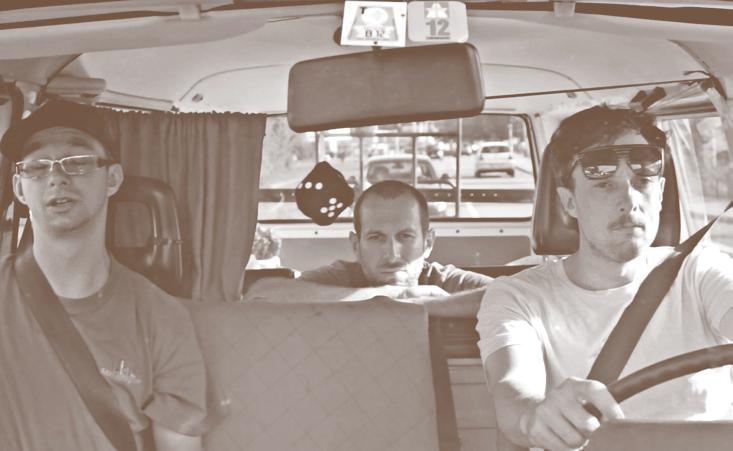
carlo Zoratti
è nato nel 1982 a udine.
carlo Zoratti was born in 1982 in udine, Italy. 2013 the special need – L’amore secondo enea doc.
Interpreti / cast: Veronka Both, Ferencz Kósa, Rozália Barabás, Martin Jenőné, Márton csüdöm, Erzsébet Kósa, Julianna Török, dénes Máté, Lajos Zakar.
Produzione Produced by: Szerelem Patak Produkciós Kft. (Éclipse Film Prod.).
coproduzione / co-produced by: HBo Europe.
con il sostegno di / supported by: Hungarian National Film Fund. Distribuzione internazionale World sales: Taskovski Films Ltd.
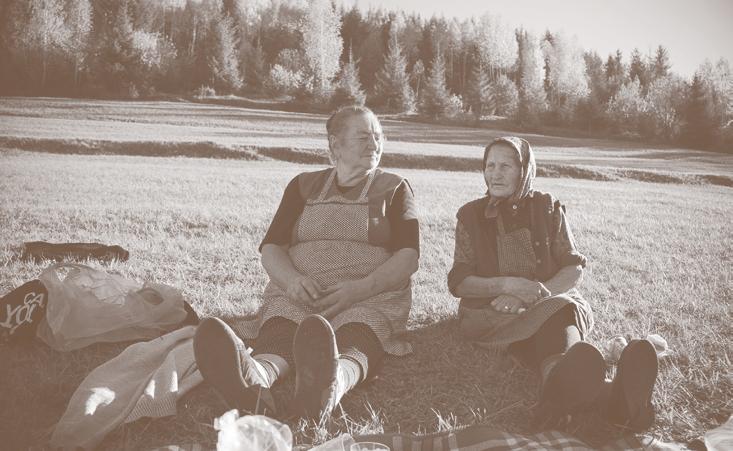
ágnes
è nata nel 1966 a Budapest, in ungheria. Ágnes Sós was born in 1966 in Budapest, Ungheria. filmografia scelta selected filmography 1998-2000 … van a börtön, babám doc. 2002-2005 akartam volna mutatni doc. 2003 teri nagyi doc. 2004-2010 Láthatatlan húrok – A tehetséges Pusker nővérek doc. 2013 szerelem patak doc.
Gli abitanti di un villaggio di lingua ungherese della transilvania, Romania, anche se anziani discutono ancora di amore e desiderio. Il tempo si è fermato e nonostante l’età sono incredibilmente giovani nel cuore. Feri, a esempio, è un incurabile romantico: pur avendo superato gli 80 anni ha ancora degli interessi per le 25 vedove del villaggio, sebbene lui sostenga che solo per due o tre di loro ne valga la pena. e così anche le donne raccontano con estrema naturalezza loro pensieri e sogni più intimi davanti alla macchina da presa.
“Ho lavorato con la massima attenzione e sensibilità, sforzandomi il più possibile di creare un contatto intimo con i miei personaggi. Il mio metodo è quello di avvicinarmi a loro, di creare una vicinanza ai limiti dell’intimità per essere in grado di mostrare il loro autentico destino.”
(Á. Sós)
Love and desire fill the minds of villagers in a Hungarian speaking village in transylvania, Romania, even in their old age. time has stood still here, and although most of the village’s inhabitants are elderly, they are refreshingly young at heart. Feri, for example, is an incurable romantic. Way past his 80th year, he’s still making moves on the village’s 25 widows – although he claims that only two or three of them are really worth the effort. and the women speak plainly when sharing their most intimate thoughts and dreams to the camera.
“I work with a maximum interest and sensitivity, investing all my efforts into creating intimate contact with my characters. my method is to get as close to my characters as possible, close to the borders of intimacy to be able to show their fate authentically.” (Á. Sós)
nel 1980 Jerzy Grotowski invitò amon Frémon, uno dei più noti sacerdoti di rito vudù di Haiti, ad andare in Polonia. Dopo alcuni mesi amon iniziò a esplorare il paese da solo. com’era la Polonia degli anni ’80 vista attraverso suoi occhi? cosa pensava di Solidarność e della legge marziale? E di quelle lunghe code davanti ai negozi, di gente indifesa e in schiavitù? un poeta romantico, adam mickiewicz, lo portò nel regno ultraterreno e lo aiutò a entrare in contatto con gli spiriti polacchi. e alla fine amon decise di celebrare una grande cerimonia vudù per liberare il popolo polacco dalle forze del male. Immagini familiari ai Polacchi sono presentate da un punto di vista ancora sconosciuto, una testimonianza metafisica di un uomo proveniente da una cultura lontana.
In 1980 Jerzy Grotowski invited amon Frémon, one of Haiti’s most eminent voodoo priests, to come to Poland. after a few months amon started to explore the country on his own. What was Poland like in the 1980s as seen through his eyes? What was his take on the solidarity carnival and martial law? What did he think when he saw long queues in front of shops, helpless and enslaved crowd of people? a romantic poet adam mickiewicz led him to the underworld and helped him contact Polish spirits. Finally he decided to perform a great vodou ceremony to free the Polish people from evil forces. Images familiar to Poles are presented from a perspective yet unknown, which is a metaphysical testimony given by a man from a remote culture.
L’aRte DI scOmPaRIRe / tHe aRt OF DIsaPPeaRInG
BARTEK KONOPKA,
Polonia / Poland, 2013, HD, b-n / b-w & col., 51’, v.o. creola / creole o.v.
sceneggiatura screenplay: Piotr Rosołowski, Bartek Konopka. Fotografia / Photography: Piotr Rosołowski. montaggio / editing: Andrzej Dąbrowski. musica / music: Maciej Cieślak. suono / sound: Franciszek Kozłowski.
Produzione / Produced by: Adam Mickiewicz Institute, otter Films.
Distribuzione internazionale / World sales: New Europe Film Sales.
GasDOttO / PIPeLIne
Russia - Repubblica ceca - Germania / Russia - czech Republic - Germany, 2013, HD, col., 121’ v.o. russa - ucraina - polacca - ceca - tedesca / Russian - ukrainian - Polish - czech - German o.v.
sceneggiatura / screenplay: Vitalij Manskij.
Fotografia / Photography: Aleksandra Ivanova. montaggio / editing: Evgenie Izmalkov, Andreij Sirobaba, Andreij Papernij. suono / sound: dmitrij Nazarov.
Produzione / Produced by: Vertov. Real cinema.
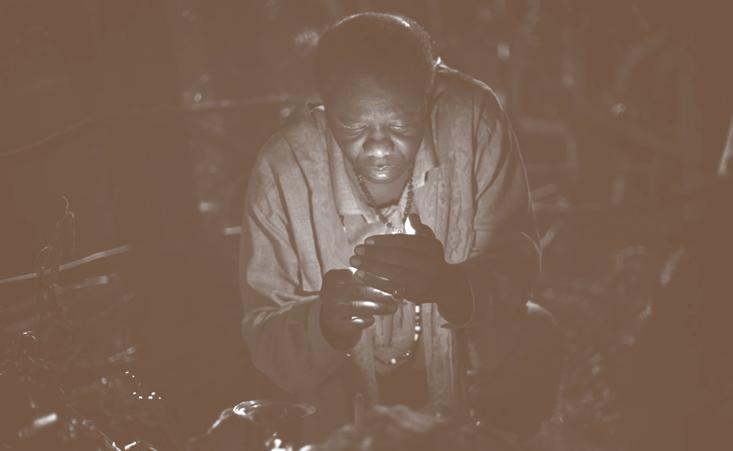
BARTEK KONOPKA
È nato nel 1972 a Myślenice, in Polonia. Il suo documentario Rabbit à la Berlin ha ricevuto una nomination agli Oscar 2010 ed è stato presentato al trieste Film Fesival.
Bartek Konopka was born in 1972 in Myślenice, Poland. His documentary Rabbit à la Berlin received a nomination at the academy awards 2010 and was presented at the trieste Film Festival. filmografia scelta / selected filmography 2004 Ballada o kozie doc. 2009 Rabbit à la Berlin (Królik po Berlinsku – Mauerhase) doc. 2011 Lęk wysokości (Fear of Falling) 2013 sztuka znikania doc.
PIOTR ROSOŁOWSKI Di nazionalità polacca, è nato nel 1977. Of Polish nationality, Piotr Rosołowski was born in 1977.
2013 sztuka znikania doc.
coproduzione / co-produced by: czech Television, Hypermarket Film, Saxonia Entertainment. con il sostegno di / supported by: Ministry of culture of the Russian Federation, Mitteldeutsche Medienförderung MdM, czech State cinematography Fond. Distribuzione internazionale / World sales: deckert distribution.

VITALIJ MANSKIJ
è nato nel 1963 a L’vov, ora ucraina. vitaly mansky was born in 1963 in L’vov, now ukraine. filmografia scelta selected filmography
1991 Jevrejskoje sčast’je doc. 1998 Častnyje kroniki. Monolog doc. 2002 Brodvey. chernoe more doc.
2003 anatomija t.a t.u. doc. 2008 Dĕvstvennost’ doc.; Rassvet/Zakat. Dalai Lama 14 doc. 2011 Rodina ili smert’ doc. 2013 truba doc.; Premi / Awards: Karlovy Vary IFF – Miglior documentario sopra 30 minuti / Best Documentary Film over 30 minutes
truba è un film sull’europa moderna, su due dei suoi angoli o, per dirla più precisamente, due dei suoi estremi. questo è un film sull’europa: dalla terra brulla e desolata dagli inverni eterni della siberia al più mite Golfo di Biscaglia, dove anche le leggi della natura danno forma a modelli fondamentalmente diversi dell’esistenza umana. cosa può collegare modi di vivere così apparentemente diversi? concretamente ciò è possibile attraverso il gasdotto “siberia occidentale - europa occidentale”, che non solo ha collegato ma anche inestricabilmente unito “questa” Russia a “quella” europa. Per 104 giorni il regista e la sua troupe hanno viaggiato dalla siberia attraverso 7 diversi paesi, per filmare la vita sulla via che connette le due estremità del continente.
truba is a film about modern europe, about two of its edges, or to put it more precisely – two of its extremes. this is a film about europe, which spans from the barren land of eternal winters of siberia to the complaisant Bay of Biscay, where even the laws of nature form fundamentally different paradigms of human existence. What can possibly connect such ostensibly different lives? tangibly, it does so through the pipeline “Western siberia – Western europe”. the pipeline has, however, not only connected but also inextricably merged “this” Russia with “that” europe. For 104 days, the director and his crew traveled from the siberian fringe of europe through seven different countries to film life along the route connecting the two extremities of the continent.
“nuvole oscure avanzano / e coprono il sole / La mia anima è gelata nel profondo / ti cerca dove non sei / e un giorno tornerai da me / Perché sono ostinato, continua la mia attesa!”
Benvenuti in Gagauzia, una sperduta regione della moldavia. un posto da cui tutti scappano... O meglio, quasi tutti. sono rimasti vasili, abbandonato dalla moglie, emigrata per lavoro da più di 6 anni; suo figlio serghei, che da troppo tempo non sente la voce della madre; anna che non riesce a rinunciare al suo passato e alle sue radici; manjul, che non vuole andarsene e trova la libertà di esprimersi e di godere dei semplici piaceri che questa terra ai confini del mondo offre: musica, danza, donne e vino... in abbondanza. Buona permanenza!
“Dark clouds gathered / and covered up the sun / my soul is deeply frozen / It searches you where you are not / But you will come back to me one day / and because I’m stubborn, I’ll keep waiting!”
Welcome to Gagauzia, a remote region of the most unknown country in europe, moldova. It’s a place, most peolpe are eager to leave. some stay though. vasili was left behind. His wife went to work in turkey 6 years ago. their son sergei hasn’t heard from her ever since. anna cannot leave behind the past, cannot leave behind her roots. and manjul never wanted to leave in the first place. He finds freedom in this restricted place. He can create, he can enjoy: life, women, wine and music. and there is plenty of it here. enjoy your stay!
BenvenutI In GaGauZIa
VASILI VIKHLIAEV
moldavia - Italia / moldova - Italy, 2013, HD, col., 61’, v.o. russa, gagauza / Russian, Gagauz o.v.
sceneggiatura screenplay: Vasili Vikhliaev. Fotografia / Photography: Beniamino casagrande. montaggio / editing: Johanna czakalla. musica / music: Robert Torche.
suono / sound: Marco Vitale. Produzione, distribuzione internazionale, distribuzione per l’Italia / Produced by, World sales, Distributed in Italy by: ZeLIG School for documentary.
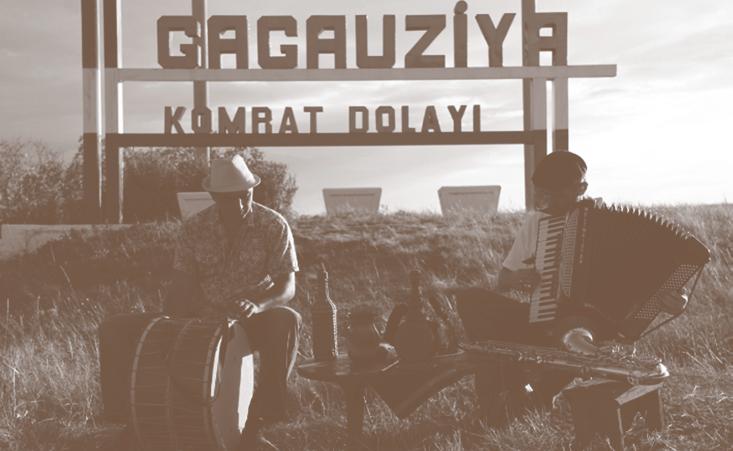
VASILI VIKHLIAEV
è mezzo russo, mezzo moldavo. Ha studiato regia alla ZeLIG scuola del documentario di Bolzano. Welcome to Gagauzia è il suo film di diploma. vasili vikhliaev is half Russian, half moldovan. He studied directing at the ZeLIG school for Documentary in Bolzano.
Welcome to Gagauzia is his diploma film. filmografia scelta / selected filmography 2013 Welcome to Gagauzia doc.
MARCIN KOSzAŁKA
Polonia / Poland, 2013, HD, col., 44’, v.o. polacca / Polish o.v.
sceneggiatura, fotografia screenplay, Photography: Marcin Koszałka. montaggio / editing: Anna Wagner. musica / music: Marek Śledziewski, Artur Affek. Produzione / Produced by: darklight Film Studio.
coproduzione / co-produced by: Telewizja Polska S.A. Distribuzione internazionale / World sales: Krakow Film Foundation.
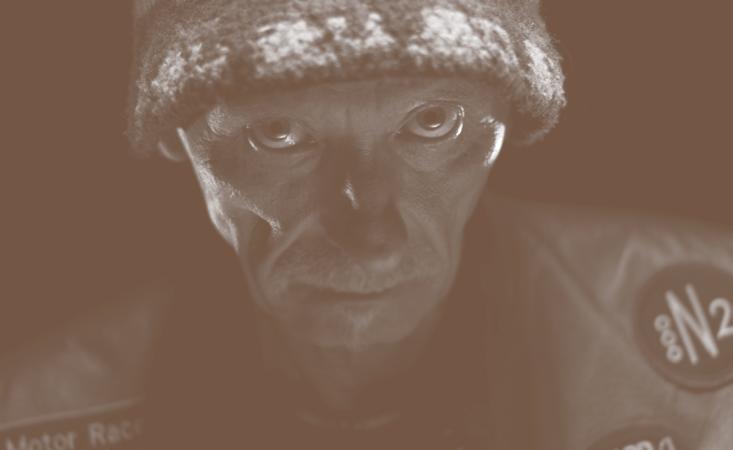
MARCIN KOSzAŁKA
È nato nel 1970 a Cracovia, in Polonia. Di Koszałka il Trieste Film Festival ha presentato in concorso i suoi documentari
Śmierć z ludzką twarzą nel 2008, Istnienie nel 2009 e Deklaracja nieśmiertelności nel 2011.
Marcin Koszałka was born in 1970 in Krakow, Poland. The Trieste Film Festival presented in competition his documentaries Śmierć z ludzką twarzą in 2008, Istnienie in 2009 and Deklaracja nieśmiertelności in 2011.
filmografia scelta selected filmography
2006 Śmierć z ludzką twarzą doc. 2007 Istnienie doc. 2008 Do bólu cm / sf doc. 2009 Wyrok na Życie doc. 2010 ucieknijmy od niej mm, doc.; Deklaracja nieśmiertelności cm / sf doc. 2013 Zabójca z Lubieżności doc.
Il fascino oscuro che circonda serial killer ci dice qualcosa di importante su noi stessi? La figura di Joachim Knychała, che uccise cinque donne tra il 1975 e il 1982, serve a focalizzare la nostra attenzione su coloro le cui vite sono state segnate dal famigerato “vampiro di Bytom”. tra di loro c’è anche l’ex giornalista Edward Kozak che, nonostante l’età, ammette di avere un gran numero di ossessioni. Il film sul “vampiro” gli offre l’opportunità di tornare al centro dell’attenzione.
Does gloomy fascination that surrounds serial killers tell us something important about ourselves? The figure of Joachim Knychała, who murdered five women between 1975 and 1982, is used to focus our attention on those whose lives were marked by the infamous “vampire from Bytom”. among them there is a former journalist, Edward Kozak, who, despite his old age, admits he has a variety of obsessions. the film about the “vampire” offers him an opportunity to enter the limelight one more time.
Da studente ventunenne leader della Rivoluzione di velluto nel 1989 a uomo di mezza età che ha vissuto sulle “montagne russe” sperimentando vittorie e sconfitte. La vita di Jakub Špalek, fondatore e direttore del teatro Kašpar di Praga, è sempre stata guidata e travolta dall’ossessione per il teatro. La sua casa vicino Praga si è riempita un po’ alla volta di scenografie e costumi, mentre sua moglie e le sue due figlie se ne sono andate. questo per lui è un nuovo inizio, ma rappresenta anche una delle più difficili decisioni della sua vita. Život s Kašparem è la storia della ricerca di un equilibrio tra libertà, responsabilità e principi artistici. una storia che percorre 23 anni della vita di un’intrigante personalità e di una figura chiave del teatro ceco.
From a 21-year-old student leader during the 1989 velvet Revolution to a man in his mid-forties who has lived on a roller coaster and experienced both victories and losses. the life of Jakub Špalek, the founder and director of Prague-based Kašpar theatre, has always been driven and engulfed by obsession with theatre. His house near Prague is gradually being filled with theatre decorations and costumes, Jakub’s wife and two daughters have left. a new beginning and one of the hardest decisions imaginable are in store for him. Život s Kašparem is a story of a quest for balance between freedom, responsibility and artistic principles. a story that spans 23 years in the life of an intriguing personality and a leading figure of czech theatre.
HELENA TřEŠTíKOVá
Repubblica ceca / czech Republic, 2013, HD, b-n / b-w & col., 88’, v.o. ceca / czech o.v.
sceneggiatura / screenplay: Helena Třeštíková. Fotografia / Photography: Jiří Chod. montaggio / editing: Jakub Hejna. suono / sound: Richard Müller.
Produzione, distribuzione internazionale / Produced by, World sales: Produkce Třeštíková. coproduzione co-produced by: czech Television.
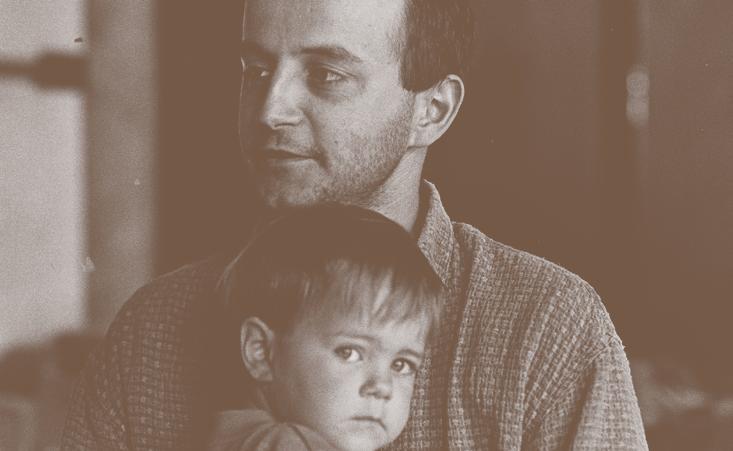
HELENA TřEŠTíKOVá
è nata a Praga nel 1949. Documentarista di fama internazionale, si distingue per il metodo del “film di osservazione a lungo termine” con cui ha realizzato gran parte dei suoi lavori. Alla Třeštíková, il Trieste Film Festival ha dedicato un omaggio nel 2010. / Helena Třeštíková born in 1949, in Prague, is an internationally renowned documentary filmmaker. Třeštíková stands out for her method of “long-term observation film” with whom she made all of her works. In 2010, the trieste Film Festival has dedicated a tribute to her cinema. filmografia scelta / selected filmography 1987 Manželské etudy serie doc. / doc. series 1992-1997 Řekni mi něco o sobě serie doc. / doc. series 1994-1997 Gen a Genus serie doc. / doc. series 1998 Sladké století doc. tv 2001-2002 Ženy na přelomu tisíciletí serie doc. / doc. series 2003 Když musíš tak musíš serie doc. / doc. series 2008 René doc. 2012 Soukromý vesmír doc. 2013 Život s Kašparem doc.
sImPLe
sceneggiatura / screenplay: Francesca Archibugi. Fotografia / Photography: debora Vrizzi. montaggio / editing: Esmeralda calabria. musica / music: Battista Lena. suono / sound: Francesco Morosini. Interpreti / cast: Pierluigi cappello.
Produzione Produced by: Agherose, Tucker Film. coproduzione / co-produced by: centro Espressioni cinematografiche, Banca Popolare FriulAdria, Mittelfest di cividale del Friuli. con il sostegno di / supported by: Fondo Audiovisivo FVG. Distribuzione internazionale, distribuzione per l’Italia / World sales, Distributed in Italy by: Tucker Film.

Francesca archiBugi è nata nel 1960 a Roma, in Italia.
Francesca archibugi was born in 1960 in Rome, Italy. filmografia scelta selected filmography 1988 mignon è partita 1990 verso sera 1993 Il grande cocomero 1994 con gli occhi chiusi 1998 L’albero delle pere 2001 Domani 2007 Lezioni di volo 2009 questione di cuore 2013 Parole povere doc.
Parole povere è la collisione tra gli occhi di una regista e le parole di un poeta: lei offre il suo sguardo, lui la sua identità. La macchina da presa cerca risposte con affettuoso pudore, il montaggio racconta, senza estetizzare, la musica diventa scansione narrativa e la storia di Pierluigi scorre sullo schermo così come nella quotidianità: le radici friulane e le testimonianze degli amici; i luoghi e i ricordi; l’ombra scura del ’76 e il profilo delle montagne; la sedia a rotelle che spezza la libertà di un sedicenne e disegna, millimetro dopo millimetro, la libertà di un uomo. Di un poeta.
“mi sono avvicinata a Pierluigi cappello quando è diventato il mio compagno di comodino. non ci conoscevamo, eppure eravamo già intimi. Le sue poesie sono piene di immagini e forse le ho perfino sognate. non sapevo nulla della sua vicenda personale, dell’incidente in moto a sedici anni e della sua vita in carrozzina da allora. nessun indizio dalle poesie: nei suoi versi Pierluigi corre, a volte vola.” (F. archibugi)
Parole povere is the collision between the eyes of a filmmaker and the words of a poet: she offers her gaze, he offers his identity. the camera looks for answers with doting discretion, the editing conveys without embellishments, the music turns into a narrative scansion, and Pierluigi’s story runs on the screen as it would in everyday life: his roots in Friuli and the personal stories told by his friends; the places and the memories; the dark shadow of 1976 and the silhouette of the mountains; the wheelchair, crippling the freedom of a sixteen-year-old boy and drawing, millimeter after millimeter, the freedom of a man. Of a poet.
“I approached Pierluigi cappello when he became my bedside table companion. We didn’t know each other, but were already intimate. His poems are full of images, I might even have dreamt some. I didn’t know anything about his personal life, about the motorcycle accident when he was sixteen, and that he spent the rest of his life in a wheelchair. there’s no trace of it in the poems: in his verses Pierluigi runs, and sometimes he flies.”
(F. archibugi)


anPlagd
Mladen Kovačević
PRAVI čLOVEK zA KAPITALIzEM
Dušan moravec
vera, una detective in pensione ritorna nel luogo dove è cresciuta, e Pera, il sapientone del paese esperto di cose esoteriche, sono gli ultimi due ‘suonatori di foglie’. entrambi di una certa età, sono tuttavia in grado di ‘suonare le foglie’ ancora con una certa intensità. Josip invece è un inventore dilettante che cerca di decodificare l’oscura arte del ‘suonare le foglie’. anplagd è un’allegoria esistenziale sulla musica suonata con le foglie degli alberi, ironicamente in bilico fra il più primitivo degli strumenti e la più universale fra le musiche d’evasione. mai musica è stata così originale.
vera, a private detective retired to the village where she grew up, and Pera, the know-it-all peasant of many esoteric skills, are the last remaining leafplayers - both in the autumns of their lives, still strongly blowing into leaves. Josip is an amateur inventor set out to decode the obscure artistry of leaf-playing. anplagd is an existential allegory about music played on tree leaves, humorously rattling between the most primitive of instruments and the most universal escapism of music. music has rarely been so offbeat.
serbia - Finlandia / serbia - Finland, 2013, HD, col., 52’, v.o. serba / serbian o.v.
sceneggiatura screenplay: Mladen Kovačević. Fotografia / Photography: Pablo Ferro. montaggio / editing: Nataša Damnjanović. musica / music: Nemanja Mosurović. suono / sound: Aleksandar Protić.
Produzione / Produced by: Horopter Film Production. coproduzione co-produced by: Helmi Films. con il sostegno di / supported by:
Film center Serbia - Ministry of culture, city of Belgrade - Secretariat for culture.
Distribuzione internazionale / World sales: Taskovski Films Ltd.

MLADEN KOVAčEVIć
è nato nel 1979, ha studiato cinema a Belgrado, Londra e città del capo. Born in 1979, Mladen Kovačević has studied cinema in Belgrade, London and Cape Town. filmografia scelta / selected filmography 2010 Dumbfounded hog doc. 2013 anplagd doc.
L’uOmO
GIustO PeR IL caPItaLIsmO / tHe RIGHt man FOR caPItaLIsm
sceneggiatura / screenplay: dušan Moravec. Fotografia / Photography: Matjaž Mrak. montaggio / editing: Jurij Moškon. musica / music: Damir Avdić. suono / sound: Boštjan Kačičnik.
Produzione Produced by: Škuc. coproduzione / co-produced by: Friendly Production, Vertigo/Emotionfilm. Distribuzione internazionale / World sales: Vertigo/Emotionfilm.
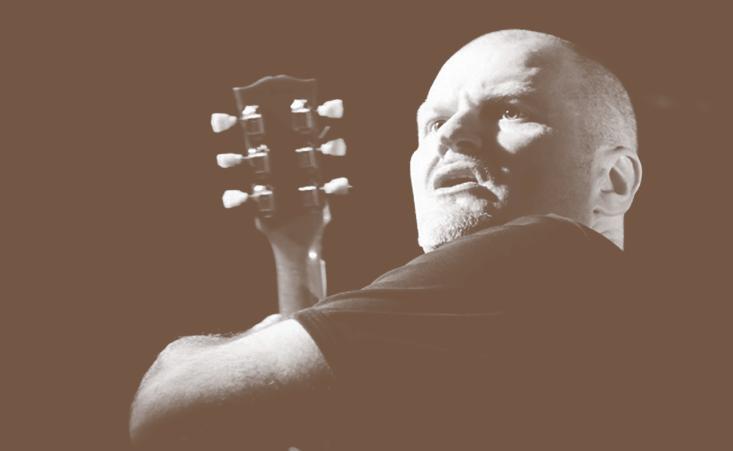
duŠan moravec
è nato nel 1964 a Lubiana, ora slovenia.
Dušan moravec was born in 1964 in Ljubljana, now slovenia. filmografia scelta selected filmography
2003 stisnjeni v kotu doc. 2005 Harmonikarji doc. 2006 Ženske iz nebotičnika doc. 2007 na prvi pogled doc.
2008 Beslan - mesto ki ga ne pozabiš doc. 2009 Govoreče glave doc. 2010 misli modro in dobro doc.
2011 Klanec do doma doc. 2013 Pravi človek za Kapitalizem doc.
“La vita e la storia di Damir Avdić musicista, poeta e scrittore bosniaco di tuzla che vive in slovenia, soprannominato anche ‘Bosnian Psycho’ e ‘Diplomatz’. Da solo, sul palco, armato solo di chitarra e voce, questo artista della parola esprime in modo sfrontato ed eloquente la sua visione, senza compromessi, del mondo. cantando della guerra in Bosnia e della devastazione di quel paese, riesce allo stesso tempo a mettere a nudo la banalità, l’indifferenza e l’implacabile ricerca del successo nella società contemporanea. nel film, musicisti, scrittori e intellettuali parlano di Avdić. Tra di loro, Jan Cvitkovič regista e poeta sloveno, il rapper bosniaco edo maajka, marko Brecelj musicista e scrittore sovversivo sloveno, Miljenko Jergović giornalista, scrittore e critico nato a Sarajevo … Attraverso le parole di Avdić, il documentario, che inizialmente tratta della guerra e delle sue conseguenze, diventa un’aspra critica del capitalismo.” (D. moravec)
“the documentary film focuses on the life and story of Damir Avdić, the Slovenia-based Bosnian musician, poet and writer from tuzla, who was also dubbed ‘Bosnian Psycho’ and ‘Diplomatz’ by locals. standing on the stage alone, armed only with a guitar and his voice, this artist of words brazenly and eloquently expresses his uncompromising view of the world. singing about the Bosnian war and disclosing its merciless devastation, he manages to simultaneously reveal the banality, half-heartedness and relentless pursuit of success in contemporary society. a series of noted musicians, writers, intellectuals and other interviewees talk about Avdić in the film, to include slovenian film director and poet Jan Cvitkovič, Bosnian rapper Edo Maajka, subversive slovenian musician and writer marko Brecelj, sarajevo-born journalist, writer and critic Miljenko Jergović ... Through Avdić’s words, the documentary, which initially focuses on the war and its aftermath, becomes an insurgent critique of capitalism.” (D. moravec)


sayat nova
Sergej Paradžanov (1968-1969)
VOSPOMINANIJA O “SAyAT NOVE”
Levon Grigorjan (2006)
PARADJANOV
serge avedikian, Olena Fetisova (2013)
Forse su alcune personalità veramente geniali nel campo delle arti (e, in questo caso, del cinema) bisognerebbe che un festival avesse la costanza di richiamare l’attenzione più spesso, riproponendo anche in piccole dosi le loro lezioni di libertà creativa, il loro istintivo rifiuto dei canoni e delle regole codificate: li renderebbe, così, più familiari alle generazioni più giovani dei nuovi talenti che oggi si accostano alle arti e che forse di quei geni del passato non solo non conoscono le opere ma neppure l’esistenza o nomi. uno di questi nomi da riscoprire e omaggiare è sicuramente il rappresentante dell’arte moderna più originale e più perseguitato dal regime sovietico: Sergej Paradžanov, cineastapittore, artista visivo di difficile classificazione, uno spirito ribelle, nato a Tbilisi in Georgia nel 1924, allievo del grande Aleksandr Dovženko dopo aver seguito studi al VGIK di Mosca, e poi a Kiev dove si distinse come il più provocatorio protagonista del cinema dissidente ucraino degli anni sessanta. salì alla ribalta internazionale diventando famoso nel 1964 con il film Le ombre degli avi dimenticati, film legato al suo profondo rispetto per le tradizioni popolari, da lui rielaborate nella magia visiva di questo e degli altri pochi film che riuscì a realizzare (tra cui La fortezza di suram) in ucraina, in armenia, in Georgia dove era vissuto sempre in povertà e perseguitato dal regime, ma amando profondamente di quei paesi le atmosfere, la letteratura, la cultura. trieste Film Festival gli ha dedicato un primo corposo omaggio all’interno della retrospettiva sul cinema ucraino curata per l’edizione del 1996. quest’anno, in occasione di due anniversari, il novantesimo dalla sua nascita e il quarantesimo dalla sua prima condanna ai lavori forzati “per traffico di opere d’arte e per omosessualità”, è stato realizzato dal regista armeno serge avedikian e dalla regista ucraina Olena Fetisova un film di fiction, Paradjanov, ispirato alla vita di questo magistrale artista inviso al potere. Il nostro omaggio parte proprio da questo film che presentiamo per richiamare l’attenzione sulla figura carismatica e quasi leggendaria di Paradžanov, il
Perhaps a few truly brilliant figures in the world of the arts (and in this case of cinema) really deserve more frequent attention from a festival, with their lessons of creative freedom, their instinctive rejection of canons and rigid rules offered in small but repeated doses. this would certainly make their work more familiar to the younger generations currently taking their first steps in exploring the arts and who may well be unaware not only of the works of these geniuses of the past but also of their very existence or names. One of these names worth rediscovering and honouring is without doubt a man who was the most original and most persecuted representative of modern art under the soviet regime: sergei Paradjanov, filmmaker and painter, a visual artist defying any classification, a rebel spirit, born in tbilisi in Georgia in 1924. a pupil of the great alexander Dovzhenko, after studying at the VGIK of Moscow, he moved to Kiev, where he stood out as being the most provocative exponent of dissident ukrainian cinema of the 1960s. He gained international acclaim and fame in 1964 with shadows of Forgotten ancestors, a film reflecting his profound respect for popular traditions, reworked by him in the visual magic of this and the few other films he was able to produce (including the Legend of suram Fortress) in ukraine, armenia and Georgia, where he had always lived in poverty, persecuted by the regime, but feeling a great love for the atmospheres, literature and culture of these countries. the trieste Film Festival already dedicated a major tribute to him as part of the retrospective on ukrainian cinema organised for the 1996 edition of the festival. this year, on the occasion of two anniversaries – the 90th anniversary of his birth and the 40th of his first sentence to hard labour for “trafficking in works of art and for homosexuality” – a fictional film entitled Paradjanov has been made by the armenian director serge avedikian and the ukrainian director Olena Fetisova, inspired by the life of this great artist who was so unpopular with the regime. Our tribute starts with this film, which we
cui arresto nel 1974 su ordine del ministero dell’Interno suscitò un’ondata di indignazione e di protesta internazionale da parte di tutto il mondo della cultura, protesta che facilitò la scarcerazione dell’artista con un anno di anticipo. ma vogliamo soprattutto offrire al nostro pubblico l’opportunità di vedere sayat nova Il colore del melograno, l’opera di Paradžanov certamente meno vista, massacrata dalla censura di regime e mai uscita in versione integrale nell’Unione Sovietica. È il film con cui Paradžanov ha testimoniato il suo grande amore per l’arte e la letteratura armena, trasformando la narrazione di una biografia, quella del più grande poeta armeno, aruthin sayadin (sayat-nova), in una successione di singole inquadrature dal fortissimo impatto figurativo e di una rigorosità quasi sacrale nella forma: una struttura narrativa insolita, che ignorava il dogma del realismo socialista dell’epoca per seguire invece gli imperativi dell’armonia e della bellezza “sempre raggiunti dalla pittura”, come diceva lui. è facile capire quanto quest’opera dovesse apparire rivoluzionaria, “decadente” (una delle accuse) e blasfema (in realtà all’avanguardia…) in quel tempo di rigore per l’arte di stato in un paese che ancora oggi, in epoca putiniana, dimostra di non aver risolto i problemi su questioni riguardanti la libertà dell’arte, l’accettazione della diversità, l’uguaglianza degli individui. controcorrente, coraggioso, provocatorio forse più degli altri film di Paradžanov, sayat nova. Il colore del melograno si presenta oggi come una metafora attuale, quasi senza parole, che passa tutta attraverso lo stupore degli occhi. completa il nostro omaggio il documentario di Levon Grigorjan vospominanija o “sayat nove” che propone mezz’ora di immagini inedite del film, ritrovate in un archivio e ritenute perse per molti anni: forse sono la testimonianza dello scempio del film fatto dalla censura di stato che già aveva distrutto tutte le sceneggiature scritte da Paradžanov nei lunghi anni trascorsi in carcere.
are presenting to draw attention to the charismatic, almost legendary status of Paradjanov, whose incarceration in 1974 on the orders of the ministry of the Interior provoked a wave of international indignation and protest from the world of culture; a protest that facilitated his release a year early. But above all, we want to offer our public the opportunity of seeing sayat nova. the color of Pomegranates, certainly the least seen of Paradjanov’s works, massacred by the regime’s censors and never released in its uncut version in the soviet union. this is the film in which Paradjanov revealed his great love for the art and literature of armenia, transforming the narrative of a biography, that of the greatest armenian poet, aruthin sayadin (sayat-nova), into a succession of single perspectives of a great figurative impact and almost sacred rigour in form: an unusual narrative structure that ignored the dogma of the socialist realism of the time in favour of the imperatives of harmony and beauty that are “always attained by painting”, as he put it. It is easy to understand to what extent this film must have seemed revolutionary, “decadent” (one of the accusations) and blasphemous (but in reality a pioneer…) in those times of rigour for a state-sponsored art in a country which even today, in the era of Putin, demonstrates that it has not been able to resolve the problems linked with questions of the freedom of art, the acceptance of difference, the equality of individuals. Perhaps more non-conformist, bold and provocative than Paradjanov’s other films, sayat nova. the color of Pomegranates today appears a topical, almost wordless metaphor, conveyed in full through the astonishment of one’s eyes. Our tribute is rounded off with Levon Grigoryan’s documentary, vospominanya o “sayat nove”, which offers half an hour of unreleased images of the film, found in an archive and for many years believed lost: perhaps they are the evidence of the mangling of the film undertaken by the state censors, who had already destroyed all the scripts written by Paradjanov during his long years spent in jail.
uno dei più grandi capolavori del XX secolo, sayat nova di Sergej Paradžanov è la biografia del trovatore armeno sayat-nova che racconta la vita del poeta attraverso la sua poesia invece di usare la narrazione convenzionale di eventi importanti della sua vita. Lo spettatore osserva il poeta crescere, innamorarsi, entrare in un monastero e morire, ma tutti questi eventi sono rappresentati grazie alla ricchezza figurativa delle immagini di Sergej Paradžanov e alle poesie di Sayat-Nova. Fortemente suggestivo, con immagini indimenticabili, il film ebbe gravi problemi con la censura sovietica. Poiché non conforme all’ideologia sovietica, nel 1969 il regista Sergej Jutkevič venne incaricato di rimontarlo e di farne una versione censurata in lingua russa.
One of the greatest masterpieces of the 20th century, sergei Paradjanov’s sayat nova, a biography of the armenian troubadour sayat-nova reveals the poet’s life more through his poetry than a conventional narration of important events in sayat-nova’s life. We see the poet grow up, fall in love, enter a monastery and die, but these incidents are depicted in the context of what are images from sergei Paradjanov’s imagination and sayat-nova’s poems. strongly suggestive, with unforgettable images, the film had serious problems with soviet censors. Due to the film’s non-confomity to the soviet ideology, in 1969 soviet director sergei Yutkevich re-edited and made the censored Russian language version of the film.
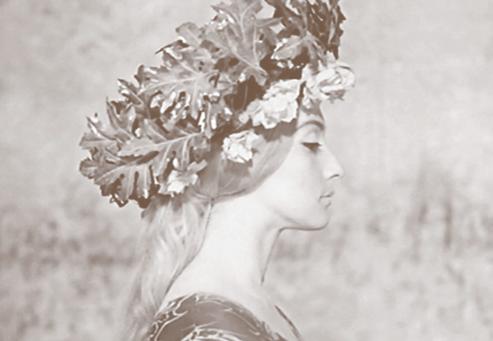
uRss / usRR 1968-1969, 35mm, col., 79’ v.o. armena / armenian o.v.
sceneggiatura / screenplay: Sergej Paradžanov, ispirata alla vita e ai poemi di / based on the life and the poems by Sayat-Nova. Fotografia / Photography: Suren Šakhbazian. montaggio editing: Sergei Paradžanov, M. Ponomarenko, Sergej Jutkevič. musica music: Tigran Mansuryan. suono sound: Yurij Sayadyan. scenografia art Director: Sergej Paradžanov, Stepan Andranikjan.
costumi costume Designer: Elene Akhvedjani, I. Karaljan, Zh. Sarabjan. Interpreti cast: Sofiko Čaureli, Melkon Alekjan, Vilen Galstjan, Georgij Gegečkori, onik Minassjan, Spartak Bagashvili, Medea Džaparidze, G. Macukatov, M. Bibilešvili, G. Margarian, L. Karamian, V. Mirianašvili. Produzione / Produced by: Armen’film Studio.
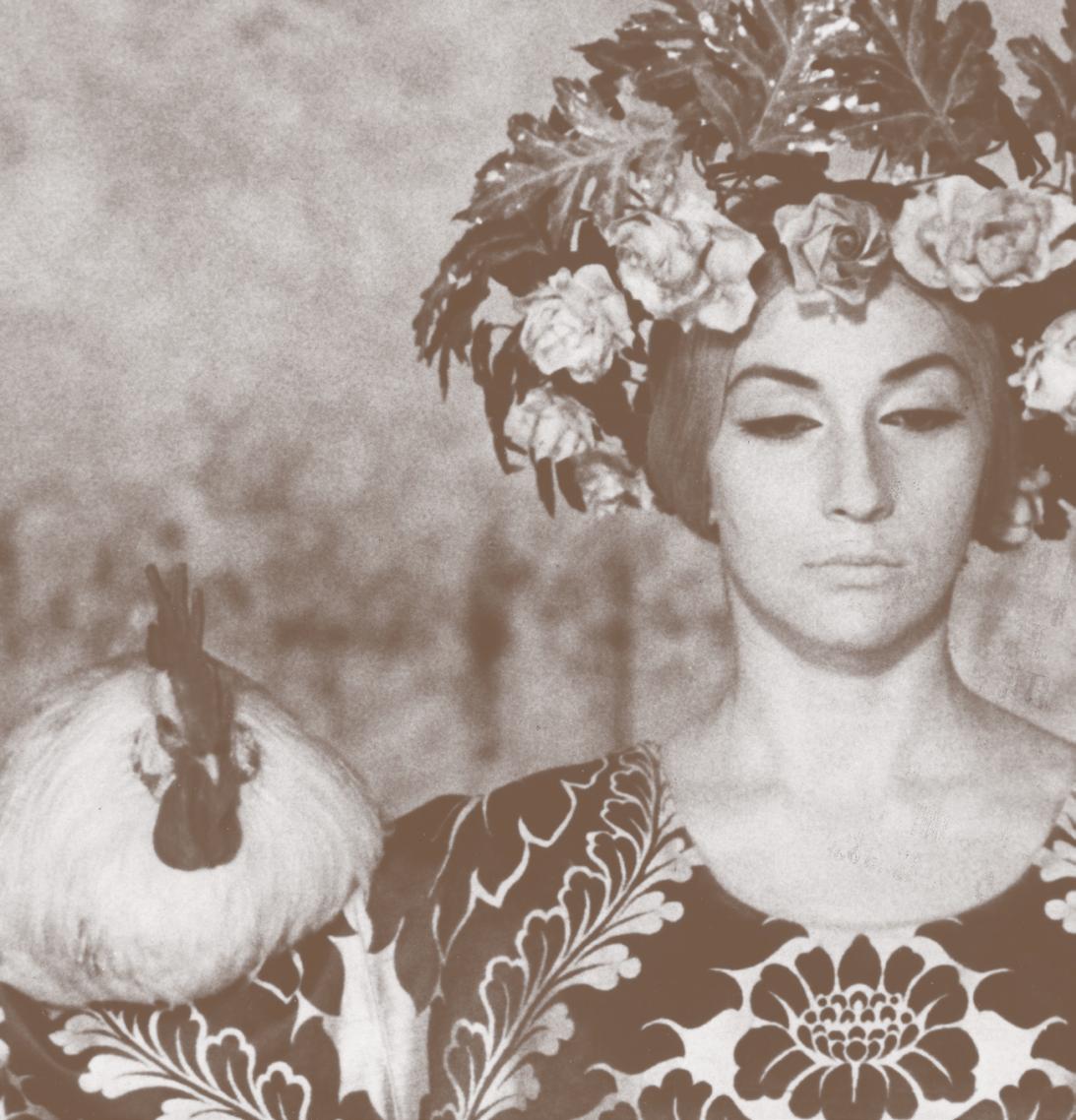
questo documentario propone mezz’ora di immagini inedite, ritrovate in archivio e ritenute perse per molti anni, del film sayat nova del regista Sergej Paradžanov. vospominanija o “sayat nove” è il titolo inizialmente previsto per il film e che Paradžanov avrebbe voluto dargli.
this documentary offers half-hour of new images of sayat nova by director sergei Paradjanov. these images, believed lost for many years, were found in archives. vospominanya o “sayat nove” is the title originally planned for the film and that Paradjanov wanted to give it.
RemInIscenZe su “saYat nOva” / memORIes aBOut “saYat nOva”
armenia - Italia / armenia - Italy, 2006, Betasp, col., 30’, v.o. russa / Russian o.v.
sceneggiatura screenplay: Levon Grigorjan. Fotografia / Photography: Suren Šakhbazian. montaggio / editing: oleg Ivanov.
Produzione / Produced by: Armenfilm, Zivago Media. Distribuzione internazionale / World sales: Zivago Media.
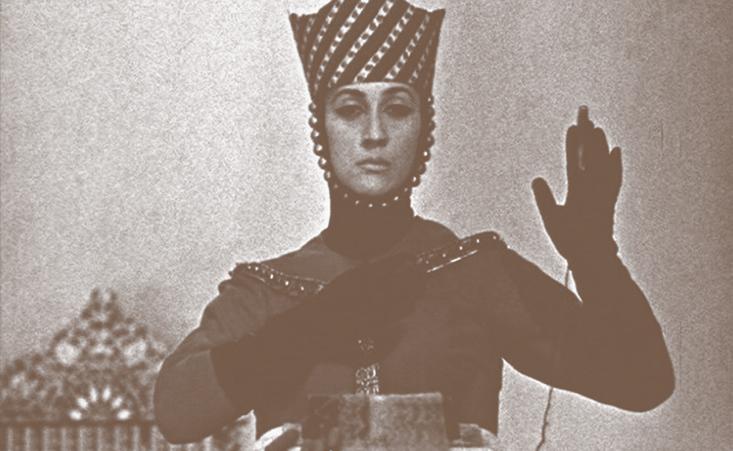
LEVON GRIGORJAN
è nato nel 1942 a Yerevan, ora armenia.
Levon Grigoryan was born in 1942 in Yerevan, now armenia. filmografia scelta / selected filmography 2006 vospominanija o “sayat nove” doc.

Sergej Paradžanov nasce nel 1924 a Tbilisi in Georgia. Per tre anni freguenta il conservatorio di Kiev prima di trasferisi a Mosca dove entra nel VGIK nel 1946. Studia con i maestri ucraini lgor ’ Šavčenko e Aleksandr Dovženko. Dopo il diploma torna nuovamente a Kiev e dal 1958 al 1963 gira cinque film in lingua ucraina. Nel 1964 riceve l’incarico di girare un film tratto da un’opera dello scrittore ucraino Mychajlo Kocjubyns’kyj e realizza teni zabytych predkov (Le ombre degli avi dimenticati), opera indimenticabile che gli porta riconoscimenti a livello internazionale. nel 1967 gira in armenia sayat nova altro film d’ispirazione letteraria e di forte impatto figurativo dedicato alla figura del poeta armeno aruthin sayadin. ll film non esce e viene fatto rimontare per poter circolare a diffusione limitata. lnizia il periodo piu tragico della vita del regista: i suoi soggetti vengono continuamente rifiutati, finché nel 1974 viene arrestato e condannato ai Iavori forzati per cinque anni. queste le accuse: contrabbando di opere d’arte e omosessualità. esce di prigione dopo quattro anni in seguito a una campagna internazionale di protesta. è confinato a tblisi dove lavora come antiquario. nel 1982 si sparge la voce di un nuovo arresto. Dopo 11 anni di silenzio nel 1985 presenta Legenda o suramskoj kreposti (La leggenda della fortezza di suram) al festival di mosca. Ašik Kerib del 1986 è il suo ultimo film. muore a erevan in Georgia nel 1990.
Sergei Paradjanov was born in Tbilisi, Georgia, in 1924. He spent three years at Kiev Conservatory before moving to Moscow, where he joined VGIK in 1946. He studied with the Ukrainian masters lgor’ Shavchenko and Alexsander Dovzhenko. He returned to Kiev after receiving his diploma and from 1958 to 1963 he made five films in ukrainian. In 1964 he was asked to make a film taken from a work by the ukrainian author mychajlo Kocjubyns’kyj: teni zabytych predkov (shadows of Forgotten ancestors), for which he received international acclaim. ln 1967 he was in armenia, where he made sayat nova, another film with a literary origin, dedicated to the figure of the armenian poet aruthin sayadin. the film was never released complete, being severely cut and given only limited distribution. this was the start of the most tragic period in the director’s life: his ideas were systematically turned down until in 1974 he was finally arrested and sentenced to five years’ hard labour. the charges were: the smuggling of works of art and homosexuality. He was finally released after four years following an international protest campaign. He continued to live under virtual house arrest in tbilisi, where he worked as an antiquarian. In 1982 the word got around that he had again been arrested but in 1985, and after eleven years in the wilderness, he presented Legenda o suramskoj kreposti (the Legend of suram Fortress) at the moscow Festival. His last film was Ašik Kerib, made in 1986. Paradjanov died in erevan in Georgia in 1990.
1952-1954 andrieš (Racconto moldavo / moldav tale) 1954-1955 andrieš (versione Iunga / longer version) 1957 Dumka (Pensierino / Little idea) cm / sf; natal’ja uzvij cm / sf; Zolotye ruki (Le mani d’oro / Hands of Gold) cm / sf 1958 Pervyj paren’ (ll primo ragazzo / the Best Boy) 1960-1961 ukrainskaja rapsodija (Rapsodia ucraina / ukrainian Rapsody) 1962 cvetok na kamne (ll fiore sulla pietra / the Flower on the stone) 1964 teni zabytych predkov (Le ombre degli avi dimenticati / shadows of Forgotten ancestors) 1965 Hagop Hovnathnian 1966 Kivski freski (Gli affreschi di Kiev / The Frescos of Kiev) 1968-1969 sayat nova. (sayat nova. ll colore del melograno / sayat nova. the color of the Pomegranates) 1979 Znak vremeni (ll segno del tempo / the sign of the time) 1984 Legenda o suramskoj kreposti (La leggenda della fortezza di suram / the Legend of suram Fortress, coregia di /codirected by Dodo abašidze) 1986 arabeski na temu Pirosmani (arabeschi sul tema di Pirosmani / arabesques on the theme Pirosmani); Ašik Kerib
Film biografico che racconta alcuni dei momenti salienti della vita e del lavoro del grande regista, perseguitato dalle autorità sovietiche. Vediamo Paradžanov mentre realizza suoi capolavori come Le ombre degli avi dimenticati e sayat nova. Il colore del melograno ma anche durante suoi anni di carcere, sotto il regime comunista. ed è l’amore indissolubile per la bellezza che gli permette di sopravvivere negli anni di isolamento e oblio.
“Il nostro film parla di un regista dai pensieri e comportamenti complessi. Di un uomo che diventa un mago, un clown e un contestatore, ma allo stesso tempo non perde mai il suo sguardo da bambino verso la vita. Di un uomo che è come un festival, un’orchestra, che continua a conservare la fede nell’umanità, nonostante tutto quello che deve sopportare. è un film che parla anche del suo eterno amore per l’ex moglie e dell’infinito amore di quest’ultima per lui.” (O. Fetisova)
“Paradžanov è un regista che ha creato un linguaggio unico nel cinema. Ha fatto film che nessuno in uRss aveva osato fare prima di lui. I suoi film hanno avuto un successo strepitoso in tutto il mondo e per questo ha dovuto sacrificare molti anni della sua vita in carcere. e ora, 20 anni dopo, con Olena Fetisova abbiamo realizzato un film su un grande artista di un paese che non esiste più sul mappamondo e io, come attore, ho riportato in vita il personaggio di Paradžanov assumendo il ruolo di protagonista.” (s. avedikian)
ANTEPRIMA ITALIANA
taLIan PRemIeRe
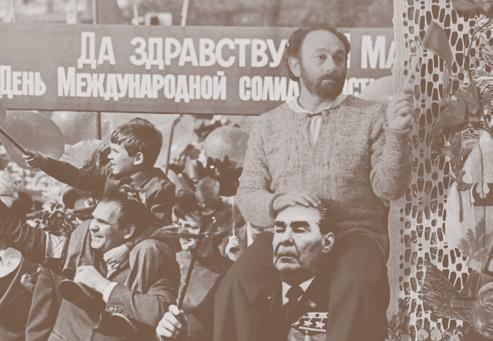
ucraina - Francia - Georgia - armenia / ukraine - France - Georgiaarmenia, 2013, HD, col., 95’ v.o. russo / Russian o.v.
this biopic relates some of the key moments in the life and work of this director of genius who was persecuted by the soviet authorities. We watch Paradjanov as he makes his ground-breaking films shadows of Forgotten ancestors and sayat nova. the color of Pomegranates, and also during his imprisonment by the communist regime. an artist’s unbreakable love for the beauty allows him to survive the years of isolation and oblivion.
“Our film is about a film director with complex thoughts and behaviors. Of a man who becomes a magician, a clown and a ringleader, but at the same time, never loses his child-like fascination for life. Of a man who is a festival, an orchestra, preserving faith in humanity, whatever he has to endure. this feature is about his undying love for his exwife and her endless love for him.” (O. Fetisova)
“Paradjanov is a director, who created a unique language in cinematography. He made films, which no one in the ussR dared to make before him. His films had a roaring success all over the world. For that, he had to sacrifice years of his life spent in prison. and now, 20 years later, Olena Fetisova and me as co-directors made a movie about a great artist from the country, which doesn’t exist on the world map anymore, and I as an actor brought back to life a character of Paradjanov by taking the lead role.” (s avedikian)
sceneggiatura / screenplay: olena Fetisova.
Fotografia / Photography: Sergej Mikhalčuk. montaggio editing: Alexandra Strauss, olexandr Švets. musica music: Michel Karsky. suono sound:
Cristinel Sirli, Oleg Kulčytskiji. scenografia art Director: Vladyslav Ryžykov. costumi / costume Designer: Irina Gergel, Katevan Kalandadze.
Interpreti cast: Serge Avedikian, Julija Peresild, Karen Badalov, Zaza Kašibadze, Jurij Vysotsky, Anton Yakovlev, Roman Lutsky, Lesia ostrovska, Ferdinando Vicentini orgnani, Alla Sergijko. Produzione / Produced by: Interfilm Production Studio. coproduzione co-produced by: Araprod, Gemini, Milimeter Film, Paradise, Arte France cinema. con il sostegno di supported by: ukrainian State Film Agency, Georgian National Film center, National cinema centre of Armenia, centre National du cinéma et de l’Image Animée (cNc), Arte France.
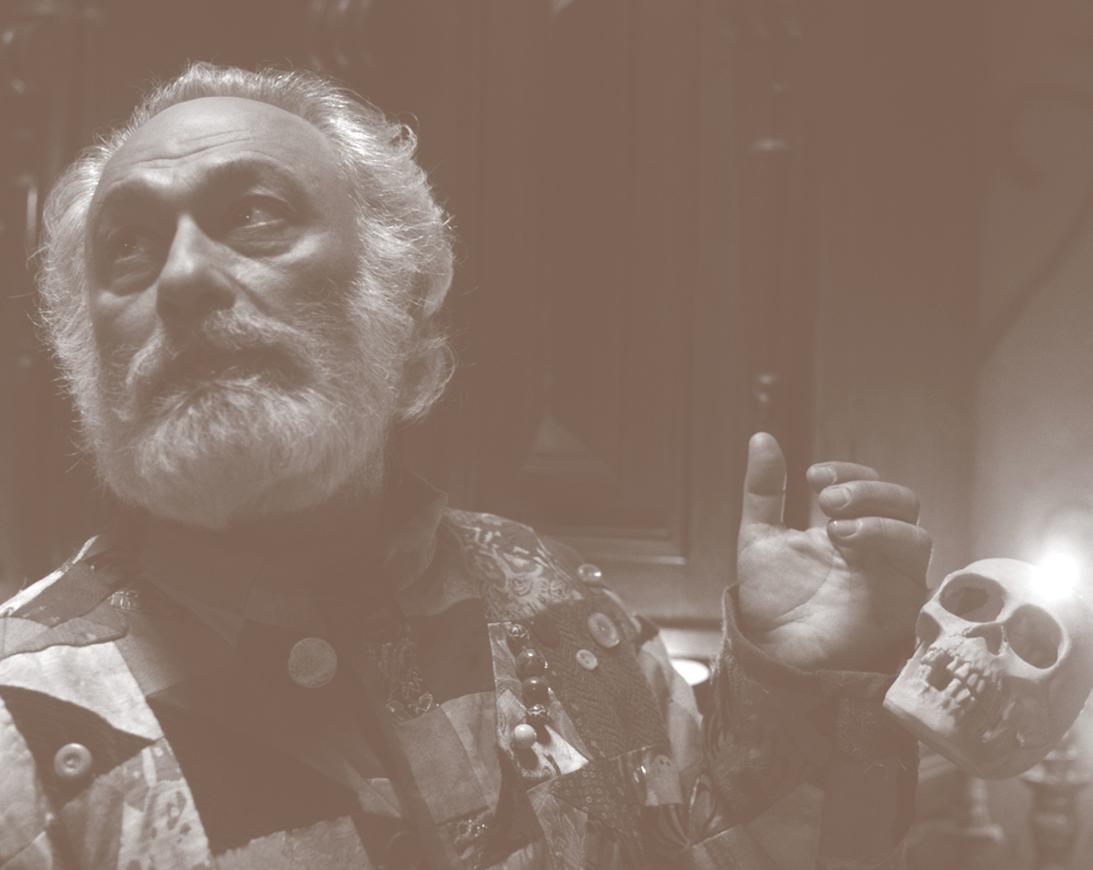
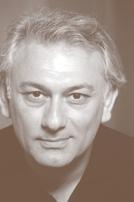

SERGE AVEDIKIAN
è nato nel 1955 a Yerevan, ora armenia. serge avedikian was born in 1955 in Yerevan, now armenia. filmografia scelta / selected filmography
2002 Ligne de vie cm animazione / sf animation 2006 nous avons bu la meme eau doc. 2009 chienne d’histoire cm animazione / sf animation; Premi awards: cannes FF – miglior cortometraggio / Best short Film 2011 Histoires de chiens doc. 2013 Paradjanov (diretto con / directed with Olena Fetisova)
olena Fetisova È nata nel 1964 a Kiev, ora Ucraina. Olena Fetisova was born in 1964 in Kiev, now Ukrarine. filmografia scelta / selected filmography
2005 If I Were a saxophone doc. 2006 there Was a Woman Who Lived in a shoe doc. 2009 not alone at Home doc.
2013 Paradjanov (diretto con / directed with serge avedikian)

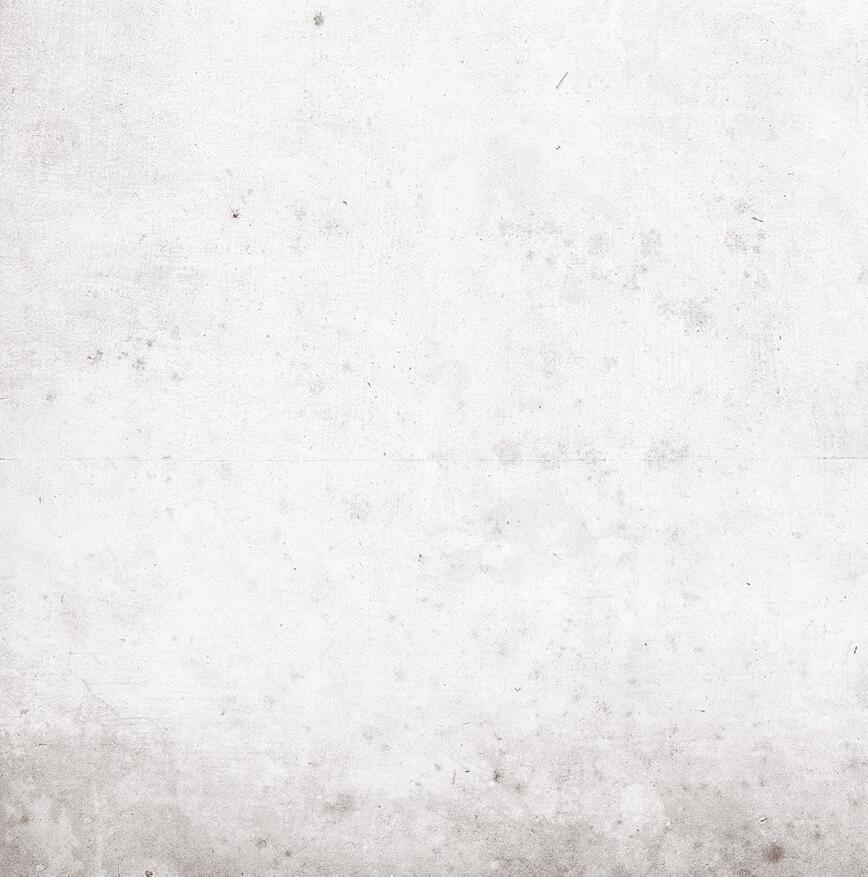
doc Portrait: Franco giraldi
(work in progress)
Luciano De Giusti pag. 58
melting street
Ivana Hrelja pag. 62
Parole Povere
Francesca archibugi pag. 111
i sentieri della gloria: in viaggio con mario monicelli sui luoghi della grande guerra
Gloria De antoni pag. 67
the sPecial need carlo Zoratti pag. 104
nata come una vetrina dedicata alle produzioni realizzate nella regione Friuli venezia Giulia, dapprima come un contenitore generico che cogliesse tutti i fermenti della zona e in seguito come una selezione accurata dei migliori lavori realizzati dai cineasti locali, “Zone di cinema” con il tempo si è trasformata, seguendo gli autori nei loro viaggi professionali in Italia e all’estero, registrandone successi, le evoluzioni artistiche, mutamenti di percorso, e confrontandosi con le nuove realtà produttive di una regione che del proprio “sistema cinema” ha fatto un vero e proprio baluardo (la conservazione dei materiali audiovisivi grazie alla cineteca del Friuli; le numerose società di produzione sorte negli anni in tutto il territorio; una società di distribuzione, la tucker, impegnata nella distribuzione dei film prodotti anche in zona; una neo-società di vendite estere, la slingshot Films, e infine una consolidata rete di festival cinematografici unica nella sua offerta e nella sua varietà). “Zone di cinema” si è evoluta, come si sono evoluti alcuni degli autori che abbiamo seguito negli anni e che nel 2013 hanno dato il meglio di sé, a partire dal ‘caso’ Zoran, il mio nipote scemo di matteo Oleotto, un cult movie che ha riscosso un enorme successo sia di pubblico che di critica, a tir di alberto Fasulo, un road movie che si snoda tra fiction e documentario e che ha vinto all’ultimo Festival di Roma, al documentario the special need di carlo Zoratti, che ha esordito a Locarno e ha continuato il suo tour festivaliero ottenendo importanti riconoscimenti (qui a trieste in concorso internazionale). Per suscitare un dibattito collettivo sul valore di una nuova autorialità che sembra (ri)nascere nella nostra Regione e imporsi a livello nazionale e internazionale, abbiamo pensato di dedicare una tavola rotonda al cinema realizzato in questa Regione, invitando gli autori e produttori protagonisti quest’anno di un’eccellenza artistica che merita di essere oggetto di una riflessione critica, che ne analizzi tematiche, atmosfere e linguaggi comuni.
“cinema Zones” ’s original aim was to showcase regional productions made in Friuli venezia Giulia. While it started as a more generic “container” of local works, it later became more selective by turning its attention to the best work by local directors and, over the years, following their evolution in Italy and abroad, documenting their successes, their artistic development, their changes of direction, etc. while also promoting new production initiatives in this Region, where the cinema industry, thanks to its ability to cooperate and pool resources, has become an important and consistent source of economic growth. Regional projects include: conservation of audio-visual material by the cineteca del Friuli; numerous production companies that have sprung up in recent years all around the Region; the distribution company tucker, which is involved in distributing local films; a new foreign-sales company, slingshot Films; and, finally, an established network of local film festivals which is unique for its range and variety.
“cinema Zones” has evolved, in the same way as some of the directors whom we have been following over the years, and who in 2013 have delivered some of their best work, with notable achievements such as the cult movie Zoran, my nephew the Idiot by matteo Oleotto, which has been a hit both with audiences and critics. Other outstanding works include tir by alberto Fasulo, a documentary-style road movie which won top prize at the Rome Film Festival, and the documentary the special need by carlo Zoratti, which debuted at Locarno and toured successfully the festival circuit gaining important recognition (and in the international competition here in trieste). We wanted to stimulate a collective debate on the importance of the new wave of directors who seem to be blossoming in our Region and gaining national and international recognition. For this purpose we have decided to dedicate a round table event to our current regional production, inviting local directors and
“Zone di cinema” quest’anno si allontana dallo spazio omogeneo e ben definito di una sezione a sé stante a cui eravamo abituati, si espande e si colloca trasversalmente in altre sezioni, diventando quasi un timbro di qualità, un bollino ‘doc’ che ne definisce l’origine ma che non ne delimita le potenzialità. tra vari titoli che abbiamo voluto segnalare the special need nel concorso documentari, una storia nata in regione ma che prosegue in Germania seguendo enea, un disabile alla ricerca di una sessualità mai vissuta ma desiderata; il cortometraggio, melting street di Ivana Hrelja sulla performance collettiva dell’artista elisa vladilo nella vicina Pola nella neo-sezione dedicata al cinema che si avvicina al mondo dell’arte in tutte le sue forme; un ritratto curioso del regista Franco Giraldi, frutto di un lavoro ventennale del professor Luciano De Giusti, e infine il documentario fuori concorso Parole povere di Francesca archibugi, prodotto da due società friulane, sul giovane poeta contemporaneo Pierluigi cappello. Film di durate, generi e linguaggi diversi a testimonianza di una realtà cinematografica e artistica eterogenea e proteiforme quale quella del Friuli venezia Giulia.
producers who this year have distinguished themselves with works of excellence and whose common themes, atmospheres and idioms deserve to be properly critically evaluated.
“cinema Zones” this year will no longer be a self-contained section as it used to – it has expanded and now consists of an across-theboard selection of films featured in other sections. “cinema Zones” will therefore act almost like a quality assurance label to highlight the best of local productions without “segregating” them. some of the various works that have been selected this year include: the special need in the documentary competition – the story of enea, an autistic man from Friuli who embarks on a journey to Germany to find the physical love he has so far been denied; the short documentary, melting street by Ivana Hrelja about artist elisa vladilo’s collective performance in neighbouring Pula in the festival’s new section dedicated to cinema inspired by the art world in all its forms; a curious portrait of director Franco Giraldi, the culmination of twenty-years’s work by cinema professor Luciano De Giusti; and, finally, the documentary Parole povere (not in competition) by Francesca archibugi, produced by two companies based in Friuli, about young contemporary poet Pierluigi cappello. these movies, though different in duration, genre and idiom are all testament to Friuli venezia Giulia’s multifaceted and diverse cinematic and artistic scene.
TRAINER
Pavel Jech nicos Panayotopoulos




I PROGETTI SELEZIONATI / SELECTED PROJECTS
237 YEARS – Ioana mischie – Romania
THE CELLULOID MAN – alessandro Padovani – Italia / Italy
THE CONVENTION – milada mašinová – Repubblica ceca / czech Republic
KOSTA’S DECISION – Bojana Vidosavljević – Bosnia ed Erzegovina / Bosnia & Herzegovina
SHAME – verica nedeska-trajkova – Repubblica ceca / czech Republic
SIDE ROADS – Bojana Babić – Serbia
THROUGH THE WINDOW – Lorenzo Zeppegno – Italia / Italy
WITH THE STREAM – martina svobodová – slovacchia / slovakia
Il progetto eastweek, nato nel 2009 in occasione del ventesimo anniversario del trieste Film Festival, rinnova il suo impegno preso con le scuole e le accademie di cinema dell’europa centro orientale, introducendo un’importante novità. Realizzato con il sostegno dell’Ince –Iniziativa centro europea e in collaborazione con il Premio Internazionale per la sceneggiatura mattaDOR dedicato a matteo caenazzo, eastweek cresce e si trasforma in un workshop internazionale di sceneggiatura dedicato allo sviluppo di soggetti cinematografici.
Gli studenti selezionati parteciperanno ai cinque giorni di workshop, in cui svilupperanno le loro idee attraverso lavori di gruppo, sessioni di q&a , masterclass e case studies
I trainer del workshop sono Pavel Jech e nicos Panayotopoulos con la collaborazione di Thanos Anastopoulos e Čedomir Kolar e con il coordinamento di andrea magnani. un taLent camPus unico, in cui i partecipanti avranno accesso a tutte le iniziative del trieste Film Festival e agli incontri di co-produzione nell’ambito del forum “When east meets West”.
alla selezione per il workshop possono partecipare finalisti della sezione per il miglior soggetto del Premio mattador, rivolto a sceneggiatori italiani e stranieri dai 16 ai 30 anni, e gli studenti delle scuole di cinema dei seguenti paesi: albania, Bosnia ed erzegovina, Bulgaria, macedonia, Polonia, Repubblica ceca, Romania, serbia, slovacchia, slovenia, ucraina, ungheria.
Il workshop si terrà negli spazi della “mediateca - La cappella underground” alla casa del cinema di trieste.
the eastweek project, founded in 2009 for the 20th anniversary of the trieste Film Festival, renews its commitment to the film schools and academies of central and eastern europe with the introduction of a major new feature. Realised with the support of the central european Initiative (ceI) and in collaboration with the “Premio Internazionale per la sceneggiatura mattaDOR” (mattaDOR International scriptwriting Prize) dedicated to matteo caenazzo, eastweek is expanding and transforming itself into an international scriptwriting workshop dedicated to the development of subjects for film.
the selected students will participate in five days of workshop, in which they will develop their ideas through group work, sessions of q&a , masterclasses and case studies. the workshop trainers are Pavel Jech and nicos Panayotopoulos, with the collaboration of thanos Anastopoulos and Čedomir Kolar, and the coordination of Andrea magnani. the project offers a unique taLent camPus in which the participants will have access to all the initiatives of the trieste Film Festival and co-production meetings within the “When east meets West” forum.
Finalists from the best subject section of the mattador Prize, aimed at Italian and foreign scriptwriters aged between 16 and 30 may apply for selection for participation in the workshop, together with students of film schools from the following countries: albania, Bosnia & Herzegovina, Bulgaria, macedonia, Poland, czech Republic, Romania, serbia, slovakia, slovenia, Hungary and ukraine. the workshop will be held in the rooms of the “mediateca - La cappella underground” in the casa del cinema, trieste.
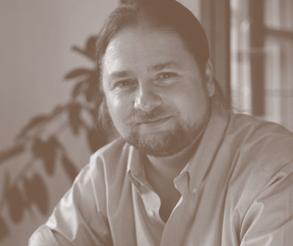
s è laureato alla columbia university e alla scuola di cinema Famu di Praga, dove è preside dal 2008. si è specializzato nell’insegnamento di sceneggiatura e drammaturgia sia nella Repubblica ceca che negli stati uniti e ha lavorato a livello internazionale come sceneggiatore e script doctor. Ha diretto anche la Famu International, dove ha maturato un’importante esperienza nel lavoro con gruppi di studenti provenienti da tutto il mondo. Pavel Jech is a graduate of columbia university as well as of Famu, where he has served as dean since 2008. Pavel has broad teaching experience in scriptwriting and dramaturgy, both in the czech Republic and in the us, and has worked internationally as a screenwriter and script doctor. Prior to taking on his latest post he was chair of Famu International, where he gained extensive experience in working with teams of international students.
237 years / 237 anni
di / by Ioana mischie - Romania
è una commedia sul dolore, un dramma sulla felicità. Gli abitanti di un piccolo paese, che avevano ricevuto dei sussidi finanziari su false richieste d’invalidità, stanno per essere scoperti da una commissione mandata dal governo. accettando la sfida, diventano invece un modello, un esempio di impresa per l’intera società.
the celluloid man / l’uomo di celluloide
di / by alessandro Padovani - Italia / Italy
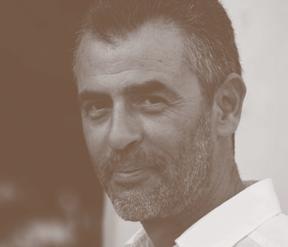
nicos PanayotoPoulos scrittore e sceneggiatore. è nato ad atene nel 1963. Dal 1992 si è dedicato alla professione di scrittore e sceneggiatore. Insegna sceneggiatura in varie scuole di regia, seminari e workshop e di recente anche presso il Dipartimento cinematografico dell’accademia di Belle arti dell’università di atene. Ha scritto le sceneggiature di cortometraggi, serie tv e film. Fra gli altri, ha co-sceneggiato O vasilias (2002) e agrypnia (2005) entrambi diretti da n. Grammatikos, O adelfos mou ki ego (1998, diretto da A Kokkinos), e Gamilia narki (2003, diretto da D. Indares). Ha scritto quattro romanzi: Ziggy from marfan (1998, pubblicato in Italia da crocetti con il titolo di Polvere di stelle), the Gene of Doubt (Polis ed.1999, pubblicato in Italia da Ponte alle Grazie con il titolo di Il gene del dubbio), Icon (Polis ed. 2003) e the children of cain (metaixmio ed. 2011) che sono stati tradotti e pubblicati in diversi paesi europei. Dal 2013 è Head of studies al mFI (mediterranean Film Institute). novelist and screenwriter. Born in athens in 1963. since 1992 he makes a living as a novelist and screenwriter. He has been teaching screenwriting in several Film schools, seminars and workshops, and, lately, at the Film Department of the school of Fine arts at autH. He has written screenplays for short films, tv series and feature films. He co-wrote O vasilias (The King 2002) and agrypnia (the Wake, 2005) both directed by n. Grammatikos, O adelfos mou ki ego (my brother and I, 1998 directed by A Kokkinos), and Gamilia narki (totally married 2003, directed by D. Indares), among others. He has written four novels - Ziggy from marfan - the Diary of an alien (1998), the Gene of Doubt (Polis ed. 1999), Icon (Polis ed. 2003) and the children of cain (metaixmio ed. 2011) - translated and published in several european countries. since 2013 he is Head of studies at mFI (mediterranean Film Institute).
237 Years is a comedy about sorrow and a drama about happiness: a community of villagers, all of whom have been receiving additional financial aid for fraudulently claiming to have disabilities, is closed to being unmasked by a government enquiry team. Rising to the challenge, they become, instead, a model example of enterprise for the whole society.
La vita di un regista ammalato di tumore al cervello, che rievoca il suo passato attraverso le donne della sua vita.
the life of a film director affected by a brain cancer, who digs in his past through women of his life.
the convention / la tradiZione
di / by milada mašinová - Repubblica ceca / czech Republic
Dopo la sfortunata perdita della sorella, la giovane Ludmila cerca di cambiare vita e di costruirsene una migliore. ma purtroppo un mondo fatto di tradizioni ormai radicate, di relazioni corrotte e di sentimenti perversi non le è di nessun aiuto.
after unfortunate loss of her sister, young Ludmila is trying to pursue new and more beautiful life. sadly, the world of twisted traditions, corrupted relationships and perverted feelings is extremely unhelpful.
di / by Bojana Vidosavljević - Bosnia ed Erzegovina / Bosnia & Herzegovina
5 aprile 1992. La guerra è già iniziata in alcune parti della Bosnia ed Erzegovina. Kosta Dimitrijević, ufficiale delle forze armate della Jugoslavia, deve prendere una decisione fondamentale: stare a sarajevo e lasciare la vita militare a cui si è dedicato da sempre, oppure rimanere nell’esercito e dal giorno dopo diventare nemico dei suoi amici e dei suoi familiari. It’s 5th of april, 1992. War has already started in some parts of Bosnia & Herzegovina. Kosta Dimitrijević, officer of Yugoslavian national army, has to make a decision of his life: to leave the army of a country he has been dedicated to for his whole life and stay in sarajevo, or to stay in the army which will tomorrow become the enemy of his friends and family.
shame / vergogna
di / by verica nedeska-trajkova - Repubblica ceca / czech Republic
vergogna come la forza che muove la vita dei normali esseri umani. una storia sulla relazione amorosa che lega una madre a un figlio, dove il loro amore finisce con l’essere causa di morte.
shame, as the moving force in the life of ordinary human beings. a story about the loving relationship between a mother and a son, where their love ends up causing death.
side roads / strade secondarie
di / by Bojana Babić - Serbia
Dopo aver scontato la pena in carcere, un padre fa di nascosto un giro in moto con il figlio nella città dov’è nato. nonostante sia inseguito dalla polizia, egli riesce a riconquistare la fiducia del figlio e a ristabilire finalmente lo stretto legame negato loro da troppo tempo.
di / by Lorenzo Zeppegno – Italia / Italy
qualcosa di misterioso è accaduto nel passato di alfio, ma non riesce a ricordarlo. Ha sofferto per la sparizione della sua amante monica, un’ex prostituta. un giorno monica riappare nella sua casa. alfio inizia a indagare su quello che è accaduto nella vita della ragazza, ma quando monica scompare nuovamente, fa di tutto pur di ritrovarla, fino a confondere il passato e a perdere ogni contatto con il presente.
di / by martina svobodová - slovacchia / slovakia
quando un giovane uomo irlandese appare in un villaggio di montagna della slovacchia, dove il tempo si è fermato, inizia un viaggio alla ricerca dell’identità e della riconciliazione con il mondo interiore. è una storia dove la tradizione, la potenza della natura e il mondo etereo della magia devono fare conti con cambiamenti economici e il nuovo ordine, dove la potenza del mondo materiale e del denaro cambiano le regole, le persone e il loro modo di pensare.
after having done his time in prison, the father secretly takes his son on a motorcycle ride to his hometown.
Regardless of being chased by the police, he manages to regain his son’s trust, finally establishing the close bond they were denied for too long.
something misterious has happened in alfio’s past, but he can’t remember. He suffered for the disappearance of his lover: monica, an ex-prostitute. Oneday, however, she reappears in his house. alfio begins to investigate about what has happened in their life, and when he loses monica again, he tries everything to find her, misunderstanding the past and losing contacts with the present.

tHanOs anastOPOuLOs ČEDOMIR KOLAR GIanFRancO ROsI
When a young Irish man appears in a slovak mountain village where time has stopped years ago, several journeys of searching for one’s identity, for inner reconciliation begin. With the stream is a story where the world of tradition, living powerful nature and shades of ethereal magic and its habitants need to cope with economical changes and the new order where the powerful of this world and their money change the rules, the characters, beliefs.

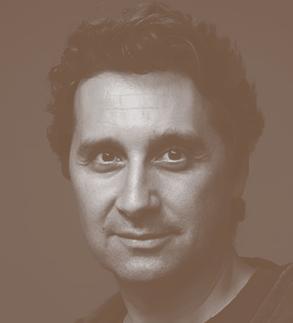
Regista, produttore. è nato ad atene. si è laureato in filosofia all’università di Ioannina (Grecia) e ha conseguito il dottorato all’università Parigi I e alla École des Hautes Études en sciences sociales. nel 2004 il suo primo lungometraggio atlas - Olos to varos tou kosmou viene selezionato al festival di Rotterdam. nel 2008 Diorthosi il suo secondo lungometraggio viene selezionato al Forum di Berlino. Il film viene invitato in più di 60 festival internazionali (fra cui New Directors New Films - New York, Buenos Aires - BAFICI, Karlovy Vary, Sarajevo, montreal, IndieLisboa, vancouver, La Rochelle), vince numerosi premi, è il candidato per la Grecia agli Oscar come miglior film in lingua straniera e viene nominato agli european Film academy awards. nel 2010 ha coprodotto Homeland il film di debutto di syllas tzoumerkas che viene selezionato alla settimana della critica di venezia. nel 2011 ha coprodotto amnesty, il primo lungometraggio di Bujar alimani che viene selezionato al Forum di Berlino e vince il Premio cicae. nel 2013 I Kori (La figlia) il suo terzo lungometraggio, viene selezionato al Forum della Berlinale e ai “Premi di stato del cinema greco” dove vince come miglior regia, miglior sceneggiatura e miglior fotografia. Il film ha avuto anche la sua anteprima nordamericana al festival di toronto.
Film Director, Producer. Born in athens. He studied Philosophy at the university of Ioannina (Greece) and made his post graduate studies at the university of Paris I and at the École des Hautes École en sciences sociales. In 2004 his first feature film atlas - Olos to varos tou kosmou (atlas - all the Weight of the World) premiered at the Rotterdam Film Festival. In 2008 his second feature film Diorthosi (correction) premiered at the Berlin Film Festival (Forum). the film was invited to over 60 film festivals (including new Directors new Films - new York, Buenos Aires - BAFICI, Karlovy Vary, Sarajevo, Montreal, IndieLisboa, Vancouver, La Rochelle) and won numerous awards. It was selected as Greece’s entry for the Foreign Language category academy awards and was also nominated for the european Film academy awards. In 2010 he co-produced the debut feature film Homeland by syllas tzoumerkas that made its premiere at the International critics’ Week section of the venice Film Festival. One year later in 2011 he also co-produced the debut feature film amnesty by Bujar alimani who premiered at the Berlin Film Festival (Forum) and won the c cae award. In 2013 thanos anastopoulos directed his third feature film I Kori (the Daughter). the film premiered at the Berlin Film Festival (Forum), won Best Directing, Best screenplay and Best Photography at the Hellenic Film academy awards and made its north american premiere at the toronto Film Festival.
2004 atlas - Olos to varos tou kosmou 2008 Diorthosi 2013 I Kori
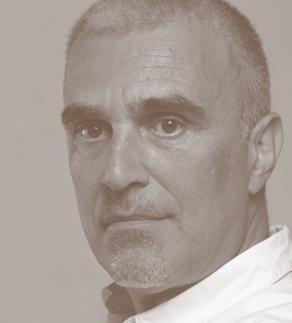
Produttore. è nato nella ex-Jugoslavia, a Rijeka (Fiume) in croazia, sulla costa adriatica. si è diplomato in produzione cinematografica all’accademia delle arti drammatiche di Belgrado. Dal 1991 ha iniziato a lavorare come produttore per noé Productions a Parigi. Fra film da lui prodotti in quel periodo: Before the Rain (Prima della pioggia) di milcho manchevski (1994), afrique, mon afrique... e Kini & Adams di Idrissa Ouedraogo (1997), come mi vuoi (1997) di carmine amoroso, train de vie (1998) di Radu mihaileanu, Beškempir (1998) e maimil (2001) di aktan abdykalykov, no man’s Land (2001) di Danis Tanović e l’episodio, diretto sempre da Tanović, del film collettivo 11’09”01 september 11 (11 settembre 2001) prodotto da Galatée Films e studiocanal. nel 2003 crea una nuova società di produzione a Parigi, la A.S.A.P. Films, assieme al regista Danis Tanović e al produttore marc Baschet. nel 2005, la a .s.a .P. Films produce L’enfer di Danis Tanović, da una sceneggiatura di Krzysztof Piesiewicz scritta assieme a Krzysztof Kieślowski, e Dobro uštimani mrtvaci (2005) di Benjamin Filipović. Seguono, nel 2006, si le vent soulève les sables di marion Hänsel, Besa di Srđan Karanović nel 2008 e triage di Danis Tanović nel 2009. Nel 2010 vengono prodotti Womb di Benedek Fliegauf, svet-ake di aktan abdykalykov, cirkus columbia di Danis Tanović e noir Océan di marion Hänsel. Fra i suoi ultimi film La tendresse di marion Hänsel, Epizoda u životu berača željeza (Un episodio di un raccoglitore di ferro, 2013) di Danis Tanović e il film di debutto di Ritesh Batra the Lunchbox (2013). è stato candidato all’Oscar (Prima della pioggia di milcho manchevski) e poi vincitore del premio Oscar come produttore per no man’s Land di Danis Tanović. Dal 2004 è membro del consiglio della european Film academy.
Producer. Čedomir Kolar was born in former Yugoslavia, in the city of Rijeka on the Adriatic coast of Croatia. He graduated in film production at the Belgrade academy of Dramatic arts. since 1991, he has been acting as producer for noé Productions in Paris. His credits include Before the Rain by milcho manchevski (1994), afrique, mon afrique... (africa my africa) and Kini & Adams by Idrissa Ouedraogo (1997), come mi vuoi (as You Like me, 1997) by carmine amoroso, train de vie (train of Life, 1998) by Radu mihaileanu, Beškempir (the adopted son, 1998) and maimil (the chimp, 2001) by aktan abdykalykov, no man’s Land (2001) by Danis Tanović and Danis Tanović’s short film in the collection of films 11’09”01 september 11, produced by Galatée Films and studiocanal. In 2003 he started the new Paris based production entity, a s a .P. Films, together with the director Danis Tanović and his fellow producer Marc Baschet. In 2005, A.S.A.P. Films produced the new feature by Danis Tanović, L’enfer (Hell), written by Krzysztof Piesiewicz in collaboration with the late Krzysztof Kieślowski, and Dobro uštimani mrtvaci (Well Tempered Corpses, 2005) by Benjamin Filipović. This was followed by Marion Hänsel’s si le vent soulève les sables (Sounds of Sand) in 2006, Srđan Karanović’s Besa in 2008 and Danis Tanović’s triage In 2010 the films Womb by Benedek Fliegauf, svet-ake (the Light thief, 2010) by aktan abdykalykov, cirkus columbia by Danis Tanović (2010), and noir Océan (Black Ocean, 2010) by marion Hänsel were produced. among his latest films are La tendresse by marion Hänsel, Epizoda u životu berača željeza (an Episode In the Life of an Iron picker, 2013) by Danis Tanović and Ritesh Batra’s debut feature the Lunchbox (2013). Čedomir Kolar is an Academy Award nominee (Before the Rain by milcho manchevski) and academy award winning producer for no man’s Land by Danis Tanović as well as a member of the Board of the European Film academy (since 2004).
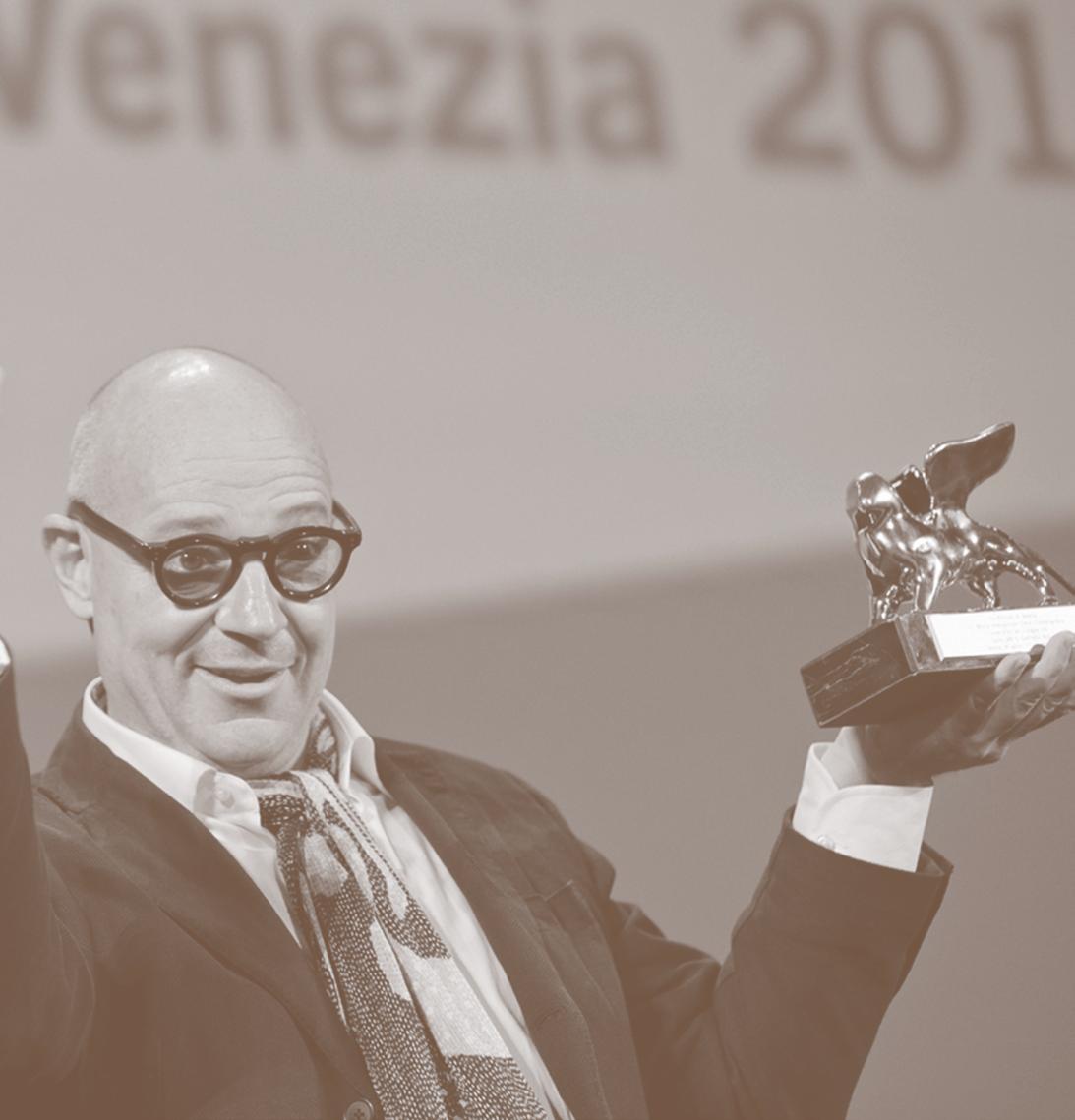

è un regista italiano, direttore della fotografia, produttore e sceneggiatore. nato ad asmara, in eritrea, di nazionalità italiana e statunitense, dopo aver frequentato l’università in Italia nel 1985 si trasferisce a new York e si diploma presso la new York university Film school. In seguito a un viaggio in India, produce e dirige il suo primo mediometraggio, Boatman, presentato con successo a vari festival internazionali tra i quali il sundance Film Festival, il Festival di Locarno e il toronto International Film Festival. nel 2001 realizza afterwords presentato alla mostra del cinema di venezia. nel 2008, il suo primo lungometraggio Below sea Level, girato a slab city in california, vince il premio Orizzonti Doc alla mostra di venezia. Il film si aggiudica anche il Grand Prix e il Prix des Jeunes al “cinéma du Réel” del 2009, il premio per il miglior film allo “One World Human Right Film Festival” di Praga, ed è nominato come miglior documentario agli european Film awards 2009. nel 2010 gira il lungometraggio el sicario – Room 164, film-intervista su un ex killer dei cartelli messicani del narcotraffico e vince il Fipresci award alla mostra di venezia e il premio Doc/ It come migliore documentario dell’anno. Ha diretto varie Pubblicità Progresso e alcuni cortometraggi. come freelance, ha lavorato come direttore della fotografia in diversi documentari e ha realizzato filmati pubblicitari di interesse sociale e per l’industria. è stato guest lecture presso la new York university Film school, la suPsI di Lugano e la HeaD di Ginevra. nel 2013 il suo sacro GRa ha vinto il Leone d’oro come miglior film alla 70. mostra Internazionale d’arte cinematografica di venezia, primo documentario ad aggiudicarsi il massimo riconoscimento nei settant’anni di storia del festival veneziano.
Gianfranco Rosi is an Italian director, cinematographer, producer and screenwriter. Born in asmara, eritrea, and now a citizen of Italy and the united states, Rosi moved to new York in 1985 after finishing university in Italy. after graduating from new York university Film school, he traveled throughout India and began work on his first medium-lenght film, Boatman, which he produced and directed. the film won awards at numerous international film festivals, including sundance, the Locarno Festival, and the toronto International Film Festival. In 2001 he directed afterwords, which premiered at the venice Film Festival. In 2008 his first full-lenght film Below sea Level, shot in slab city (california), won the Orizzonti Doc prize at the venice Film Festival. the film also won the Grand Prix and the Prix des Jeunes at the “cinéma du Réel” festival in 2009, the prize for Best Film at the “One World Human Right Film Festival” in Prague, and it was nominated for Best Documentary at the 2009 european Film awards. In 2010 he shot el sicario – Room 164, a film-interview with a former assassin for a mexican drug cartel, which won the venice Film Festival’s Fipresci Prize and the Doc/It award for Best Documentary of the year. He has directed various “Pubblicità Progresso” spots, worked freelance as director of photography on various documentaries, and was guest lecturer at the nYu Film school, at suPsI in Lugano, and HeaD in Geneva. In 2013, at the 70th venice International Film Festival his documentary sacro GRa won the Golden Lion award for Best Film. It was the first documentary film to win the award at the venice Film Festival.
1993 Boatman mm / ml doc 2001 afterwords cm / sf doc 2008 Below sea Level doc.; Premi / awards: mostra del cinema di venezia – Premio Orizzonti Doc / venice FF – Orizzonti Doc award; cinéma du Réel FF - Grand Prix, Prix des Jeunes 2010 el sicario – Room 164 doc.; Premi / awards: mostra del cinema di venezia – Premio Fipresci / venice FF – Fipresci award 2012 tanti futuri possibili. con Renato nicolini cm / sf doc 2013 sacro GRa doc.; Premi / awards: mostra del cinema di venezia – Leone d’oro / venice FF – Golden Lion
when east meets west
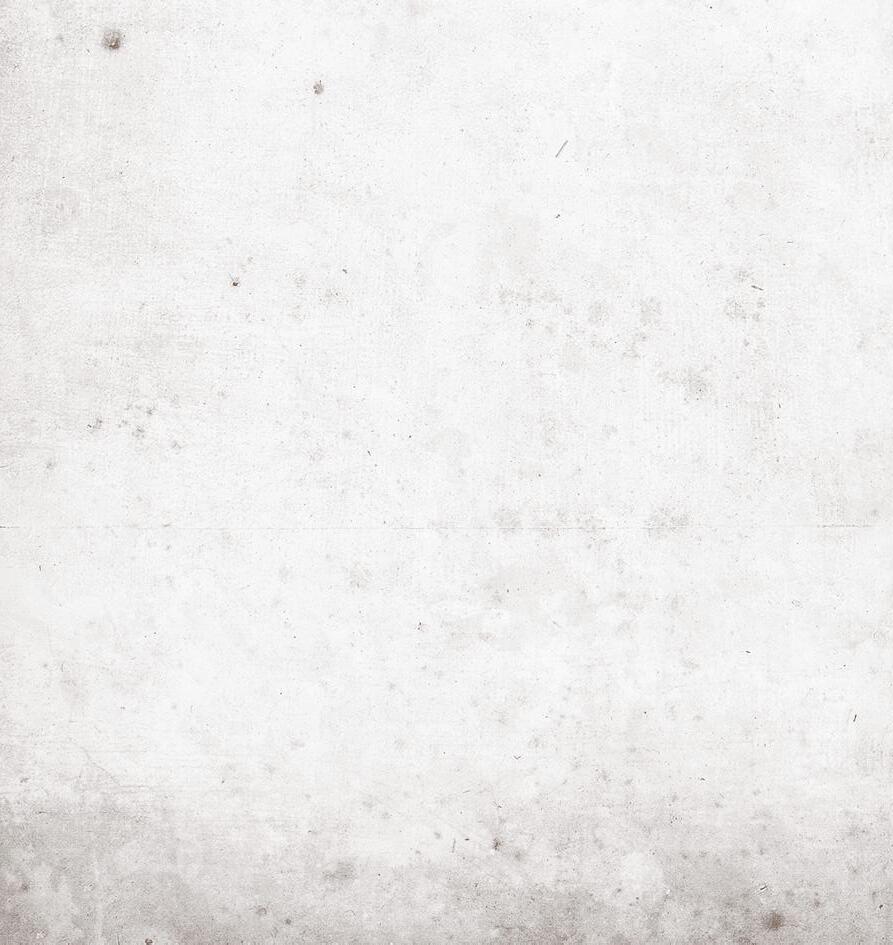
ITALIAN SCREENINGS
indeBito
andrea segre
la mia classe
Daniele Gaglianone
Piccola Patria alessandro Rossetto
il treno va a mosca
Federico Ferrone, michele manzolini
premIo corso salanI – IV edIzIone corso salanI award – fourth edItIon
finalista III edizione (2013)
finalist third edition (2013) aishiteru my love stefano cattini
film vincitori III edizione (2013) third edition winners (2013) arctic sPleen Piergiorgio casotti
il mondo di nermina (work in progress) vittoria Fiumi

finalisti 2014 / 2014 finalists FRASTuoNo Davide maldi
LET’S Go antonietta De Lillo, Giovanni Piperno
NELLo alessandra Locatelli
SToRIE dEL doRMIVEGLIA Luca magi
VoGLIo doRMIRE coN TE mattia colombo
un “ponte” tra le due europe: è una definizione del Friuli venezia Giulia che viene ripetuta così spesso da correre il rischio di diventare un “modo di dire”. Per noi, certamente, non lo è: in questi anni la nostra Regione, con WHEN EAST MEETS WEST, è stata davvero il luogo di incontro tra gente di cinema che vuole condividere delle storie, che ha bisogno di trovare nuove collaborazioni, e che, spesso, cerca un nuovo pubblico. un ponte virtuale, il nostro, ma che come gli altri, ponti “reali”, prova ad unire, si dà da fare per rendere più facili gli scambi di idee, si impegna per favorire lo sviluppo di nuovi progetti. tutti speriamo che il 2014 sia l’anno della ripresa, dopo una delle peggiori crisi economiche che l’europa ricordi. ma tutti sappiamo, anche, che dobbiamo trovare delle strade nuove per evitare che una crisi del genere possa ripetersi. se guardiamo a WHEN EAST MEETS WEST, a questo piccolo ponte che si apre per la quarta volta a trieste, ci viene l’idea (un po’ presuntuosa, certo) che è anche di qui che possono passare le strade nuove.
un’idea del resto, che è piuttosto condivisa: quest’anno i progetti presentati per la selezione sono stati 200 e sono arrivati da 29 paesi. non erano mai stati così tanti.
ma vi dobbiamo confessare che a noi, e spero non soltanto a noi, piacciono molto i ponti affollati.
the Friuli venezia Giulia Region has been described as a “bridge” between Western and eastern europe so many times that there is a danger of this becoming a meaningless cliché
naturally, we are convinced that it isn’t! Indeed, over the years WHEN EAST MEETS WEST has proved a genuine opportunity for cinema industry insiders to meet and share stories; it has facilitated the search for new collaborations and, often, for new audiences.
What we offer is a virtual bridge of course, which, like a real one, tries to unite people, makes the exchange of ideas easier, and is committed to launching and developing new projects.
We are all hoping that 2014 will be the year of recovery, after one of the worst economic crises europe can remember. But we are also acutely aware that we need to find new paths to prevent a similar crisis from ever happening again. If we look at WHEN EAST MEETS WEST - this little bridge opening in trieste for the fourth time - we feel confident (and really rather proud) that new paths can originate here too. But then this is what the 200 applicants from 29 countries must have thought too - we had a record number of applications this year. However, we must confess that we like crowded bridges very much!
Organizzato dal Fondo per l’Audiovisivo del Friuli Venezia Giulia, assieme a Trieste Film Festival, in collaborazione con EAVE, Antenna MEdIA Torino Maia workshops, Eurimages e con il sostegno di MEdIA Programme, direzione Generale per il cinema - MiBAcT, cEI (central European Initiative), confartigianato udine e Regione Autonoma del Friuli Venezia Giulia, l’edizione 2014 di WHEN EAST MEETS WEST prevede tre giorni dedicati a produttori e decision makers Italiani, dell’europa Orientale e del Benelux, olanda Belgio e Lussemburgo. L’idea, anche quest’anno, è quella di dare vita a un appuntamento capace di creare un forte legame tra le regioni e paesi coinvolti. attraverso tavole rotonde, masterclass e case-study, si riuniscono a trieste professionisti di diversi paesi, rendendo così il Friuli venezia Giulia un punto di riferimento per i produttori dell’est europa che vogliono avviare collaborazioni con imprese occidentali, e viceversa. Insieme a produttori di film e documentari provenienti da albania, Belgio, Bosnia ed erzegovina, Bulgaria, estonia, Georgia, Italia, Lituania, Lussemburgo, macedonia, Olanda, Repubblica ceca, Romania, turchia e ungheria, saranno presenti broadcaster, distributori e rappresentanti di fondi e mercati, così da presentare l’intero panorama di possibilità produttive e distributive, nonché le risorse finanziarie disponibili. siamo sicuri che l’edizione 2014 di WHEN EAST MEETS WEST confermerà la grande partecipazione e l’interesse degli addetti ai lavori, consolidando così quella che, a nostro parere, è un’occasione d’incontro indispensabile per lo sviluppo delle imprese audiovisive della nuova europa.
Organised by the Friuli Venezia Giulia Audiovisual Fund with the Trieste Film Festival in collaboration with EAVE, Antenna MEdIA Torino Maia workshops, Eurimages and with the support of MEdIA Programme, direzione Generale per il cinema - MiBAcT, cEI (central European Initiative), confartigianato udine and the Regione Autonoma Friuli Venezia Giulia, the 2014 edition of WHEN EAST MEETS WEST will be a three-day event dedicated to producers and decision-makers from Italy, eastern europe and the Benelux countries - Belgium, Holland and Luxembourg
Our aim this year is again to create an event able to generate close ties between the participating regions and countries. cinema professionals from many different geographical backgrounds will gather in trieste for a series of round-tables, master-classes and case studies organised to facilitate opportunities for collaborations between eastern european producers and Western companies, and vice-versa. this makes the Friuli venezia Giulia region a unique point of reference for such initiatives. Film and documentary producers from albania, Belgium, Bosnia & Herzegovina, Bulgaria, estonia, Georgia, Italy, Lithuania, Luxemburg, macedonia, Holland, the czech Republic, Romania, turkey and Hungary will meet with broadcasters, distributors and representatives of funds and markets, so as to present the whole range of production and distribution opportunities, as well as financial resources, available to the industry. We are confident that the 2014 edition of WHEN EAST MEETS WEST will again prove very popular with industry insiders and consolidate what is, in our opinion, an essential initiative for the development of audiovisual companies of the new europe.
unDue DeBt
andrea segre
“La crisi di oggi prima che economica è identitaria. è separazione, disorientamento. Le culture europee sono state svendute all’omologazione del consumo e alla corsa alla ricchezza. c hanno fatto credere che la liberazione dalla povertà materiale dovesse coincidere con la fuga da se stessi. vivere oggi di nuovo la povertà senza se stessi è una vertigine insostenibile. Il nostro documentario è un tempo dedicato ad ascoltare l’assenza di noi stessi. è la consapevolezza di vivere in-debito di aria, di senso, di prospettiva. Per farlo abbiamo vagato come flâneur, come viandanti nel luogo simbolo della crisi, la Grecia indebitata: seguendo le parole, pensieri e la musica dei rebetes cantanti del rebetiko, il blues ellenico ... I loro concerti e le loro parole riempiono le taverne notturne di atene e salonicco, sfiorano le scritte sui muri, ascoltano il mare dei porti e incontrano il cammino di vinicio capossela, musicista e viandante che intreccia le sue note con i pensieri del suo diario di viaggio, il tefteri così la Grecia diventa l’europa, la sua crisi la nostra e il rebetiko il canto vivo di un’indebita e disperata speranza.” (a. segre) Presentato all’ultimo Festival di Locarno.
“today there is an identity crisis that prevails over the economic one. It is about separation, disorientation. european cultures have been sold off to standardized consumption and the race to get rich. they have made us believe that freedom from material poverty should coincide with escaping from ourselves. Reliving poverty today, without us being self-conscious, is an unbearable instability. Our documentary consists of time cut out to listen to our absence. It is the awareness that we live with a debt of air, meaning and perspective. In order to make it, we roamed around like flâneurs, like wanderers in a symbolic place of the crisis - indebted Greece – following the words, thoughts and music of the rebetes, the singers of rebetiko a kind of Hellenic blues … their concerts and their words fill the taverns in athens and salonica at night, they graze the writing on the walls, they listen to the sea in the harbours and cross the path of vinicio capossela, a musician and wanderer who weaves his notes with thoughts from his travel diary, the tefteri so Greece becomes europe, its crisis becomes ours and rebetiko becomes the living song of an indebted and desperate hope.” (a segre) the film was screened at the latest Locarno Film Festival.
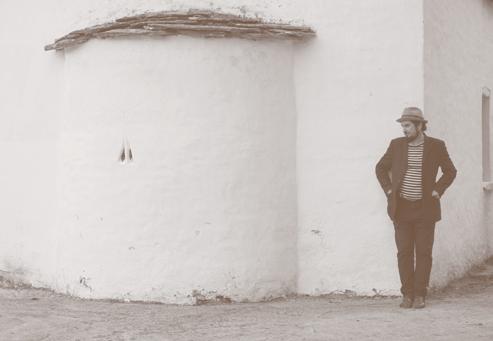
Italia / Italy 2013, HD, col., 87’ v.o. greca - italiana / Greek - Italian o.v.
sceneggiatura / screenplay: Vinicio capossela, Andrea Segre. Fotografia / Photography: Luca Bigazzi. montaggio editing: Sara Zavarise. suono sound: Remo ugolinelli, Adriano di Lorenzo. Interpreti / cast: Vinicio capossela, Theodora Athanasiou, Bufos Puppet Theatre (Anneta Stefanopoulou, Agni Papadeli-Rossetou), Giorgis christofilakis, Keti dali, Pantelis Hatzikiriakos, dimitris Kontogiannis, Vasilis Korakakis, Stefanos Magoulas, dimitris Mistakidis, Manolis Pappos, Nikos Strouthopoulos, Timoleon Tzanis, Evgenios Voulgaris, Panagiotis Xanthopoulos.
Produzione / Produced by: Jolefilm.
coproduzione co-produced by: La cùpa.
In collaborazione con In collaboration with: Rai cinema.
Distribuzione per l’Italia / Distributed in Italy by: Nexo digital.

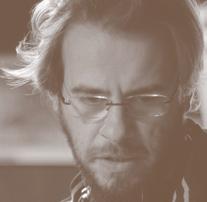
andrea segre
è nato nel 1976, a Dolo (venezia), Italia. andrea segre was born in 1976 in Dolo (venice), Italy. filmografia scelta / selected filmography 2003 marghera canale nord doc. 2004 Dio era un musicista doc. 2008 come un uomo sulla terra doc. 2011 Io sono Li 2012 mare chiuso doc. 2013 Indebito doc.; La prima neve
mY cL ass
daniele gaglianone
ITALIAN ScREENINGS
un attore impersona un insegnante che dà lezioni di italiano a una classe di stranieri che mettono in scena loro stessi. sono extracomunitari che vogliono imparare l’italiano, per avere il permesso di soggiorno, per integrarsi, per vivere in Italia. arrivano da diversi luoghi del mondo e ciascuno porta in classe il proprio mondo. ma durante le riprese accade un fatto per cui la realtà prende il sopravvento. Il regista dà lo “stop”, ma l’intera troupe entra in campo: ora tutti diventano attori di un’unica vera storia, in un unico film di ‘vera finzione’, La mia classe.
Presentato alle “Giornate degli autori” dello scorso anno.
“quando valerio mi ha detto guardandomi negli occhi: ‘Gaglia, nel film ci devi essere anche tu’, l’ho mandato a quel paese. ma poi ho capito che aveva ragione, che non potevo dire a un altro che cosa il regista del film doveva dire e fare, dovevo letteralmente metterci la faccia. Fare questo film è stata un’esperienza unica: tutti i giorni ripetevo sul set che stavamo rischiando grosso ma per qualcosa che ne valeva la pena, perché il film o funzionava o era inguardabile. non c’erano vie di mezzo.”
(D. Gaglianone)
an actor plays the part of a teacher giving Italian lessons to a class of foreigners who are not acting. they are immigrants, both in real life and on film, who want to learn Italian in order to have official documents and to integrate into Italian society. they come from different parts of the globe and each one of them carries their own, personal world into the class. During shooting something happens, and from this point onwards reality has to take over from the fictional world. When the director stops the action, the whole crew comes into play: now each person becomes an actor of one real story, in a single, ‘true fictional’ film, my class. the film was in the official selection at the latest “venice Days”.
“When valerio looked into my eyes and said: ‘Gaglia, you have to be in the film too’, I sent him to hell. But then I realized he was right, that I couldn’t tell someone else what the director of the film had to say and do. making this film was a unique experience: every day I repeatedly said that we were risking arrest, but for something that was worthy, because the film would either work or be unwatchable. there was no middle ground.”
(D. Gaglianone)

Italia / Italy
2013, HD, col., 92’ v.o. italiana / Italian o.v.
sceneggiatura / screenplay: Gino clemente, daniele Gaglianone, claudia Russo. Fotografia / Photography: Gherardo Gossi. montaggio editing: Enrico Giovannone. suono sound: Stefano campus, Vito Martinelli. scenografia art Director: Laura Boni. costumi / costume Designer: Irene Amantini.
Interpreti cast: Valerio Mastandrea, Bassirou Ballde, Mamon Bhuiyan, Gregorio cabral, Jessica canahuire Laura, Metin celik, Pedro Savio de Andrade, Ahmet Gohtas, Benabdallha oufa, Shadi Ramadan, Easther Sam Shujan Shahjalal, Ljudmila Temčenk, Moussa Toure, Issa Tunkara, Nazim uddin, Mahbobeh Vatankhah, Remzi Yucel. Produzione / Produced by: Axelotil Film, Kimerafilm, Relief. coproduzione co-produced by: Rai cinema. con il sostegno di supported by: MIBAc - direzione generale per il cinema
Distribuzione per l’Italia / Distributed in Italy by: Pablo distribuzione Indipendente.
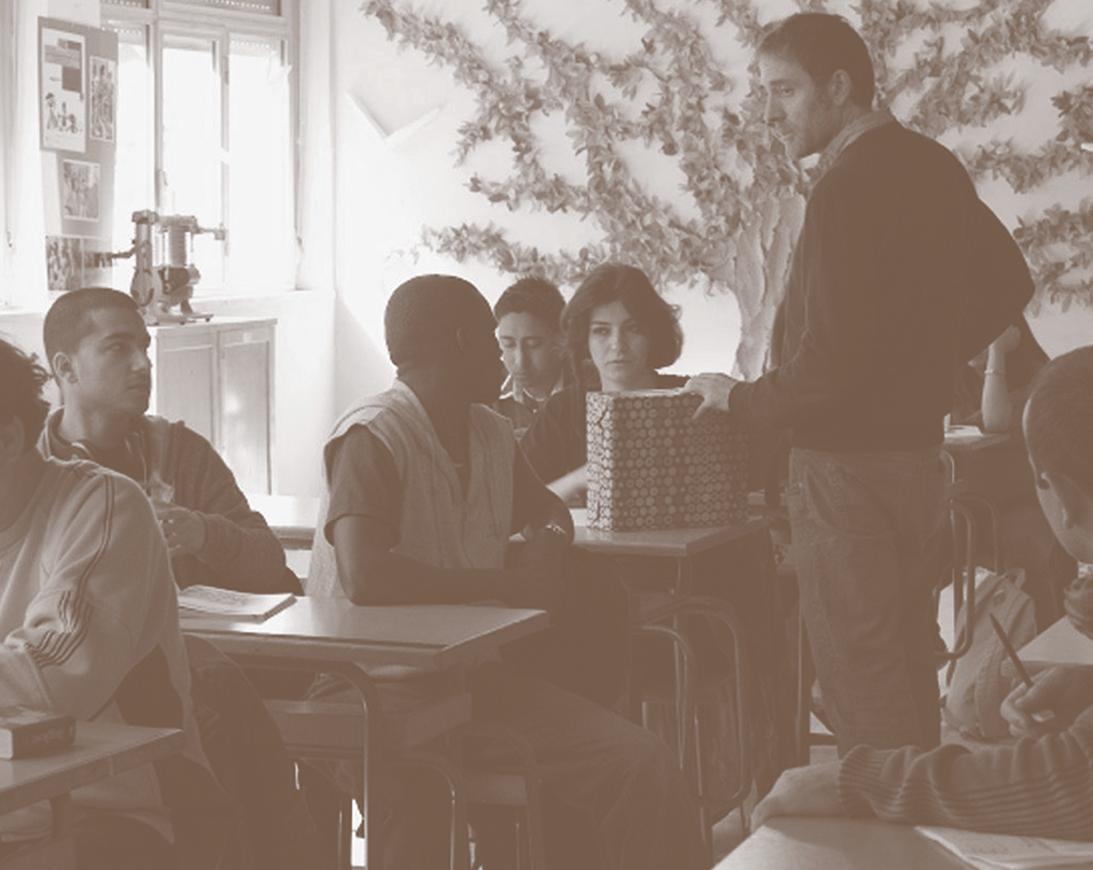
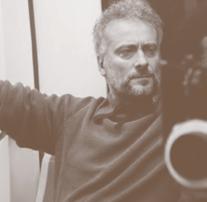
è nato nel 1966 ad ancona, Italia
Daniele Gaglianone was born in 1966 in ancona, Italy.
filmografia scelta / selected filmography
2001 I nostri anni 2004 nemmeno il destino 2008 Rata nece biti - La guerra non ci sarà doc. 2009 Pietro 2011 Ruggine 2013 La mia classe
smaLL HOmeL anD
alessandro rossetto
ITALIAN ScREENINGS
Due ragazze, un’estate calda e soffocante, il desiderio di andare via da un piccolo paese di provincia. Luisa è piena di vita, disinibita, trasgressiva; Renata è oscura, arrabbiata, bisognosa d’amore. Le vite delle due giovani raccontano la storia di un ricatto, di un amore tradito, di una violenza subita: Luisa usa Bilal, il suo fidanzato albanese, Renata usa il corpo di Luisa per muovere fili della propria vendetta. entrambe vogliono lasciare la piccola comunità che le ha cresciute, tra feste di paese e raduni indipendentisti, famiglie sfinite e nuove generazioni di migranti presi di mira da chi si sente sempre minacciato. Luisa, Renata e Bilal rischieranno di perdersi, di perdere una parte preziosa di sé, di perdere chi amano, di perdere la vita. Piccola Patria era all’ultima mostra del cinema di venezia, nella sezione “Orizzonti”.
“sarebbero potute accadere in una qualsiasi provincia del pianeta, ma ho cercato nel nordest italiano le storie che compongono il racconto di Piccola Patria. Lì ho visto fondersi tra loro i personaggi, i volti, quelle atmosfere, la lingua e le dinamiche personali e di gruppo. Il mio approccio è stato fisico: ho voluto creare un vortice estivo che, sulla base di una sceneggiatura pronta a essere distrutta, legasse improvvisazione e osservazione, ricerca e studio dei personaggi.” (a Rossetto)
two young women, a hot and stifling summer, the desire to get away from a small provincial town. Luisa is full of life, uninhibited, unconventional; Renata is dark, angry, in need of love. the lives of the two women tell a story of blackmail, of betrayed love, of violence: Luisa uses Bilal, her albanian boyfriend, Renata uses Luisa’s body to pull the strings of her vendetta. Both want to leave the small community that raised them, among village festivals and indipendence gatherings, exhausted families and new generations of migrants targeted by those still feeling threatened. Luisa, Renata and Bilal will run the risk of losing themselves, of losing a precious part of themselves, of losing the people they love, of losing their life.
Piccola Patria premiered at the latest venice Film Festival, in the “Orizzonti” section.
“the setting could have been any small town on the planet, but it was in the northeast of Italy that I found the tales that make up the storyline of Piccola Patria. It was there, in that atmosphere, that I saw merge the language, the faces and characters, the personal and group dynamics. my approach to the film has been very physical: I wanted to create a summer vortex that, on the basis of a screenplay ready to be torn up, would bring together improvisation and observation, research and study of characters.” (a . Rossetto)
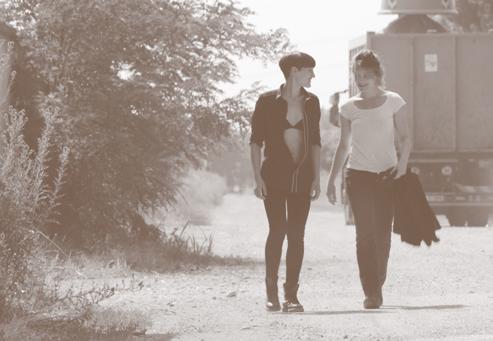
Italia / Italy
2013, HD, col., 111’
v.o. italiana - albanese - dialetto veneto / Italian - albanian - veneto dialect o.v.
sceneggiatura / screenplay: caterina Serra, Alessandro Rossetto, Maurizio Braucci. Fotografia / Photography: daniel Mazza. montaggio editing: Jacopo quadri. musica music: Paolo Segat, Alessandro cellai, Maria Roveran. suono sound: Havir Gergolet, daniel covi. scenografia art Director: Renza Mara calabrese. costumi / costume Designer: Anna Lazzarini.
Interpreti cast: Maria Roveran, Roberta da Soller, Vladimir doda, diego Ribon, Lucia Mascino, Mirko Artuso, Nicoletta Maragno, Mateo Çili, Giulio Brogi. Produzione / Produced by: Arsenali Medicei. coproduzione co-produced by: Jump cut.
con il sostegno di supported by: MIBAc - direzione Generale per il cinema, Regione Veneto - Fondo per il cinema e l’Audiovisivo, BLS - Business Location Südtirol Alto Adige, Trentino Film commission, Friuli Venezia Giulia Film commission, Programma Media dell’unione Europea. Distribuzione per l’Italia / Distributed in Italy by: Istituto Luce- cinecittà.
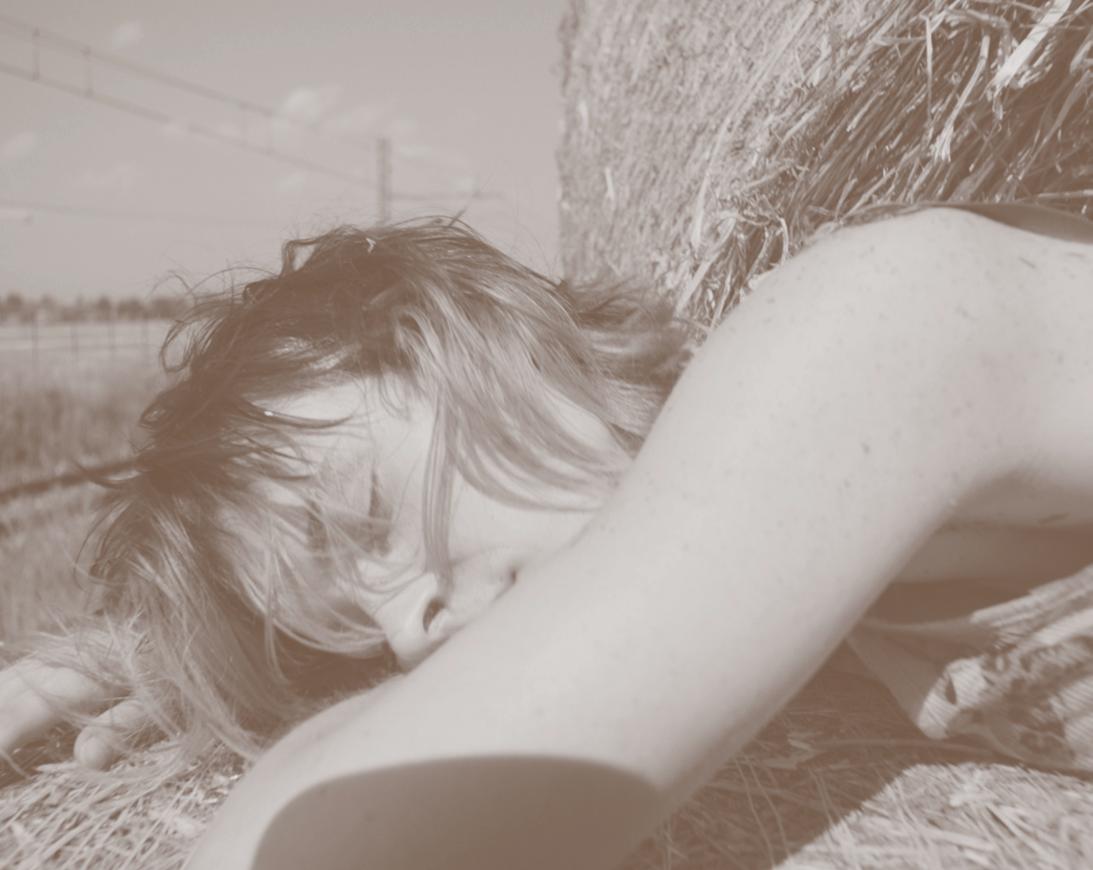

alessandro rossetto
è nato nel 1963 a Padova, in Italia. alessandro Rossetto was born in 1963 in Padua, Italy.
1997 Il Fuoco di napoli doc. 1999 Bibione Bye Bye One doc. 2002 chiusura doc.
2006 Feltrinelli doc. 2007 Raul (episodio de /episode of L’Orchestra di Piazza vittorio: i diari del ritorno) 2013 Piccola Patria
Federico Ferrone, michele manZolini
ITALIAN ScREENINGS
La fine di un mondo e la fine di un sogno attraverso lo sguardo e filmati 8mm del barbiere comunista sauro Ravaglia. è il 1957 ad alfonsine, uno dei tanti paesini della Romagna ‘rossa’ distrutti dalla guerra. sauro e suoi amici, tutti appassionati cineamatori, sognano l’unione sovietica, unica terra in cui si realizza il loro ideale di pace, fratellanza e uguaglianza. quando si presenta l’occasione di visitare mosca, durante il Festival mondiale della gioventù socialista, il gruppetto parte: le aspettative sono altissime e tanta la voglia di portare a casa più immagini possibili di quello che sarà il viaggio della vita. In concorso all’ultimo torino Film Festival.
“Per sauro, come per molti della sua generazione, l’utopia non era solo un’idea politica ma una prospettiva che quasi si poteva toccare con mano. Per noi che siamo cresciuti in un’epoca in cui non si sogna più una società ideale, fare un film come questo è un tentativo di far riaffiorare quel desiderio di utopia che, anche solo per motivi anagrafici, abbiamo sempre fatto finta di ignorare.” (F. Ferrone, m manzolini)
the end of an era and the end of a dream through the eyes of sauro Ravaglia, an amateur filmmaker, barber and communist. It is 1957 in alfonsine, one of the many towns in Italy’s emilia Romagna region where communist local governments have reigned supreme in the wake of the destruction wreaked by the war. the communist barber sauro Ravaglia and his home-movie makers friends dream of the soviet union, the only place where their ideals of peace, brotherhood and equality have come true. When they get the chance to visit moscow during the World Festival of Youth and students, the group of friends depart: their expectations are high and they want to bring home as many images as possible of what will be the best trip of their life. In competition at the latest torino Film Festival.
“For sauro, like many others from his generation, utopia was not just an ideal, but a goal that seemed within easy reach. For us who grew up in an era where the dream of an ideal society has vanished, making a film such as this one is an attempt to resuscitate this desire for utopia, which if only for personal reasons, we always pretended to ignore.”
(F. Ferrone, m manzolini)
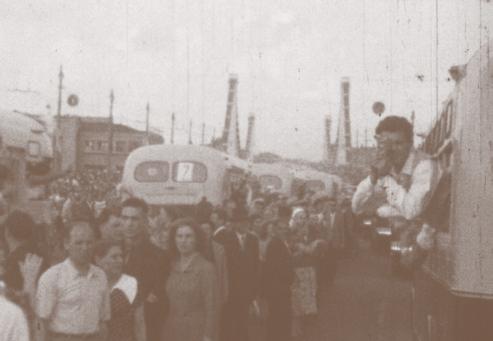
Italia - Regno unito / Italy - United Kingdom 2013, 8mm & HD, b-n / b-w & col., 70’ v.o. italiana - russa / Italian - Russian o.v.
sceneggiatura / screenplay: Federico Ferrone, Michele Manzolini, Francesco Ragazzi, Jaime P. cousido, denver Beattie.
Fotografia / Photography: Andrea Vaccari, Marcello dapporto, Enzo Pasi (8mm), Luigi Pattuelli (8mm), Sauro Ravaglia (8mm). montaggio editing: Sara Fgaier. musica music: Francesco Serra. suono sound: diego Schiavo. Interpreti / cast: Sauro Ravaglia. Produzione / Produced by: Kiné, Vezfilm Ltd.
coproduzione co-produced by: Home Movies-Archivio nazionale del film di famiglia. In associazione con / In association with: Fondazione culturale San Fedele, Fondazione cineteca di Bologna, Apapaja Produzioni cinematografiche. con il sostegno di supported by: Fondazione cariplo, Media Programme-European union, documentaristi Emilia Romagna. Distribuzione per l’Italia / Distributed in Italy by: Istituto Luce- cinecittà.
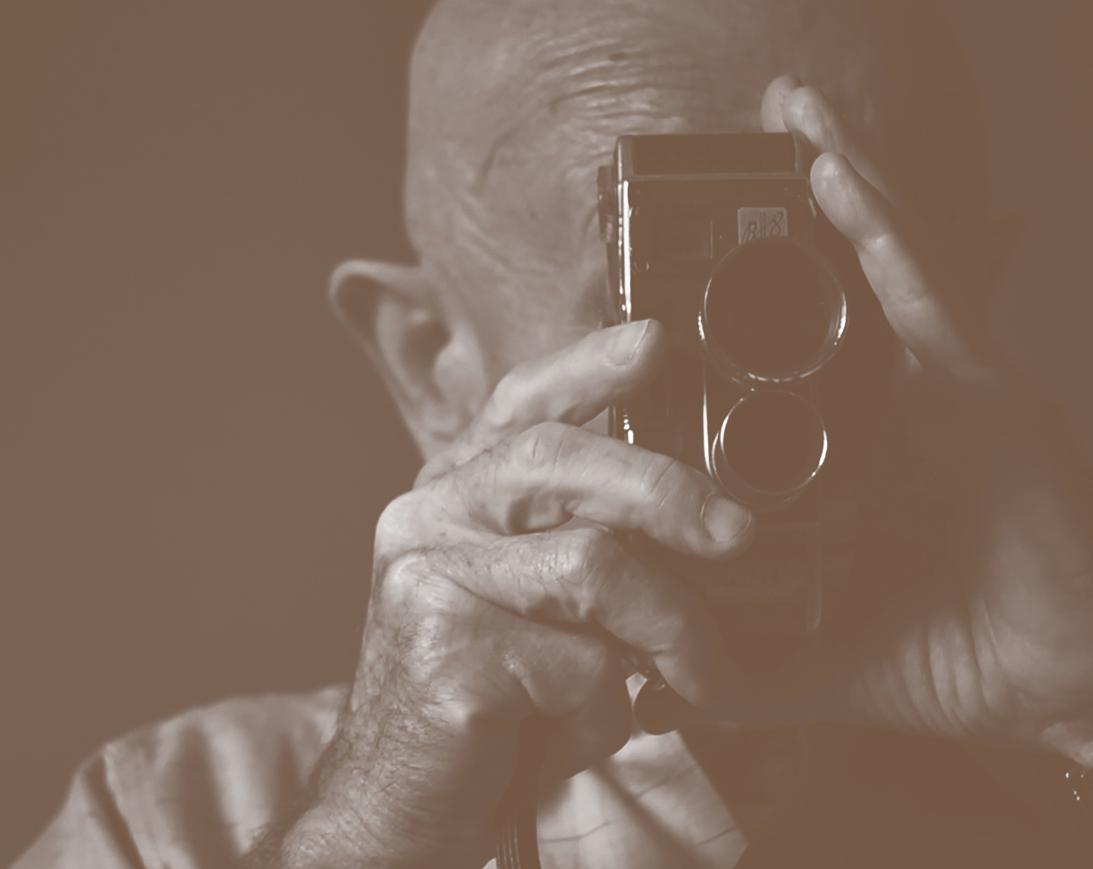
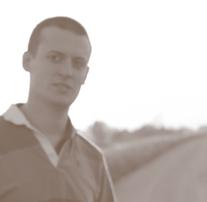
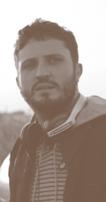
Federico Ferrone
Di nazionalità italiana, è nato nel 1981.
Of Italian nationality, Federico Ferrone was born in 1981. 2004 Banliyö - Banlieue cm / sf doc. (diretto con / directed with Francesco Ragazzi, constance Rivière) 2007 merica (diretto con / directed with michele manzolini, Francesco Ragazzi) 2009 Il nemico interno (diretto con / directed with michele manzolini) 2013 Il treno va a mosca (diretto con / directed with michele manzolini)
michele manZolini
Di nazionalità italiana è nato nel 1980.
Of Italian nationality, michele manzolini was born in 1980. 2007 merica (diretto con / directed with Federico Ferrone, Francesco Ragazzi) 2009 Il nemico interno (diretto con / directed with Federico Ferrone) 2013 Il treno va a mosca (diretto con / directed with Federico Ferrone)
FaBriZio grosoli
Il Premio intitolato a corso salani - promosso dall’associazione che ne porta il nome e dal trieste Film Festival - è ormai un evento consolidato per filmmaker italiani che si impegnano a perseguire un modello di cinema indipendente “di confine”, fuori da schemi e formati sia dal punto di vista produttivo che artistico, sull’esempio del cineasta caro a trieste e prematuramente scomparso nel 2010. come ormai è noto il Premio è riservato a opere in corso di realizzazione, con una dotazione monetaria per l’autore vincitore finalizzata al completamento del lavoro ed è articolato in 2 fasi. La prima è la selezione dei 5 finalisti - che quest’anno ha visto come responsabili chicca Bergonzi, massimo causo, maurizio Di Rienzo, Grazia Paganelli e monica Rametta - basata sull’analisi di dossier con materiale visivo di lavorazione a supporto. La seconda è il pitching vero e proprio dei 5 progetti - che avviene durante una sessione pubblica nei giorni del trieste Film Festival nel corso della quale ogni autore ha a disposizione 30 minuti per presentare con parole e immagini il proprio work in progress - ed è valutato da una Giuria composta quest’anno dalla regista Gloria De antoni, dal distributore indipendente e buyer andrea cirla e dal critico e dirigente televisivo Francesco Di Pace. In realtà in questa edizione la presentazione dei work in progress finalisti si svolge in un preciso contesto internazionale che ne rafforzerà la visibilità e le premesse per una diffusione oltre i nostri confini. pitching sono collocati in un momento centrale di “When east meets West” il forum rivolto a progetti per possibili coproduzioni tra est e Ovest europa. Il primo pubblico a valutare i 5 selezionati sarà quindi formato anche da professionisti provenienti da diversi paesi europei: produttori, distributori, sales agents e buyers, che potranno decretarne le potenzialità di interesse da un punto di vista, ci auguriamo, concreto e operativo. non va dimenticato, del resto, che i precedenti vincitori hanno preso le mosse da trieste per affermarsi nelle più prestigiose manifestazioni continentali e non solo: Palazzo delle aquile di stefano savona ha vinto il “cinéma du Réel” di Parigi nel 2011 e materia oscura di massimo D’anolfi e martina Parenti ha raccolto consensi importanti a partire dalla presentazione al Forum di Berlino 2013. ci auguriamo naturalmente lo stesso successo per i 2 vincitori ex-aequo dell’edizione 2013: arctic spleen di Piergiorgio casotti e Il mondo di nermina di vittoria Fiumi, presentati insieme a un altro dei finalisti aishiteru my Love di stefano cattini, selezionato recentemente dal Festival dei Popoli di Firenze.
the award named after corso salani – promoted by the association bearing the same name and by the trieste Film Festival – is now a consolidated event for Italian filmmakers committed to adopting a “borderline”, unconventional independent cinema model lying outside the usual formats in both artistic and production terms in like manner to salani, a filmmaker much loved in trieste who died before his time in 2010.
as is well-known now, the award is reserved for films already in production, with a financial contribution for the winning filmmaker intended to enable the work to be finished. the prize is divided into two phases. the first is the selection of the five finalists – which this year has seen the involvement of chicca Bergonzi, massimo causo, maurizio Di Rienzo, Grazia Paganelli and monica Rametta – based on an analysis of dossiers with the visual material being worked on as supporting documentation. the second is the actual pitching of the five projects –which takes place during a public session during the trieste Film Festival. at this time, the author has 30 minutes available in which to present the work in progress in words and images. this presentation is appraised by a Jury which this year comprises director Gloria De antoni, independent distributor and buyer andrea cirla and critic and tv executive Francesco Di Pace. In actual fact, the presentation of the works in progress of the finalists during this edition of the Festival will take place within an international context strengthening the visibility and preconditions for distribution beyond Italy’s borders. the pitching takes place at a central moment of “When east meets West”, the forum featuring projects for possible co-productions between eastern and Western europe. the first public appraising the five finalists will thus include professionals from various european countries: producers, distributors, sales agents and buyers, who can establish their interest in a way, we hope, that is material and operative. nor should it be forgotten that previous winners set off from trieste to establish themselves in the most prestigious events in the continent and beyond: Palazzo delle aquile by stefano savona won the “cinéma du Réel” in Paris in 2011, and materia oscura by massimo D’anolfi and martina Parenti has won much acclaim, starting with the presentation at the Berlinale Forum of 2013. naturally, we wish the same success on the two joint winners of the 2013 edition: arctic spleen by Piergiorgio casotti and Il mondo di nermina by vittoria Fiumi, presented together with another of the finalists: aishiteru my Love by stefano cattini, selected recently by the Festival dei Popoli in Florence.
steFano cattini
Italia / Italy, 2013, HD, col., 75’, v.o. italiana / Italian o.v.
sceneggiatura / screenplay: Stefano cattini.
Fotografia / Photography: Andrea Solieri. montaggio / editing: Stefano cattini, Gualtiero Venturelli. musica / music: Angus Mc og.
suono sound: Jacopo chiari. Produzione Produced by: doruntina Film.
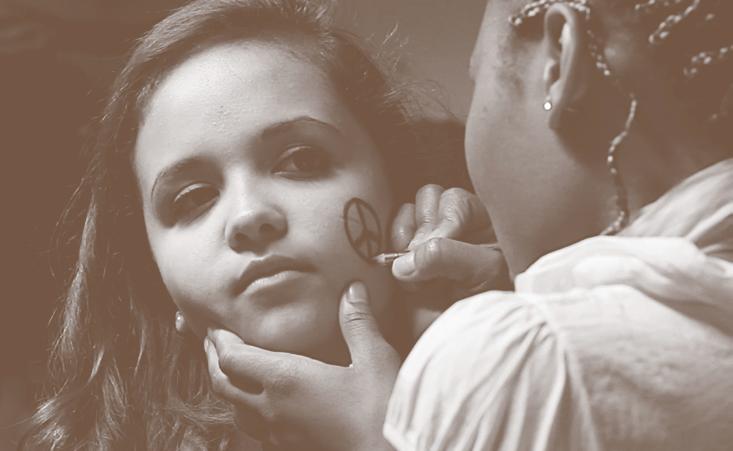
steFano cattini
è nato nel 1966 a carpi (modena), Italia. stefano cattini, was born in 1966 in carpi (modena), Italy. filmografia scelta selected filmography
2008 Ivan e Loriana cm sf doc. 2009 L’isola dei sordobimbi doc. 2010 amèn cm sf doc. 2012 L’ora blu doc. 2013 aishiteru my Love doc.
un gruppo di studenti di un istituto professionale, aspiranti protagonisti dello spettacolo teatrale di fine anno, e il loro eterno, conflittuale ma necessario, confronto con se stessi e con il mondo degli adulti. volti di Francesco, giovane playboy, Helena, ballerina autodidatta, erika, romantica sognatrice, aisha, silenziosa e solitaria e di tutti gli altri disegnano la mappa del mondo globalizzato. I loro linguaggi, il loro abbigliamento, le loro eccentricità li riconducono a un’unica realtà in trasformazione: l’adolescenza. La finzione scenica li espone e protegge al contempo, facendo emergere tutta la forza poetica, spesso drammatica, ma anche genuinamente comica delle loro turbolenti esistenze. aishiteru my Love è stato in concorso all’ultima edizione del Festival dei Popoli, nella sezione “Panorama”.
“aishiteru significa ‘ti amo’ in lingua giapponese. e l’amore è il grande tema sempre sospeso sopra tutte le vicende umane, come ogni adolescente ben sa.” (s cattini)
a group of students at a vocational school, all would-be actors anxious to play a part in the end of year performance, and their endless, conflicting although necessary contrast with themselves and the adult world. a sequence of faces: Francesco, a young playboy, Helena, a self-taught dancer, erika, a romantic daydreamer, aisha, an overweight girl surrounded by solitude and all the others contribute to drawing the map of a globalized world. their way of speaking, their style of dressing, their eccentric behaviours create a unique evolving reality: adolescence. the theatrical invention exposes and protects them, thus letting out all the poetic, dramatic, but also genuinely comic force of their turbulent age. aishiteru my Love was in competition at the latest Festival dei Popoli in Florence, in the “Panorama” section.
“aishiteru is the Japanese for ‘I love you’. Love is the main theme and some sort of ‘cliffhanger’ in all human happenings. and every teenager knows about it!” (s cattini)
arctic spleen è un viaggio intimo e personale nella vita giovanile groenlandese dove natura, noia, violenza e tradizione stanno da decenni reclamando il più alto dei “tributi”. quello di centinaia di giovani vite. nella Groenlandia dell’est, ogni anno, il 2% dei ragazzi tra 15 e 25 anni si toglie la vita e il 25% ci prova. Le esperienze di Ole, elvira, Hans e Kaleeraq, sopravvissuti a diversi tentativi, non sono singole storie isolate ma lo specchio delle paure di una grande parte di giovani groenlandesi inclini al suicidio. un atto sociale non percepito come l’ultimo disperato atto di una singola persona ma considerato una “exit strategy” profondamente radicata nella cultura locale. era l’antico modo di risolvere problemi, oggi trasferito contortamente alle nuove generazioni.
“...ho cercato di raccontare senza documentare in modo didascalico, senza dare ricette, che vorrei fare passare allo spettatore attraverso l’elaborazione dei miei occhi di fotografo, videomaker e dei miei sentimenti di essere umano.” (P. casotti)
arctic spleen offers an intimate, personal voyage in the life of Greenland’s youth, in which nature, boredom, violence and tradition have for decades been demanding the highest of “tributes”. a tribute counted in hundreds of young lives. In eastern Greenland, 2% of youths aged between 15 and 25 succeed in taking their own lives, and 25% attempt to do so. the experiences of Ole, elvira, Hans and Kaleeraq, who have survived various attempts, are not single, isolated cases but the reflection of the fears of a large percentage of young Greenlanders tending towards suicide. In a social act which is not perceived as the last desperate act of a single individual but instead as an “exit strategy” that is deeply rooted in the local culture. this was the old way of resolving problems, and it has been transferred in a warped fashion to the latest generations.
“It is a situation that I have tried to describe without documenting in a didactic manner and without suggesting easy solutions. Instead, I want to convey the situation to the viewer through my eyes as photographer, videomaker and through the lens of my feelings as a human being.” (P. casotti)
Piergiorgio casotti
Italia / Italy, 2014, HD, b-n / b-w & col., 55’, v.o. inglese - groenlandese / english - Greenlandic o.v.
sceneggiatura, fotografia / screenplay, Photography: Piergiorgio casotti. montaggio / editing: Nadia Fugazza. musica / music: Massimo Zamboni. suono / sound:
Piergiorgio casotti, diego Schiavo.
Produzione / Produced by: Piergiogio casotti, Mammut Film. Distribuzione internazionale, distribuzione per l’Italia / World sales, Distributed in Italy by: Mammut Film.
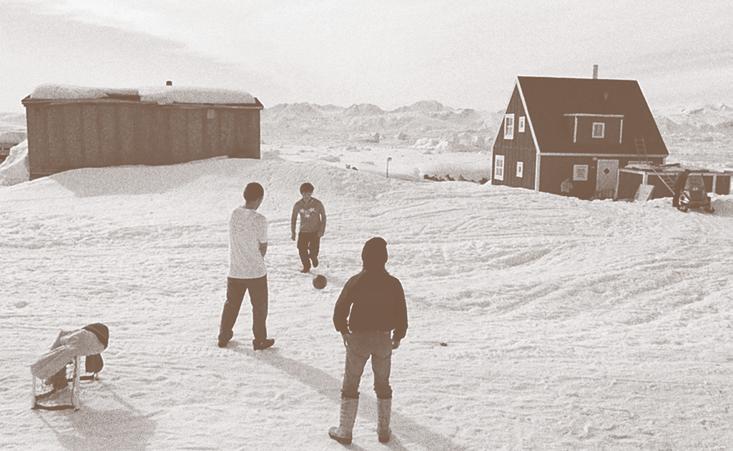
Piergiorgio casotti è nato nel 1972 a Reggio emilia, Italia. Piergiorgio casotti was born in 1972, in Reggio emilia (Italy). 2013 arctic spleen doc.
WORLD
- Germania - svizzera / Italy - Germany - switzerland, 2014, HD, col., 55’, v.o. bosniaca / Bosnian o.v.
sceneggiatura, fotografia screenplay, Photography: Vittoria Fiumi. montaggio / editing: Lorenzo Pazzi. suono / sound: Mirko Fabbri. Interpreti / cast: Nermina Medanovič, Melisa Medonovič, Kadira Brkovič, Almedina Medanovič, Alan Medanovič, Anel Jusič.
Produzione Produced by: Associazione Plinio. coproduzione / co-produced by: Intrigo Internazionale. con il sostegno di / supported by: cineteca di Bologna, Filme für eine Welt, Premio corso Salani, Fondazione Angelo Frammartino.

vittoria Fiumi
è nata nel 1980 a Bologna, in Italia. vittoria Fiumi was born in 1980 in Bologna, Italy. 2007 Peaceful Place doc. 2009 all of a sudden It Was Dark doc. 2014 Il mondo di nermina doc.
nermina è una donna forte, ha tre figli, ed è sopravvissuta al massacro che ha sterminato molti membri della sua famiglia, nel 1992 durante la guerra in Bosnia. Dopo aver vissuto per alcuni anni in Germania è tornata nel villaggio dov’è nata per crescere lì i suoi figli. nermina fa i conti ogni giorno con il ricordo dei crimini commessi nel villaggio. Ha però trovato la forza e il coraggio di iniziare una nuova vita: coltiva la terra, alleva il bestiame, vende il latte. Incontriamo anche almedina e melisa, le sue figlie adolescenti. Il mondo di nermina è un film su due generazioni che devono affrontare le conseguenze del conflitto e il crollo economico e politico che ne è seguito.
“ero affascinata da queste donne forti che affrontano con coraggio il dopoguerra e in generale sono interessata alla capacità degli essere umani di reagire di fronte alle catastrofi ... non sono alla ricerca di eroi ma di persone normali che hanno vissuto esperienze straordinarie.” (v Fiumi)
nermina is a strong woman, mother of three, she survived the massacre in which many members of her family were killed in 1992, during the Bosnian conflict. after having lived for some years as a refugee in Germany she comes back to raise her children in the village she was born in. nermina copes daily with the memories of the crimes committed in the village. she has however found the strength and the courage to start a new life: cultivating the land, breeding cattle, selling milk. We also meet almedina and melisa, her adolescent daughters. Il mondo di nermina is a film about two generations that must deal with the consequences of the conflict and the economic and political collapse that followed.
“I was fascinated by these strong and brave woman who coped with the consequences of the war, and in general what interests me is the ability with which human beings react to catastrophes ... I am not in search of heroes but of normal people who have had extraordinary experiences.”
(v Fiumi)
Frastuono è la storia di due ragazzi, Iaui e angelica. Iaui vive sull’appennino tosco-emiliano, è nato e cresciuto in una comunità montana autogestita: un ragazzo dei boschi che si nutre di musica sognando di diventare dj nei rave di psy-trance in giro per il mondo. Iaui sembra non perdere mai la sua natura trasognata, ineffabile, né a scuola, né in città, né nei concerti. Ogni giorno scende dalla montagna per frequentare il liceo artistico di Pistoia, e in città incontra suoi compagni di viaggio: angelica, elia, Lorenzo, alice… angelica, giovane eremita punk-rock della piana, cerca di tirarsi fuori dalla testa, in qualche modo, un’idea di musica. suona la batteria e canta suoi testi in inglese. Il suono è sporco e fuori da ogni logica accademica: bisogna solo aspettare. angelica fotografa e filma fin da piccola se stessa e tutto ciò che nel quotidiano restituisce per lei uno smascheramento della realtà, spesso convogliando i risultati in un calderone di condivisione mediato dal computer e da internet. La vita di questi adolescenti è fatta di alternanze non sempre prevedibili, di tempi morti, di attese infinite prima di arrivare a un’improvvisa accelerazione. Iaui, in contrasto con la vita di provincia e stanco della sua situazione critica a scuola, decide di allontanarsi da casa per viaggiare e osservare il mondo. angelica continua a suonare in giro per la città con elia, Lorenzo e alice. La musica e un viaggio a Berlino diventano un dispositivo formativo potente che porta l’avventura di angelica e Iaui al punto di non ritorno: ripetersi uguale a se stessa o non accadere mai più.
NOTE DI REGIA
La musica è una strepitosa palestra di relazioni e probabilmente non esiste altro strumento di formazione e di studio su un linguaggio che sia meno mediato e più efficace, potenzialmente dirompente, meno supino. Per gli adolescenti la musica è l’occasione per mostrarsi realmente diversi, eversivi, irrequieti, è la possibilità di portare avanti un progetto di vita raccontato con suoni e parole, prima di sedersi sulle poltrone della vita normale, delle convenzioni, delle inibizioni. questo film nel corso del tempo ha capito quale era la sua idea di rappresentazione, costruendo la propria storia cercando di non inciampare nell’adulazione di un genio o presunto tale, lasciando liberi protagonisti di questa storia di mostrare le basi del racconto osservando le loro vite per raccontarle nella loro complessità.
STATUS ATTUALE DEL pROGETTO
Il film oggi è prodotto da Invisibile film, da the Year Punk Broke con Rai cinema. Ha avuto il sostegno di toscana Film commission grazie al fondo Incoming. Ruolo importante nell’evoluzione produttiva l’ha avuto il gruppo Filmmaker insieme a Fondazione cariplo selezionando il film al bando “nutrimenti celesti / nutrimenti terrestri”, e scegliendolo tra i vincitori. Le riprese si sono concluse nel novembre 2013; da dicembre si è iniziato a visionare il materiale e a prepararlo per il montaggio.
davide maldi
Frastuono (noise) is the story of two young people, Iaui and angelica. Iaui lives in the apennines on the tuscan-emilian border, having been born and brought up in a self-governing mountain community. He’s a boy from the woods who devours music, dreaming of becoming a dj in psy-trance raves around the world. Iaui seems never to lose his dreamy, ineffable nature: not at school, nor in town, nor at concerts. every day, he comes down from the hills to attend the artistic high school in Pistoia, and meets his travelling companions in town there: angelica, elia, Lorenzo, alice… angelica, a young punk-rock loner from the plains, tries to develop some idea of music in her own head. she plays the drums and sings her songs in english. the sound is murky and lies outside any academic logic: it’s just a matter of wait and see. since a child, angelica has been taking photographs of herself and filming everything around her that in her mind unmasks a detail of reality, often grouping the results together in a melting pot mediated by her computer and the internet. the life of these adolescents is made up of not always foreseeable alternations, of empty periods and infinitely long waits and a sudden acceleration. Fed up with the provincial life and of his own critical situation at school, Iaui decides to leave home to travel and observe the world. angelica instead continues to play around town with elia, Lorenzo and alice. music and a journey to Berlin become a powerful educational device bringing angelica and Iuai’s adventure to a point of no return: to repeat the same things in the same way or never do the same again.
DIRECTOR S NOTE
music offers an extraordinary gym for relations and there is probably no other educational and study tool about a language that is less mediated and more effective, potentially explosive and least servile. For adolescents, music is an opportunity to show themselves to be truly different, subversive, restless, the possibility to develop a project for their lives told in sounds and words, before taking a seat in normal life, the life of conventions and inhibitions. Over time, this film has understood what was its idea of depiction, building its own story and seeking not to trip over the adulation of a genius, real or presumed, leaving the protagonists of this story to show the bases of the story and observing their lives to describe all their complexity.
pRODUCTION STATUS
the film today is being produced by Invisibile film, the Year Punk Broke and with Rai cinema. It has had the support of the toscana Film commission thanks to the Incoming fund. the Filmmaker group has played an important role in the production process, together with the cariplo foundation, selecting the film for the “nutrimenti celesti / nutrimenti terrestri” contest and choosing it as one of the winners. Filming ended in november 2013; since December, we have been looking at the material and preparing it for editing.
Luca musella, fotografo, operatore, scrittore, oggi esodato professionalmente ed emotivamente, ripercorre la propria vita in un testo-lettera da lui scritto e un viaggio reale e ideale attraverso l’Italia. Il protagonista, insieme alle figure che popolano il suo mondo, diventa portavoce di una condizione universale, in un linguaggio sempre in bilico tra l’immediatezza dell’azione e la profonda riflessione affidata alla parola scritta.
SYNOpSIS
Luca musella, photographer, camera operator and writer, and now exiled professionally and emotively, examines his life in a letter written by him and through a real and virtual journey across Italy. the protagonist, together with the figures inhabiting his world, become the spokesmen of a universal condition, using a language that is forever suspended between the immediacy of action and the profound reflection accorded to the written word.
NOTE DI REGIA
La storia di Luca è quella di un quarantacinquenne esodato dalla vita e dall’amore, la storia di tante altre persone travolte dall’isolamento e dall’emergenza economica. ma anche la storia di un artista che ha cominciato a raccontarsi in una lettera destinata a un amore ideale e insieme a tutti noi. c guida in un viaggio metropolitano attraverso altre esperienze anche più dure della sua e ci racconta un personaggio che senza rancore è determinato ad andare avanti e a non lasciarsi sopraffare dagli eventi.
STATUS ATTUALE DEL pROGETTO
Il film, prodotto dalla “marechiarofilm”, è scritto e diretto da antonietta De Lillo e Giovanni Piperno a partire dalla lettera-testo di Luca musella. In fase di scrittura si è avvalso della collaborazione del corso di sceneggiatura di massimo Gaudioso alla scuola d’arte cinematografica “Gian maria volonté”. Le prime riprese sono state effettuate a giugno-luglio 2013 in collaborazione con le Film commission Lombardia e Regione campania. La seconda fase di riprese è stata effettuata a dicembre 2013. Il progetto entrerà in fase di postproduzione da gennaio 2014. In questo momento la società è impegnata nella ricerca di risorse finanziarie quali la prevendita dei diritti antenna alla Rai, una piccola distribuzione per le sale e finanziamenti attraverso meccanismi di tax credit esterno.
Luca’s story is that of a 45-year-old exiled from life and love. It is the story of many other people overwhelmed by isolation and the economic emergency. But it is also the story of an artist who has begin to describe himself in a letter destined to a virtual love and to all of us. He leads us on a metropolitan voyage through other experiences that are even harder than his own, and describes a character who without bitterness is determined to move forward and not let events get him down.
pRODUCTION STATUS
the film, produced by “marechiarofilm”, is written and directed by antonietta De Lillo and Giovanni Piperno using a letter by Luca musella. During the writing phase, use was made of the collaboration with the scriptwriting course held by massimo Gaudioso at the scuola d’arte cinematografica “Gian maria volonté”. the first shooting took place in June and July 2013 in collaboration with the Film commission Lombardia and Regione campania. the second phase of shooting took place in December 2013. the project will enter post-production in January 2014. at the moment, the company is involved in seeking funds, such as through the pre-sale of broadcasting rights from the Rai, a small distribution in cinemas and financing through external tax credit mechanisms.
alessandra locatelli
Il film è la storia di una libertà. è un ritratto intimo di un uomo di 50 anni che ha trasformato la sua fragilità in un modo di vivere libero e semplice, costruendo attorno a sé un mondo, un caledoscopio di sensibilità e purezza. Racconta la storia di nello, che rimasto orfano all’età di tre anni, cresciuto in collegio, ha vissuto l’intera vita in totale solitudine dall’età di sedici anni. I vicini di casa dicono che il suo cervello si sia fermato all’adolescenza, e tutt’ora vive senza tempo, senza regole, senza impegni, spensierato e libero come un bambino. vive senza tutte quelle cose che da ragazzo nessuno gli ha insegnato a usare. Il film racconta la storia di una vita vissuta nella mancanza di una famiglia, di una cura, di un’attenzione, di un ragazzo ora diventato un uomo, ma emotivamente rimasto in quell’indeterminatezza dell’adolescenza, fuori dalle regole, dagli schemi della società. tanta è la sua inadeguatezza a vivere nei parametri della società, tanto è autentico il suo essere incontaminato. e così facendo ha sviluppato una sensibilità che non ha barriere. vive in maniera imprevedibile, ha un’urgenza di vivere che spalanca gli occhi di chi lo incontra, coglie dettagli e piccole sfumature che aprono a nuove visioni.
NOTE DI REGIA
L’innesco che ha acceso la voglia di raccontare la storia che vi presento, è stato proprio il desiderio di realizzare un film che si ponesse al limite tra realtà e immaginazione. uno sguardo che si avvicina al protagonista molto lentamente, che lo ricerca attentamente nella realtà in cui vive, e che lo scopre sfumatura per sfumatura. un film che prende forma tra la realtà del protagonista e l’immaginazione che si libera nel fuoricampo di dialoghi e di immagini ispirate ai suoi racconti, alle sue visioni. un contesto semplice, la strada, una relazione particolare, lui e il bambino, il racconto di una visione, di un’immagine, che si realizza solo attraverso le parole, gesti, le espressioni e le reazioni. Dalle sue parole prendono forma le immagini che descrivono un qualcosa che noi non vediamo ma che possiamo immaginare. con questo punto di partenza ho pensato alla struttura del film; fatti reali, concreti che sconfinano in qualcosa d’irreale, lasciando aperte molte porte all’immaginazione. una forma di narrazione libera e semplice che segue la struttura della poesia, e che si nutre di questo suo modo radicale di sentire le cose. Il ritratto di un inconscio, fatto di quelle cose apparentemente normali che si collocano al di fuori di noi; un racconto, una rappresentazione di qualcosa d’imprevedibile e fluido come un sogno.
STATUS ATTUALE DEL pROGETTO
Attualmente l’Associazione FILMMAKER di Milano sta sostenendo il progetto attraverso il finanziamento di 8.000 euro vinto attraverso il bando. Inoltre segue il progetto nelle varie fasi di sviluppo e ripresa. L’associazione Lab80 di Bergamo sta seguendo il progetto, nelle sue fasi di realizzazione supportando il film anche da un punto di vista tecnico.
SYNOpSIS
the film is the story of a freedom. It offers the intimate portrait of 50-year-old man who has transformed his fragility into a free and simple way of life, building around himself a whole world, a kaleidoscope of sensitivity and purity. It tells the story of nello, who became an orphan at the age of three and grew up in a school for orphans and has spent his entire life in solitude from the age of sixteen. His neighbours say his mind stopped developed as a teenager, and he still lives outside time, without rules, without obligations, carefree and free as a child. He lives without all those things that no-one taught him how to use as a child. the film tells the story of a life spent lacking a family, care, attention; the story of a boy who has now become a man but who has emotively remained in that indeterminacy of adolescence, outside the rules and framework of society. the greater his inadequacy in living within society’s rules, the greater the authenticity of his uncontaminated being. In this way, he has developed a sensitivity that has no limits. He lives unpredictably, with an urgency to live that astonishes those he meets, and he seizes on details and nuances that open the way to new visions.
DIRECTOR S NOTE
the stimulus that led to the wish to tell the story am presenting was the desire to make a film lying on the limit between reality and imagination. With a very gradual approach to the protagonist, seeking him out in the reality in which he lives, and which reveals him nuance by nuance. a film that takes shape between the reality of the protagonist and the imagination that is freed in the voice-over of dialogues and images inspired by his stories and visions. a simple context, the road; a special relationship, he and the child; the tale of a vision, of an image, which is realised only through words, gestures, expressions and reactions. From his words emerge the images describing a something which we cannot see but can imagine. It is with this starting point that have imagined the structure of the film; real, concrete facts that lead on to something unreal, leaving many doors open in the imagination. a form of free and simple narration that follows the structure of the poem, and which is nourished by his radical way of seeing things. the portrait of someone instinctive, made of those apparently normal things that are outside us; a tale, a depiction of something unpredictable and fluid as a dream.
luca magi
è una notte come tante nel dormitorio. tutto tace, qualche colpo di tosse, qualcuno russa, qualcuno parla nel sonno in una lingua sconosciuta: l’operatore scruta i monitor collegati alle telecamere di sorveglianza, poi si alza e controlla le camerate. avanza con una pila, illumina i volti e i corpi delle persone addormentate. Dal buio emergono volti in cui sono disegnate espressioni placide da bambini. sono uomini e donne: Gennarino, Paul, andrej, Fabio, Leo, Adrio, Tadeus, Lacri, Marko, Bianca, Pasquale, Alì, Marian, Tarak. Renzo, Khteri, carmine. affiorano nell’oscurità per poi scomparire e perdersi in nuove giornate di divagazioni e derive, come se queste stesse giornate altro non fossero che il prolungamento onirico dei loro sonni. e si raccontano, nel momento in cui si trovano soli nel cuore della notte, o quando incrociano gli altri. notti cadenzate da centinaia di sigarette e accompagnate da sfoghi, lacrime, risate, discussioni surreali, racconti di sogni o incubi. un esercito di santi condannati all’ascesi loro malgrado.
NOTE DI REGIA
Da anni alterno la mia attività di regista a quella di operatore sociale. Da tre lavoro al “Rostom”, una struttura di accoglienza notturna per senzatetto a Bologna. In questo lasso di tempo ho avuto modo di conoscere e condividere aspetti intimi della vita di centinaia di persone ospitate nel centro. L’impatto con questa realtà è stato violento; si tratta per lo più di persone emarginate, disadattate e sole. sono sempre rimasto molto colpito da come dietro questa fragilità di uomini e donne, dietro la loro solitudine testarda perché spesso cercata, si nascondesse una grandezza: un senso di rivolta, qualcosa di inutile e per loro stessi spesso distruttivo ma al contempo capace, se visto da vicino come nel mio caso, di trasmettere l’essenza delle cose, di attraversare gli altri con qualcosa di pulsante e vitale capace di emozionare.
STATUS ATTUALE DEL pROGETTO
Le riprese di storie del dormiveglia sono cominciate ad aprile 2013 e dureranno fino ad aprile 2014. Il film è prodotto da Kiné e da Vezfilm in collaborazione con antoniano Bologna.
SYNOpSIS
In the dormitory, it is a night like any other. everything is silent, except for the occasional cough, someone snoring and someone muttering in their sleep in an unknown language; the operator glances at the monitors linked to the cctv cameras, then gets up and controls the rooms. He advances torch in hand, lighting up the faces and bodies of the slumbering individuals. Faces with the peaceful expressions of children emerge momentarily from the dark. there are men and women here: Gennarino, Paul, andrej, Fabio, Leo, adrio, tadeus, Lacri, Marko, Bianca, Pasquale, Alì, Marian, Tarak. Renzo, Khteri, Carmine. They surface from the darkness and then vanish anew, lost in new days of mental wanderings and drifting, as though these days were nothing more than the oneiric extension of their sleep. and they recount their dreams when they are alone in the depths of the night, or when they meet others. nights marked by hundreds of cigarettes and accompanied by outbursts, tears, laughs, surreal discussions, the telling of dreams or nightmares. an army of saints condemned to exaltation despite themselves.
I have for some years been alternating my work as director and as social worker. For the past three years, I have worked at the “Rostom”, a night shelter for the homeless in Bologna. Over this period of time, have had occasion to learn about and share intimate aspects of the lives of hundreds of people staying at the centre. the impact with this situation was violent: for the most part, these are marginalised individuals, maladjusted and alone. have always been greatly struck by how behind this fragility of the men and women, behind their stubborn solitude because it is often looked for, there is a grandeur: a sense of revolt, something that is useless and often destructive for them, but at the same time capable of conveying the essence of things, of viewing others with something pulsating and vital and able to move one, if seen from close-to as in my case.
pRODUCTION
Filming of storie del dormiveglia began in april 2013 and will last until april 2014. The film is produced by Kiné and Vezfilm in collaboration with Antoniano Bologna.
pRODUCTION STATUS
At present, the FILMMAKER association of Milan is supporting the project with financing of euros 8,000 won through an invitation to bid. It is also following the project in the various phases of development and filming. the Lab80 association of Bergamo (Italy) is following the various phases of the project, providing support for the film from a technical stance.
mattia colomBo
SINOSSI
In un contesto precario e precipitevole come quello degli ultimi anni, siamo definitivamente usciti dalla generazione della sicurezza diffusa e della fiducia verso le cose future. Impotenti e sospinti da poteri che sembrano decidere al posto nostro delle nostre vite, viviamo tutto, anche le relazioni, in uno stato d’emergenza permanente. nelle storie private non riusciamo mai a essere sicuri di chi e di che cosa consideriamo importante, e le nostre convinzioni sono sempre più passeggere e fragili. anche nei letti degli altri a volte ci sentiamo un po’ precari, tranne forse quando siamo invitati a dormirci. Perché dormire è un po’ come fermarsi, come stare. Roberto e silvia, Gabriele e steve, Paolo e michele sono tre delle cinque coppie che nel film si mettono a nudo per condividere le esperienze più intime, raccontare cos’è l’amore oggi, quali declinazioni assume e quali compromessi impone per superare il rischio della solitudine. e poi ci sono anche miei genitori in questo racconto d’amore, coppia inossidabile e per me modello scomodo e irraggiungibile d’integrità morale. e ci sono anch’io, con le mie paure e il desiderio di affrontare insieme a loro un discorso interrotto anni fa sulle mie scelte affettive.
NOTE DI REGIA erodoto racconta che a Babilonia non si servivano di medici. Il malato veniva trasportato in piazza e là chi aveva sofferto dello stesso male si avvicinava e gli consigliava quei rimedi che lo avevano fatto guarire. questo film vuole essere un po’ come la piazza di Babilonia. Paure e incertezze possono trovare sollievo nella condivisione onesta e diretta delle stesse preoccupazioni. La scelta di concentrare buona parte delle storie d’amore attorno alla tematica omosessuale non è legata esclusivamente al mio vissuto personale, ma è una precisa scelta drammaturgica. nella situazione di crisi e ricostruzione che stiamo vivendo, nell’ideologia ricorrente del sempre-di-più, le vicende di Paolo e michele, Gabriele e steve riflettono, meglio di altre, lo stato attuale e incerto delle cose. Il documentario tuttavia non sarà un film di genere, bensì un film dove i personaggi reali si faranno carico di interpretare un sentimento che appartiene a tutti. molte delle situazioni che gli occhi vedono e delle confessioni che le orecchie ascoltano sono difficili da fermare e registrare. ma il film che voglio fare è intimo e confidenziale. Per questo sto pensando a una forma cinematografica più aperta, che pur restando fedele a una pratica, il documentario, e a uno strumento, il reale, riesca a dialogare con la grammatica della finzione.
STATUS ATTUALE DEL pROGETTO Lo sviluppo della sceneggiatura è stato avviato all’interno del laboratorio “nutrimenti terrestri, nutrimenti celesti 2012/13” di “Filmmaker Festival internazionale di cinema” con il sostegno della Fondazione cariplo, all’interno del quale il soggetto del film è stato premiato tra 10 migliori. Il progetto è finalista al “Premio solinas Documentario per il cinema 2013” ed è stato selezionato da “Périphérie - cinéastes en résidence” per la realizzazione della fase di montaggio presso gli studi parigini e con la supervisione di esperti francesi del documentario. Il film è prodotto dalla società staRt di milano e coprodotto dalla società francese The Kingdom. È stato ottenuto il patrocinio dal Comune di milano e dall’arcigay - sezione Lombardia. Il film ha sollecitato interesse da parte di Rai cinema. Lab80 ha dimostrato grande interesse per la distribuzione del film. Per quanto riguarda la Francia, sono stati richiesti finanziamenti al cnc e alla società francese Procirep/angoa. attualmente le riprese del film sono in corso, la fase di montaggio avviata e il film dovrebbe essere pronto per il mese di aprile 2014. Il costo preventivato del film è di 60.000 euro.
SYNOpSIS
as part of the precarious and downward-tending context of recent years, we have had to close the door to the notion of widespread security and confidence in the future, powerless and driven by powers that seem to decide in our lives instead of ourselves. In this situation, we experience everything, even human relations, as part of a state of permanent emergency. In our private stories, we are never sure what and whom we consider important, and our convictions are increasingly fleeting and fragile. and even in other people’s beds we sometimes feel precarious, except perhaps when invited to sleep in them. Because sleeping is a little like stopping, like staying. Roberto and silvia, Gabriele and steve, Paolo and michele are three of the five couples in the film who lay themselves bare to share their most intimate experiences, to talk about love today, what forms it takes and what compromises it requires to overcome the risk of solitude. and my parents appear in this love story too, an evergreen couple and an awkward, unattainable model of moral integrity for me. and I’m in it too, with my fears and desire to tackle, with them, a discussion broken off years ago about my emotional relationships.
Herodotus relates that doctors were not needed in Babylon. anyone who was sick would be carried to the main square, and anyone who had suffered the same illness would advise what course of treatment would cure the patient. this film aims to be a little like that square in Babylon. Fears and uncertainties can be assuaged in an honest and direct sharing of the same preoccupations. the decision to concentrate most of the love stories around the theme of homosexuality was not linked exclusively to my own experience, but was a deliberate dramatic choice. In this situation of crisis and reconstruction we are going through, in the ideology of more-and-more, the experiences of Paolo and michele, Gabriele and steve reflect the current situation and uncertainty of things better than others. But the documentary will not be a genre film, but one in which real characters will aim to interpret a sentiment that is shared by all of us. many of the situations the eyes see and confessions that the ears hear are difficult to capture and record. But the film I want to make is intimate and confidential. For this reason, I am planning a more open cinematographic format, which while remaining faithful to a form – the documentary – is the real tool for maintaining a dialogue with the grammar of the fictional format.
pRODUCTION STATUS
the development of the script began within the “terrestrial nourishment, celestial nourishment 2012/13” workshop at the Filmmaker-Festival internazionale di cinema with the support of the Fondazione cariplo, within which the film’s subject finished in the top ten. the project is also a finalist in the “Premio solinas Documentario per il cinema 2013” and has been selected by “Périphérie - cinéastes en résidence” for the editing stage in Paris studios under the supervision of French experts in documentary. the film is produced by START of Milan and co-produced with The Kingdom of France. It has received the patronage of the comune di milano and of arcigay - sezione Lombardia. the film has seen some interest from Rai cinema. the Italian company Lab 80 has shown great interest for the distribution of the film. as for France, financing has been sought from the cnc and Procirep/angoa. at the moment, filming is under way, the editing phase started; the film should be ready for april 2014. the estimated cost of the film is euros 60,000.
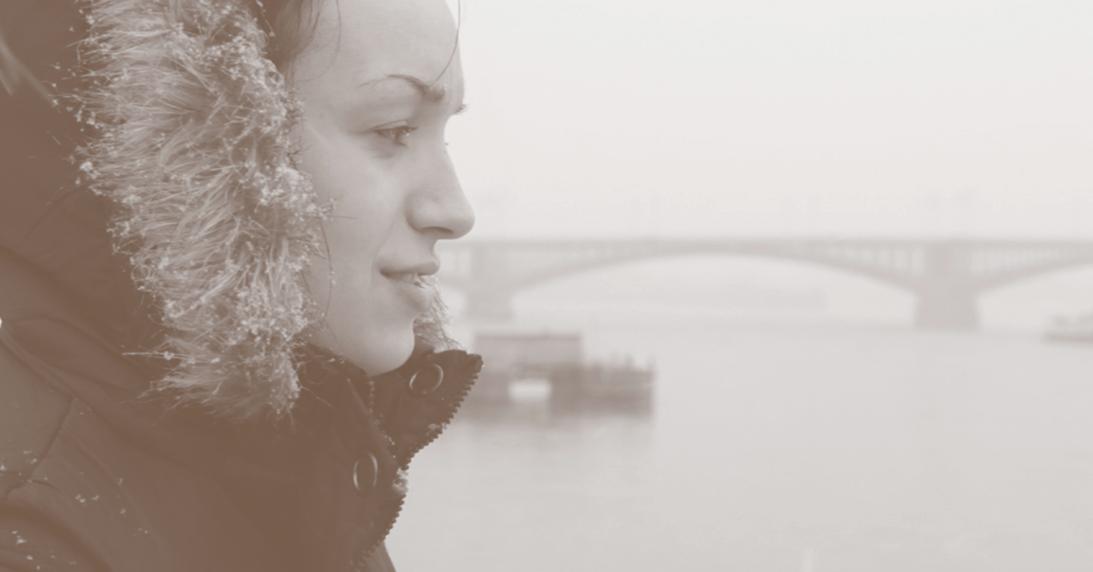
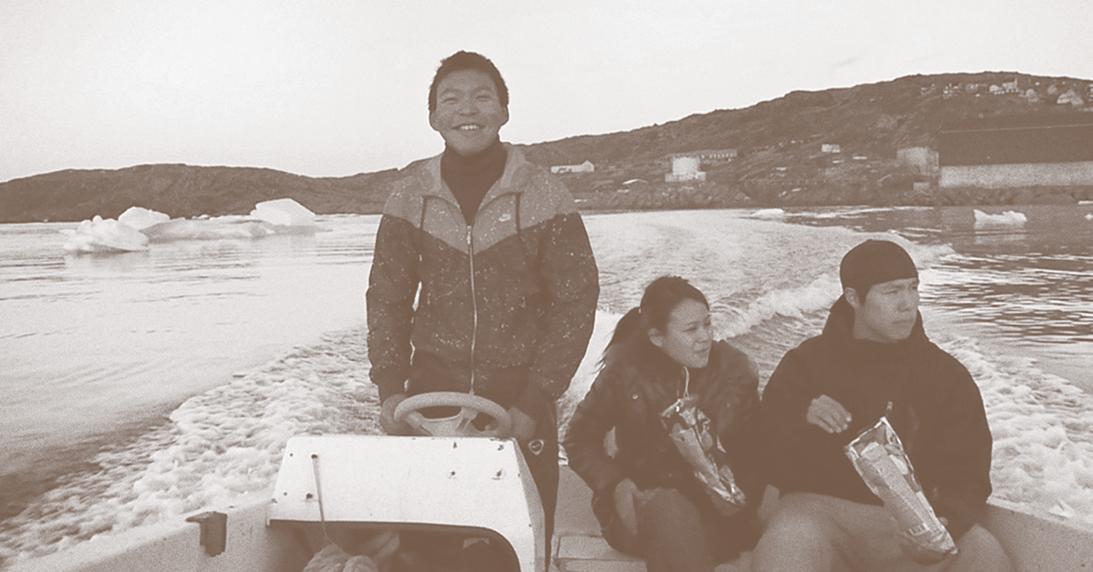
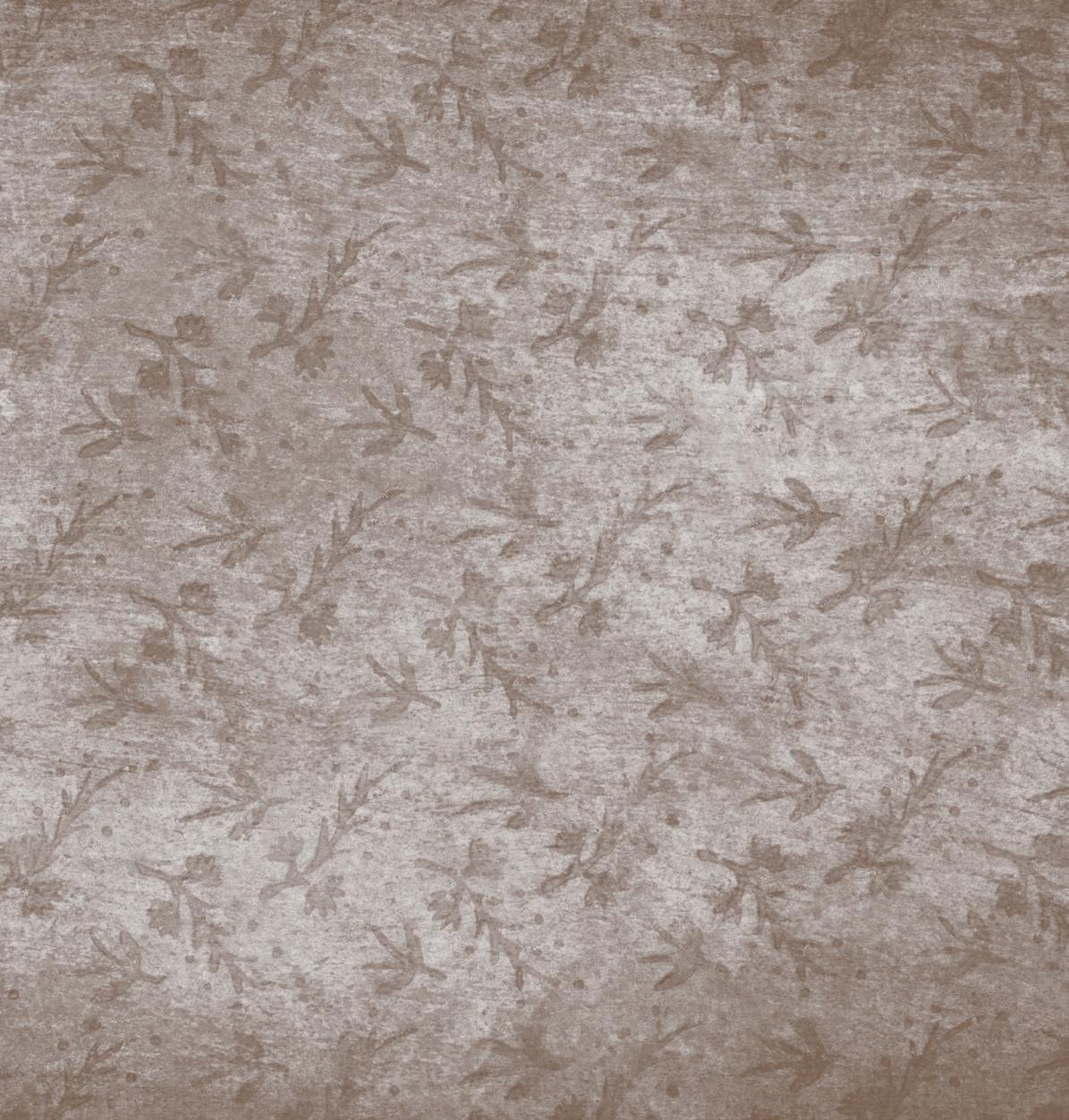
4 Proof Film
Intr. Iuliu valaori 6, apt. 1, sector 3 030683 Bucarest
Romania
tel. +40 21 3260056 office@4prooffilm.ro www.4prooffilm.ro
42 KM Film costache marinescu, 15 011285 Bucarest, sector 1 Romania ursuma@gmail.com www.42kmfilm.ro
Academy of Fine Arts Warsaw Ul. Krakowskie Przedmieście, 5 00068 varsavia
Polonia
tel. +48 22 3200263 fax +48 22 8267547 graka@asp.waw.pl www.asp.waw.pl
Academy Two Largo messico, 16 00198 Roma
Italia
tel. +39 06 8416488 www.academytwo.com
Adam Mickiewicz Institute
ul. mokotowska, 25 00960 varsavia
Polonia
tel. +48 22 4476100 aduda@iam.pl www.iam.pl
Agherose viale Palmanova, 73/R 33100 udine
Italia
tel. +39 0432 1841718 fax +39 0432 1841920 info@agherose.com www.agherose.com
Akson Studio
Piękna str., 44A 00672 varsavia
Polonia
tel. +48 22 8406830 fax +48 22 8417782 akson@aksonstudio.pl
Alter Ego Pictures Sp. zo.o. Chełmska St., 21/422 00724 varsavia
Polonia
tel. & fax +48 22 8511115
Amour Fou
Lindengasse, 32 a-1070 vienna austria tel. +43 1 99499110 fax +43 1 994991120 marketing@amourfou.at www.amourfoufilm.com
Anastato Film anastato@gmail.com
Annette Jung Berliner allee, 90 13088 Berlino Germania tel. +49 3092045078 annette@talking-animals.com www.talking-animals.com
Antipode Film Sales novolesnoy lane, 5-38 127055 mosca Russia appolo@antipode-sales.biz
Arizona Productions Boulevard Barbès, 5 75018 Parigi Francia tel. +33 9 54525572 www.arizonafilms.fr
Arsenali Medicei via del castro Pretorio, 54 00185 Roma
Italia
tel. + 39 06 70613538 fax + 39 06 81170627 contatto@arsenalimedicei.it www.arsenalimedicei.it
ASAP Films Parigi Francia tel. +33 1 42774776 www.asapfilms.com
Associazione Plinio via Leandro alberti, 55 40137 Bologna Italia tel. +39 3478260107
aug&ohr medien Platz der vereinten nationen, 28 10249 Berlino Germania tel. +49 176 62965299 markus@augohr.de www.augohr.de/film
Axelotil Film
Piazza s m. Liberatrice, 27 00159 Roma
Italia
tel. +39 0645496345 delbuonovalentina@yahoo.it
Beta cinema
Gruenwalder Weg, 28d 82041 Oberhaching (monaco)
Germania
tel. + 49 89 673469828 fax + 49 89 673469888 beta@betacinema.com www.betacinema.com
Bfilm s.r.o.
Škultetyho, 10 83103 Bratislava slovacchia
tel. +420 776 451425 peter@bfilm.sk
Bonobostudio
Barutanski jarak, 31 10000 Zagabria
croazia
tel. & fax +385 1 4834445 vanja@bonobostudio.hr www.bonobostudio.hr
busse & halberschmidt
Filmproduktion
Kai Strasse, 14a 40221 Düsseldorf
Germania
tel. +49 211 8628598 fax +49 221 31120804 ddorf@bussehalberschmidt.de www.bussehalberschmidt.de
coop99 filmproduktion
Wasagasse, 12/1/1 a-1090 vienna
austria
tel. +43 1 3195825 fax +43 1 3195825-20 welcome@coop99.at www.coop99.at
cultural Initiatives
malaya sukharevskaya square 6 bldg 1 127051 mosca
Russia
tel. & fax +7 495 2482833 amacinema@gmail.ru
daniel Maculan via Roma, 91 36060 schiavon (vicenza)
Italia danielmaculan@yahoo.it
daniel van Westen tischbeinstrasse, 10 34121 Kassel Germania daniel.vanwesten@gmail.com
darklight Film Studio ul. normandzka, 38 30383 cracovia
Polonia
tel. +48 501 622810 natalia@darklight.pl www.darklight.pl
deckert distribution marienplatz, 1 04103 Lipsia
Germania
tel. +49 341 2156638 fax +49 341 2156639 info@deckert-distribution.com www.deckert-distribution.com
detail Film memhardstrasse, 8 D-10178 Berlino
Germania
tel. +49 30 60981248
deutsche Exotik Filmproduktion GmbH
Dachauer str., 112d 80636 monaco
Germania
tel. +49 (0)89 32494924 fax. +49 (0)89 32494928 info@deutsche-exotik.de www.deutsche-exotik.de
deutsche Film - und Fernsehakademie Berlin (dffb)
Potsdamer str., 2 10785 Berlino Germania
tel. +49 30 257590 fax +49 30 2575162 info@dffb.de www.dffb.de
doruntina Film via Bergamo, 12 43122 Parma Italia doruntinafilm@gmail.com
EastWest distribution schottenfeldgasse, 14 1070 vienna austria
tel. +43 1 524931034 fax +43 1 524931020 www.eastwest-distribution.com
Fantasia Ltd Irakleous street, 1 11743 atene Grecia fanfilmpro@gmail.com
Feltrinelli Editore anastasia.plazzotta@feltrinelli.it
Film House Baš Čelik Gospodar Jevremova, 35/9 11000 Belgrado serbia
tel. +381 11 3034441 fax +381 11 3034887 www.bascelik.net
Filmakademie Baden-Württemberg
akademiehof, 10 71638 Ludwigsburg Germania
tel. +49 7141 969103 festivals@filmakademie.de www.filmakademie.de www.animationsinstitut.de
Films Boutique
Köpenicker Strasse, 184 10997 Berlino
Germania
tel.: +49 30 69537850 fax +49 30 69537851 info@filmsboutique.com www.filmsboutique.com
Films distribution
Rue du Louvre, 34-36 75001 Parigi
Francia
tel. +33 1 53103399 info@filmsdistribution.com www.filmsdistribution.com
Global Screen GmbH sonnenstrasse, 21 D-80331 monaco
Germania
tel. +49 89 2441295500 fax +49 89 2441295520 info@globalscreen.de www.globalscreen.de
Hargla company valtaiku, 19 Lv1029 Riga
Lettonia
tel. +371 29235618 laila.palkanina@inbox.lv
HI FILM PRoducTIoNS
sf. stefan street, 7 023996 Bucarest
Romania
tel. +40 21 2524867
fax +40 21 2524866 office@hifilm.ro
Hochschule für Film und Fernsehen (HFF) “Konrad Wolf” marlene-Dietrich-allee, 11 D-14482 Potsdam-Babelsberg
Germania
tel. +49 331 6202564 fax +49 331 6202568 distribution@hff-potsdam.de www.hff-potsdam.de
Horopter Film Production vardaska, 12 11000 Belgrado serbia
tel. +38 11 7152890 mladen.kovacevic@horopter.rs www.horopter.rs
Hunnia Filmstúdió Róna u., 174 1145 Budapest ungheria
tel. +36 1 2211815 fax +36 1 2208749 halaszm@hunniafilm.hu www.hunniafilm.hu
Indiz Film Koehlerstr. 81 14547 Beelitz Germania
tel. +49 1 714844265 info@indizfilm.de
Interfilm nova ves, 45/2 10000 Zagabria croazia
tel. +385 1 4667290 fax +385 1 4667022 interfilm@interfilm.hr www.interfilm.hr
Interfilm Production Studio citadelna str., 6/8 01015 Kiev ucraina
tel. & fax +380 44 5533908 info@interfilm.biz www.interfilm.biz
Intuit Pictures GmbH monbijouplatz2
D-10178 Berlino Germania
tel. +49 30 26367607 fax +49 30 26367609 info@intuitpictures.com www.intuitpictures.com
Istituto Luce- cinecittà via tuscolana, 1055 00173 Roma
Italia
tel. +39 06 722861 fax +39 06 7221883 www.cinecittaluce.it
Jc S Kazakhfilm almaty
Kazakistan tel. +8 727 3131125 kzf.kim@gmail.com
Jolefilm srl via quarto, 16 35138 Padova
Italia
tel. +39 049 8718175 info@jolefilm.it www.jolefilm.it
KGP Kranzelbinder Gabriele
Production seidengasse, 15/3/19 1070 vienna austria tel +43 1 52222210 welcome@kgp.co.at
Kimerafilm via Pietro Giannone, 10 00195 Roma Italia tel. +39 0645496945 info@kimerafilm.com www.kimerafilm.com
Kiné via ermete novelli, 4/a 40127 Bologna Italia tel. +39 051 4076427 info@kine.it www.kine.it
Kinematograf d.o.o. nova ves, 18 10000 Zagabria croazia info@kinematograf.hr
KMH FILM KFT. Késmárk u., 24. 1158 Budapest ungheria tel. + 36 305747723
Krakow Film Foundation (Krakowska Fundacja Filmowa) ul. Basztowa 15/8a 31143 cracovia Polonia tel. +48 1 22946945 www.kff.com.pl
Krasnaya Strela tel. +7 495 5042223 info@krasnayastrela.ru
KurzFilmAgentur Hamburg Friedensallee, 7 D-22765 amburgo Germania tel. +49 40 3910630 fax +49 40 39106320 www.agentur.shortfilm.com
La cinéfacture Rue de Paradis, 40 75010 Parigi Francia
La cineteca del Friuli
Palazzo Gurisatti via Bini, 50 33013 Gemona (uD) Italia tel. +39 0432 980458 fax +39 0432 970542 info@cinetecadelfriuli.org www.cinetecadelfriuli.org
Les Films d’Ici Boulevard Davout, 62 75020 Parigi Francia tel. +33 01 44522323 fax +33 01 44529670 courrier@lesfilmsdici.fr www.lesfilmsdici.fr
Libra Film 52 Popa soare str., et.1 ap.4 sector 2, Bucarest Romania tel. +40 213 266480 fax +40 213 260268 office@librafilm.net www.librafilm.net
Locomotive Productions Bruninieku iela, 28-57 Lv-1011 Riga Lettonia tel. +371 29 298667 fax +371 67 298538 rv@locomotive.lv
Mammut Film via Bizzarri, 13 40012 calderara di Reno (BO) Italia malagutti@mammutfilm.it www.mammutfilm.it
Mansarda Production Srl via madonna del mare, 7 34124 trieste Italia mansardaproduction@gmail.com
Memento Films International
Rue cité Paradis, 9 75010 Parigi Francia
tel. +33 1 53349020 festival@memento-films.com
Micci film via nicotera, 29 00195 Roma
Italia
tel. +39 06 3614260 fax +39 06 32651148 a.micci@studiolegalemp.com
Miradouro Media LdA
travessa artur Lamas n 21, R/c drt 1300078 Lisbona
Portogallo
tel: +35 1 914732187 ms3@sandormester.com miradouromedia@gmail.com
MPhilms Ltd. Horná, 5 83152 Bratislava slovacchia
tel. +421 904 674408 mphilms@mphilms.sk www.mphilms.sk
n’Art
UÇK 28/10 10000 Pristina
Kosovo
tel.& fax +386 4 9200408 info@nartstudio.com www.nartstudio.com
Neue Mediopolis Filmproduktion GmbH
Kochstrasse, 130 04277 Lipsia Germania www.neue-mediopolis.de
New Europe Film Sales
Ul. Słowicza, 12/2 05075 varsavia
Polonia
tel. +48 60 9841445 doc@neweuropefilmsales.com www.neweuropefilmsales.com
Nexo digital
Piazza cadorna, 15 20123 milano
Italia
tel. +39 02 8051633 www.nexodigital.it
No History
Ziherlova, 8 1000 Lubiana
slovenia
tel. +386 3 1524626
Nomad Film distribution via costantino, 108 00145 Roma
Italia
tel. +39 06 64420276
officine uBu
via m. Gioia, 65 20124 milano
Italia
tel. +39 02 87383020 fax +39 02 87383024 roi@officineubu.com www.officineubu.com
ojo Films (Fabio scarselli) f.scarselli.vinci@alice.it
otter Films
Ul. Dąbrowskiego, 82F/16 02571 varsavia
Polonia tel. +48 60 9841445 annawydra@otterfilms.pl www.otterfilms.pl
Pablo distribuzione Indipendente
Piazza s m Liberatrice, 27 00159 Roma
Italia tel. +39 06 45496345 delbuonovalentina@yahoo.it
Państwowa Wyższa Szkoła Filmowa Telewizyjna i Teatralna (PWSFTviT) ul. targowa, 61-63 90323 łódź Polonia tel. +48 42 6345880 mmalatynski@filmschool.lodz.pl www.filmschool.lodz.pl
Petnaesta umjetnost Domagojeva, 14 10000 Zagabria croazia tel. +38 5918930675 www.15art.hr
Petra Pan Film
Dunajska, 195 1000 Lubiana slovenia tel. +386 41 779715 petra@petrapan.com www.petrapan.com
Piergiorgio casotti piercasotti@gmail.com www.piercasotti.com
Pilgrim Film via dei Fabbri, 8 34124 trieste Italia info@pilgrimfilm.it www.pilgrimfilm.it
Portokal evlogi Georgiev Blvd., 137 1504 sofia
Bulgaria tel. +359 887 916692 portokal@mail.orbitel.bg rainova@hotmail.com
PPFP
Mihail Čakov, 9-5/16
1000 skopje macedonia tel. +389 78292326 brand@petrapan.com
Produkce Třeštíková Kostelní, 14 17000 Praga 7 Repubblica ceca tel. +420 603581674 hanka@produkcetrestikova.cz www.produkcetrestikova.cz
Propeler Film sc -savska, 25 10000 Zagabria croazia www.propelerfilm.com
Pulska filmska tvornica stiglicheva, 12 52100 Pola croazia pulskafilmskatvornica@gmail.com
Relief c.so trieste, 88 00198 Roma Italia
Roberto Gruber Krummgasse, 3/24 1013 vienna austria tel. + 43 6 9917195116 theverysame@mikekren.at www.mikekren.at
SccA/pro.ba sarajevo Bosnia ed erzegovina tel. +387 33 444535 office@pro.ba
Se-Ma-For Film Foundation
targowa 1/3 B 24 90022 łódź Polonia tel. +48 42 6815474 a.waszczuk@se-ma-for.com www.se-ma-for.com
Sisters & Brother Mitevski Production
Franklin Ruzvelt, 4/38 1000 skopje Repubblica di macedonia tel. & fax +389 2 3064455 info@sistersandbrothermitevski.com
Škuc
metelkova, 6 1000 Lubiana slovenia
tel. +386 1 256540 info@skuc.org www.skuc.org
SpielmannFilm
Kettenbrückengasse, 19/6 a-1050 vienna
austria
tel. +43 1 5859859 spielmannfilm@chello.at
Studio uljana Kim antakalnio, 94-25 Lt10202 vilnius
Lituania
tel. & fax +370 52 347060 kim@lfc.lt
Syrreal Entertainment GmbH
Prenzlauer allee, 8 10405 Berlino Germania
tel. +49 30 54713210 info@syrreal.net
Szerelem Patak Produkciós Kft. (Éclipse Film Prod.)
Bem Rakpart, 6 H-1011 Budapest ungheria
tel. +36 20 2128636 info.eclipsefilm@gmail.com
Taskovski Films Ltd.
Granard Business centre, 7 Bunns Lane
Londra nW7 2Dq
Regno unito info@taskovskifilms.com www.taskovskifilms.com
The Match Factory GmbH
Balthasarstrasse, 79-81 D-50670 colonia
Germania
tel. +49 221 5397090 fax +49 221 53970910 info@matchfactory.de www.the-match-factory.com
Tomas Bata university
Libor nemeškal Štefánikova, 2431 76001 Zlín
Repubblica ceca
tel. +420 733500674 nemeskal@fmk.utb.cz www.utb.cz
Triglav Film
Bernikova, 3 SI 1230 Domžale-Rodica slovenia triglavfilm@siol.com www.triglavfilm.si
Tucker Film via villalta, 24 33100 udine
Italia
tel. +39 0432 299545 fax +39 0432 229815 www.tuckerfilm.com
uMAS arts academy split, Film & video Department Zagrebačka, 3 21000 spalato croazia tel. +385 21 348622 office@umas.hr www.umas.hr
Vertigo Kersnikova, 4 sI-1000 Lubiana slovenia info@emtionfilm.si www.emotionfilm.si
Vertigo/Emotionfilm metelkova, 6 sI-1000 Lubiana slovenia tel. +386 1 4397080 fax +386 1 4303530 info@vertigo.si www.vertigo.si
Vertov. Real cinema small Dmitrovka, 3 512 mosca Russia tel. + 8 495 699 46 17 vertov@list.ru
Vezfilm suite 11220 / 2nd Floor st John street, 145-157 ec1v 4PY Londra Regno unito tel. +44 20 32391482 info@vezfilm.org www.vezfilmorg
VGIK ul. Wilhelm Pieck, 3 129226 mosca Russia tel. +8 499 1811314 fax + 8 499 1818074 mail@vgik.info allenoky@gmail.com
Videomante via Leonardo da vinci, 3 33043 cividale del Friuli (udine) Italia tel. +39 0432 703157
Wide Rue Bleue, 9 75009 Parigi Francia
tel. +33 1 53950464 fax +33 1 53950465 infos@widemanagement.com www.widemanagement.com
Wild Bunch Rue de la verrerie, 99 75004 Parigi Francia tel. +33 1 53015032 fax +33 1 53015049 edevos@wildbunch.eu www.wildbunch.biz
ZeLIG school for Documentary via Brennero, 20d 39100 Bolzano Italia tel. +39 0471 9779630 fax +39 0471 977931 festival@zeligfilm.it
Zivago Media via della Libertà, 39 00024 castel madama Roma Italia zivagomedia@libero.it
Zürcher Hochschule der Künste Limmatstrasse, 65 8031 Zurigo svizzera tel. +41 43 446 3112 film.info@zhdk.ch
727 Tage Ohne Karamo, Die albatrosse
aishiteru my love alerik anna anplagd aral-tour International arctic spleen
Ballkoni
Banklady Bear me
Boles
Bruno libero
Când se lasă seara peste București sau metabolism cantarella
Čest
Četrdesmit divi
claudiu & the Fish
Ďakujem, dobre
Danse macabre
Doc Portrait: Franco Giraldi (work in progress)
Domestic
Epizoda u životu berača željeza Flora i fauna
Geograf Globus Propil Grand cahier, Le Grande guerra, La Grzeli nateli Dgeebi
Half You met my Girlfriend
Harald
I Kori
Indebito
Iz dubine
Judgment in Hungary
Kispárizs
Krugovi
Kurzer film über den igel, Ein Kutija
Lehrling
Lino miccichè, mio padre. una visione del mondo
Lošėjas mama europa mee mein engel
melting street mia classe, La mondo di nermina, Il
O šunce
O umbră de nor Oktober, november
Omaggio ad alberto
On/Off Pandy
Paradjanov
Parole Povere
Pays Barbare Piccola Patria Pinguin, Der Płynące wieżowce Pragovi
Pravi človek za Kapitalizem Project: Rak
Rabbitland
Razredni Sovražnik
Recently in the Woods sayat nova sentieri della gloria, I
shirley - visions of Reality special need, the styd
Svećenikova djeca szerelem patak
sztuka znikania
treno va a mosca, Il truba uroki Garmonii
vospominanija o “sayat nove”
Wałęsa. Człowiek z nadziei
Welcome to Gagauzia
Zabójca z Lubieżności
Zima Život s Kašparem
alvart christian anastopoulos thanos
archibugi Francesca avedikian serge
Baigazin emir
Biček Rok
Bliese miriam
Brešan vinko
Buchwalder aurelio
Čadež Špela
casotti Piergiorgio cattini stefano
chmelevkaja elena (Rubinštein alena)
chytková eliška
Dada Diego
De antoni Gloria
De Giusti Luciano
de Leval Jezierski nicolas
Deutsch Gustav
ekvtimishvili nana
Felgendreher Letty
Ferrone Federico
Fetisova Olena
Fiumi vittoria
Gaglianone Daniele
Gianikian Yervant
Golubović Srdan
Gross simon
Grigorjan Levon
Hajdú eszter
Heep marcus
Hrelja Ivana
Jonynas Ignas
Jude Radu
Jung annette
Konopka Bartek
Koszałka Marcin
Kovačević Mladen
Kozole Damjan
Kren Mike
Litwin Piotr
Ludwik Piotr
maculan Daniel majdak jr. nikola
manskij vitalij
manzolini michele
miccichè Francesco mitevski vuk
Mlađenović Dijana
monicelli mario
moravec Dušan
nagypál Orsi
Nedeljković Ana
Novaković Katrin
Pakalņina Laila
Paradžanov Sergej
Porumboiu corneliu
Prikler mátyás
Razykov Jusup
Ricci Lucchi angela
Rosołowski Piotr
Rossetto alessandro
Rżanek Małgorzata
Saleh Kariem
salomonowitz anja
scano Diego
schneider moritz
segre andrea
seliškar Petra
sitaru adrian
Slijepčević Nebojša
Sós Ágnes
spielmann Götz
szász János
Tănase Andrei
Tanović Danis
Třeštíková Helena van Westen Daniel veledinskij aleksandr vesnakov Pavel G. vikhliaev vasili
vizár matúš
Wajda andrzej
Wasilewski tomasz
Wilk Kasia
Zambolin Luca
Zanchetta Damiano
Zeqiraj Lendita
Zoratti carlo
